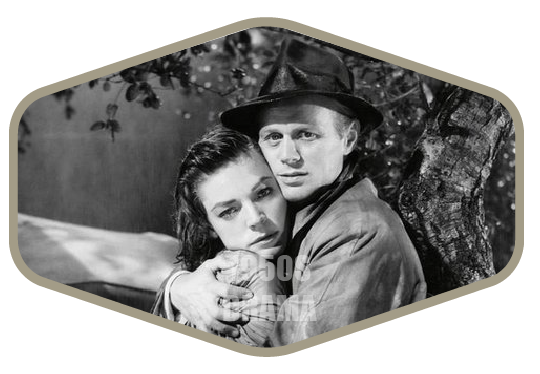The 1950s, the baby boom era was marked with the Civil Rights movement, the Cold War, and the fear of spreading communism. From an entertainment perspective, we witnessed the ubiquitousness of television (and with that, Swanson introduced their frozen TV dinners in 1954) and the dawn of teen angst and rebellion.
Hollywood took aggressive measures towards winning back a growing television audience with film gimmicks such as CinemaScope, VistaVision and 3-D. Their answer to a rising teen influence were answered by these influential young stars making their screen debut: Marlon Brando in A Streetcar Named Desire (1951), James Dean in East of Eden (1955), and even Elvis Presley in Love Me Tender (1956).
The era was marked with several lavish, historical epic dramas. Noteworthy among these were: The Robe (1953), The Silver Chalice (1954), The Ten Commandments (1956), and Ben-Hur (1959). In addition to the big budget epics, Hollywood took an introspective look at the business of making movies and the associated drama and goings-on with such films as: The Bad and the Beautiful (1952), Singin' in the Rain (1952), A Star is Born (1954), and All About Eve (1950).
Amid the anticommunism crusades being waged by the HUAC and the resulting blacklistings, Hollywood's most popular stars in 1950s drama films were: Marlon Brando, Marilyn Monroe, Kim Novak, Montgomery Clift, James Dean, Charlton Heston, Rock Hudson, Natalie Wood, Burt Lancaster, James Stewart, William Holden, Elizabeth Taylor, and Audrey Hepburn.
The 50’s also brought us a new breed of celebrity, coined; “sex symbols”: Marilyn Monroe, Brigitte Bardot, Elizabeth Taylor, Sophia Loren, Jayne Mansfield, and Mamie Van Doren.
DRAMA FILMS OF THE 1950s
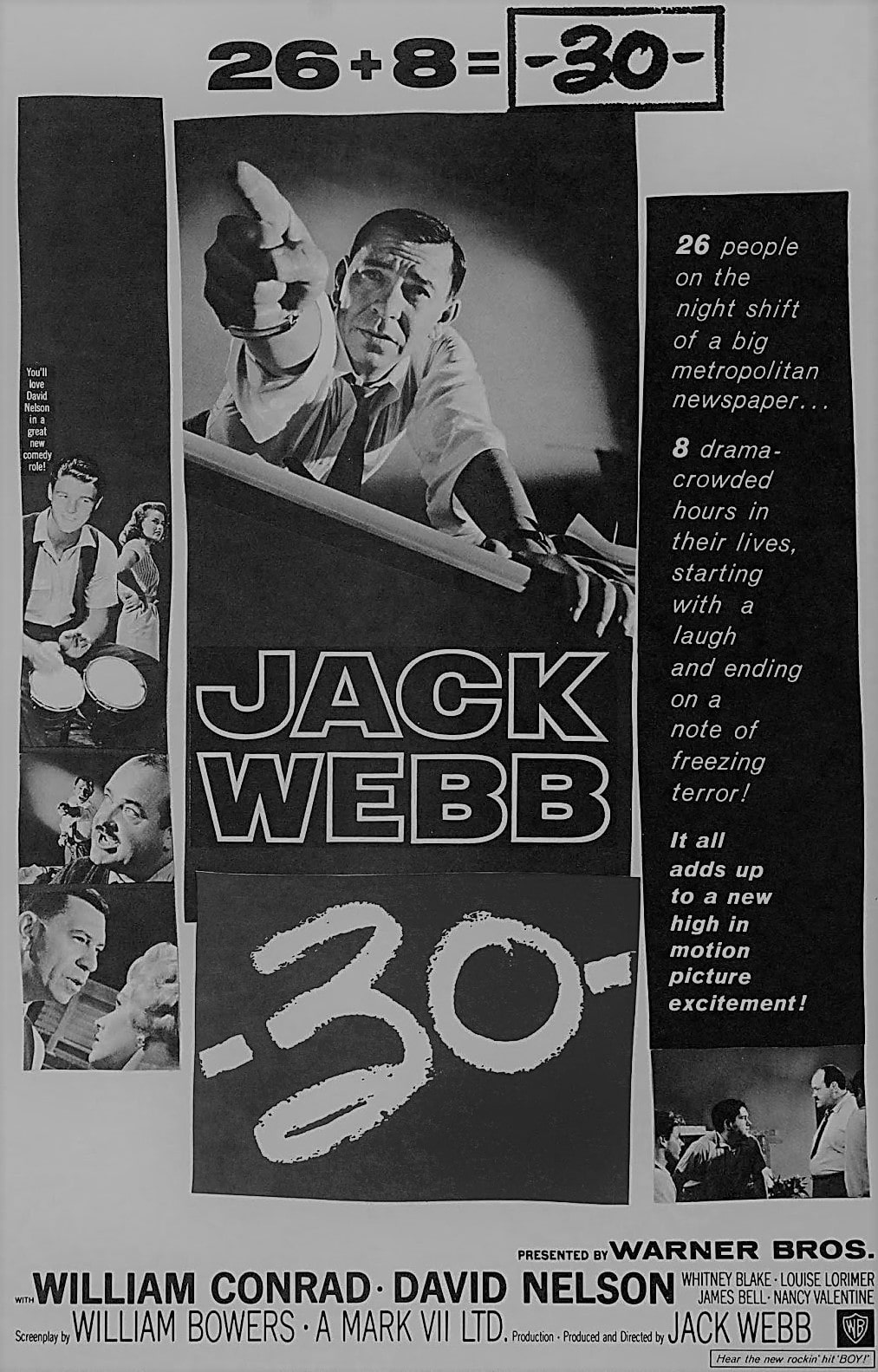 -30- (1959)
-30- (1959) (96 Min.) Genre: 1950 DRAMA, Transfer Quality: A
It's late Thursday night at the local paper and a savvy city editor, a world-weary but upright writer, and a beleagured copy boy prepare to put the next day's paper to bed. Suddenly two stories come over the wire. In the first, a young girl has gotten lost in the city's storm drains, and her life is endangered when a terrible storm erupts and the sewers begin to fill with runoff. In the second, the grandson of the writer is among a team of missing Air Force pilots who were attempting to set a record flying from Hawaii to Washington, DC. This suspenseful, newsroom drama chronicles the ways in which these situations affect the workers as they try to get the paper out on time.
Starring: William Conrad, Richard Bakalyan, Dick Whittinghill, David Nelson | Directed by: Jack Webb
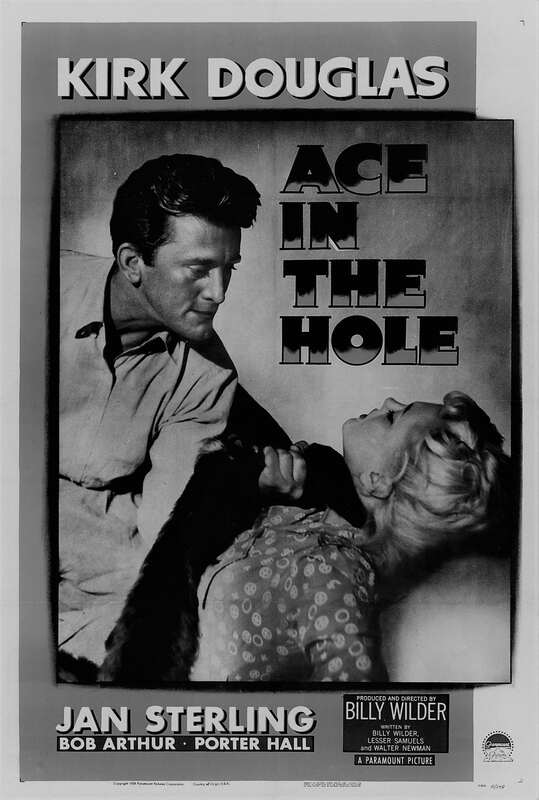 ACE IN THE HOLE (1951)
ACE IN THE HOLE (1951) (111 Min.) Genre: 1950 DRAMA, Transfer Quality: B
Paramount's ace screenwriting team of Billy Wilder and Charles Brackett came up with their bitterest, most trenchant screenplay to date with 1951's The Big Carnival—which, perhaps significantly, was one of the team's few flops. Kirk Douglas stars as a hotshot big-city reporter who has drunk himself out of every job he's ever held. Reduced to working for a backwater New Mexico daily, Douglas smells an opportunity to return to the Big Time when a miner (Richard Benedict) is trapped in a cave-in. Thanks to Douglas' promotional savvy, the miner's plight turns into a national news event, attracting thousands of onlookers, newsreel cameramen, radio commentators and sideshow hucksters. To prolong the ballyhoo, Douglas deliberately slows down the rescue of the unfortunate miner—who dies as a result. Thoroughly disgusted with himself, Douglas returns to his newsroom to deliver an impassionated speech of self-hatred, then drops dead at the feet of his startled editor. Test-marketed under the title Ace in the Hole, The Big Carnival turned out to be too bitter a pill for audiences to swallow. As a result, Billy Wilder would never write or direct so uncompromising a project again.
Starring: Kirk Douglas, Jan Sterling, Robert Arthur, Porter Hall, Gene Evans | Directed by: Billy Wilder
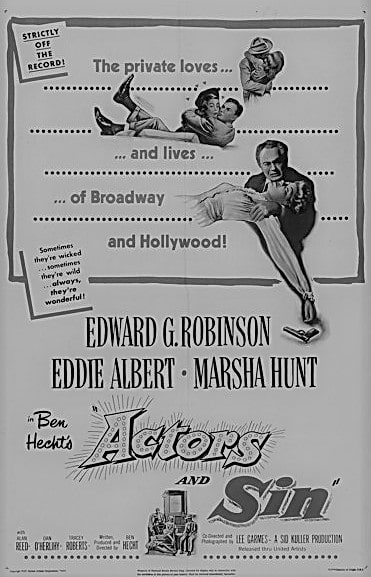 ACTORS AND SIN (1952)
ACTORS AND SIN (1952) (82 Min.) Genre: 1950 DRAMA, Transfer Quality: B
At least half of the two-part Actors and Sin is well worth having. Part One, "Actor's Blood", is based on a Ben Hecht tale of theatrical intrigue. Edward G. Robinson plays a Barrymoresque Shakespearean actor whose obsessive control of the life and career of his actress-daughter Marsha Hunt results in disaster. Part Two, "Woman of Sin", is another Ben Hecht yarn, this one satirical in nature. Eddie Albert stars as a Hollywood agent who'd sell his Grandmother to represent the author of a sensationally sexy screenplay titled, yes, Woman of Sin. Much to Albert's surprise (but not ours), the author turns out to be a precocious 9-year-old girl, played by Hecht's own daughter Jenny. Of the two playlets, "Actor's Blood", though ripely melodramatic, scores best in the acting department. "Woman of Sin" is too arch and smug to be consistently funny, while Jenny Hecht is perhaps the greatest argument against nepotism in film history. Ostensibly directed by Ben Hecht (who also produced), Actors and Sin was largely helmed by cinematographer Lee Garmes.
Starring: Edward G. Robinson, Marsha Hunt, Dan O'Herlihy, Rudolph Anders | Directed by: Lee Garmes, Ben Hecht
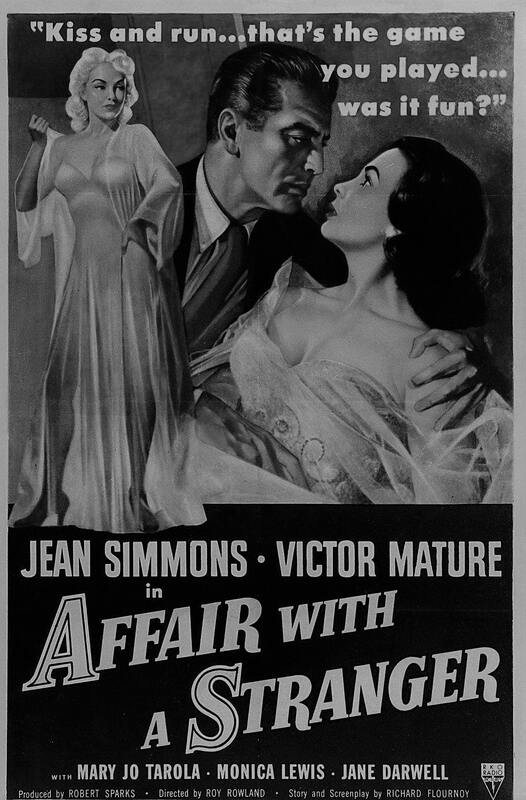 AFFAIR WITH A STRANGER (1953)
AFFAIR WITH A STRANGER (1953) (89 Min.) Genre: 1950 DRAMA, Transfer Quality: B
Told in flashback, Affair with a Stranger recounts the deteriorating marriage of playwright Victor Mature and model Jean Simmons. The union is strained by the death of Jean's baby and the pressure of Victor's career. A scheming actress (Monica Lewis) makes a play for Mature, leading Jean to file for divorce. The couple is brought back together by the adoption of a baby (the "stranger" of the title). Affair with a Stranger is unabashed soap opera, made plausible by the sensitive performance of Jean Simmons.
Starring: Jean Simmons, Victor Mature, Mary Jo Tarola, Monica Lewis, Jane Darwell | Directed by: Roy Rowland
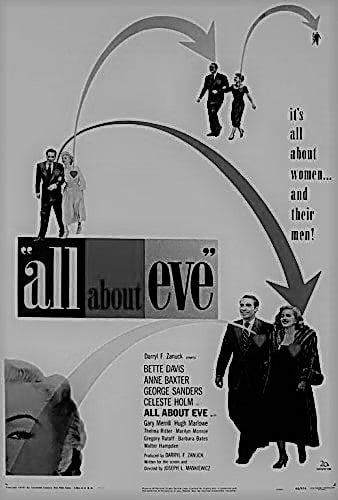 ALL ABOUT EVE (1950)
ALL ABOUT EVE (1950) (138 Min.) Genre: 1950 DRAMA, Transfer Quality: A
Based on the story The Wisdom of Eve by Mary Orr, All About Eve is an elegantly bitchy backstage story revolving around aspiring actress Eve Harrington (Anne Baxter). Tattered and forlorn, Eve shows up in the dressing room of Broadway mega-star Margo Channing (Bette Davis), weaving a melancholy life story to Margo and her friends. Taking pity on the girl, Margo takes Eve as her personal assistant. Before long, it becomes apparent that naïve Eve is a Machiavellian conniver who cold-bloodedly uses Margo, her director Bill Sampson (Gary Merill), Lloyd's wife Karen (Celeste Holm), and waspish critic Addison De Witt (George Sanders) to rise to the top of the theatrical heap. Also appearing in All About Eve is Marilyn Monroe, introduced by Addison De Witt as "a graduate of the Copacabana school of dramatic art." This is but one of the hundreds of unforgettable lines penned by writer/director Joseph L. Mankiewicz, the most famous of which is Margo Channing's lip-sneering admonition, "Fasten your seat belts. It's going to be a bumpy night." All About Eve received 6 Academy Awards, including Best Picture.
Starring: Bette Davis, Anne Baxter, George Sanders, Celeste Holm, Gary Merrill, Hugh Marlowe, Thelma Ritter, Marilyn Monroe | Directed by: Joseph L. Mankiewicz
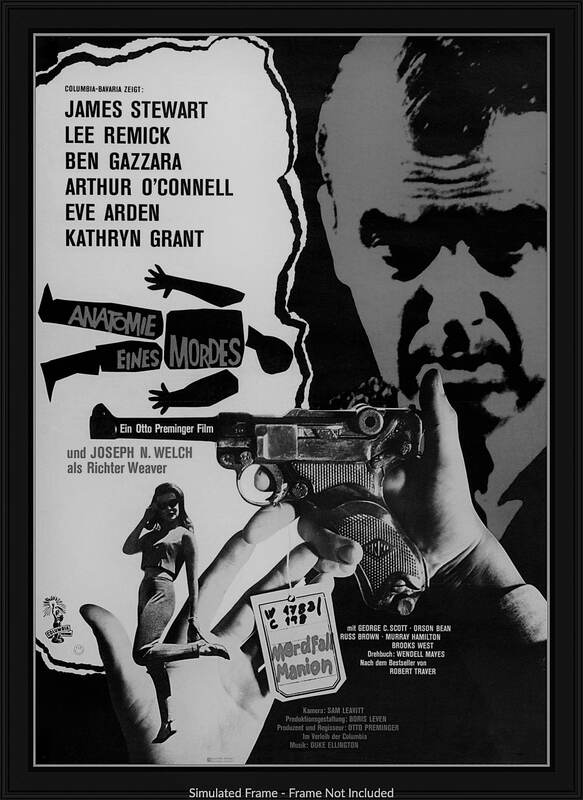 ANATOMY OF A MURDER (1959)
ANATOMY OF A MURDER (1959) (161 Min.) Genre: 1950 DRAMA, Transfer Quality: A
Based on the best-selling novel by Robert Traver (the pseudonym for Michigan Supreme Court justice John D. Voelker), Anatomy of a Murder stars James Stewart as seat-of-the-pants Michigan lawyer Paul Biegler. Through the intervention of his alcoholic mentor, Parnell McCarthy (Arthur O'Connell), Biegler accepts the case of one Lt. Manion (Ben Gazzara), an unlovable lout who has murdered a local bar owner. Manion admits that he committed the crime, citing as his motive the victim's rape of the alluring Mrs. Manion (Lee Remick). Faced with the formidable opposition of big-city prosecutor Claude Dancer (George C. Scott), Biegler hopes to win freedom for his client by using as his defense the argument of "irresistible impulse." Also featured in the cast is Eve Arden as Biegler's sardonic secretary, Katherine Grant as the woman who inherits the dead man's business, and Joseph N. Welch -- who in real life was the defense attorney in the Army-McCarthy hearings -- as the ever-patient judge. The progressive-jazz musical score is provided by Duke Ellington, who also appears in a brief scene. Producer/director Otto Preminger once more pushed the envelope in Anatomy of a Murder by utilizing technical terminology referring to sexual penetration, which up until 1959 was a cinematic no-no. Contrary to popular belief, Preminger was not merely being faithful to the novel; most of the banter about "panties" and "semen," not to mention the 11-hour courtroom revelation, was invented for the film. Anatomy of a Murder was filmed on location in Michigan's Upper Peninsula.
Starring: James Stewart, Lee Remick, Ben Gazzara, Arthur O'Connell, George C. Scott, Eve Arden | Directed by: Otto Preminger
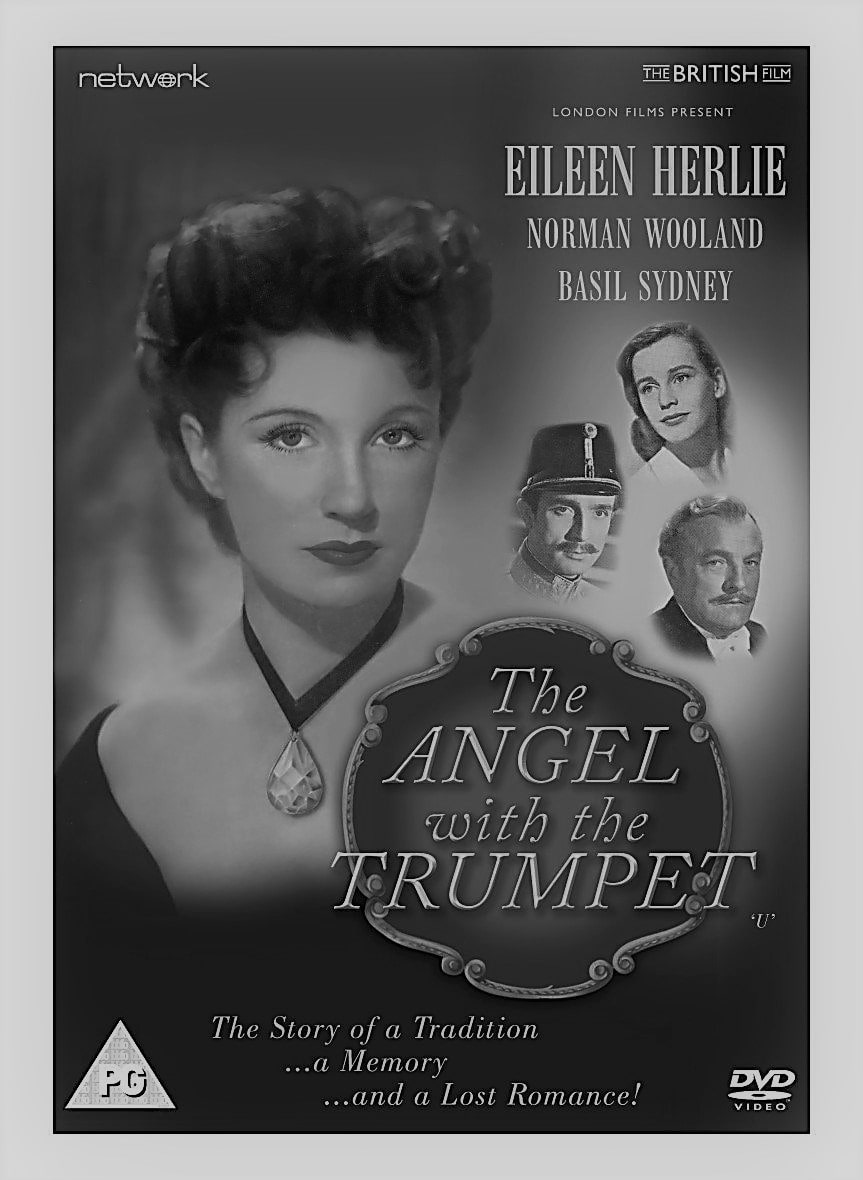 ANGEL WITH A TRUMPET (1950)
ANGEL WITH A TRUMPET (1950) (98 Min.) Genre: 1950 DRAMA, Transfer Quality: B
Eileen Herlie, a German girl of Jewish heritage, is in love with Norman Wooland, but at her family's insistence marries Basil Sydney. Wooland's reaction is swift and decisive: he commits suicide. Years later, Hitler comes to power. Once more, Herlie's fate is in the hands of others. This time, however, she makes up her own mind as to what her future holds in store. An unpleasant, relentlessly unhappy tale, brilliantly acted by a top-drawer cast.
Starring: Eileen Herlie, Basil Sydney, Norman Wooland, Anthony Bushell | Directed by: Anthony Bushell, Karl Hartl
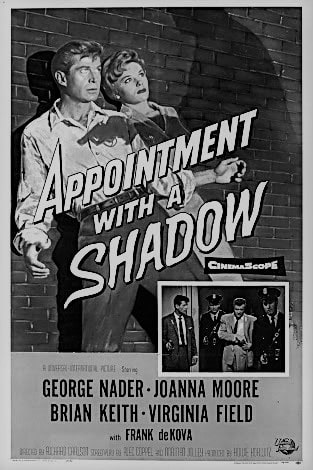 APPOINTMENT WITH A SHADOW (1958)
APPOINTMENT WITH A SHADOW (1958) (73 Min.) Genre: 1950 DRAMA, Transfer Quality: B
George Nader plays a reporter whose career is ruined by liquor. A comeback opportunity presents itself when Nader is a bystander at the arrest of a well-known criminal. The reporter knows that the crook, who has been accused of an ambush murder, is innocent, and he sets about to collar the real killer. Nader goes "cold turkey" on the booze despite tempations at every turn, and gets his man. Appointment with a Shadow is one of a handful of films directed by onetime I Led 3 Lives star Richard Carlson.
Starring: George Nader, Joanna Moore, Brian Keith, Virginia Field | Directed by: Richard Carlson, Joseph Pevney
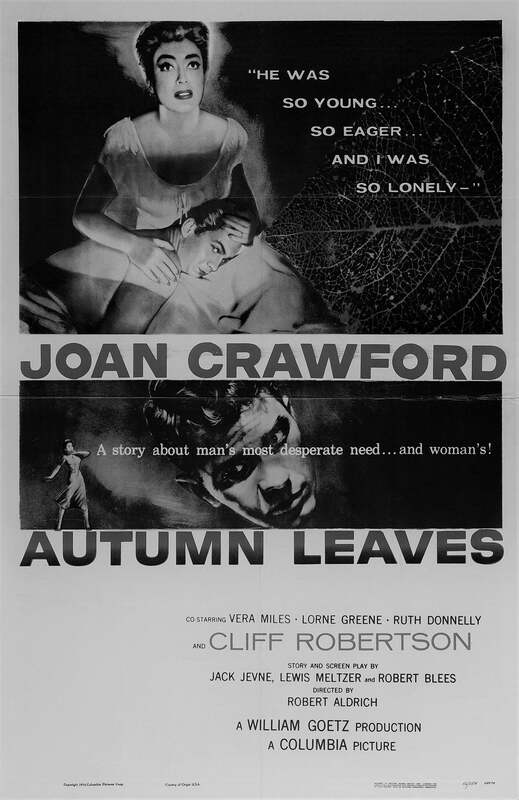 AUTUMN LEAVES (1956)
AUTUMN LEAVES (1956) (108 Min.) Genre: 1950 DRAMA, Transfer Quality: B
Few actresses other than Joan Crawford could have successfully pulled off the melodramatic excesses of Autumn Leaves. Though a very attractive fortysomething, Crawford remains aloof from romance until she meets Cliff Robertson, a young man half her age. An ardent and persistent suitor, Robertson finally breaks down her resistence to marriage. After a few weeks of wedded bliss, Crawford is confronted by Vera Miles, who claims to be Robertson's first wife. Miles further insists that Robertson is mentally unbalanced...and his subsequent behavior seems to bear this out. What Crawford doesn't know-but the audience does-is that the real villains of the piece are Miles and her middle-aged lover, Robertson's own father (Lorne Greene). Autumn Leaves works far better on screen than it does in print, thanks to the virtuoso performances of practically everyone in the cast. And, as anyone who's listened to top-40 radio during the past four decades already knows, the film also yielded a hit title song, written by Joseph Kosma, Jacques Prevert, and Johnny Mercer and performed during the credits by Nat King Cole.
Starring: Joan Crawford, Cliff Robertson, Vera Miles, Lorne Greene, Ruth Donnelly, Shepperd Strudwick | Directed by: Robert Aldrich
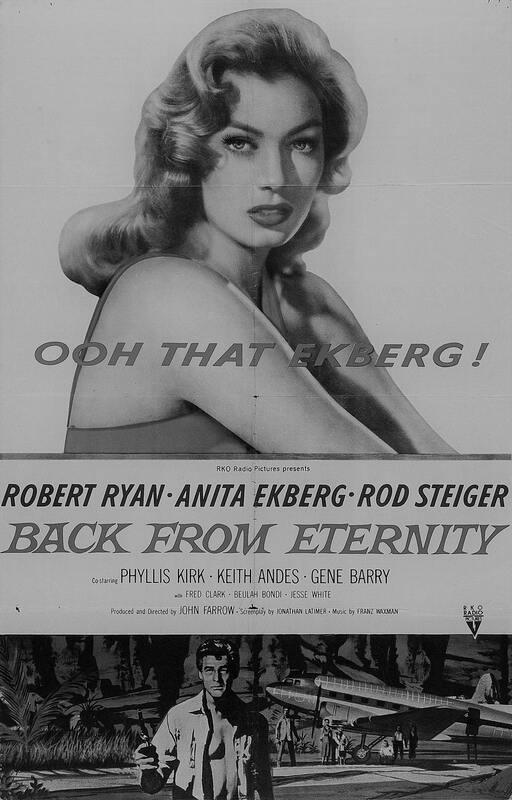 BACK FROM ETERNITY (1956)
BACK FROM ETERNITY (1956) (97 Min.) Genre: 1950 DRAMA, Transfer Quality: A
Director John Farrow's Back From Eternity is a virtual scene-for-scene remake of Farrow's 1939 film Five Came Back. The earlier film is the better of the two, if only because it is 22 minutes shorter. The plot concerns a small passenger plane that crashlands in South America, square in the heart of headhunter country. Pilot Robert Ryan is able to get the plane back into flying condition; unfortunately he discovers that the plane will only be able to carry five of its eleven passengers to safety. Who will have to be left behind: condemned murderer Rod Steiger, socialite Phyllis Kirk, her weak-willed fiance Gene Barry, copilot Keith Andes, elderly married couple Beulah Bondi and Cameron Prud'homme, songstress Anita Ekberg, foul-tempered cop Fred Clark, soft-hearted crook Jesse White, or tousle-haired kid Jon Provost? Rod Steiger is just fine in the role orginally played by Joseph Calleia, but Ekberg is no match for the original's Lucille Ball. — Hal Erickson
Starring: Robert Ryan, Anita Ekberg, Rod Steiger, Phyllis Kirk | Directed by: John Farrow
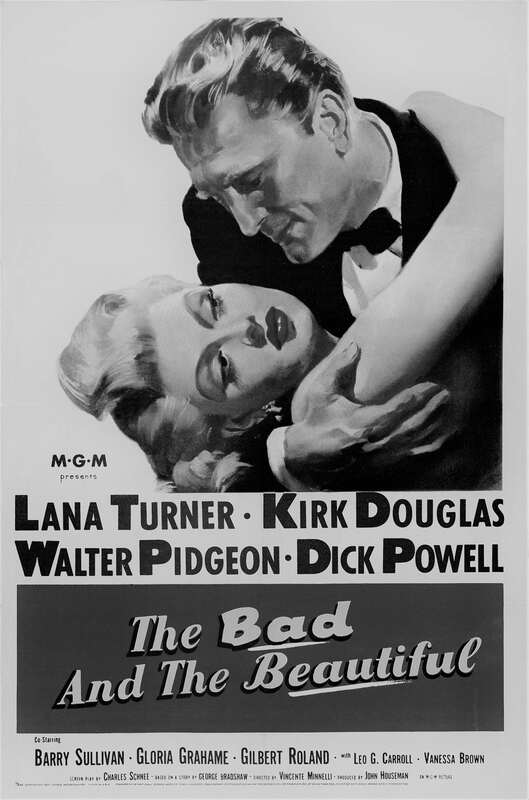 BAD AND THE BEAUTIFUL, THE (1952)
BAD AND THE BEAUTIFUL, THE (1952) (118 Min.) Genre: 1950 DRAMA, Transfer Quality: A
Kirk Douglas plays the corrupt and amoral head of a major film studio in this Hollywood drama, often regarded as one of the film's industry's most interesting glimpses at itself. Actress Gloria Lorrison (Lana Turner), director Fred Amiel (Barry Sullivan), and screenwriter James Lee Bartlow (Dick Powell) are invited to a meeting at a Hollywood sound stage at the request of producer Harry Pebbel (Walter Pidgeon). Pebbel is working with studio chief Jonathan Shields (Kirk Douglas), whose studio is in financial trouble and needs a blockbuster hit. If these three names will sign to a new project, he's convinced that there's no way he can lose. But there's a rub — all three of these Hollywood heavyweights hate Shields's guts. He dumped Gloria for another woman, he double-crossed Fred out of a plum directing assignment, and he was responsible for the death of James Lee's wife. All three are ready to tell Pebbel to forget it, until they hear the voice of Shields, calling from Europe to discuss the project by phone. The Bad and the Beautiful won five Academy Awards, including Best Screenplay and Best Supporting Actress for Gloria Grahame. — Mark Deming
Starring: Kirk Douglas, Lana Turner, Walter Pidgeon, Dick Powell, Gloria Grahame | Directed by: Vincente Minnelli
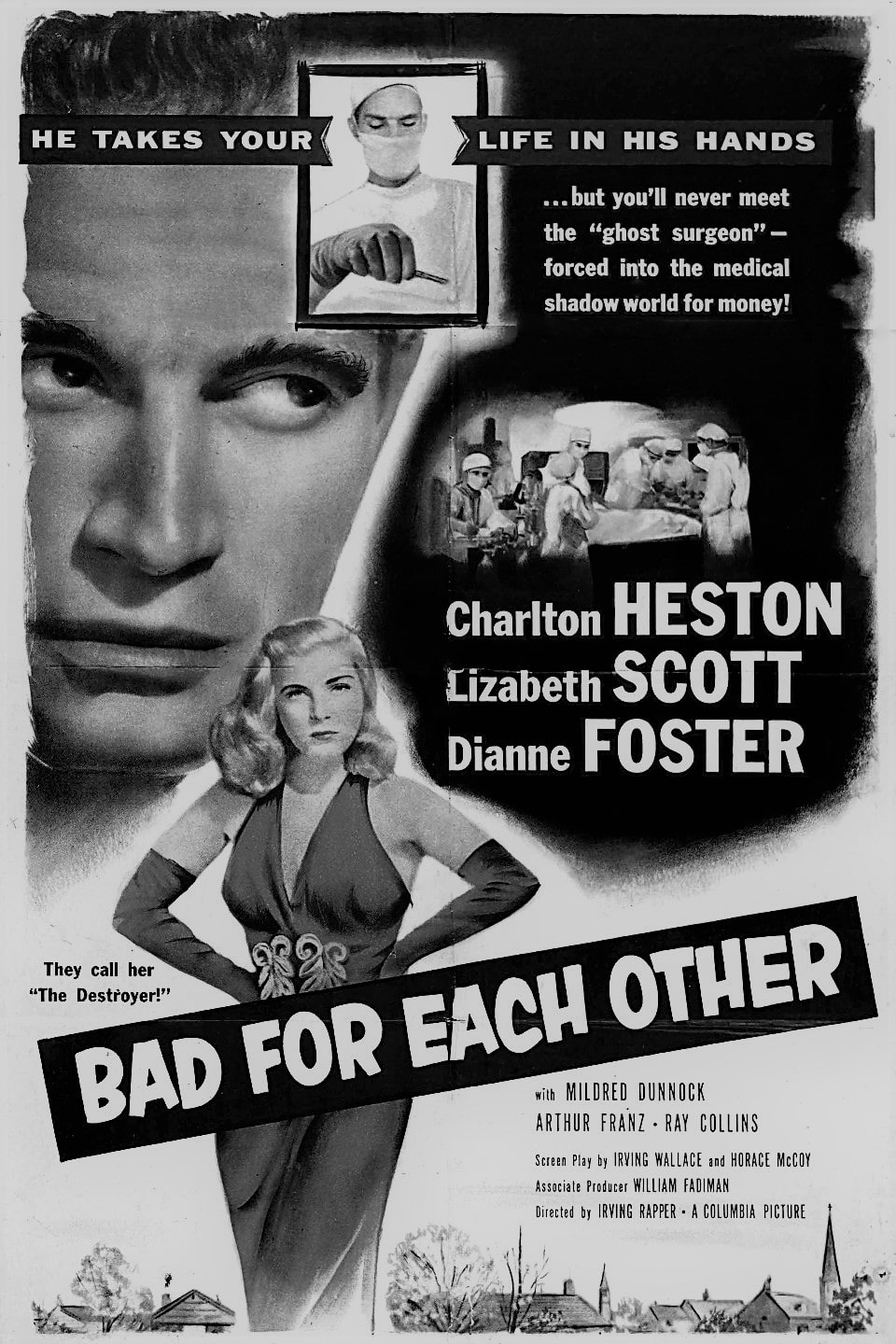 BAD FOR EACH OTHER (1954)
BAD FOR EACH OTHER (1954) (83 Min.) Genre: 1950 DRAMA, Transfer Quality: A
The film Bad For Each Other, together with stars Charlton Heston and Lizabeth Scott and director Irving Rapper, were originally assembled into a package by producer Hal Wallis for Paramount. Shortly thereafter, however, Wallis found it expedient to sell the whole package to Columbia, though the film still has the "look" of a Paramount "A"-picture. Heston plays poor-but-proud Army doctor Tom Owen, who through the influence of Pittsburgh socialite Helen Curtis (Lizabeth Scott) builds up a posh society practice. Though he's happy with the money and prestige, Dr. Owen is at heart a man of the people, and he'd much prefer tending to the families of the local steel miners. During a moment of extreme crisis, Owen is forced to choose immediately between the life offered him by Helen and the course he knows he should be following. Dianne Foster plays Joan Lasher, the girl Owen left behind when he began pursuing the ice-princess.
Starring: Charlton Heston, Lizabeth Scott, Dianne Foster, Mildred Dunnock, Arthur Franz | Directed by: Irving Rapper
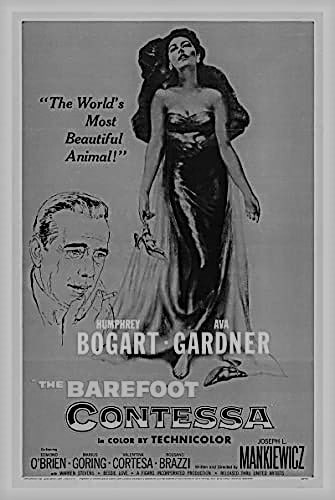 BAREFOOT CONTESSA, THE (1954)
BAREFOOT CONTESSA, THE (1954) (128 Min.) Genre: 1950 DRAMA, Transfer Quality: A
The Barefoot Contessa begins at the funeral of Ava Gardner, a former Spanish peasant, cabaret dancer and movie star, who at the time of her death was a full-fledged contessa. Her life story unfolds in flashback recollections from her mourners. Film director Humphrey Bogart recalls how his career was saved when he discovered Gardner on behalf of Howard R. Hughes-like mogul Warren Stevens. Press agent Edmond O'Brien remembers how Ava was wooed and then abandoned by mercurial millionaire Marius Goring, and Italian count Rosanno Brazzi reflects on how he was able to wed the tempestuous Gardner, only to watch his world crumble after revealing on their wedding night that he was "only half a man." O'Brien received Best Supporting Actor awards at both the Academy Awards and Golden Globes in 1954.
Starring: Humphrey Bogart, Ava Gardner, Edmond O'Brien, Marius Goring, Rossano Brazzi, Elizabeth Sellars | Directed by: Joseph L. Mankiewicz
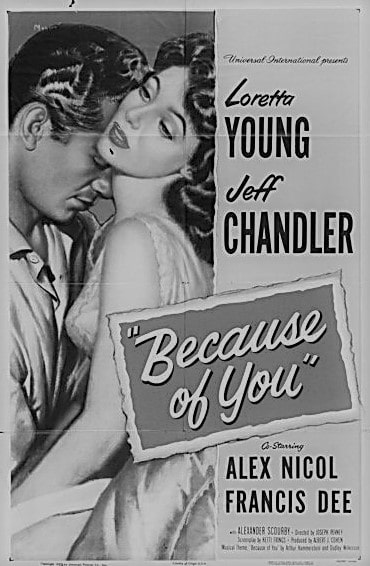 BECAUSE OF YOU (1952)
BECAUSE OF YOU (1952) (95 Min.) Genre: 1950 DRAMA, Transfer Quality: A
Fans of Loretta Young were rather taken aback by the early scenes of Because of You, wherein Young is seen as brash, uninhibited bleach-blonde Christine Carroll. On the verge of marrying gangster Mike Monroe (Alex Nicol), Christine is arrested by the cops, and sent to prison on the strength of incriminating evidence slipped into her purse by the duplicitous Monroe. Through the kindness of prison psychiatrist Dr. Breen (Alexander Scourby), Christine turns her life around in prison, becoming a nurse's aid in the infirmary. Upon her release, Christine gets a job at a respectable hospital, where she falls in love with wounded combat pilot Steve Kimberly (Jeff Chandler). Will she ever be able to reveal her sordid past without sending the emotionally fragile Steve off the deep end? And what about that no-good Mike Monroe? The supporting cast of Because of You includes two of Loretta Young's contemporaries of the 1930s, Frances Dee and Mae Clarke, in strongly defined character roles.
Starring: Loretta Young, Jeff Chandler, Alex Nicol, Frances Dee, Alexander Scourby | Directed by: Joseph Pevney
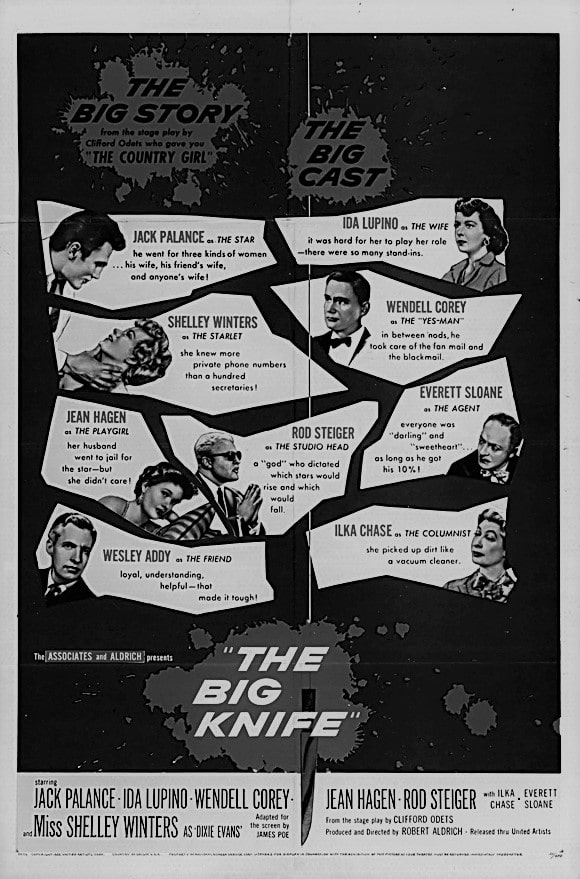 BIG KNIFE, THE (1955)
BIG KNIFE, THE (1955) (113 Min.) Genre: 1950 DRAMA, Transfer Quality: B
Robert Aldrich's screen adaptation of Clifford Odets' stage play reflects the quandary of the writer's later career; the golden boy of the Group Theater in the '30s, when his plays were the toast of Broadway, his talent seemed to wither after a number of years in the screenwriting trenches, and a revulsion for what he saw as hackwork combined with his capitulation to HUAC to blight his final decade. Jack Palance stars as Charlie Castle, a major film star who has refused to sign a long-term contract for big money with a studio run by the tyrannical Stanley Hoff (Rod Steiger). This has led to the return of his wife, Marion (Ida Lupino), who had left him due to his womanizing and a willingness to kowtow to Hoff in doing bad movies only for the money. After his agent, Nat Danziger (Everett Sloane), tries unsuccessfully to get him to reconsider, Hoff himself badgers Charlie, insisting on the absolute necessity of his signing. When the star continues to resist, Hoff threatens to blackmail him with an ugly incident from his past.
Starring: Jack Palance, Ida Lupino, Wendell Corey, Rod Steiger, Shelley Winters, Jean Hagen, Everett Sloane | Directed by: Robert Aldrich
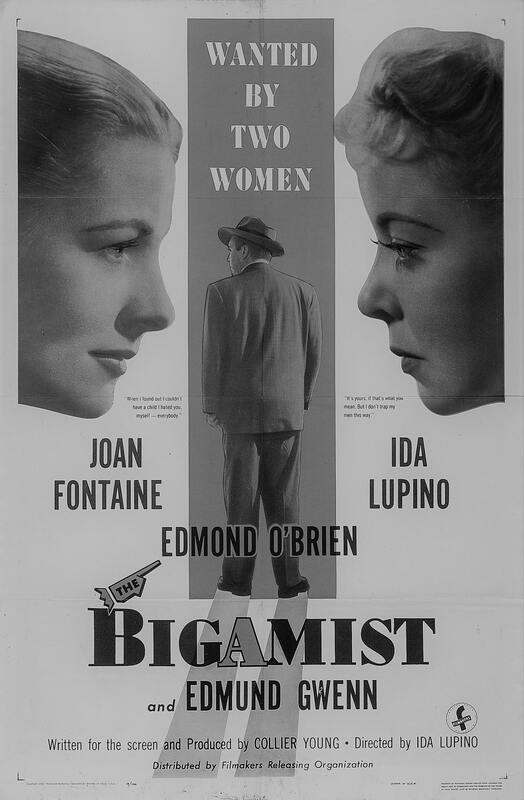 BIGAMIST, THE (1953)
BIGAMIST, THE (1953) (79 Min.) Genre: 1950 DRAMA, Transfer Quality: B
The title character is Edmond O'Brien, a lonely travelling salesman who ends up married to two women, Eve (Joan Fontaine)--and Phyllis (Ida Lupino). Eventually, of course, the truth comes out. Directed by costar Ida Lupino, The Bigamist manages to evoke a certain amount of sympathy for Edmond O'Brien, without in any way advocating or excusing his lifestyle. It's worth noting that an Italian film made around the same time, also titled The Bigamist, is a comedy.
Starring: Edmond O'Brien, Joan Fontaine, Ida Lupino, Edmund Gwenn, Jane Darwell, Kenneth Tobey | Directed by: Ida Lupino
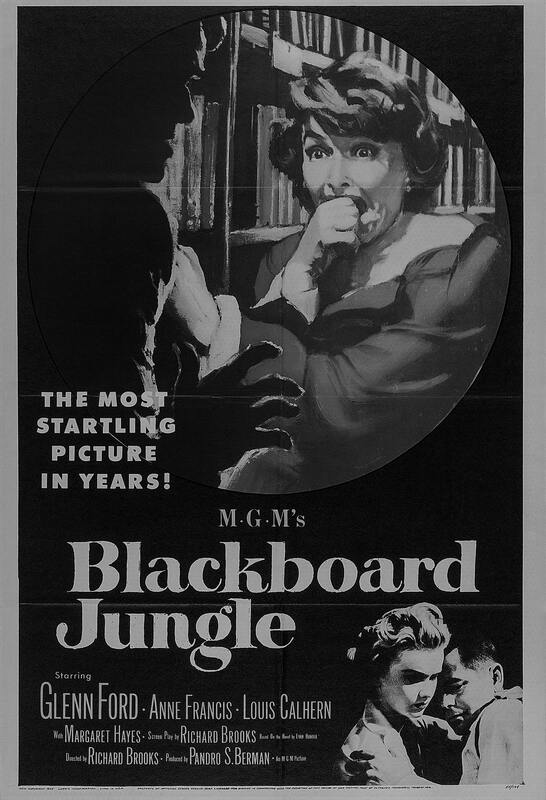 BLACKBOARD JUNGLE (1955)
BLACKBOARD JUNGLE (1955) (101 Min.) Genre: 1950 DRAMA, Transfer Quality: A
In this gritty urban drama, war veteran Richard Dadier (Glenn Ford) wants to begin his career as a teacher and is given an assignment at a boys high school in inner-city New York. However, he soon discovers the school is overrun by delinquents, led by Artie West (Vic Morrow), an insolent hood who likes to call Richard "Mr. Daddy-O." Artie and his gang steal, destroy property, refuse to respect authority, and threaten the female teachers with rape. While most of the faculty have given up and meekly let the delinquents do what they want, Dadier is determined to bring order back to his classroom, even after Artie's thugs threaten Richard's pregnant wife. Keep your eyes peeled for a bit part by Jameel Farah, years before he would change his name to Jamie Farr. Blackboard Jungle was also the first major studio film to use rock & roll on the soundtrack; the film's success kick-started sales of "Rock Around the Clock" by Bill Haley & His Comets, which helped to spark the rock & roll boom of the 1950s.
Starring: Glenn Ford, Sidney Poitier, Anne Francis, Louis Calhern, Vic Morrow | Directed by: Richard Brooks
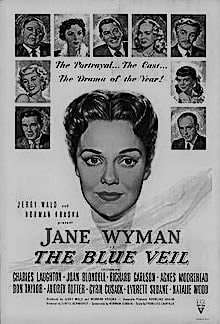 BLUE VEIL, THE (1951)
BLUE VEIL, THE (1951) (113 Min.) Genre: 1950 DRAMA, Transfer Quality: B
The Blue Veil was the single most successful effort from the production team of Jerry Wald and Norman Krasna. Jane Wyman pulls out all the emotional stops as a young Frenchwoman named Louise, who, after losing her husband and child in WW I, devotes the rest of her life to selflessly caring for other people's children. In true "woman's story" fashion, Louise ages and ages beautifully, sacrificing all for the sake of others. On the brink of destitution, she is rescued by her former charges, all nicely grown up and boundlessly grateful. A remake of the French Le Voile Bleu, The Blue Veil was adapted for the American screen by radio's Norman Corwin. The sterling supporting cast includes Charles Laughton as a widowed manufacturer, Joan Blondell as a blowsy actress, Natalie Wood as Blondell's neglected daughter, and Richard Carlson, Audrey Totter, Agnes Moorehead and Don Taylor.
Starring: Jane Wyman, Charles Laughton, Joan Blondell, Richard Carlson, Agnes Moorehead, Audrey Totter | Directed by: Curtis Bernhardt
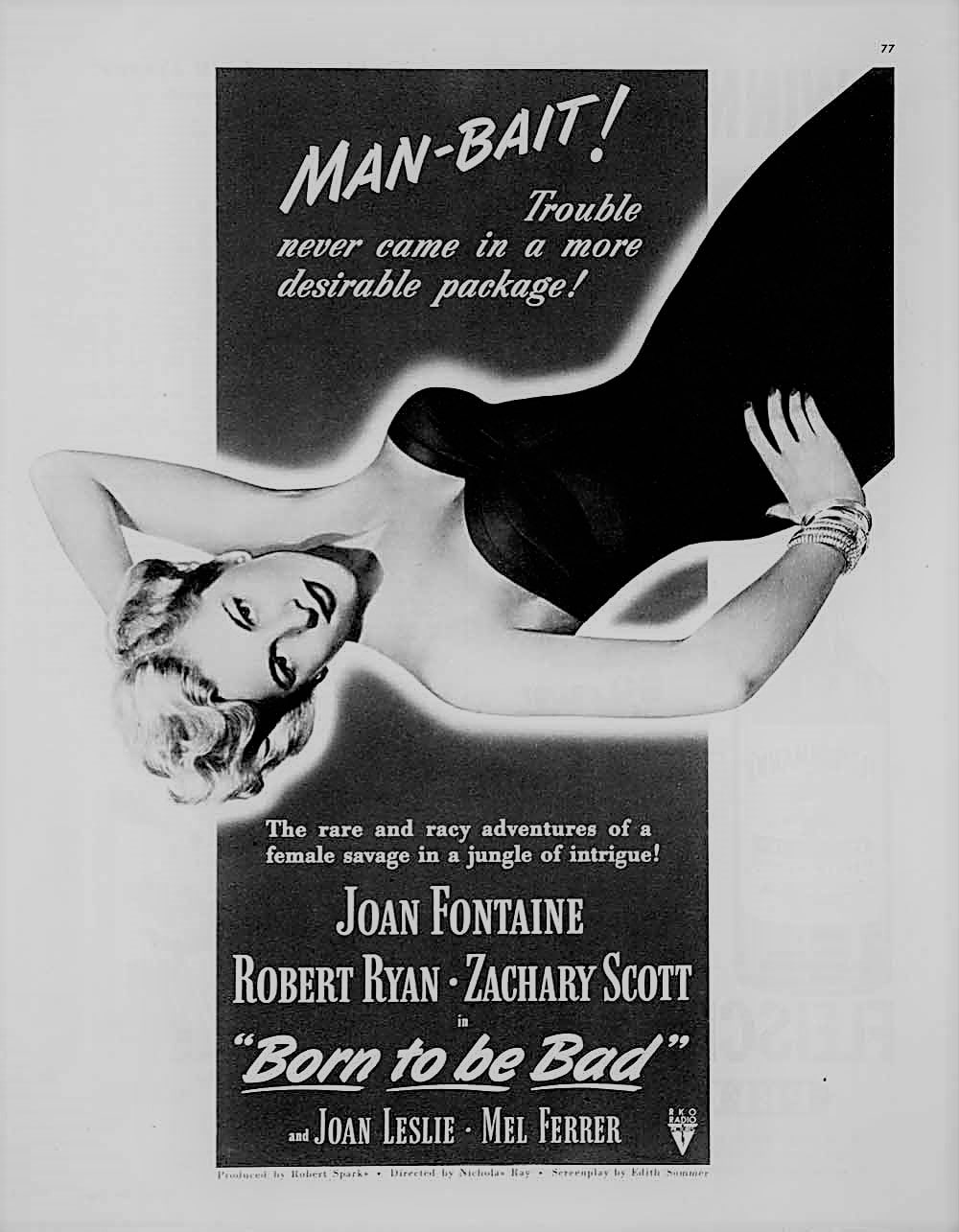 BORN TO BE BAD (1950)
BORN TO BE BAD (1950) (94 Min.) Genre: 1950 DRAMA, Transfer Quality: A
One of the most oft-revived of the pre-Technicolor Nicholas Ray efforts, Born to Be Bad offers us the spectacle of Joan Fontaine portraying a character described as "a cross between Lucrezia Borgia and Peg O' My Heart". For the benefit of her wealthy husband Zachary Scott and his family, Fontaine adopts a facade of wide-eyed sweetness. Bored with her hubby, she inaugurates a romance with novelist Robert Ryan. All her carefully crafted calculations come acropper when both men discover that she's a bitch among bitches. She might have gotten away with all her machinations, but the censors said uh-uh. Originally slated for filming in 1946, with Henry Fonda scheduled to play the Robert Ryan part, Born to Bad was cancelled, then resurfaced as Bed as Roses in 1948, this time with Barbara Bel Geddes in the Fontaine role. RKO head Howard Hughes' decision to replace Bel Geddes with the more bankable Fontaine was one of the reasons that producer Dore Schary left RKO in favor of MGM. Based on Anne Parrish's novel All Kneeling, Born to be Bad is so overheated at times that it threatens to lapse into self-parody; though this never happens, the film was the basis for one of TV star Carol Burnett's funniest and most devastating movie takeoffs, Raised to be Rotten.
Starring: Joan Fontaine, Robert Ryan, Zachary Scott, Joan Leslie, Mel Ferrer | Directed by: Nicholas Ray
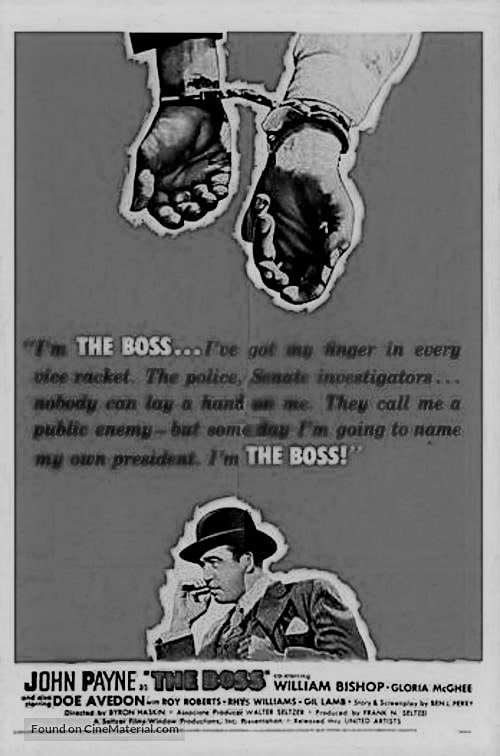 BOSS, THE (1956)
BOSS, THE (1956) (89 Min.) Genre: 1950 DRAMA, Transfer Quality: A
John Payne always felt that he delivered his best screen performance in The Boss. Set in the years following WW1, the story concerns a small-town veteran named Matt Brady (John Payne), whose brother, machine politician Tim Brady (Roy Roberts), arranges for Matt to get a cushy government job. When Tim dies, Matt takes over his operation, eventually assuming control of the entire state (which judiciously remains unnamed in the film). Though a successful power broker, Matt is unable to win the woman he loves (Doe Avedon), so he settles for another (Gloria McGhee) whom he treats atrociously. A falling out with his best friend/severest critic Bob Herrick (William Bishop) sets the stage for the ruthless Brady's inevitable downfall. Though all the names were changed to protect the guilty, audiences in 1956 were quick to perceive that the film was a thinly disguised attack on the Pendergast machine of Kansas City, Missouri. Coproduced and cowritten by John Payne, The Boss falters only in its overreliance upon anachronistic newsreel footage. — Hal Erickson
Starring: John Payne, William Bishop, Gloria McGhee, Doe Avedon | Directed by: Byron Haskin
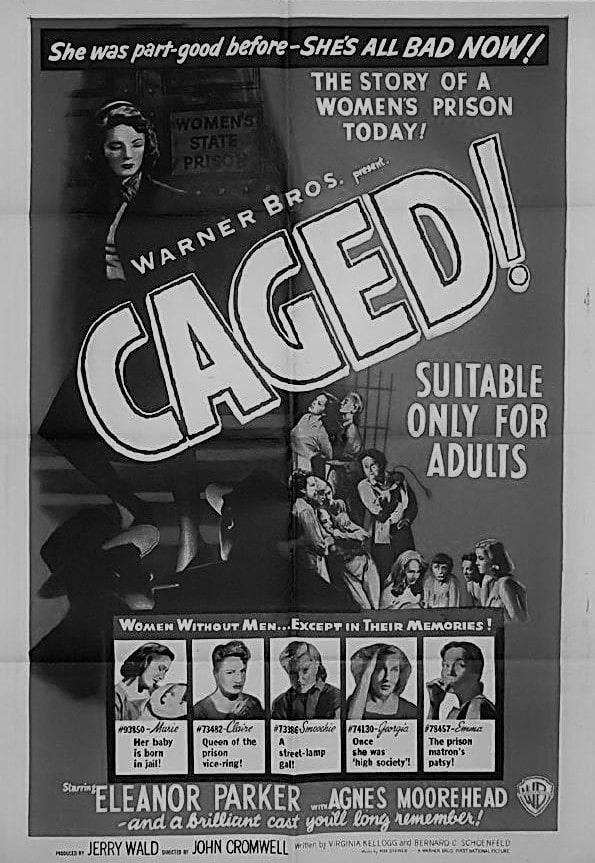 CAGED (1950)
CAGED (1950) (96 Min.) Genre: 1950 DRAMA, Transfer Quality: A
Caged, considered the best woman's prison film ever made, represents a union between realistic socially conscious drama and the more stylized world of film noir. Marie, (Eleanor Parker), is sentenced to prison for helping her husband in a small robbery. The prison is run by the sadistic matron Evelyn (Hope Emerson) who is secure in her position due to corrupt political influence. The film shows Marie's slow disillusionment with society and her eventual decision to become a prostitute in order to gain parole after observing her friend and fellow inmate Kitty (Betty Garde) lose her sanity and murder their oppressor Evelyn. With this uncompromisingly pessimistic statement on human nature, John Cromwell reaches his peak as a director. Under his expert direction, Eleanor Parker gives the best performance of her career and creates a convincing metamorphosis from a innocent young girl to a hardened criminal. Her performance is nuanced, low-keyed and emotionally charged. Equally impressive is Cromwell's visual realization of the claustrophobia of prison life, aided by the high-contrast photography of Carl Guthrie. This excellent, grim drama is uncompromising in its refusal to sentimentalize the plight of Marie as a victim or to absolve her of her role in her fate, nor does it absolve society as it shows the results of desperation and brutalization on human dignity.
Starring: Eleanor Parker, Agnes Moorehead, Hope Emerson, Ellen Corby, Jan Sterling, Jane Darwell | Directed by: John Cromwell
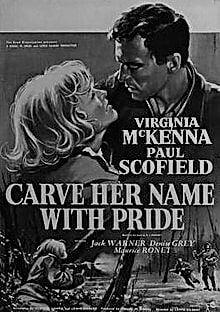 CARVE HER NAME WITH PRIDE (1958)
CARVE HER NAME WITH PRIDE (1958) (119 Min.) Genre: 1950 DRAMA, Transfer Quality: B
The true story of Violette Szabo, a heroine of the Second World War for her espionage activities on behalf of the British government. Born Violette Bushell (Virginia McKenna) to a French mother and an English father, she chances to meet Etienne Szabo (Alain Saury), a French officer, whom she later marries. They have a child, Tania, but Etienne is fatally wounded in the Battle of El Alamein. Violette is already contributing to the war effort at home, but soon discovers that her bi-lingual skills make her a potentially valuable member of England's Special Operations Executive, the country's wartime overseas espionage unit. She agrees to join and, after extensive training, is sent into France in the spring of 1944, on a mission to salvage a resistance unit in Rouen area. Szabo completes that mission successfully and returns home, intending to resume her life as a mother raising her daughter -- but she is offered a second mission in France, immediately after the Normandy landings, and accepts, with tragic consequences.
Starring: Virginia McKenna, Paul Scofield, Jack Warner, Denise Grey, Alain Saury, Michael Caine | Directed by: Lewis Gilbert
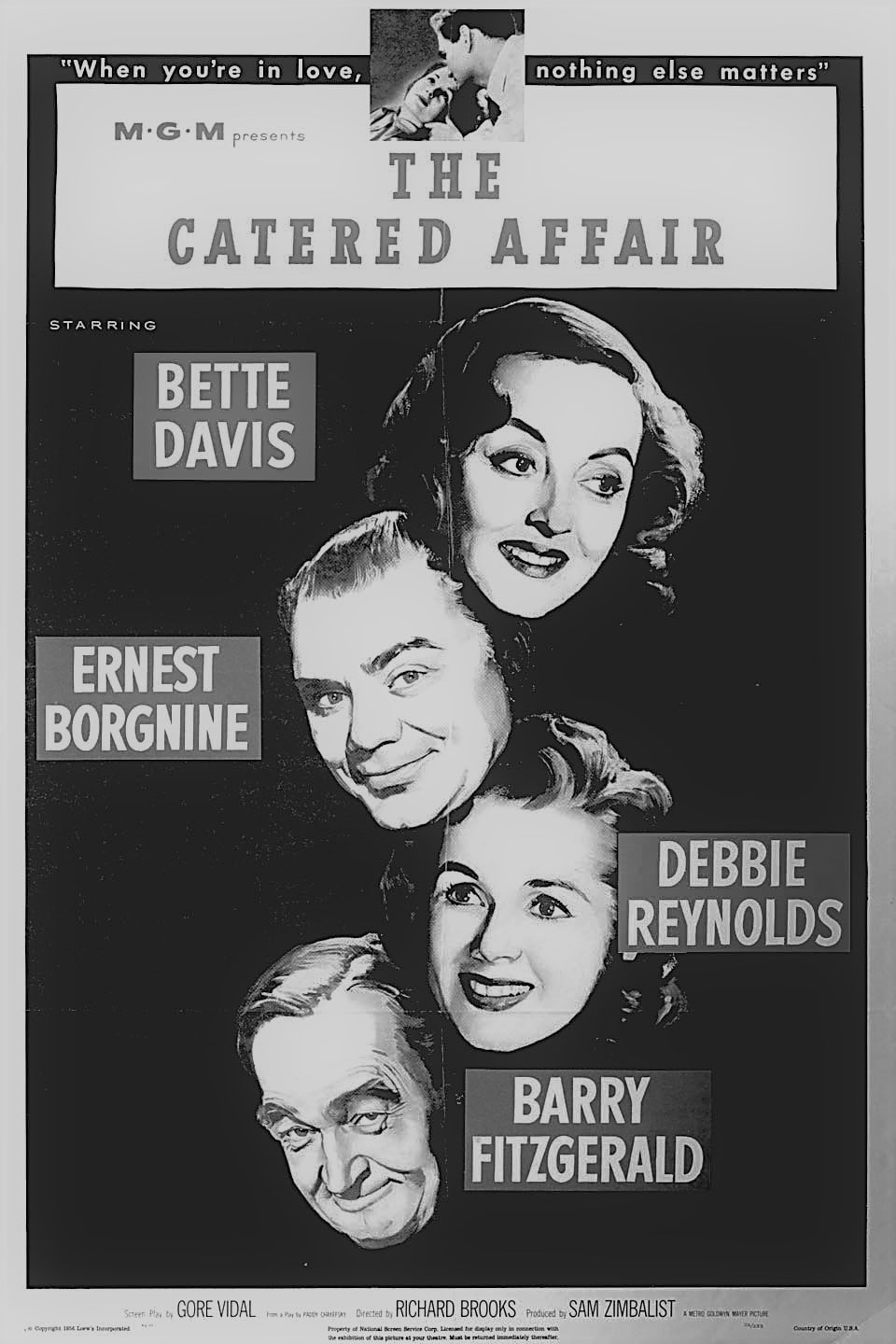 CATERED AFFAIR, THE (1956)
CATERED AFFAIR, THE (1956) (92 Min.) Genre: 1950 DRAMA, Transfer Quality: A
Bette Davis goes the "kitchen sink drama" route in The Catered Affair. As the frowsy wife of Bronx cabdriver Ernest Borgnine, Davis insists that her daughter Debbie Reynolds have a high-class wedding--caterers and all. Reynolds and future hubby Rod Taylor want a simple ceremony, but Davis' mind is made up. The wedding snowballs into an unwieldy affair as Davis and Borgnine find that they must invite everyone they know or risk incurring the wrath of their neighborhood. When the cost of the affair exceeds the family's bank account, Davis rails at Borgnine for failing to be a good provider. It takes her till the very end of the film to realize what a fool she's been. Gore Vidal, of all people, adapted The Catered Affair from a TV drama written by Paddy Chayefsky; the original telecast had starred Thelma Ritter.
Starring: Bette Davis, Ernest Borgnine, Debbie Reynolds, Barry Fitzgerald, Rod Taylor | Directed by: Richard Brooks
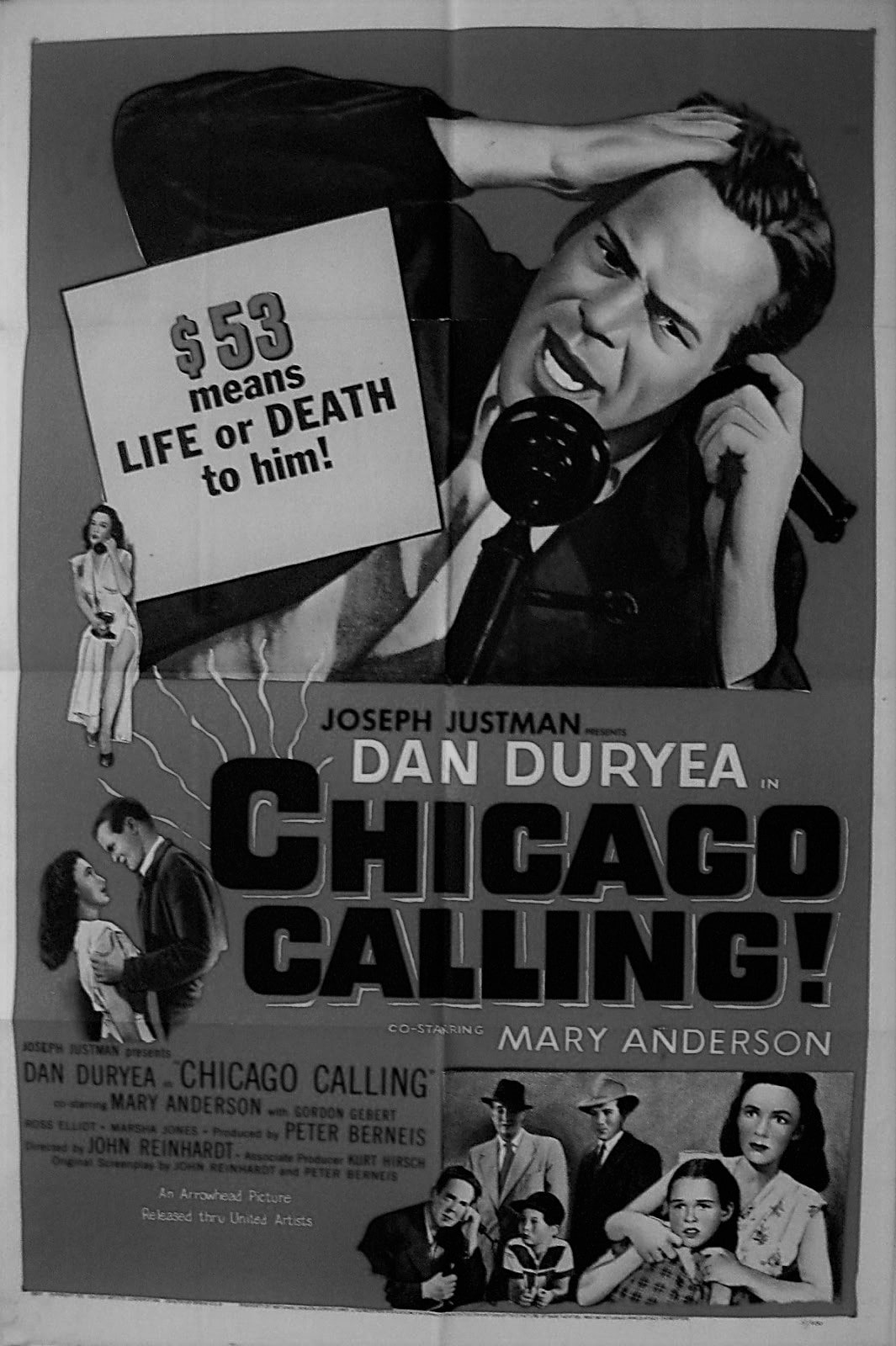 CHICAGO CALLING (1951)
CHICAGO CALLING (1951) (74 Min.) Genre: 1950 DRAMA, Transfer Quality: C
Alcoholic Bill Cannon's (Dan Duryea) past sins catch up with him in Chicago Calling. Cannon's daughter Nancy (Melinda Plowman) is seriously injured in an accident while out of town, and his wife Mary (Mary Anderson) has promised to call him back as soon as she learns the result of Nancy's operation. Unfortunately, Cannon's phone service is cut off for nonpayment, forcing him to go begging for the $50 necessary to square his phone bill. Only through the kindness of waitress Peggy (Marsha Jones) and telephone engineer Jim (Ross Elliot) is Cannon able to make the crucial call to his wife. Alas, the operation has proved unsuccessful. Will the impact of this tragedy push Cannon over the brink, or will it inspire him to seek out a new lease on life?
Starring: Dan Duryea, Mary Anderson, Gordon Geberl, Judy Brubaker | Directed by: John Reinhardt
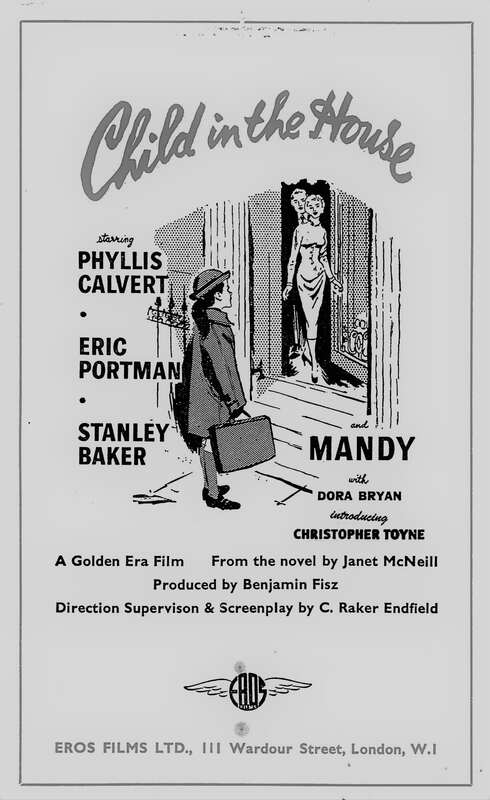 CHILD IN THE HOUSE (1956)
CHILD IN THE HOUSE (1956) (83 Min.) Genre: 1950 DRAMA, Transfer Quality: B
In this tragic melodrama, a lonely child must stay with her uncaring aunt and uncle after her mother is hospitalized. Her estranged father is a fugitive. For love and companionship, the eleven-year old girl becomes friends with the housemaid. When at long last, she meets her dad, she must vow to never reveal his location to the police. This causes great internal conflict as the girl doesn't know whether to tell the truth or be loyal to her father. He eventually makes the choice easier by going straight.
Starring: Phyllis Calvert, Eric Portman, Stanley Baker, Mandy Miller | Directed by: Cy Raker Endfield
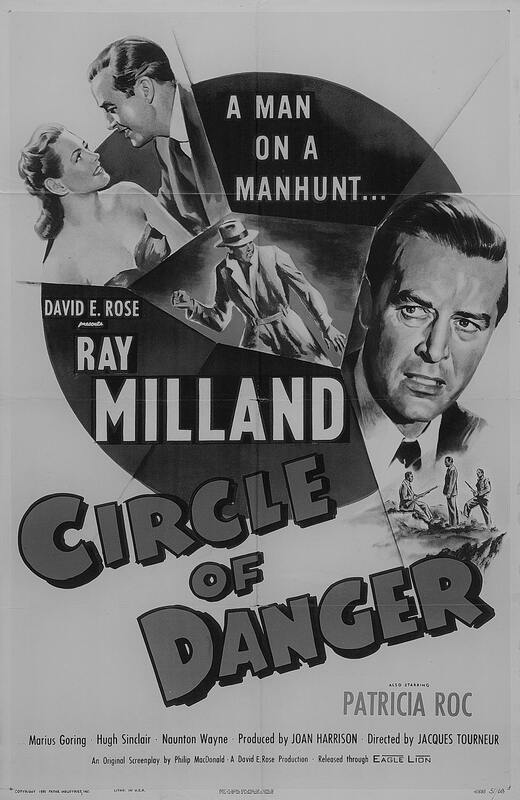 CIRCLE OF DANGER (1951)
CIRCLE OF DANGER (1951) (86 Min.) Genre: 1950 DRAMA, Transfer Quality: B
Circle of Danger stars Ray Milland as an American at large in London, Wales and Scotland. During World War 2, Milland's brother had died in a commando raid. The details of his death were somewhat murky, and Milland would like to know the truth. The truth is murder in every sense of the word, though rather disappointingly, Milland himself is never in any peril. While Circle of Danger was produced by longtime Hitchcock associate Joan Harrison, the Master's touch is noticeably absent.
Starring: Ray Milland, Patricia Roc, Marius Goring, Hugh Sinclair, Naunton Wayne | Directed by: Jacques Tourneur
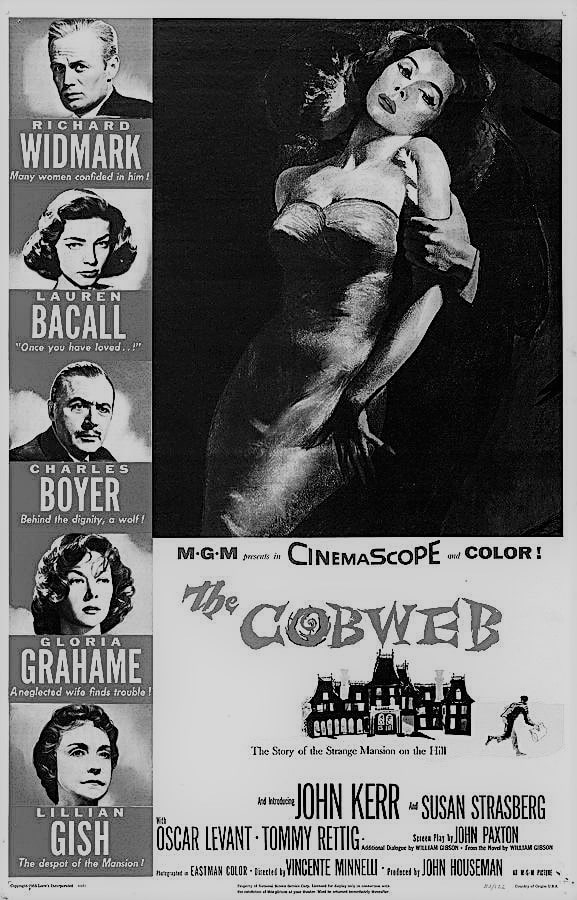 COBWEB, THE (1955)
COBWEB, THE (1955) (125 Min.) Genre: 1950 DRAMA, Transfer Quality: A
William Gibson's novel The Cobweb was brought to the screen by MGM with an impressive, hand-picked cast. Richard Widmark plays the head of a posh psychiatric clinic. Widmark's wife Gloria Grahame jockeys for the honor of selecting new drapes for the hospital's library. One wouldn't think that such a trivial decision would spark so much melodrama; but thanks to those drapes, we are allowed to probe the disturbed psyches of martinet business affairs director Lillian Gish, philandering doctor Charles Boyer, lonely activities director Lauren Bacall, and suicidal patient John Kerr. Oscar Levant, who spent most of his life in and out of "little white rooms", is ideally cast as a neurotic musician, while Fay Wray has a superb cameo as Boyer's long-suffering wife. Cobweb served as the screen debuts for both John Kerr and Susan Strasberg. — Hal Erickson
Starring: Richard Widmark, Lauren Bacall, Charles Boyer, Gloria Grahame, Lillian Gish, Fay Wray | Directed by: Vincente Minnelli
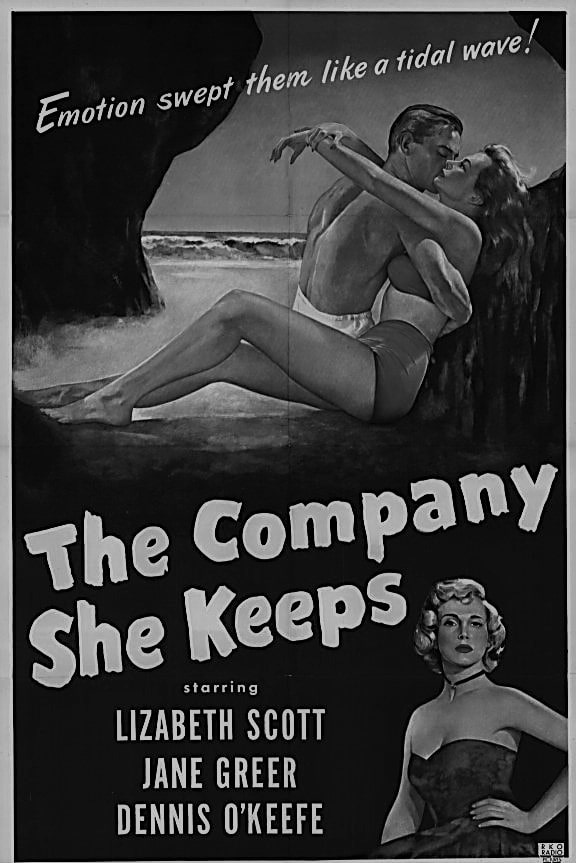 COMPANY SHE KEEPS, THE (1950)
COMPANY SHE KEEPS, THE (1950) (82 Min.) Genre: 1950 DRAMA, Transfer Quality: A
Jane Greer plays a hard-boiled dame so well in The Company She Keeps that the film's outcome remains in doubt right up to the end. Placed in the custody of parole officer Joan (Lizabeth Scott), Diane (Greer) immediately makes a play for Joan's boyfriend, newspaper columnist Larry (Dennis O'Keefe). Despite the nagging belief that Diane is just plain no good, Joan magnanimously tries to smooth the path of true love for the girl and Larry. Despite the engaging performances of the stars and the smooth direction of John Cromwell, The Company She Keeps failed to connect with audiences, and ended up a $315,000 loser. Trivia alert: that lady in the train terminal with the two unruly kids is Dorothy Bridges, the wife of actor Lloyd Bridges. And those two troublesome tots are Dorothy and Lloyd's sons Beau and Jeff! — Hal Erickson
Starring: Lizabeth Scott, Jane Greer, Dennis O'Keefe, Fay Baker | Directed by: John Cromwell
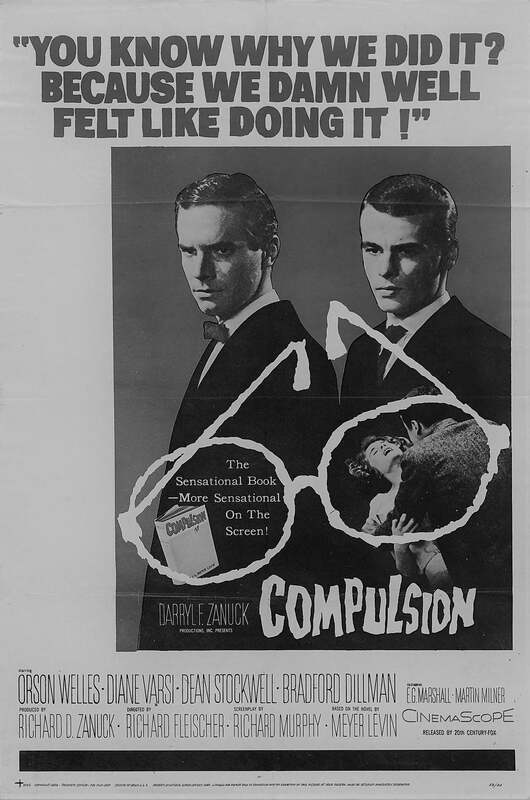 COMPULSION (1959)
COMPULSION (1959) (77 Min.) Genre: 1950 DRAMA, Transfer Quality: A
Compulsion is a compelling, stylish thriller, loosely based on the famous 1924 murder trial of thrill-killers Loeb and Leopold, two homosexual students who murdered a young boy to demonstrate their intellectual superiority. Artie Straus (Bradford Dillman) is a sadistic, mother-dominated bully. Judd Steiner (Dean Stockwell) is a submissive, introverted sissy. Having been raised by wealthy, arrogant families, both Artie and Judd consider themselves above conventional morality. Unfeeling and conceited, the boys, after the killing, take delight in offering to aid in finding the culprits. It is this arrogance which leads to their capture and prosecution for the murders. Jonathan Wilk (Orson Welles), playing a Clarence Darrow-like criminal defense attorney, takes on the case, and puts on a defense, without the cooperation of his clients, who will offer no explanation for what they have done. Bradford Dillman gives an outstanding performance, as does Dean Stockwell as the utterly unsympathetic murderers. Orson Welles is flamboyantly imposing as Wilk, who must use all his wits to try to save the boys from execution. Compulsion is a suspenseful courtroom drama, even though most viewers will know the outcome. Tautly directed by Richard Fleischer, the film is an outstanding, believable courtroom drama. — Linda Rasmussen
Starring: Orson Welles, Dean Stockwell, Bradford Dillman, Diane Varsi, E.G. Marshall | Directed by: Richard Fleischer
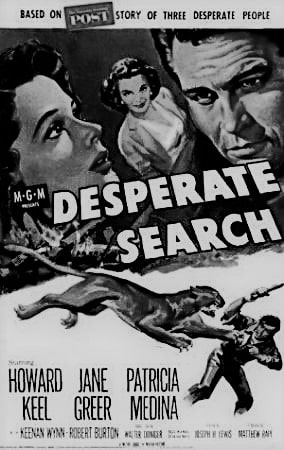 DESPERATE SEARCH (1952)
DESPERATE SEARCH (1952) (71 Min.) Genre: 1950 DRAMA, Transfer Quality: B
Desperate Search is a lower-echelon MGM programmer, elevated by the crisp direction of cult favorite Joseph H. Lewis. Jane Greer plays the mother of two small children who are on board an airliner which crashes. The children survive, but are stranded in the middle of the Canadian wilderness. With the help of forest ranger Keenan Wynn and bush pilot Howard Keel, Greer launches an agonizing all-points search for the missing children. Desperate Search was an entertaining and efficient means for MGM to keep its contract players busy at minimum cost.
Starring: Howard Keel, Jane Greer, Patricia Medina, Keenan Wynn | Directed by: Joseph H. Lewis
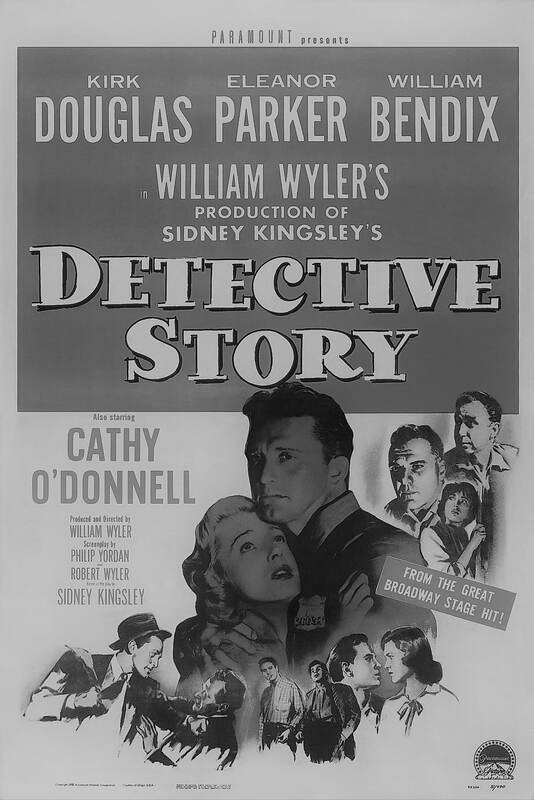 DETECTIVE STORY (1951)
DETECTIVE STORY (1951) (103 Min.) Genre: 1950 DRAMA, Transfer Quality: A
Sidney Kingsley's Broadway play Detective Story was praised for its realistic view of an event-filled day in a single police precinct station. The film, directed by meticulous taskmaster William Wyler, manages to retain this realism, even allowing for the star-turn performance of Kirk Douglas. A stickler for the letter of the law, Detective James McLeod (Douglas) is not averse to using strong-arm methods on criminals and witnesses alike in bringing lawbreakers to justice. He is particularly rough on a first-time offender (Craig Hill), on whom the rest of the force is willing to go easy because of the anguish of his girlfriend (Cathy O'Donnell). But McLeod's strongest invective is reserved for shady abortion doctor Karl Schneider (George MacReady); McLeod all but ruins the case against Schneider by beating him up in the patrol wagon. When McLeod discovers that his own wife (Eleanor Parker) had many years earlier lost a baby in one of Schneider's operations, and that the baby's father was gangster Tami Giacoppetti (Gerald Mohr), it is too much for the detective to bear. Punctuating the grim proceedings with brief moments of humor is future Oscar winner Lee Grant, reprising her stage role as a timorous shoplifter; it would be her last Hollywood assignment until the early 1960s, thanks to the iniquities of the blacklist. Despite small concessions to Hollywood censorship, Detective Story largely upheld the power of its theatrical original, and it forms a clear precursor to such latter-day urban police dramas as NYPD Blue.
Starring: Kirk Douglas, Eleanor Parker, William Bendix, Lee Grant | Directed by: William Wyler
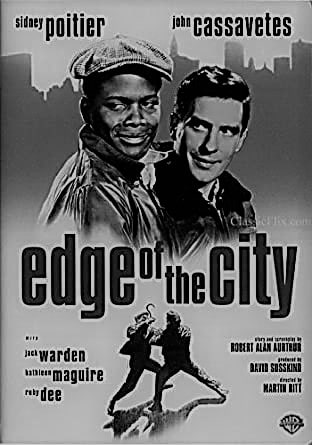 EDGE OF THE CITY (1957)
EDGE OF THE CITY (1957) (85 Min.) Genre: 1950 DRAMA, Transfer Quality: B
Edge of the City is a modern morality play, acted out in the railyards of New York. AWOL soldier John Cassavetes takes a job as a railroad worker, where he is taunted and bullied by supervisor Jack Warden, a union functionary appointed by the Mob. Cassavetes befriends his African-American co-worker Sydney Poitier, whose very presence enrages the bigoted Warden. Poitier dies in an "accident" arranged by Warden; Cassavetes knows the truth, but is frightened into silence by the corrupt union. Inspired by Poitier's widow to stand up for what is right, Cassavetes challenges Warden in a climactic one-on-one battle. Edge of the City was produced by David Susskind, who'd previously staged Robert Alan Aurthur's screenplay for television under its original title, A Man is Ten Feet Tall.
Starring: John Cassavetes, Sidney Poitier, Jack Warden, Kathleen Maguire, Ruby Dee | Directed by: Martin Ritt
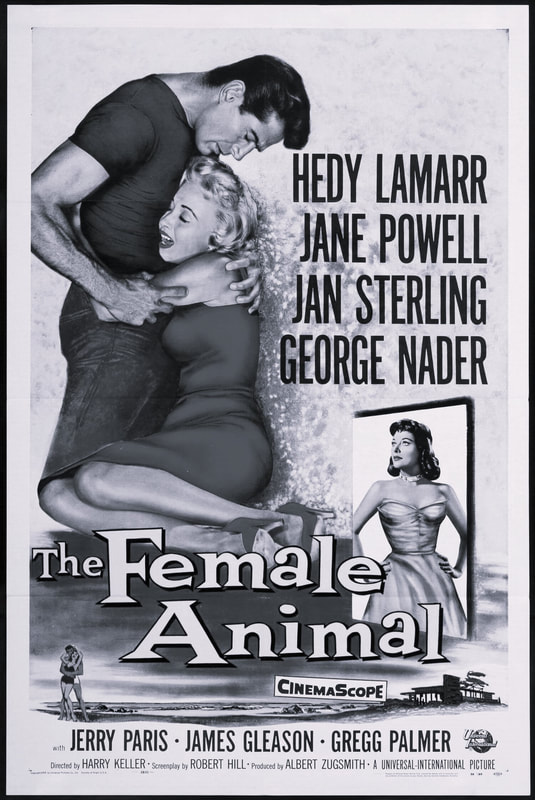 FEMALE ANIMAL, THE (1957)
FEMALE ANIMAL, THE (1957) (83 Min.) Genre: 1950 DRAMA, Transfer Quality: B
Harry Keller, the man who directed the extra scenes in Orson Welles' Touch of Evil, receives solo directorial credit in The Female Animal. Hedy Lamarr stars as Vanessa Windsor, a beautiful but ageing film star whose life is saved on the set by handsome extra Chris Farley (George Nader). Falling in love with Chris, Vanessa finds herself in competition with her own adopted daughter Penny (Jane Powell). Meanwhile, poor Chris struggles to become his "own man", and not merely the sexual plaything of two predatory females. Stealing the film from the nominal stars are Jan Sterling as a fading beauty with romantic notions of her own, and James Gleason as a crusty but likeable agent.
Starring: Hedy Lamarr, Jane Powell, Jan Sterling, George Nader, Jerry Paris, James Gleason | Directed by: Harry Keller
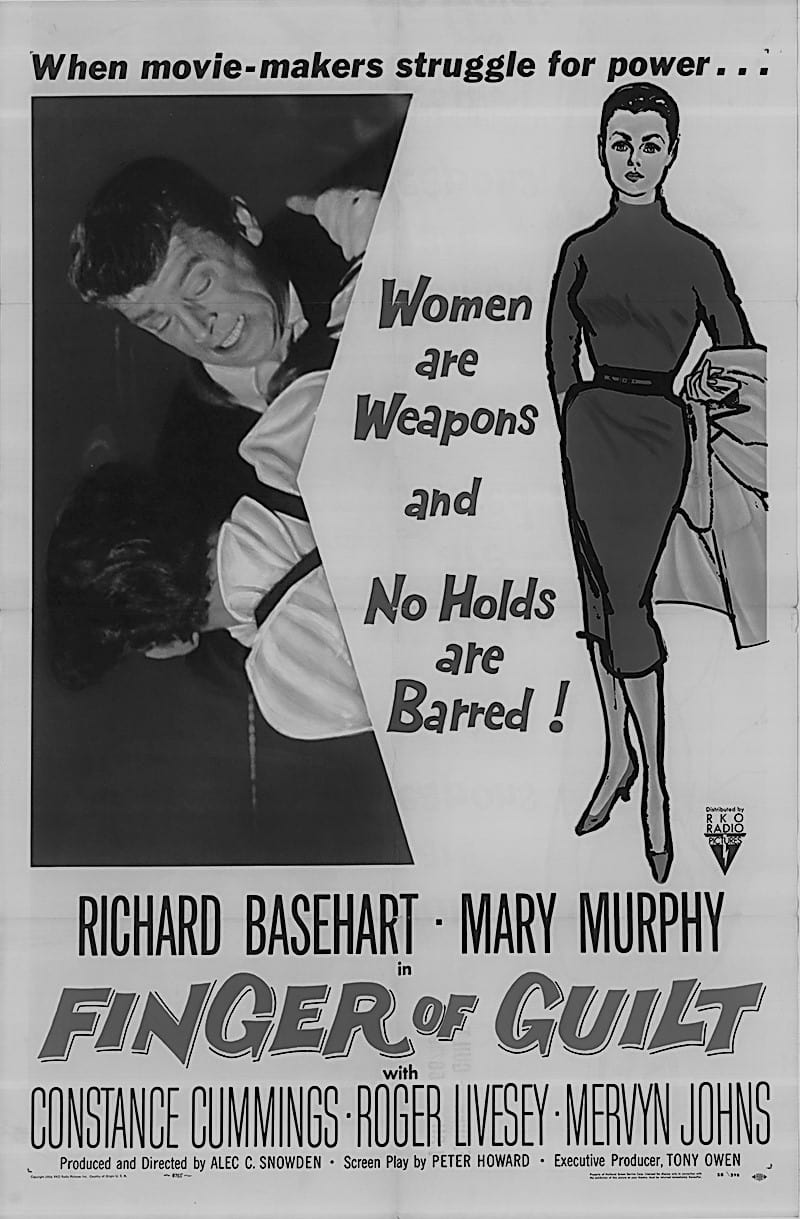 FINGER OF GUILT (1956)
FINGER OF GUILT (1956) (95 Min.) Genre: 1950 DRAMA, Transfer Quality: A
A noted expatriate filmmaker's hard work to reestablish himself in Britain is nearly undone when a woman who claims to be his one-time mistress begins writing him threatening letters. This sudden revelation threatens not only his marriage but also his career. It doesn't help that the director doesn't know the blackmailer's identity. He finds out that her letters are coming from Newcastle, and so he and his wife head off to learn the truth. They meet her and his wife is so convinced that she leaves. Unfortunately, the director still doesn't recognize this woman who seems to have such intimate knowledge of him, and he begins to question his own sanity. The rest of the mystery centers on his attempts to learn the truth about the woman and her true motives. — Sandra Brennan
Starring: Richard Basehart, Mary Murphy, Constance Cummings, Roger Livesey | Directed by: Joseph Losey
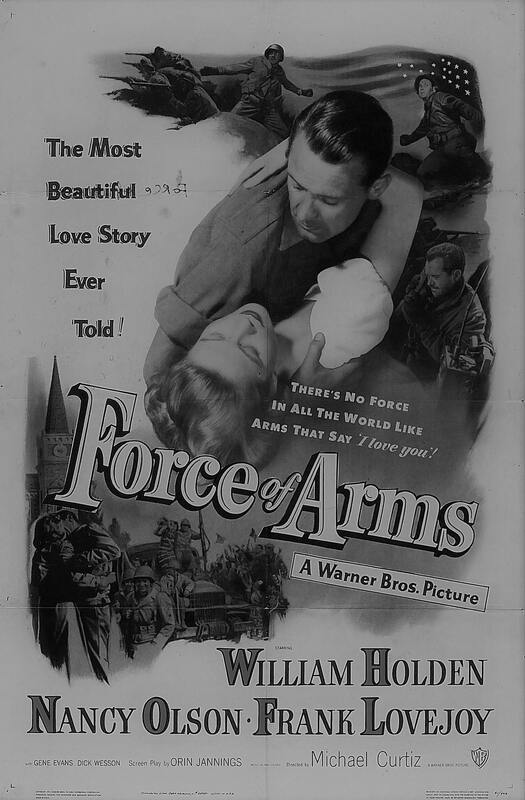 FORCE OF ARMS (1951)
FORCE OF ARMS (1951) (105 Min.) Genre: 1950 DRAMA, Transfer Quality: B
A Girl for Joe was the reissue title for the 1951 WWII romantic drama Force of Arms. William Holden and Nancy Olson, previously teamed in Sunset Boulevard and Union Station, co-star once more as, respectively, an Army sergeant and a WAC officer. While on leave, Holden and Olson fall in love, but before long Holden is sent back to the front. Surviving the battle of San Pietro, Holden is tortured by the fact that he may have "choked" under fire, indirectly causing the deaths of his CO Frank Lovejoy and several of his comrades. Even after his happy marriage to Olson, Holden cannot purge himself of his guilt feelings. Despite his wife's protestations, Holden re-ups to atone for past mistakes. Told that Holden is missing in action, Nancy refuses to give her husband up for dead and heads for the front herself. Officially based on a short story by Richard Tregaskis, this drama is actually a semi-remake of Hemingway's A Farewell to Arms, previously filmed in 1932 (this may partially explain why Warner Bros., producers of Force of Arms, purchased the rights to the 1932 film).
Starring: William Holden, Nancy Olson, Frank Lovejoy, Gene Evans | Directed by: Michael Curtiz
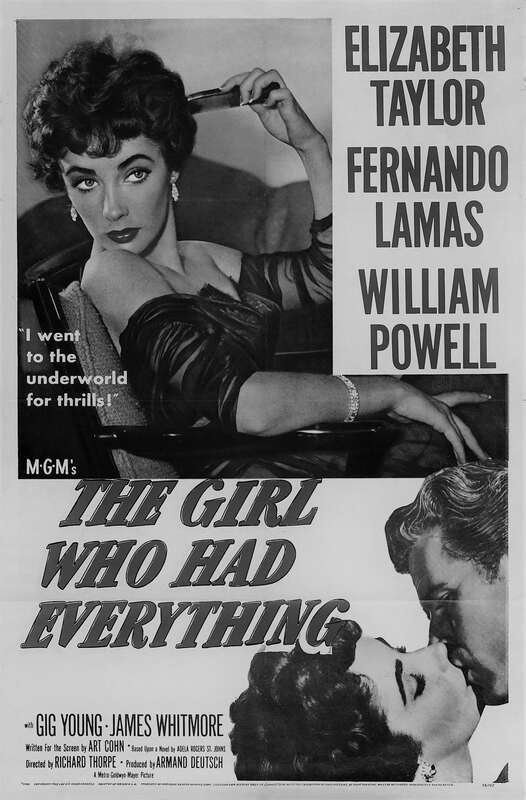 GIRL WHO HAD EVERYTHING, THE (1953)
GIRL WHO HAD EVERYTHING, THE (1953) (70 Min.) Genre: 1950 DRAMA, Transfer Quality: A
A good man tries to warn his daughter away from a bad man who has stolen her heart in this melodrama. Steve Latimer (William Powell) is a successful defense attorney who has gone out of his way to give his daughter Jean (Elizabeth Taylor) every advantage in life. However, Steve's generosity and open minded attitude begin to backfire on him when Jean decides to throw off her boyfriend, the solid and sensible Vance Court (Gig Young), in favor of Victor Ramondi (Fernando Lamas), a handsome but dangerous man with criminal connections whom Steve is representing. Steve tries to warn Jean away from Victor, but she remains undeterred, and accepts his proposal of marriage, even as the authorities tighten their grip on Victor and his crime syndicate. The Girl Who Had Everything was a remake of the 1931 Norma Shearer vehicle A Free Soul. — Mark Deming
Starring: Elizabeth Taylor, Fernando Lamas, William Powell, Gig Young | Directed by: Richard Thorpe
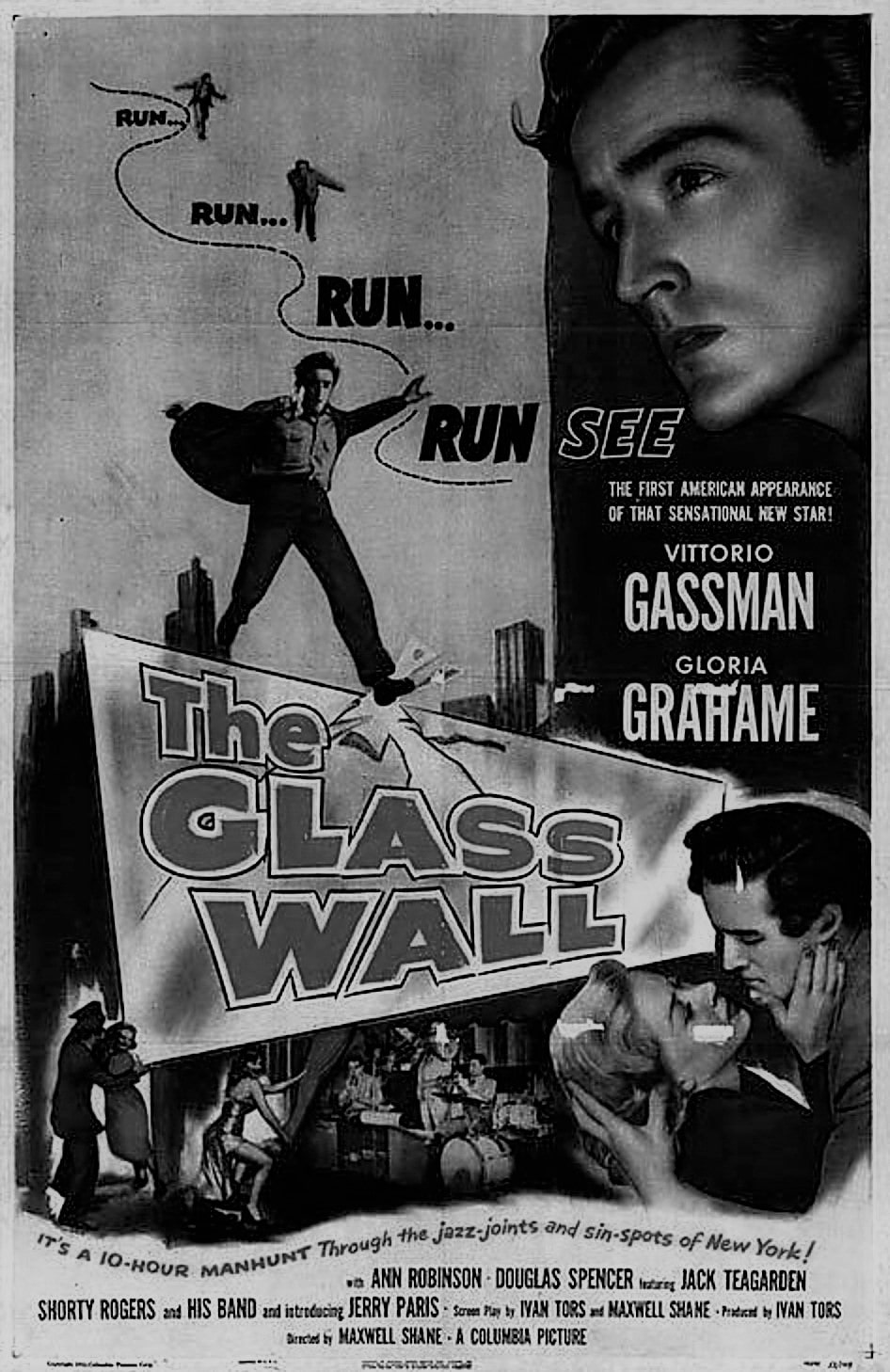 GLASS WALL, THE (1953)
GLASS WALL, THE (1953) (82 Min.) Genre: 1950 DRAMA, Transfer Quality: B
This drama chronicles the exploits of Peter, a European desperate to enter the United States. Because he can't be granted asylum due to the lack of proper papers, he resorts to jumping ship and sneaking in. In the Big Apple, he is assisted by two people who know about his past. One of them is a jazz musician, a former American pilot shot down in Europe during WWII. Peter helped the man then and hopes that he will now vouch for Peter in his attempts to obtain legal papers by showing that he was instrumental in aiding underground activities during the war to help the Allied cause.
Starring: Vittorio Gassman, Gloria Grahame, Ann Robinson, Douglas Spencer | Directed by: Maxwell Shane
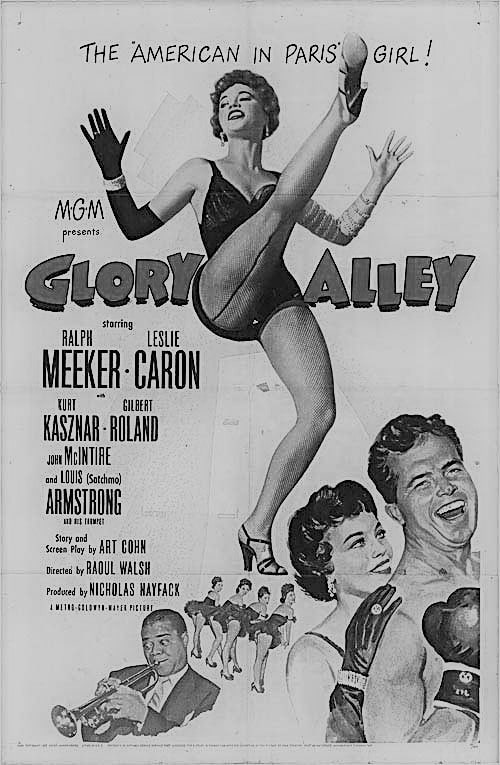 GLORY ALLEY (1952)
GLORY ALLEY (1952) (79 Min.) Genre: 1950 DRAMA, Transfer Quality: A
Authentic New Orleans locations enhance the overall enjoyment of the prizefight melodrama Glory Alley. A mere few seconds before a championship bout, Socks Barbarrosa (Ralph Meeker) decides to throw in the towel so far as his boxing career is concerned. Socks' friends, family and handlers assume that he's turned yellow. A series of complex flashbacks, coupled with a subsequent tour of duty in Korea, prove otherwise. For those not interested in cinematic pugilism, Glory Alley offers such sidelines pleasures as the jazz music of Jack Teagarden and the dancing of leading lady Leslie Caron. Kurt Kazner also provides some choice moments as a blind "boxing groupie" who happens to be Caron's father.
Starring: Ralph Meeker, Leslie Caron, Kurt Kasznar, Gilbert Roland, John McIntire | Directed by: Raoul Walsh
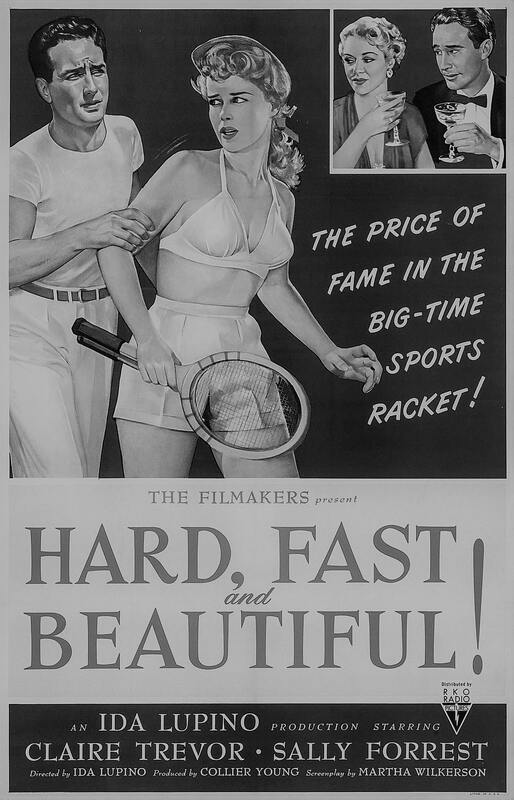 HARD, FAST AND BEAUTIFUL (1951)
HARD, FAST AND BEAUTIFUL (1951) (79 Min.) Genre: 1950 DRAMA, Transfer Quality: B
Ida Lupino, one of the few major Hollywood actresses to move from the sound stage to the director's chair in the 1940s and 1950s, helmed this story about a mother's obsessive drive to see her daughter succeed. Florence Farley (Sally Forrest) is a young woman with a tremendous gift as a tennis player, and her mother Milly (Claire Trevor) is determined to see Florence make the most of her talents. However, Milly's greatest concern isn't with her daughter's happiness or well-being, but with her own financial success, and when Milly begins interfering with Florence's romance with Gordon McKay (Robert Clarke), the daughter begins to rebel against her mother. Director Lupino and actor Robert Ryan both make cameo appearances as spectators at a tennis match.
Starring: Claire Trevor, Sally Forrest, Carleton Young, Robert Clarke | Directed by: Ida Lupino
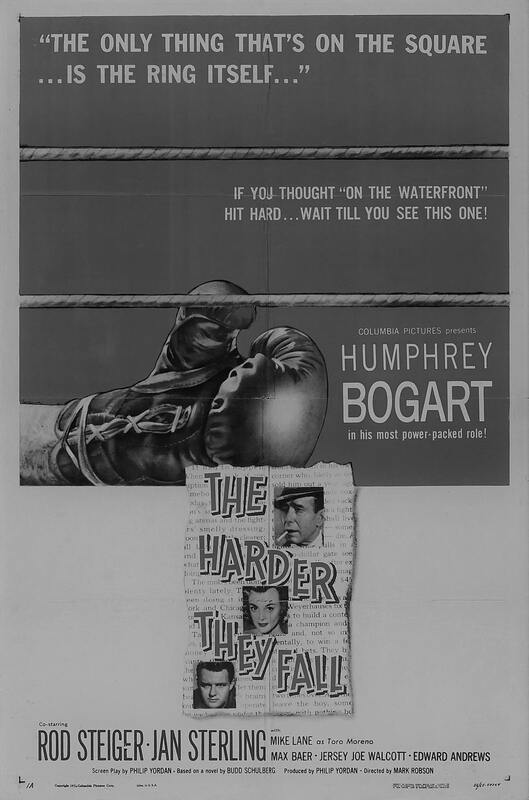 HARDER THEY FALL, THE (1956)
HARDER THEY FALL, THE (1956) (108 Min.) Genre: 1950 DRAMA, Transfer Quality: A
An obviously ailing Humphrey Bogart made his final screen appearance in The Harder They Fall. Adapted from a novel by Budd Schulberg, the film is a thinly disguised a clef account of the Primo Carnera boxing scandal. Bogart is cast as unemployed newspaperman Eddie Willis, who sells his soul down the river when he signs on as press agent for slimy fight manager Nick Benko (Rod Steiger). It is Willis' job to stir up publicity for Benko's newest protégé, Argentinian boxer Toro Moreno (Mike Lane). Benko's boy quickly rises to the top of his profession, though everybody but Toro knows that all the fights have been fixed. Upon learning that Benko intends to bilk Toro of his earnings, Willis regains his integrity, tells the wide-eyed young pugilist the truth, then sits down to write a searing expose of the fight racket. Jan Sterling costars as Willis' estranged wife, while real-life boxers Jersey Joe Walcott and Max Baer are suitably cast as Toro's trainer and ring opponent, respectively. There is also a heartbreaking cameo appearance by ex-fighter Joe Greb, cast as a punchdrunk skid row bum. The Harder They Fall originally went out with two different endings: in one, Eddie Willis demanded that boxing be banned altogether, while in the other, Willis merely insisted that there be a federal investigation of the prizefighting business. The videotape version contains the "harder" denouement, while most TV prints end with the "softer" message.
Starring: Humphrey Bogart, Rod Steiger, Jan Sterling, Max Baer, Harold J. Stone, Nehemiah Persoff | Directed by: Mark Robson
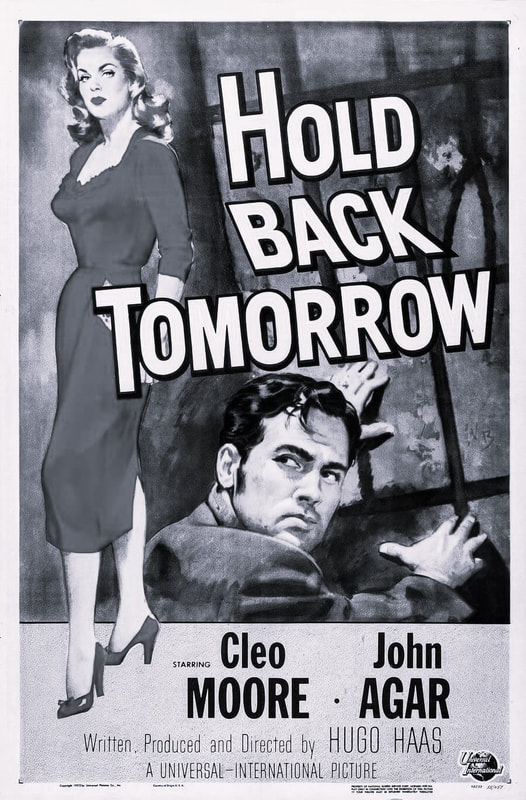 HOLD BACK TOMORROW (1955)
HOLD BACK TOMORROW (1955) (75 Min.) Genre: 1950 DRAMA, Transfer Quality: B
In this bizarre drama, an inmate on death row has one final request before his impending hanging: he wants to spend the night with a woman. The police bring him a suicidal prostitute. After a night of lovemaking, the two decide they are in love and are married by the prison chaplain. This eases his torment about going to the gallows. Just before he is to be killed, he describes a dream he had where the rope breaks during the hanging, the death bell rings, and he is freed. As he prays for his miracle the death bell tolls and the film fades to black.
Starring: John Agar, Cleo Moore, Frank DeKova, Harry Guardino, Hugo Haas | Directed by: Hugo Haas
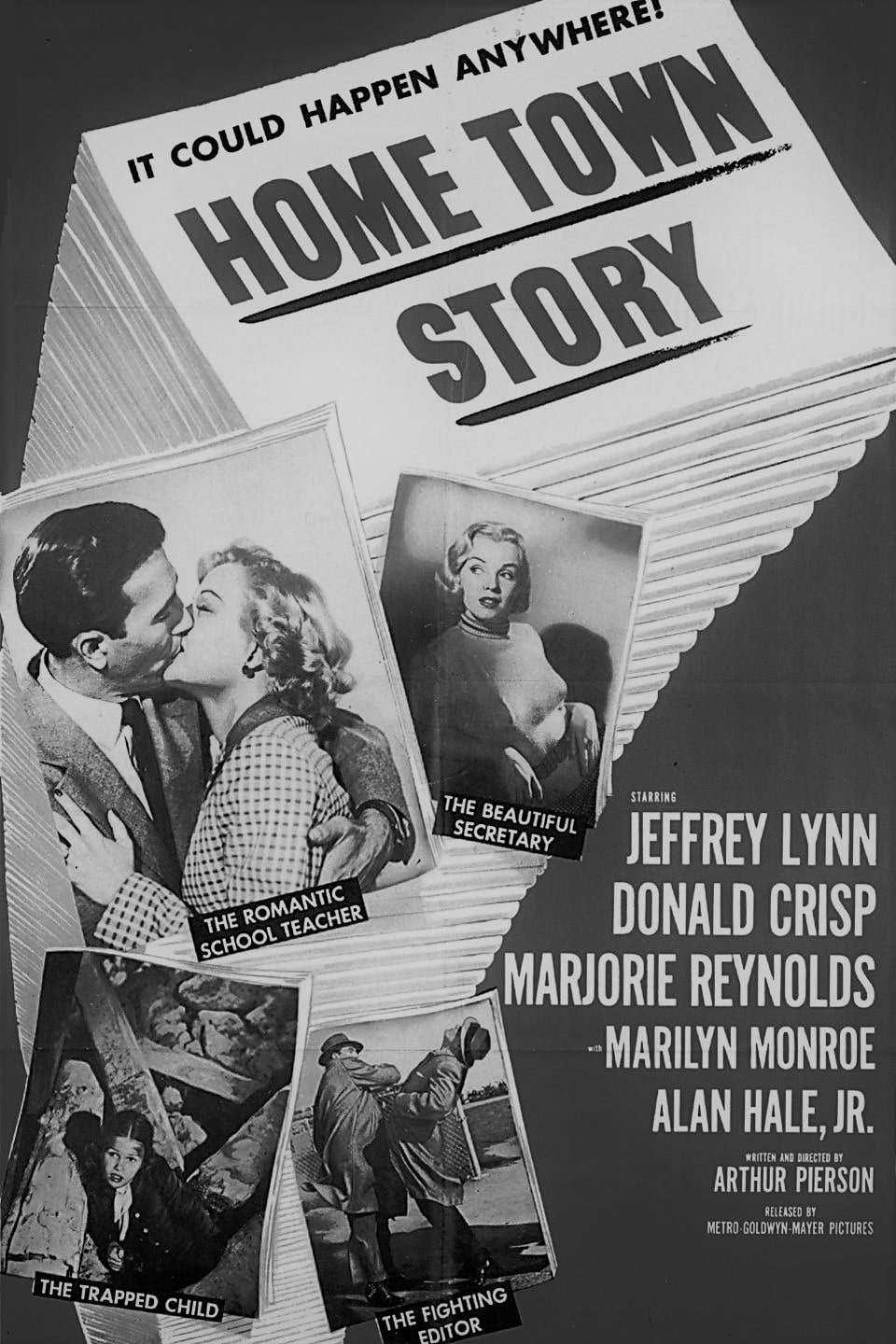 HOME TOWN STORY (1951)
HOME TOWN STORY (1951) (61 Min.) Genre: 1950 DRAMA, Transfer Quality: B
Home Town Story was commissioned as a pro-Big Business tract by General Motors. The story revolves around Blake Washburn, a mildly leftist newspaperman, played by Jeffrey Lynn. Returning to his home town, Washburn turns his journalistic vitriol upon the local business interests. Only after his kid sister Katie (Melinda Plowman), trapped in a cave-in, is rescued by locally produced technology, does Washburn realize the value of the capitalistic system. Home Town Story was fitfully distributed by MGM, then lapsed into obscurity. It might have remained there had it not been for the presence of a young Marilyn Monroe in a supporting part.
Starring: Jeffrey Lynn, Donald Crisp, Marjorie Reynolds, Marilyn Monroe, Barbara Brown, Alan Hale, Jr. | Directed by: Arthur Pierson
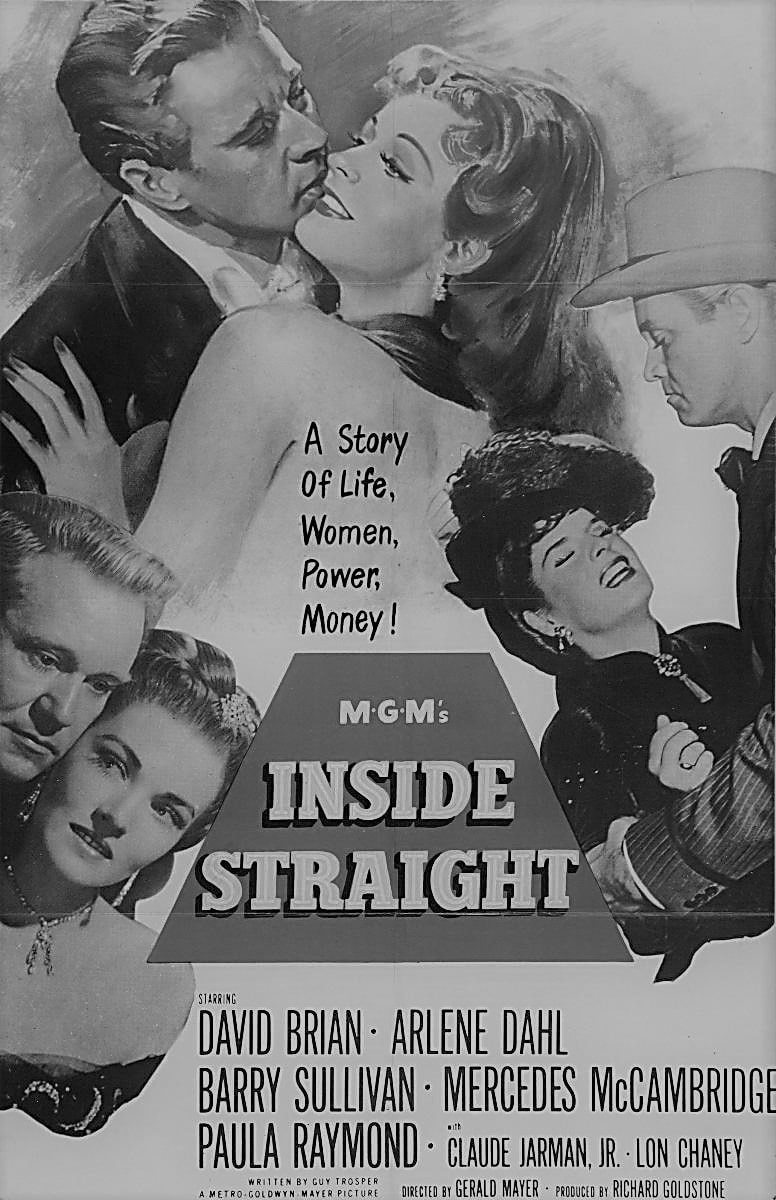 INSIDE STRAIGHT (1951)
INSIDE STRAIGHT (1951) (89 Min.) Genre: 1950 DRAMA, Transfer Quality: B
Director Gerry Mayer, nephew of MGM-head Louis B. Mayer, proved that nepotism had nothing to do with his hiring by turning out the first-rate historical melodrama Inside Straight. The film begins in 1870 San Francisco, as the city is threatened with financial disaster due to overspeculation on the Comstock Lode. David Brian stars as local tycoon Rip MacCool, who in a series of flashbacks recalls his rise to prominence. While wheeling and dealing with other people's money, MacCool loves and loses two wives: Lily Douvane (Arlene Dahl) takes him for every penny he's got, while Zoe Carnot (Paula Raymond) dies in childbirth. Back in the present, MacCool is forced to make a fateful decision that will, for once, benefit someone else rather than himself. In a supporting role as town banker Ada Stritch, Mercedes McCambridge figures prominently in the final sequence, in which everything hinges on the titular poker hand.
Starring: David Brian, Arlene Dahl, Barry Sullivan, Mercedes McCambridge | Directed by: Gerald Mayer
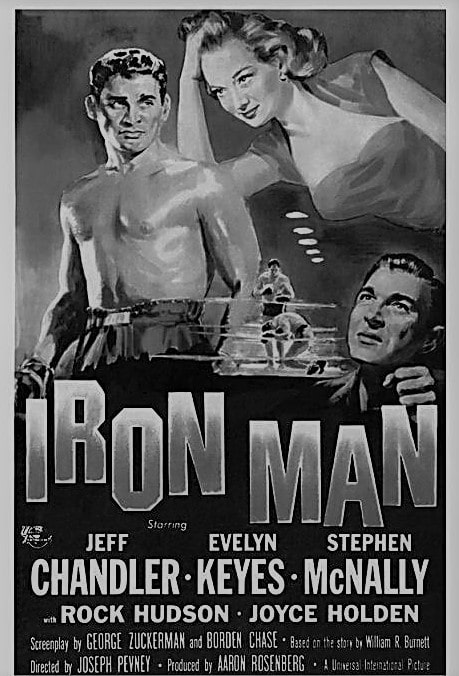 IRON MAN, THE (1951)
IRON MAN, THE (1951) (82 Min.) Genre: 1950 DRAMA, Transfer Quality: B
A remake of the 1931 film of the same name, Iron Man stars Jeff Chandler as up-and-coming boxer Cokie Martin. A relatively pleasant fellow outside the ring, Martin turns into a monster whenever he dons boxing gloves and trunks. As a result, he becomes "the man you love to hate" so far as the fans are concerned. Only his fiancee Rose (Evelyn Keyes) is willing to stand by him, but even her devotion is sorely tested when Cokie continues displaying his killer instinct. Only the intervention of "clean" fighter Speed O'Keefe (Rock Hudson) prevents Cokie from destroying himself. Told in flashback, Iron Man is at its best in its expository scenes, showing the hero working his way out of a coal mining town and into the championship. Joyce Holden co-stars as a good-time girl who enjoys a brief fling with the hero; in the original 1931 version, Holden's character was played by Jean Harlow.
Starring: Jeff Chandler, Evelyn Keyes, Stephen McNally, Rock Hudson, Joyce Holden, James Arness | Directed by: Joseph Pevney
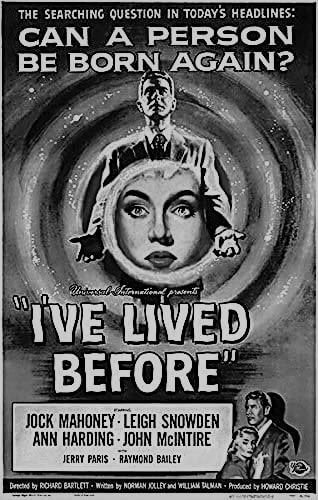 I'VE LIVED BEFORE (1956)
I'VE LIVED BEFORE (1956) (82 Min.) Genre: 1950 DRAMA, Transfer Quality: B
The "Bridey Murphy" craze of the 1950s was the catalyst for I've Lived Before. Jock Mahoney plays a contemporary pilot who survives a plane crash. Upon awakening, he is under the delusion that he is another airman, who died during the first World War. The authorities pass this insistence off as delirium, until Mahoney starts recounting events and intimacies that only the long-dead pilot would know. Ann Harding portrays the ageing former lover of the soul trapped within Mahoney's body.
Starring: Jock Mahoney, Leigh Snowden, John McIntire, Ann Harding | Directed by: Richard H. Bartlett
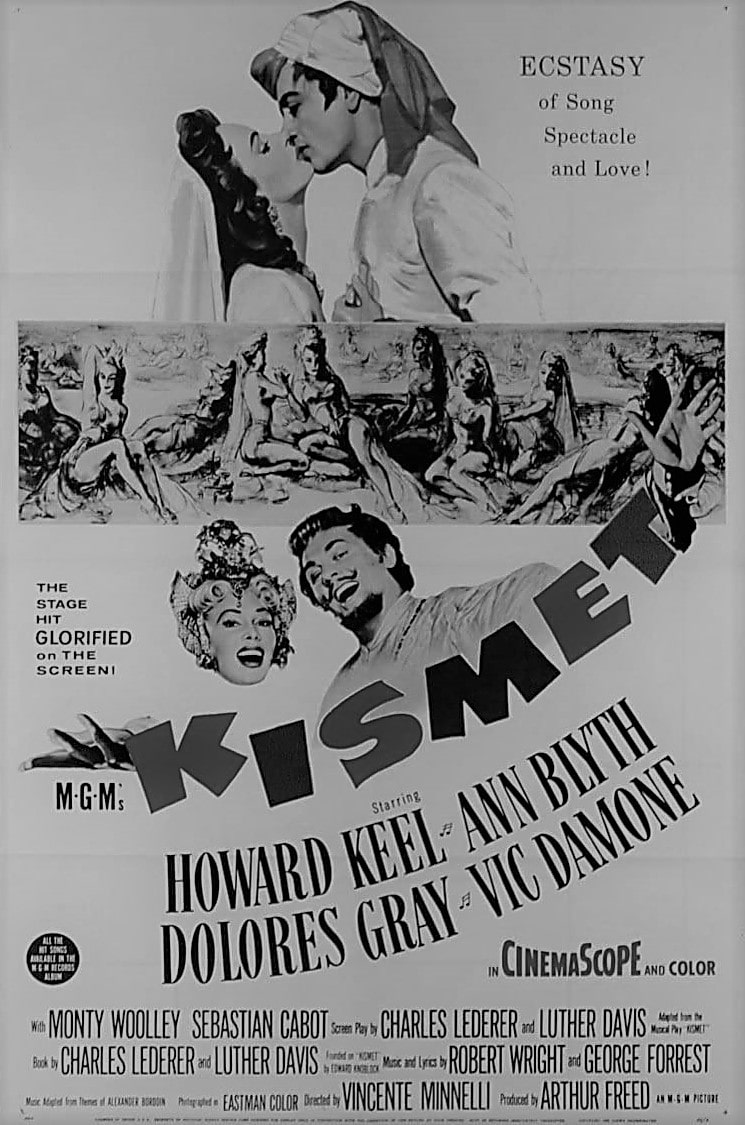 KISMET (1955)
KISMET (1955) (113 Min.) Genre: 1950 DRAMA, Transfer Quality: A
This fourth film version of the warhorse Edward Knoblock theatrical piece Kismet was based on the Broadway musical version of the same property. Howard Keel stars as Hadji, the poet of old Baghdad, who goes from beggar to millionaire in a single day. Hadji's daughter Marsinah (Ann Blyth) falls in love with the young Caliph (Vic Damone), while Lalume (Dolores Gray), the sexy wife of the despotic Wazir (Sebastian Cabot), sets her sights on Hadji. Meanwhile, the Wazir plots and plans to topple the Caliph from the throne and to add Marsinah to his own harem. Making periodic appearances is Omar Khayyam, played as a doddering old meddler by Monty Woolley. The Robert Wright-George Forrest musical score, based on themes by Borodin, includes such standards as "Baubles, Bangles and Beads", "This is My Beloved", "Stranger in Paradise" and "Not Since Ninevah". Though the dancing girls in the film are more modestly dressed than their stage counterparts, they are put through some fairly sensuous paces by choreographer Jack Cole. Kismet was good for another go-round in 1967, when it was adapted for television with Jose Ferrer, Barbara Eden, Anna Maria Alberghetti, George Chakiris and Hans Conried in the cast. -- Hal Erickson
Starring: Howard Keel, Ann Blyth, Dolores Gray, Vic Damone | Directed by: Vincente Minnelli
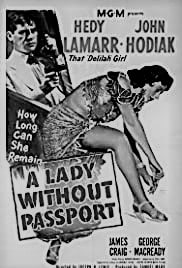 LADY WITHOUT PASSPORT, A (1950)
LADY WITHOUT PASSPORT, A (1950) (72 Min.) Genre: 1950 DRAMA, Transfer Quality: A
A Lady Without Passport stars Hedy Lamarr in the title role. Lamarr plays Marianne Lorress, a concentration-camp refugee who takes up residence in Cuba while waiting permission to enter the U.S. Immigration agent Pete Karczag (John Hodiak) decides to use Marianne as bait to entrap Palinov (George Macready), the brains of an alien-smuggling ring. Pete eventually falls in love with Marianne, but she despises him for using her—at least until fade-out time. Despite the tattoo on her arm, it is difficult to believe that Hedy Lamarr has survived a Nazi concentration camp; she appears instead to have staged a desperate escape from the MGM makeup department. This aside, A Lady without Passport is an acceptable (and commendably short) crime meller. — Hal Erickson
Starring: Hedy Lamarr, John Hodiak, James Craig, George Macready | Directed by: Joseph H. Lewis
 LIFE IN THE BALANCE, A (1955)
LIFE IN THE BALANCE, A (1955) (74 Min.) Genre: 1950 DRAMA, Transfer Quality: B
Third-billed Lee Marvin dominates the proceedings in A Life in the Balance. Marvin plays a psycho killer, whose trail is dogged by inquistive young Jose Perez. Jose's father, musician Ricardo Montalban, has been accused of a series of murders. The boy is convinced (correctly, it turns out) that Marvin is the guilty party, and trails the man in hopes of bringing him to justice. No dummy he, Perez leaves a trail for the authorities to follow--a series of smashed-up police call boxes (a similar plot device was deployed for comic purposes by Harold Lloyd in Professor Beware). A Life in the Balance was filmed on location in Mexico City, with a great deal of screen time devoted to a colorful carnival.
Starring: Ricardo Montalban, Anne Bancroft, Lee Marvin, Jose Perez | Directed by: Harry Horner
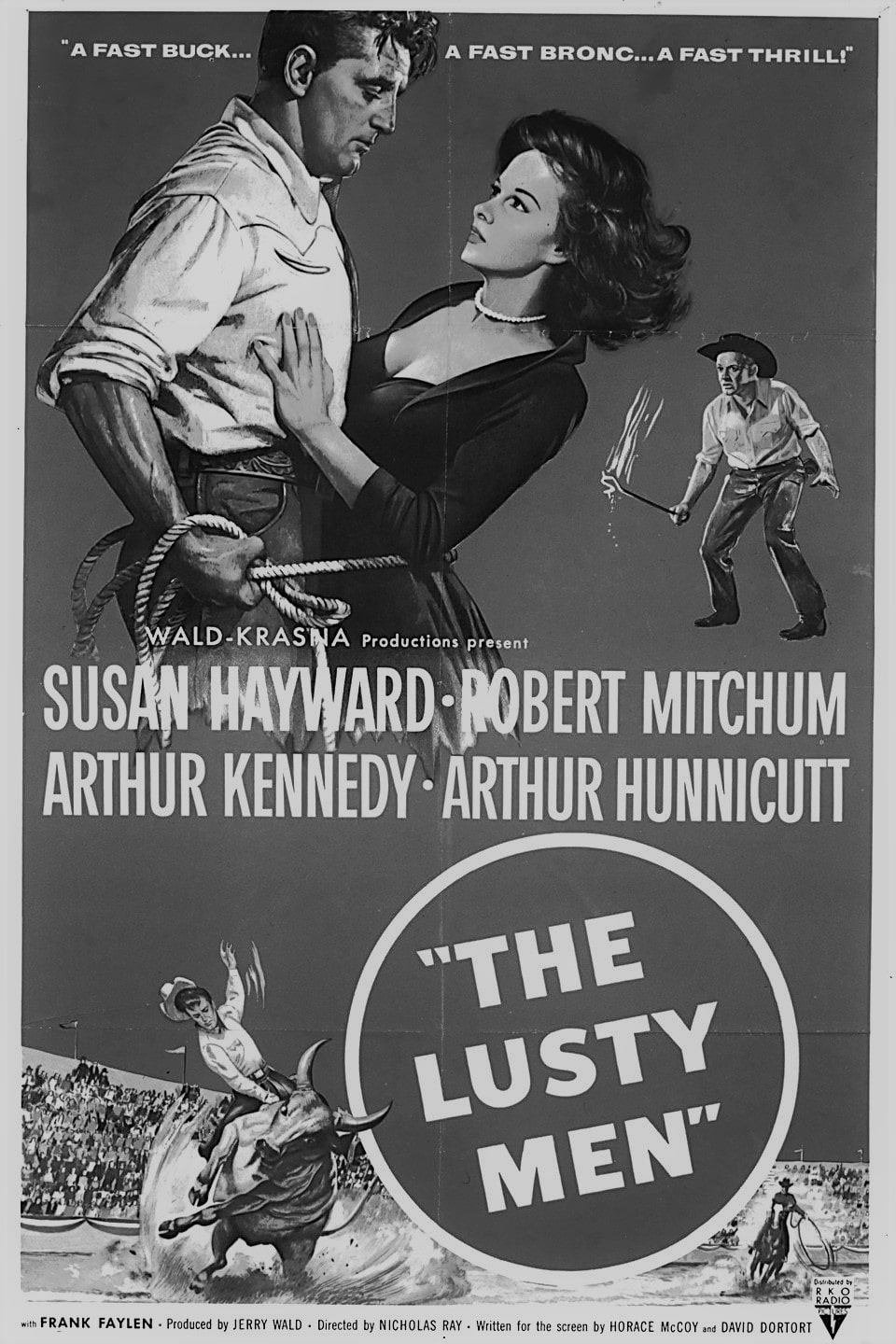 LUSTY MEN, THE (1952)
LUSTY MEN, THE (1952) (113 Min.) Genre: 1950 DRAMA, Transfer Quality: A
The titular Lusty Men are rodeo riders in this modern-day western, assembled with a touch of the offbeat by director Nicholas Ray. Former rodeo star Robert Mitchum, disabled by a series of accidents, hobbles back to his Oklahoma hometown in hopes of replenishing his bank account. Aspiring bronco-buster Arthur Kennedy hires Mitchum to train him for an upcoming rodeo, promising that they'll split the winnings. It doesn't take a crystal ball to predict that Mitchum will soon fall hard for Kennedy's wife Susan Hayward; she can take Mitchum or leave him, but decides to take him so that he'll continue to train Kennedy. After a falling out, Mitchum quits his job and enters the rodeo himself, hoping to win the prize from the arrogant Kennedy. He proves he still has what it takes, but does so at the price of his life. The Lusty Men was co-adapted by one-time cowboy David Dotort from a Life magazine story by Claude Stannish. — Hal Erickson
Starring: Susan Hayworth, Robert Mitchum, Arthur Kennedy, Arthur Hunnicutt | Directed by: Nicholas Ray
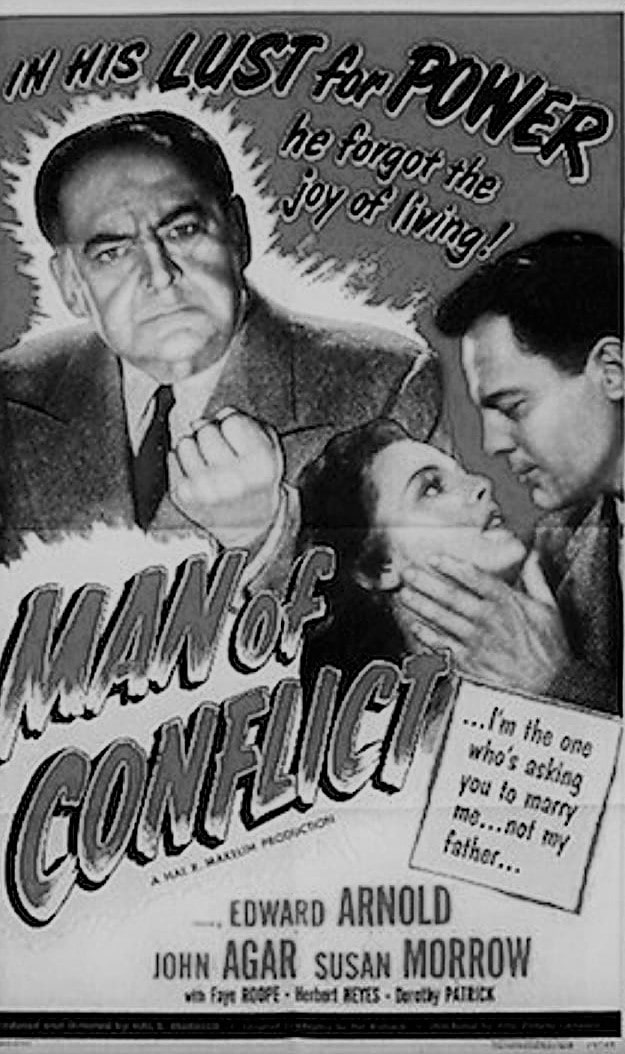 MAN OF CONFLICT (1953)
MAN OF CONFLICT (1953) (72 Min.) Genre: 1950 DRAMA, Transfer Quality: B
After several years of supporting roles, Edward Arnold once again enjoys top billing in the independently produced Man of Conflict. Arnold plays powerful industrialist J. R. Compton, who tries to force his son Ray (John Agar) to become as ruthless and hard-hearted as his dad. But Ray is cut from a different cloth; he treats the employees like human beings, rather than automatons. The father-son conflict rages on until the elder Compton finally realizes that his way is not always the best way. Well cast with some of the best character actors in the business, Man of Conflict makes up in good intentions and good acting what it lacks in production values.
Starring: Edward Arnold, John Agar, Susan Morrow, Fay Roope | Directed by: Hal R. Makelim
 MAN ON A TIGHTROPE (1953)
MAN ON A TIGHTROPE (1953) (105 Min.) Genre: 1950 DRAMA, Transfer Quality: B
Elia Kazan directed this drama inspired by a true story. Karel Cernik (Fredric March) is the leader of a troupe of Czechoslovakian circus performers who have been plying their trade in Eastern Europe for years. When Czechoslovakia falls under Communist rule, the proud and independent Cernik finds that he is no longer free to operate his circus as he sees fit. Many of his performers are conscripted into military service, and his equipment and possessions are declared government property, though the state fails to maintain it properly, or even to give him access to the material to fix it himself. Finally, when Cernik's remaining performers are ordered to insert pro-Communist messages into their acts, he decides that he can take no more and begins making plans to escape to Bavaria during an upcoming tour. Cernik's plans hit a snag, however, when he learns that one of his performers is a spy for the Czech communists, working in collusion with government factotum Fesker (Adolphe Menjou). While politics are making a mess of his professional life, his daughter Tereza (Terry Moore) is complicating matters at home because of her romance with the handsome but unreliable lion tamer Joe Vosdek (Cameron Mitchell), much to the chagrin of both Karel and his wife Zama (Gloria Grahame). The Birnbach Circus troupe, along with a variety of other European carnival performers, appear as themselves in this film, lending the performances a keen authenticity.
Starring: Fredric March, Gloria Grahame, Terry Moore, Cameron Mitchell, Adolphe Menjou, Richard Boone | Directed by: Elia Kazan
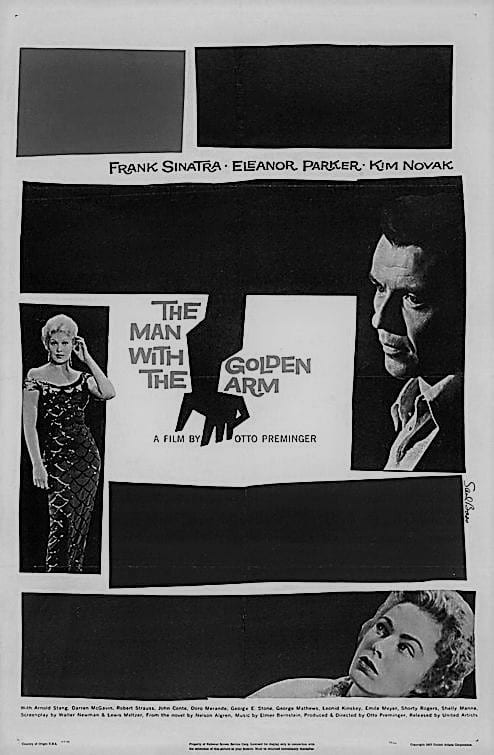 MAN WITH THE GOLDEN ARM, THE (1955)
MAN WITH THE GOLDEN ARM, THE (1955) (119 Min.) Genre: 1950 DRAMA, Transfer Quality: B
When Otto Preminger was willing to release his drug-addiction drama Man With the Golden Arm without the sanction of a Production Code seal, it proved to be yet another nail in the coffin of that censorial dinosaur. Based on the novel by Nelson Algren, the film stars Frank Sinatra as Frankie Machine, expert card dealer (hence the title). Recently released from prison, Frankie is determined to set his life in order -- and that means divesting himself of his drug habit. He dreams of becoming a jazz drummer, but his greedy wife Eleanor Parker wants him to continue his lucrative gambling activities. Since Parker is confined to a wheelchair as a result of a car accident caused by Frankie, he's in no position to refuse. Only the audience knows that Parker is not crippled, but is faking her invalid status to keep Frankie under her thumb. Gambling boss Robert Strauss wants Frankie to deal at a high-stakes poker game; terrified that he's lost his touch, Frankie asks dope pusher Darren McGavin to supply him with narcotics. When McGavin discovers that Parker is not an invalid, she kills him, and Frankie (who is elsewhere at the time) is accused of the murder. He is willing to go to the cops, but he doesn't want to show up with drugs in his system. So with the help of sympathetic B-girl Kim Novak, Sinatra locks himself up and goes "cold turkey"-a still-harrowing sequence, despite the glut of "doper" films that followed in the wake of this picture. After Parker herself is killed in a suicidal fall, the path is cleared for Frankie to pursue a clean new life with Novak.
Starring: Frank Sinatra, Eleanor Parker, Kim Novak, Darren McGavin, George E. Stone | Directed by: Otto Preminger
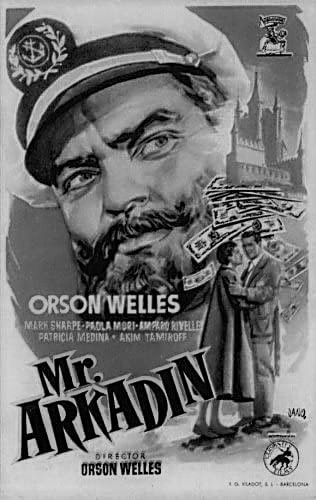 MR. ARKADIN (1955)
MR. ARKADIN (1955) (98 Min.) Genre: 1950 DRAMA, Transfer Quality: A
Also known as Mr. Arkadin, this flawed late effort by director Orson Welles recalls the structure of Citizen Kane, centering around an investigation into the past of a powerful millionaire. This time around, however, the millionaire is very much alive; in fact, it is Gregory Arkadin (Welles) himself who orders the inquiry, claiming to suffer from amnesia. The investigator soon gets a taste of the difficulty of his task, however, when several witnesses to Arkadin's past suspiciously turn up dead. Indeed, the closer he comes to the truth about Arkadin, the more he fears that he himself may be the next victim. While it aspires to intense suspense, Confidential Report suffers more than most of Welles' films from budgetary limitations and erratic shooting habits, with the final result often seeming choppy and needlessly confusing. Nevertheless, any Welles effort is by definition at least partially worthwhile, if only for further demonstration of his brilliant visual sensibility. — Judd Blaise
Starring: Orson Welles, Michael Redgrave, Jack Watling, Akim Tamiroff | Directed by: Orson Welles
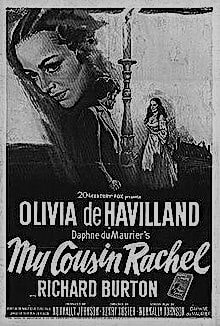 MY COUSIN RACHEL (1952)
MY COUSIN RACHEL (1952) (98 Min.) Genre: 1940 DRAMA, Transfer Quality: B
Olivia de Havilland and Richard Burton star in this adaptation of Daphne Du Maurier's gothic novel. In a reversal of Jane Eyre, it is the hero who arrives at the home of a mysterious woman. Rachel ($de Havilland} is the widow of a Cornish man of property ({$John Sutton}), who died in suspicious circumstances. Philip Ashley {$Burton} is the dead man's cousin, who in probing his relative's demise immediately suspects Rachel — and goes on suspecting her even after he falls in love with her. Going against the inheritance laws of the era, Burton turns over his cousin's estate to Rachel, but she refuses his entreaties of marriage. He soon falls ill, and it is whispered that Rachel has poisoned him. — Hal Erickson
Starring: Olivia de Havilland, Richard Burton, Audrey Dalton, Ronald Squire | Directed by: Henry Koster
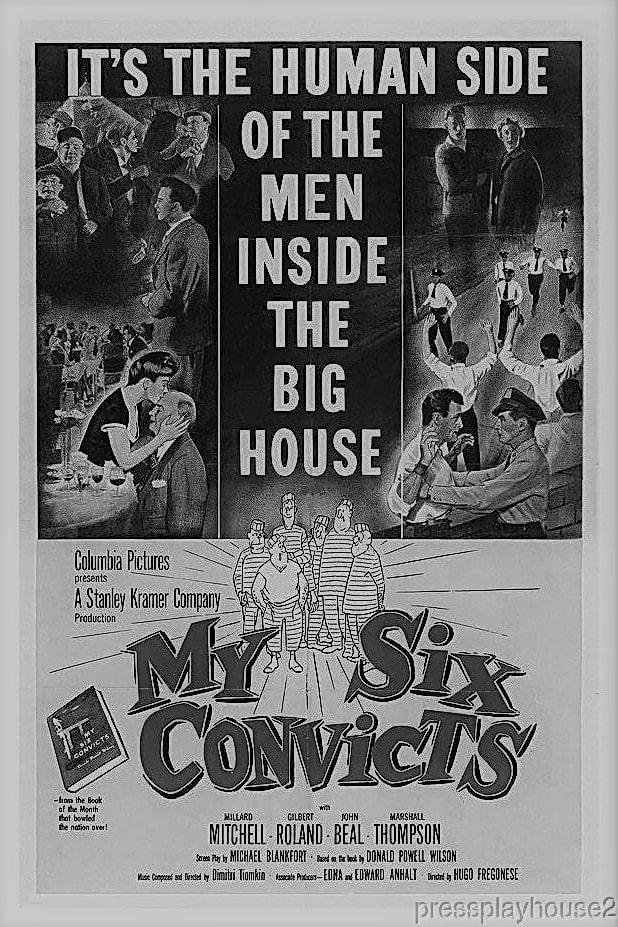 MY SIX CONVICTS (1952)
MY SIX CONVICTS (1952) (104 Min.) Genre: 1950 DRAMA, Transfer Quality: B
Stanley Kramer's production unit at Columbia Pictures was known for its willingness to tackle subject matter that was not necessarily "box office" (much to the dismay, of course, of Columbia head man Harry Cohn!) Adapted by Michael Blankfort from the autobiography by Donald Powell Wilson, My Six Convicts is the true story of a prison psychologist and his efforts to "reach" his incarcerated patients. John Beal plays the Donald Powell Wilson counterpart, herein known simply as Doc. Convinced that psychological rehabilitation is, indeed, an option, Doc overcomes a great deal of opposition — from both prison officials and prisoners — to test out his theories. Once he's won the confidence of hardened safecracker James Connie (Millard Mitchell), Doc is able to bring five more convicts into his circle: murderous mobster Punch Pinero (Gilbert Roland); alcoholic, self-sacrificing Blivens Scott (Marshall Thompson); holdup man Clem Randall (Alf Kjellin); psychopathic killer Dawson (Harry Morgan — yes, that Harry Morgan); and embezzler Steve Kopac (Jay Adler). These six cons learn to make their life behind bars not only tolerable but productive, and in so doing pass on their new outlook on life to their fellow inmates. Despite the seriousness of the subject matter, My Six Convicts is essentially a comedy, with the all-male cast working together in seamless perfection.
Starring: Gilbert Roland, Marshall Thompson, Millard Mitchell, John Beal | Directed by: Hugo Fregonese
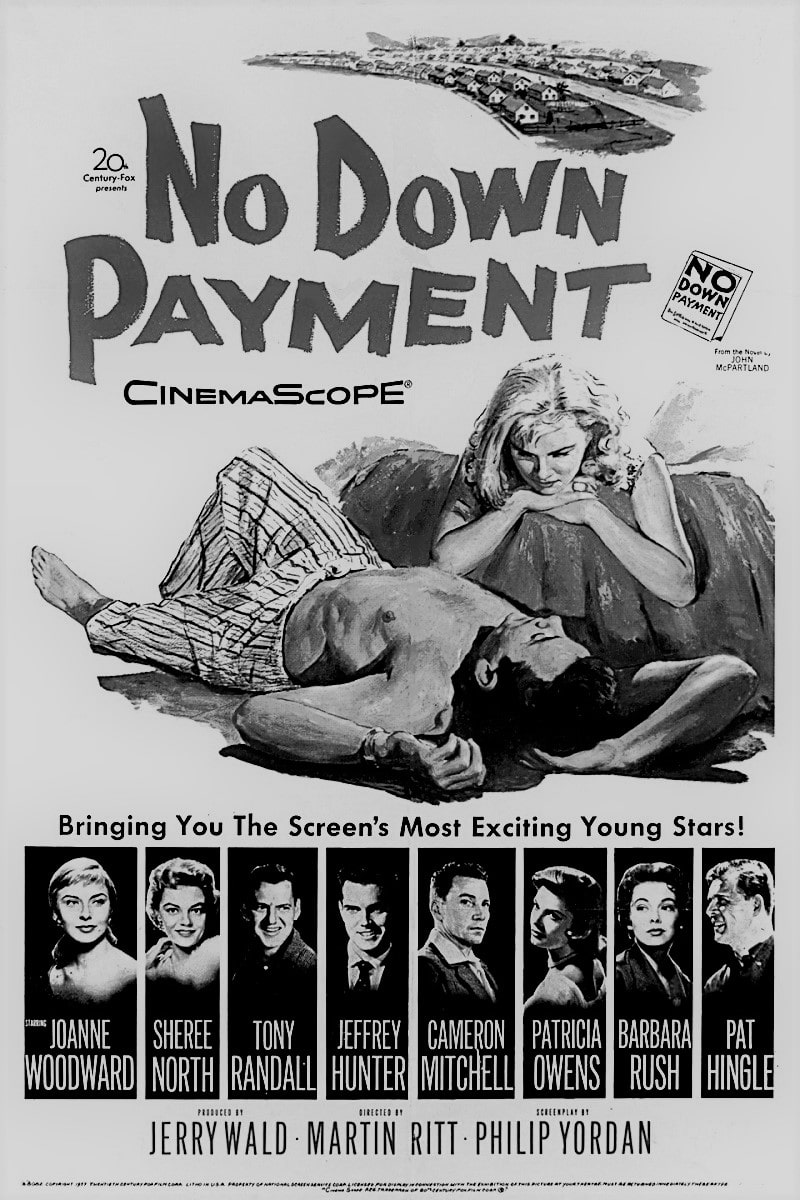 NO DOWN PAYMENT (1957)
NO DOWN PAYMENT (1957) (105 Min.) Genre: 1950 DRAMA, Transfer Quality: B
A handful of suburban couples discover that emotional turmoil lurks behind the placid exterior of the planned community of Sunrise Hills in this drama based on the novel by John McPartland. David and Jean Martin (Jeffrey Hunter and Patricia Owens) find their relationship starting to crumble after Jean is raped by Troy Boone (Cameron Mitchell), an alcoholic war veteran who has been unable to readjust to civilian life. Meanwhile, Troy's wife, Leola (Joanne Woodward), wants to start a family, but Troy isn't interested in having children. Jerry Flagg (Tony Randall) is a used car salesman who turns to drink to deal with the disappointments of his career and his life, which is more than his wife, Isabelle (Sheree North), bargained for in their relationship. And Herman Kreitzer (Pat Hingle) is the good-hearted proprietor of a hardware store who wants to help his Japanese-American assistant Iko (Aki Aleong) find a new home. Though Herman's wife, Betty (Barbara Rush), discourages him because of the reaction that she foresees from the rest of the community, she eventually sides with him and joins him in the effort to help Iko assimilate.
Starring: Joanne Woodward, Tony Randall, Jeffrey Hunter, Sheree North, Cameron Mitchell, Barbara Rush, Pat Hingle | Directed by: Martin Ritt
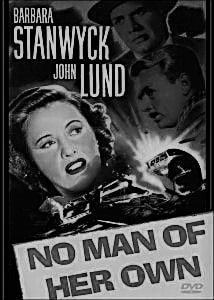 NO MAN OF HER OWN (1950)
NO MAN OF HER OWN (1950) (98 Min.) Genre: 1950 DRAMA, Transfer Quality: B
A woman is torn between a comfortable lie and the painful truth in this drama. After she is abandoned by her unfaithful boyfriend Stephen Morely (Lyle Bettger), Helen Ferguson (Barbara Stanwyck) discovers that she's pregnant, and she has no choice but to go home to her family. Shortly after boarding the train, Helen meets Hugh and Patrice Harkness (Richard Denning and Phyllis Thaxter), a recently married couple who are travelling to visit Hugh's parents, who have yet to met his bride. Patrice, who is also with child, strikes up a conversation with Helen, and allows her to try on her beautiful wedding ring. Moments later, the train becomes involved in a terrible accident in which Hugh and Patrice are killed; because she was still wearing Patrice's ring, Helen is mistaken for the late Mrs. Harkness by Hugh's parents (Jane Cowl and Henry O'Neill), and is taken home with them as she recovers and has her baby. Helen begins to feel a part of the family until Stephen arrives, demanding money to keep her true identity a secret. No Man of Her Own was remade in 1996 as the comedy Mrs. Winterbourne.
Starring: Barbara Stanwyck, John Lund, Phyllis Thaxter, Lyle Bettger, Milburn Stone, Richard Denning | Directed by: Mitchell Leisen
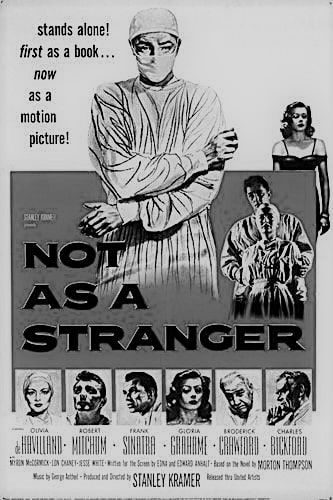 NOT AS A STRANGER (1955)
NOT AS A STRANGER (1955) (135 Min.) Genre: 1950 DRAMA, Transfer Quality: A
Ambitious but impecunious medical student Robert Mitchum marries the older and (in this film, at least) not especially attractive Olivia De Havilland, so that she can pay his tuition fees. De Havilland loves Mitchum, but he loves nothing but his work. Emotionally shutting himself off from everyone-including best friend Frank Sinatra and drunken dad Lon Chaney Jr.—Mitchum survives his training and goes to work as the assistant to tough-but-tender small town medico Charles Bickford. He enters into an affair with wealthy Gloria Grahame (watch for the symbolism-laden tryst in the horse barn!), obliging Sinatra, now a big-city doctor, to try to patch up his pal's marriage. But Mitchum feels nothing and needs no one because he's come to think of himself as the perfect physician, incapable of making an error. When Mitchum fails to revive his mentor Bickford during heart surgery (a genuine heart is used in the "massage" close-ups), the young doctor suddenly realizes that he's not infallible after all. He wanders aimlessly through town, finally returning to his wife and collapsing into her arms, sobbing "Help me! Please help me!" Cameo players range from Broderick Crawford as a Jewish doctor denied entry into medicine's upper circles to Carl Switzer as a bug-eyed patient. The film was adapted from the best-selling novel by Morton Thompson. — Hal Erickson
Starring: Olivia de Havilland, Frank Sinatra, Robert Mitchum, Charles Bickford, Gloria Grahame, Broderick Crawford, Lee Marvin, Lon Chaney | Directed by: Stanley Kramer
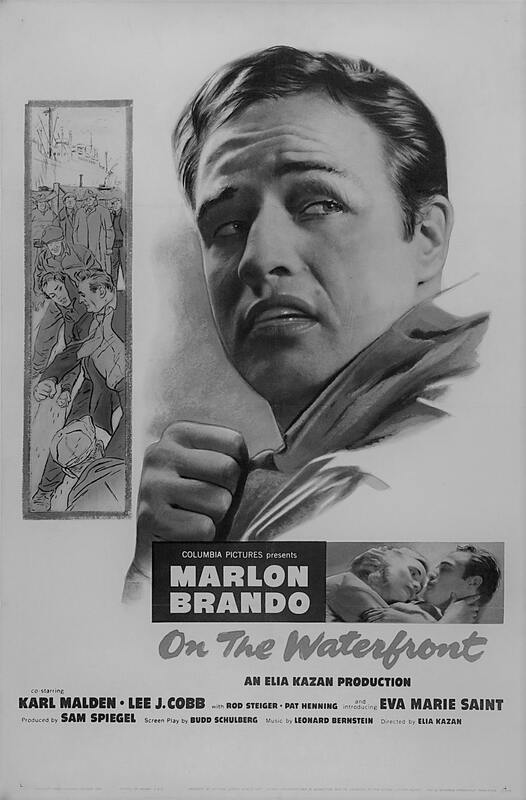 ON THE WATERFRONT (1954)
ON THE WATERFRONT (1954) (108 Min.) Genre: 1950 DRAMA, Transfer Quality: A
This classic story of Mob informers was based on a number of true stories and filmed on location in and around the docks of New York and New Jersey. Mob-connected union boss Johnny Friendly (Lee J. Cobb) rules the waterfront with an iron fist. The police know that he's been responsible for a number of murders, but witnesses play deaf and dumb ("plead D & D"). Washed-up boxer Terry Malloy (Marlon Brando) has had an errand-boy job because of the influence of his brother Charley, a crooked union lawyer (Rod Steiger). Witnessing one of Friendly's rub-outs, Terry is willing to keep his mouth shut until he meets the dead dockworker's sister, Edie (Eva Marie Saint). "Waterfront priest" Father Barry (Karl Malden) tells Terry that Edie's brother was killed because he was going to testify against boss Friendly before the crime commission. Because he could have intervened, but didn't, Terry feels somewhat responsible for the death. When Father Barry receives a beating from Friendly's goons, Terry is persuaded to cooperate with the commission. Featuring Brando's famous "I coulda been a contendah" speech, On the Waterfront has often been seen as an allegory of "naming names" against suspected Communists during the anti-Communist investigations of the 1950s. Director Elia Kazan famously informed on suspected Communists before a government committee — unlike many of his colleagues, some of whom went to prison for refusing to "name names" and many more of whom were blacklisted from working in the film industry for many years to come — and Budd Schulberg's screenplay has often been read as an elaborate defense of the informer's position. On the Waterfront won Oscars for Best Picture, Best Director, Best Adapted Screenplay, Best Actor for Brando, and Best Supporting Actress for Saint. — Hal Erickson
Starring: Marlon Brando, Karl Malden, Lee J. Cobb, Rod Steiger, Eva Marie Saint | Directed by: Elia Kazan
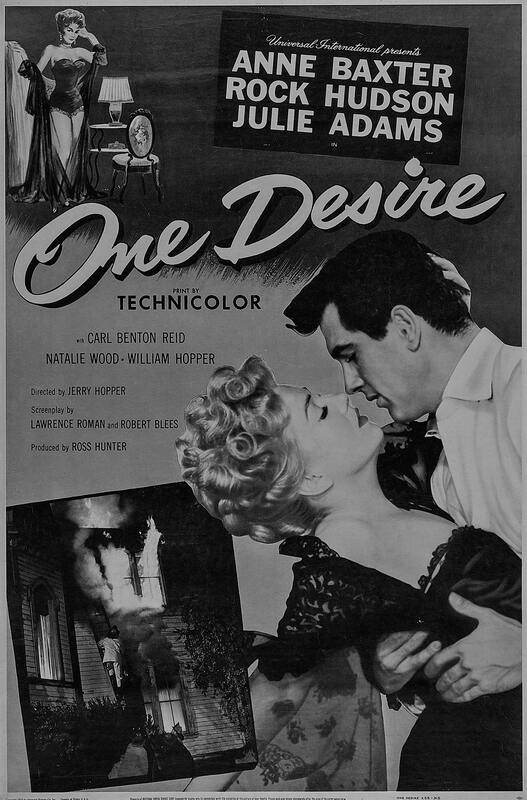 ONE DESIRE (1955)
ONE DESIRE (1955) (94 Min.) Genre: 1950 DRAMA, Transfer Quality: B
The "one desire" of ex-gamblers Rock Hudson and Anne Baxter is to escape their shady former lives and settle down to respectability. Rock and Baxter move to a small town, with Hudson's younger brother (Barry Curtis) and an orphaned girl (Natalie Wood) in tow. Julie Adams, daughter of the town banker, set her sights on Hudson and tries to win him away from Baxter. Adams dies in a convenient-to-the-plotline fire, but everybody else lives happily ever after. Conrad Richter's novel Tracey Cromwell was the base for this 1890s soap opera, produced by Ross Hunter with a veneer of class that the material itself lacks.
Starring: Anne Baxter, Rock Hudson, Julie Adams, Natalie Wood | Directed by: Jerry Hopper
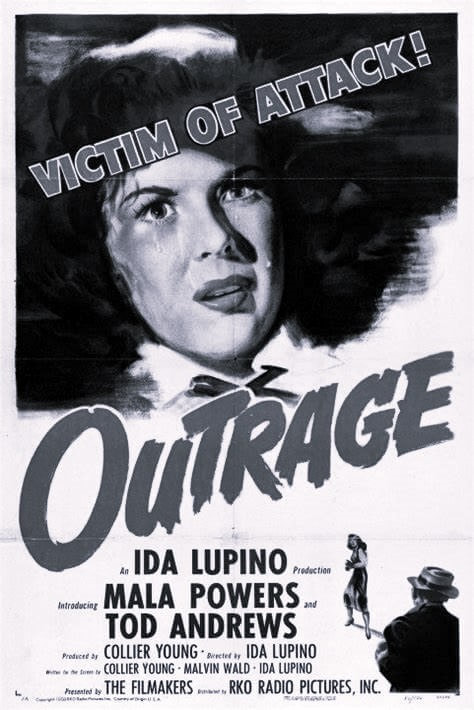 OUTRAGE (1950)
OUTRAGE (1950) (75 Min.) Genre: 1950 DRAMA, Transfer Quality: B
In terms of content, Outrage was well-ahead of its time. Mala Powers, who'd previously starred opposite Jose Ferrer in Cyrano de Bergerac, plays Ann Walton, a naïve young girl who is attacked and raped while walking home from work. As if the horror and humiliation of the sexual assault wasn't enough, Ann must endure the scrutiny of her neighbors, some of whom are convinced that she "asked for it." Unable to stand any more, she runs away from her hometown and her fiancé Jim Owens (Robert Clarke), hoping to start life anew in another town. With the help of compassionate clergyman Ferguson (Tod Andrews), Ann slowly regains her faith in humanity, as well as her own self-esteem. Oddly, director Ida Lupino chooses to tackle her material with a complete lack of subtlety. The subject matter of Outrage deserves far more sensitive treatment than it received from the usually reliable Lupino.
Starring: Mala Powers, Tod Andrews, Robert Clarke, Jerry Paris, Hal March | Directed by: Ida Lupino
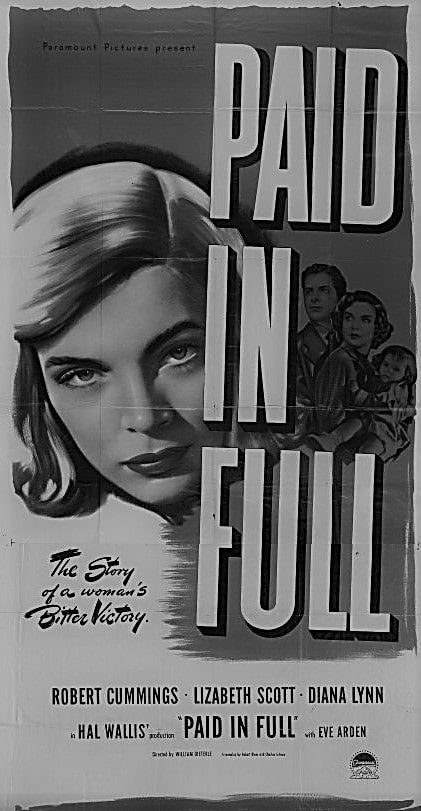 PAID IN FULL (1950)
PAID IN FULL (1950) (105 Min.) Genre: 1950 DRAMA, Transfer Quality: B
Lizabeth Scott and Diana Lynn are both effectively cast against type in Paid in Full. Scott plays Jane Langley, the spectacularly self-sacrificial older sister of selfish, reckless Nancy Langley (Lynn). Though she is in love with Bill Prentice (Robert Cummings), Jane gives him up to Nancy. And when Jane accidently causes the death of Nancy's child, she vows to makes amends by the most direct means possible. What follows is within the Production Code guidelines of the era — but just barely. An unabashed "woman's picture" (that's what they called them back in 1949), Paid in Full doesn't always play well today, since viewers might be tempted to yell "Get real, Lizabeth!" at the screen. Still, it worked beautifully for its original target audience, especially those who'd read the factual Reader's Digest article upon which it was based.
Starring: Robert Cummings, Lizabeth Scott, Diana Lynn, Eve Arden | Directed by: William Dieterle
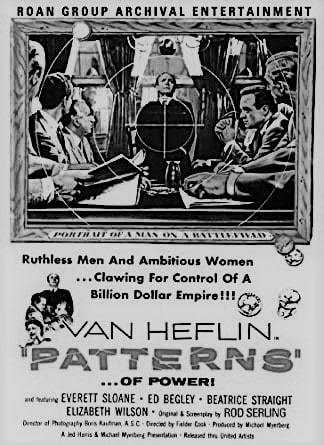 PATTERNS (1956)
PATTERNS (1956) (84 Min.) Genre: 1950 DRAMA, Transfer Quality: A
Rod Serling's incisive "gray flannel suit" TV drama created such a sensation when Kraft Television Theatre first aired it live on January 11, 1955 that, in an unprecedented move, it was repeated four weeks later, on February 9, again live. Richard Kiley starred as Fred Staples, a bright young man from Cincinnati brought into the executive pool at a top New York firm by ruthless CEO Ramsey (Everett Sloane). Staples doesn't know it at first, but he was recruited as the potential replacement for Andy Sloane (Ed Begley), an ailing exec whom Ramsey is easing out in a most unsubtle fashion. Staples takes a liking to Sloane and despises Ramsey's tactics; the question is: does he despise them enough to throw away the biggest opportunity in his life? Director Fielder Cook, who helmed both TV versions of Patterns, also did the same for the 1956 film version. While Everett Sloane and Ed Begley were carried over from TV, the more "bankable" Van Heflin replaced Kiley as Staples. — Hal Erickson
Starring: Van Heflin, Everett Sloane, Ed Begley, Richard Kiley | Directed by: Fielder Cook
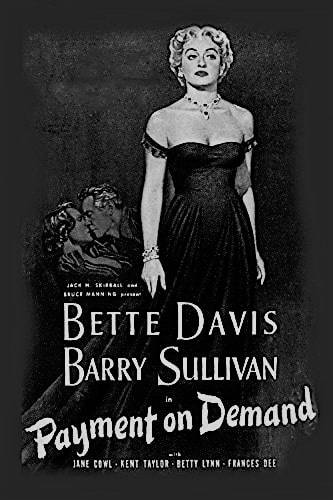 PAYMENT ON DEMAND (1951)
PAYMENT ON DEMAND (1951) (90 Min.) Genre: 1950 DRAMA, Transfer Quality: A
Just before filming All About Eve, Bette Davis starred in the marital melodrama Payment on Demand. Davis plays Joyce Ramsey, the wife of David Ramsey (Barry Sullivan), who one fine morning demands a divorce. Most of the film is in flashback, recounting the events leading up to the marital schism. After David takes up with a school teacher (Frances Dee), Joyce heads for a Haitian vacation, hoping to spark a few affairs of her own. But after a chance meeting with an old friend (Jane Cowl) who's become hard and cynical since her own divorce, Davis heads back to the States and attempts to patch up her marriage. Director Curtis Bernhardt was particularly proud of the opening scene in Payment on Demand, wherein Barry Sullivan requests a divorce as calmly as if he were ordering breakfast
Starring: Bette Davis, Barry Sullivan, Jane Cowl, Kent Taylor, Frances Dee, Peggie Castle, Otto Kruger, Richard Anderson | Directed by: Curtis Bernhardt
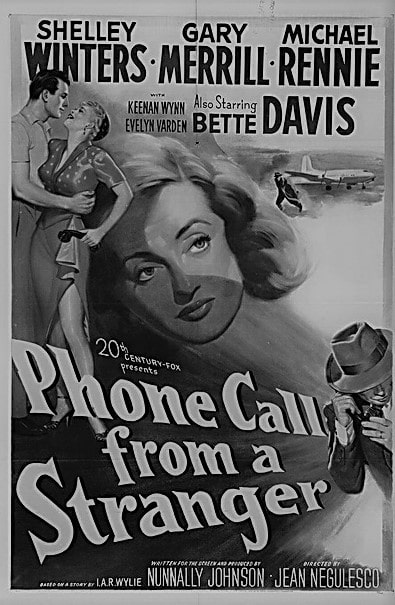 PHONE CALL FROM A STRANGER (1952)
PHONE CALL FROM A STRANGER (1952) (96 Min.) Genre: 1950 DRAMA, Transfer Quality: B
David Trask (Gary Merrill), the sole survivor of an airplane crash, takes it upon himself to contact the families of the various victims. Though he's already formed preconceived notions of his deceased fellow passengers, he's in for quite a few surprises when he meets the relatives. His first visit is to the wife (Beatrice Straight) and son (Ted Donaldson) of a profoundly troubled doctor (Michael Rennie). His second stop is at a nightclub managed by the domineering mother-in-law (Evelyn Varden) of an aspiring actress (Shelley Winters). Finally, he meets the invalid wife (Bette Davis) of an outwardly obnoxious travelling salesman (Keenan Wynn). After his odyssey into other people's lives, Trask gains a new perspective on his own personal travails. Few studios could pull off the "multi-story film" format as well as 20th Century-Fox, and Phone Call From a Stranger is a grade-A example of that format.
Starring: Shelley Winters, Gary Merrill, Michael Rennie, Keenan Wynn, Bette Davis, Evelyn Varden, Hugh Beaumont, Craig Stevens | Directed by: Jean Negulesco
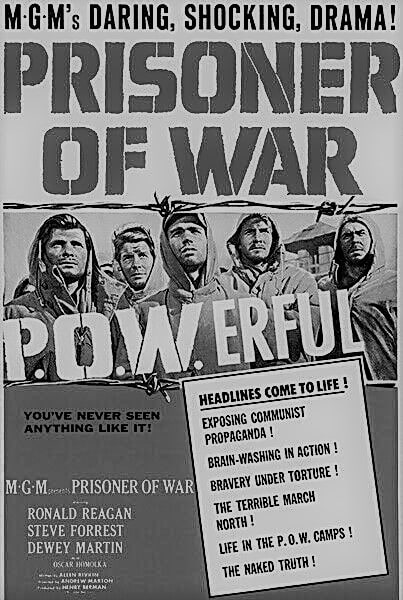 PRISONER OF WAR (1954)
PRISONER OF WAR (1954) (80 Min.) Genre: 1950 DRAMA, Transfer Quality: B
The horrors suffered by American prisoners of war at the hands of the North Koreans during the Korean war provide the basis of this drama. Allegedly based on the true stories of those who survived the tortures, it centers on an intelligence officer (Ronald Reagan) who is sent into a POW camp to investigate conditions. When he learns that inmates are routinely tortured and brainwashed, he allows himself to undergo the same. He fools the enemy into believing that he has successfully been indoctrinated into Communist philosophies as does another soldier. Meanwhile, another soldier affects a more direct means of combatting the enemy.
Starring: Ronald Reagan, Dewey Martin, Steve Forrest, Oscar Homolka, Robert Horton, Paul Stewart, Stuart Whitman | Directed by: Andrew Marton
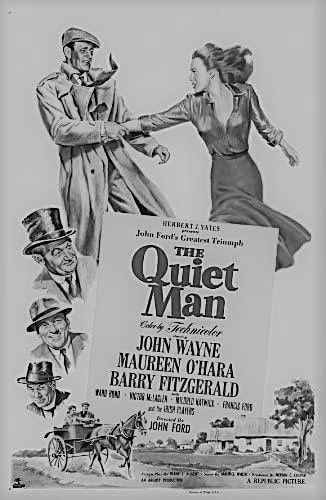 QUIET MAN, THE (1952)
QUIET MAN, THE (1952) (129 Min.) Genre: 1950 DRAMA, Transfer Quality: A
The last of four films for which John Ford would win Best Director, The Quiet Man is a charming romantic comedy from a man best known for his somber Westerns. Many consider it his best-loved film; it was certainly one of Ford's favorites, and he considered it some of his most personal work. The director had trouble funding the production, and the notoriously cheap Republic Pictures eventually financed the film. Even with a relatively small budget, however, Ford was able to shoot on location in Ireland and produce a fabulous-looking color film. John Wayne turns in an amiable performance, exhibiting a diversity often overlooked in considerations of the actor's work. The supporting cast, including Maureen O'Hara, Victor McLaglen, and Barry Fitzgerald, is equally good. Quiet Man was the first high-profile film made in Ireland, and some viewers today may consider the portrayal of the Irish stereotypical. In addition to Ford's win, the cinematography by Winton Hoch and Archie J. Stout was recognized with an Academy Award. — Brendon Hanley
Starring: John Wayne, Maureen O'Hara, Victor McLaglen, Barry Fitzgerald | Directed by: John Ford
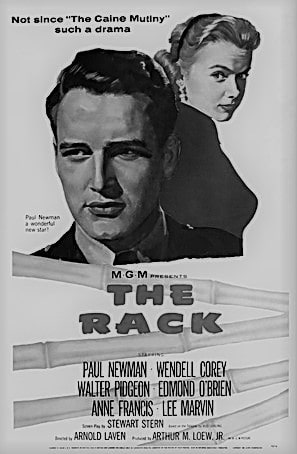 RACK, THE (1956)
RACK, THE (1956) (100 Min.) Genre: 1950 DRAMA, Transfer Quality: A
The Korean conflict of the early '50s saw widespread use of psychological torture by the North Korean communists on enemy prisoners of war. That young American GIs cracked under this brainwashing at higher rates than the troops of our allies led to much soul searching within the military and the nation during that era. In Hollywood, this was most famously reflected in The Manchurian Candidate (1962), and lesser-known films like Time Limit (1955) and The Rack. The failure of all three films at the box office suggests that the public didn't care to be reminded of this painful issue. Paul Newman stars as Captain Edward W. Hall Jr., a career soldier being tried by a military court for collaborating with the enemy. As the son of a highly distinguished career officer (Walter Pidgeon), and with a brother who had been killed in the war, he is especially tormented by the accusations which have been brought against him. Although reluctant to take the case, Major Sam Moulton (Wendell Corey) elicits incriminating testimony from Hall, comparing him unfavorably with soldiers like Captain John Miller (Lee Marvin), who were able to withstand similar punishment. But defending attorney Lt. Colonel Frank Wasnick (Edmond O'Brien), makes the case that this new type of torture is a new and barely understood weapon, to which some will be more innately immune than others.
Starring: Paul Newman, Wendell Corey, Walter Pidgeon, Edmond O'Brien, Anne Francis, Lee Marvin, Cloris Leachman | Directed by: Arnold Laven
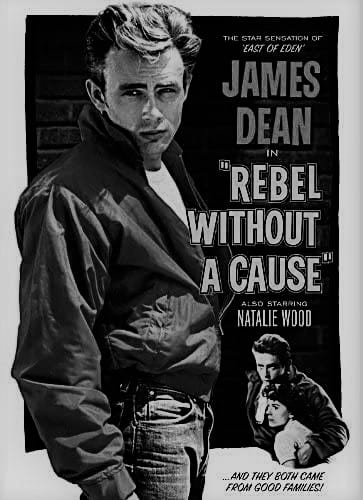 REBEL WITHOUT A CAUSE (1955)
REBEL WITHOUT A CAUSE (1955) (111 Min.) Genre: 1950 DRAMA, Transfer Quality: A
This landmark juvenile-delinquent drama scrupulously follows the classic theatrical disciplines, telling all within a 24-hour period. Teenager Jimmy Stark (James Dean) can't help but get into trouble, a problem that has forced his appearance-conscious parents (Jim Backus and Ann Doran) to move from one town to another. The film's tormented central characters are all introduced during a single night-court session, presided over by well-meaning social worker Ray (Edward Platt). Jimmy, arrested on a drunk-and-disorderly charge, screams "You're tearing me apart!" as his blind-sided parents bicker with one another over how best to handle the situation. Judy (Natalie Wood) is basically a good kid but behaves wildly out of frustration over her inability to communicate with her deliberately distant father (William Hopper). (The incestuous subtext of this relationship is discreetly handled, but the audience knows what's going on in the minds of Judy and her dad at all times.) And Plato (Sal Mineo), who is so sensitive that he threatens to break apart like porcelain, has taken to killing puppies as a desperate bid for attention from his wealthy, always absent parents. The next morning, Jimmy tries to start clean at a new high school, only to run afoul of local gang leader Buzz (Corey Allen), who happens to be Judy's boyfriend. Anxious to fit in, Jimmy agrees to settle his differences with a nocturnal "Chickie Run": he and Buzz are to hop into separate stolen cars, then race toward the edge of a cliff; whoever jumps out of the car first is the "chickie." When asked if he's done this sort of thing before, Jimmy lies, "That's all I ever do." This wins him the undying devotion of fellow misfit Plato. At the appointed hour, the Chickie Run takes place, inaugurated by a wave of the arms from Judy. The cars roar toward the cliff; Jimmy is able to jump clear, but Buzz, trapped in the driver's set when his coat gets caught on the door handle, plummets to his death. In the convoluted logic of Buzz' gang, Jimmy is held responsible for the boy's death. For the rest of the evening, he is mercilessly tormented by Buzz' pals, even at his own doorstep. After unsuccessfully trying to sort things out with his weak-willed father, Jimmy runs off into the night. He links up with fellow "lost souls" Judy and Plato, hiding out in an abandoned palatial home and enacting the roles of father, mother, and son. For the first time, these three have found kindred spirits -- but the adults and kids who have made their lives miserable haven't given up yet, leading to tragedy. Out of the bleakness of the finale comes a ray of hope that, at last, Jimmy will be truly understood. Rebel without a Cause began as a case history, written in 1944 by Dr. Robert Lindner. Originally intended as a vehicle for Marlon Brando, the property was shelved until Brando's The Wild One (1953) opened floodgates for films about crazy mixed-up teens. Director Nicholas Ray, then working on a similar project, was brought in to helm the film version. His star was James Dean, fresh from Warners' East of Eden. Ray's low budget dictated that the new film be lensed in black-and-white, but when East of Eden really took off at the box office, the existing footage was scrapped and reshot in color.
Starring: James Dean, Natalie Wood, Sal Mineo, Dennis Hopper, Jim Backus, Rochelle Hudson, Nick Adams | Directed by: Nicholas Ray
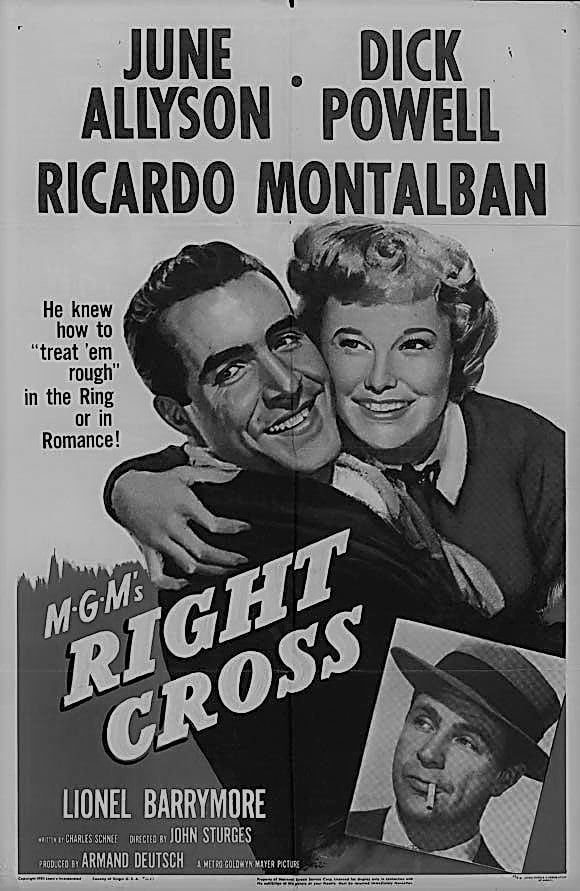 RIGHT CROSS (1951)
RIGHT CROSS (1951) (90 Min.) Genre: 1950 DRAMA, Transfer Quality: A
Right Cross stars Dick Powell as cynical sportswriter Rick Gavery and Powell's wife June Allyson as boxing manager Pat O'Malley. Subbing for her incapacitated father (Lionel Barrymore), Pat grooms prizefighter Johnny Monterez (Ricardo Montalban) for the championship. Johnny holds a grudge against the world because he feels that his Mexican heritage has made him an outcast, though curiously the audience never sees any prejudice levelled against him. Gradually, Pat falls in love with the tempestuous Monterez, while Gavery, who's always carried a torch for Pat, observes from the sidelines. The film wisely avoids the usual boxing-flick cliches, most commendably during the climactic Big Bout. Marilyn Monroe appears unbilled in the opening scene as Dick Powell's dinner companion. — Hal Erickson
Starring: June Allyson, Dick Powell, Ricardo Montalban, Lionel Barrymore | Directed by: John Sturges
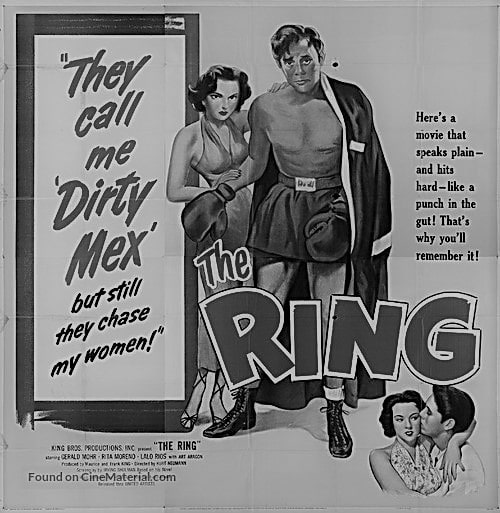 RING, THE (1952)
RING, THE (1952) (79 Min.) Genre: 1950 DRAMA, Transfer Quality: B
The Ring was directed by Kurt Neumann in a style best described as Hollywood neorealist. Based on a novel by Irving Shulman, the film focuses on a Mexican-American youth named Tommy (Lalo Rios). Unable to make any headway in a prejudicial, white-dominated society, Tommy turns to boxing, where he makes quite a name for himself. Just when he thinks he's gained the respect of the "Anglos," however, he discovers that they're only interested in his reputation, and still consider him an outsider because of his ancestry and skin color. Even the two white men who treat him decently -- his manager Pete (Gerald Mohr) and trainer Freddy (Robert Osterloh) -- have a vested interest. In danger of ending up a disillusioned, punch-drunk bum, Tommy is rescued by the unconditional love of his girl Lucy (Rita Moreno). Filmed entirely on location in greater Los Angeles, The Ring is for the most part an uncompromising glimpse at institutionalized bigotry.
Starring: Gerald Mohr, Rita Moreno, Lalo Rios, Robert Arthur, Jack Elam | Directed by: Kurt Neumann
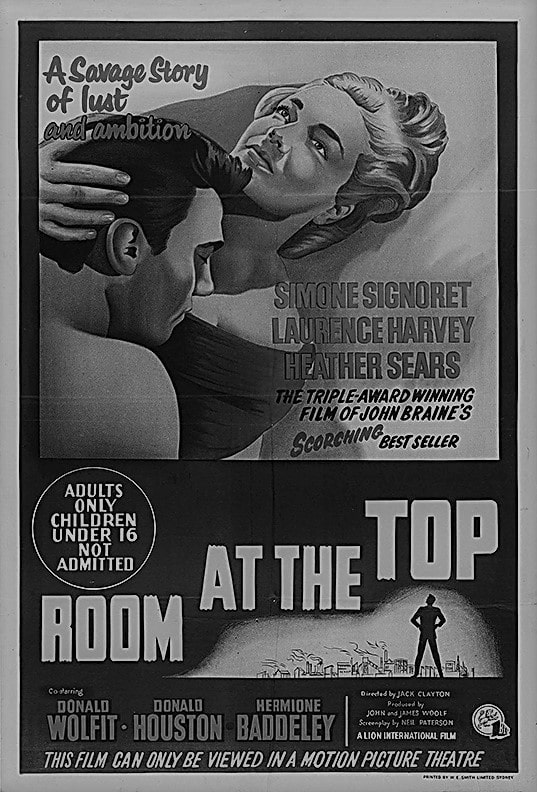 ROOM AT THE TOP (1959)
ROOM AT THE TOP (1959) (118 Min.) Genre: 1950 DRAMA, Transfer Quality: A
Ruthless young working-class Englishman Laurence Harvey takes a job in a North Country village controlled by millionaire Donald Wolfit. Harvey resents Wolfit's class consciousness and vows to rise to the top by wooing the millionaire's daughter, Heather Sears. Meanwhile he has an affair with Frenchwoman Simone Signoret. Though he regards Signoret as a mere self-gratifying conquest, she takes their romance seriously enough to kill herself when Harvey impregnates Field. Only as he leaves the chapel after marrying the millionaire's daughter does Harvey that his "smart" marriage, coupled with the guarantee of a fabulous business career, has been attained at the cost of his soul. Based on the novel by John Braine, Room at the Top was one of the most successful films of the British angry-young-man school; it later spawned two sequels, as well as a weekly TV series.
Starring: Laurence Harvey, Simone Signoret, Heather Sears, Donald Wolfit, Donald Houston | Directed by: Jack Clayton
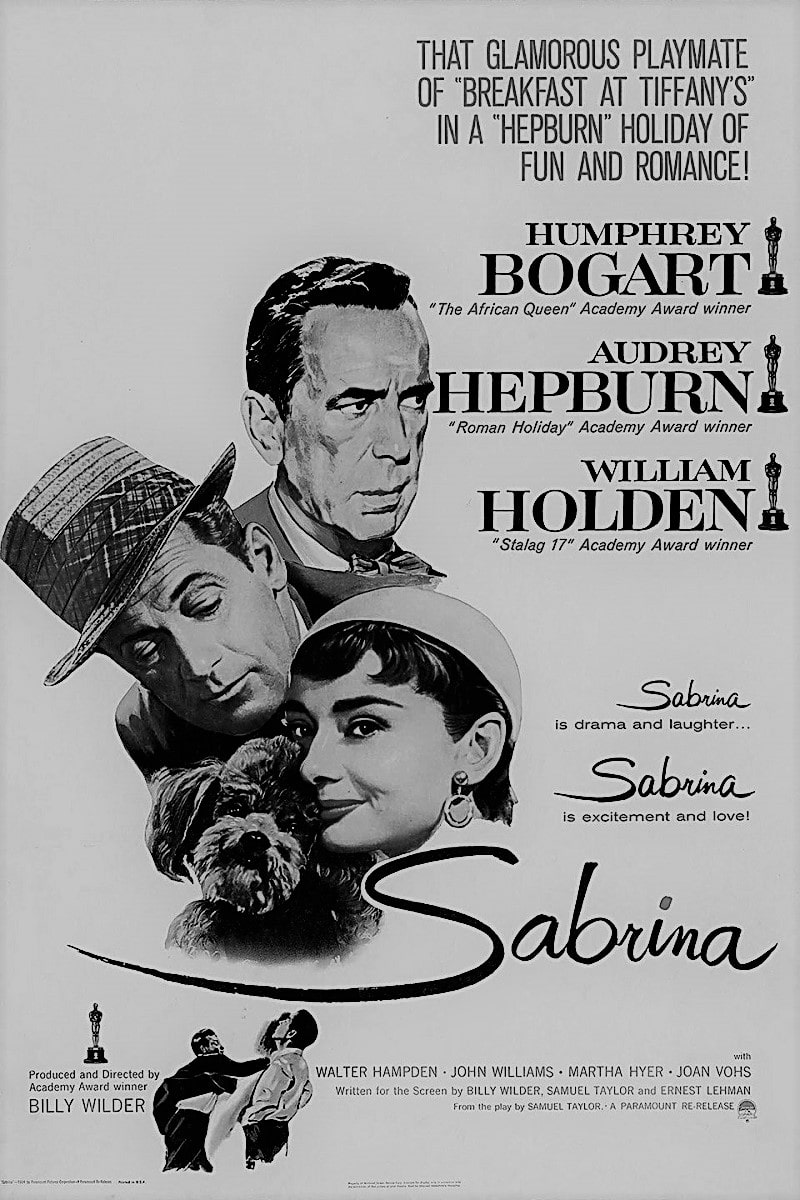 SABRINA (1954)
SABRINA (1954) (113 Min.) Genre: 1950 DRAMA, Transfer Quality: A
Billy Wilder directs the lighthearted romantic comedy Sabrina, based on the play by Samuel A. Taylor. Sabrina Fairchild (Audrey Hepburn) is the simple, naïve daughter of a chauffeur, Thomas Fairchild (John Williams). They live on an estate with the wealthy Oliver Larrabee (Walter Hampden) and his two sons: workaholic older brother Linus (Humphrey Bogart) and fun-loving younger brother David (William Holden). Sabrina adores the charming David, but he thinks of her as just a kid. Her father sends her away to Paris for chef school where she meets Baron St. Fontanel (Marcel Dalio), and she returns a worldly, sophisticated woman. David immediately falls for her, but he is already engaged to marry heiress Elizabeth Tyson (Martha Hyer). Sabrina wants to break up the wedding in order to finally catch the man of her dreams, while Linus fights to keep the marriage on in the interest of family business and Mr. Tyson's (Francis X. Bushman) fortune. In order to keep Sabrina away from David, Linus pretends to court her himself. In doing so, they eventually realize their true feelings for each another. — Andrea LeVasseur
Starring: Humphrey Bogart, Audrey Hepburn, William Holden, Walter Hampden | Directed by: Billy Wilder
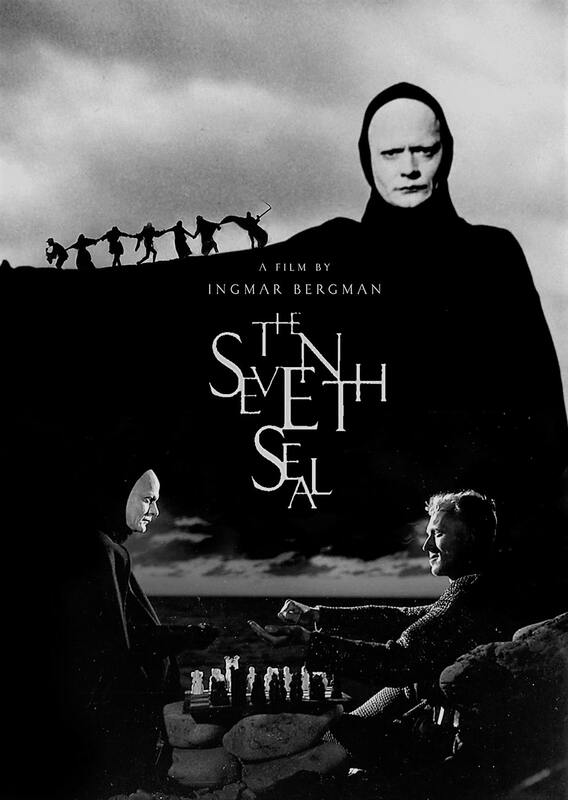 SEVENTH SEAL, THE (1957)
SEVENTH SEAL, THE (1957) (96 Min.) Genre: 1950 DRAMA, Transfer Quality: A
Endlessly imitated and parodied, Ingmar Bergman's landmark art movie The Seventh Seal (Det Sjunde Inseglet) retains its ability to hold an audience spellbound. Bergman regular Max Von Sydow stars as a 14th-century knight, wearily heading home after ten years' worth of combat. Disillusioned by unending war, plague, and misery Von Sydow has concluded that God does not exist. As he trudges across the wilderness, Von Sydow is visited by Death (Bengt Ekrot), garbed in the traditional black robe. Unwilling to give up the ghost, Von Sydow challenges Death to a game of chess. If he wins, he lives—if not, he'll allow Death to claim him. As they play, the knight and the Grim Reaper get into a spirited discussion over whether or not God exists. To recount all that happens next would diminish the impact of the film itself; we can observe that The Seventh Seal ends with one of the most indelible of all of Bergman's cinematic images: the near-silhouette Dance of Death. Considered by some as the apotheosis of all Ingmar Bergman films (other likely candidates for that honor include Wild Strawberries and Persona), and certainly one of the most influential European art movies, The Seventh Seal won a multitude of awards, including the Cannes Film Festival prize. — Hal Erickson
Starring: Max von Sydow, Gunnar Björnstrand, Bengt Ekerot, Nils Poppe | Directed by: Ingmar Bergman
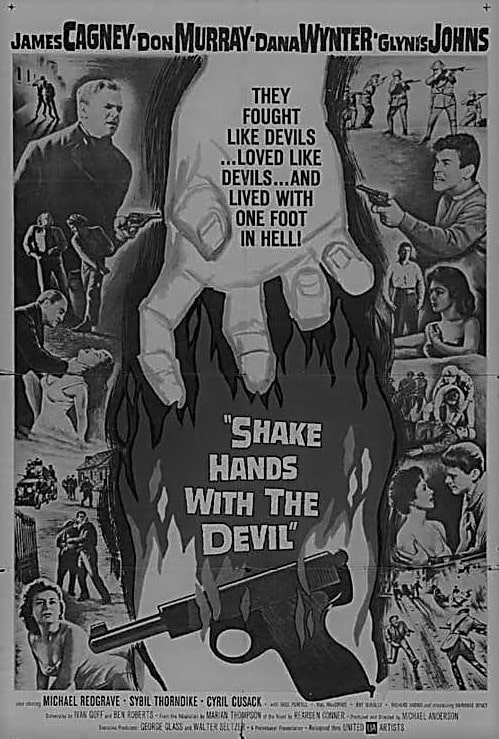 SHAKE HANDS WITH THE DEVIL (1959)
SHAKE HANDS WITH THE DEVIL (1959) (110 Min.) Genre: 1950 DRAMA, Transfer Quality: A
Filmed on location, Shake Hands With the Devil is set in Ireland during the "troubles" of 1921. James Cagney plays a brilliant medical professor who doubles as head of the Irish Republican Army. Cagney convinces one of his more pacifistic students, Don Murray, to join the underground struggle against British rule. Murray suffers a crisis of conscience when his sweetheart Dana Wynter is taken hostage by the IRA and is slated for execution by the zealous Cagney. Several members of Dublin's Abbey Players appear in supporting roles in Shake Hands With Devil. Watch for Richard Harris in the small part of Terence O'Brien. — Hal Erickson
Starring: James Cagney, Don Murray, Dana Wynter, Glynis Johns | Directed by: Michael Anderson
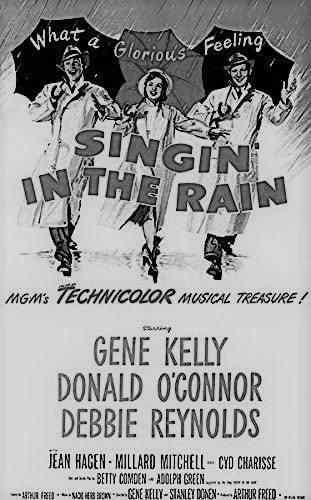 SINGIN' IN THE RAIN (1952)
SINGIN' IN THE RAIN (1952) (103 Min.) Genre: 1950 DRAMA, Transfer Quality: A
Hollywood, 1927: the silent-film romantic team of Don Lockwood (Gene Kelly) and Lina Lamont (Jean Hagen) is the toast of Tinseltown. While Lockwood and Lamont personify smoldering passions onscreen, in real life the down-to-earth Lockwood can't stand the egotistical, brainless Lina. He prefers the company of aspiring actress Kathy Selden (Debbie Reynolds), whom he met while escaping his screaming fans. Watching these intrigues from the sidelines is Cosmo Brown (Donald O'Connor), Don's best pal and on-set pianist. Cosmo is promoted to musical director of Monumental Pictures by studio head R.F. Simpson (Millard Mitchell) when the talking-picture revolution commences. That's all right for Cosmo, but how will talkies affect the upcoming Lockwood-Lamont vehicle "The Dueling Cavalier"? Don, an accomplished song-and-dance man, should have no trouble adapting to the microphone. Lina, however, is another matter; put as charitably as possible, she has a voice that sounds like fingernails on a blackboard. The disastrous preview of the team's first talkie has the audience howling with derisive laughter. On the strength of the plot alone, concocted by the matchless writing team of Betty Comden and Adolph Green, Singin' in the Rain is a delight. But with the addition of MGM's catalog of Arthur Freed-Nacio Herb Brown songs -- "You Were Meant for Me," "You Are My Lucky Star," "The Broadway Melody," and of course the title song -- the film becomes one of the greatest Hollywood musicals ever made.
Starring: Gene Kelly, Donald O'Connor, Debbie Reynolds, Jean Hagen, Cyd Charisse, Rita Moreno | Directed by: Stanley Donen / Gene Kelly
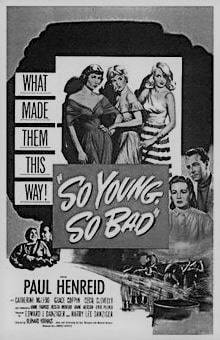 SO YOUNG, SO BAD (1950)
SO YOUNG, SO BAD (1950) (91 Min.) Genre: 1950 DRAMA, Transfer Quality: B
Actor Paul Henreid made his directorial debut with the well-intentioned So Young, So Bad. The scene is a correctional home for delinquent girls, where sadistic warden Riggs (Cecil Clovelly) and head matron Beuhler (Grace Coppin) rule with an iron fist. Compassionate psychiatrist Dr. Jason (Paul Henreid) and assistant superintendent Ruth Levering (Catherine McLeod) disagree with the brutal disciplinary methods advocated by Riggs and Buehler. Dr. Jason is a proponent of kindness and occupational therapy, and Ruth agrees. But as long as the institutionalized girls are afraid to speak up before a board of inquiry, Jason can do nothing about their mistreatment. Fortunately, one of the girls, Loretta (Anne Francis) decides "enough is enough". Featured in the cast of So Young, So Bad is young Rosita Moreno, who went on to fame and fortune after changing her first name to Rita.
Starring: Paul Henreid, Catherine McLeod, Anne Francis, Grace Coppin | Directed by: Bernard Vorhaus
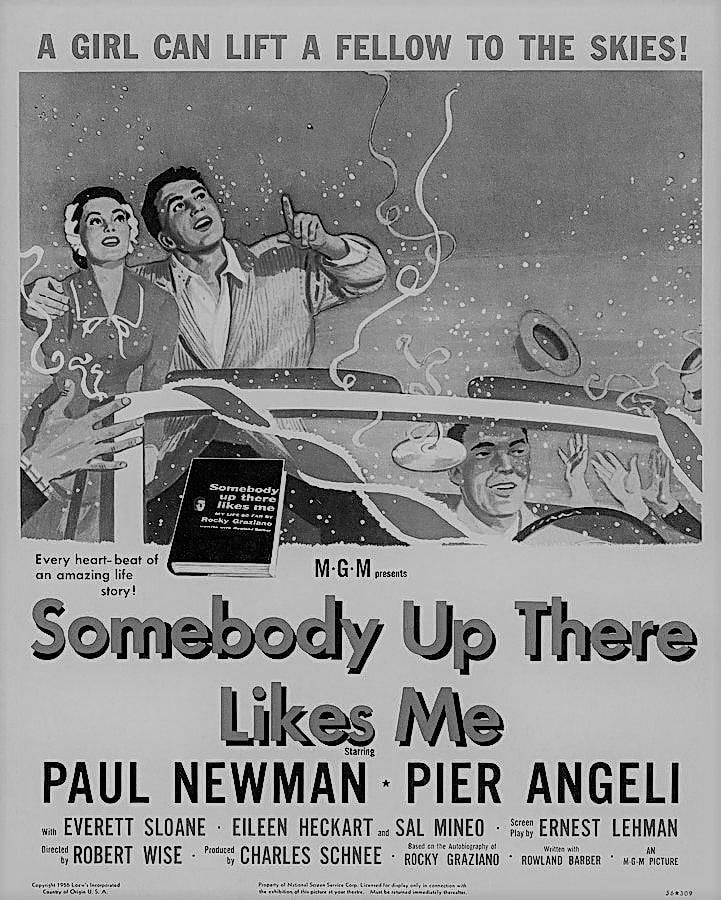 SOMEBODY UP THERE LIKES ME (1956)
SOMEBODY UP THERE LIKES ME (1956) (113 Min.) Genre: 1950 DRAMA, Transfer Quality: A
Once you get past the fact that handsome Paul Newman could never pass for plug-ugly boxer Rocky Graziano in real life, you will be able to accept Somebody Up Their Likes Me as one of the more accomplished movie biopics of the 1950s. Based on Graziano's autobiography (co-written with Rowland Barber), the film accurately depicts the teen-aged Rocky as an unregenerate punk, evidently doomed by his slum environment, and his own lousy attitude, to a life of petty crime. Determining that the only way he'll make a living is with his fists, Rocky becomes a boxer, at first willing to participate in a series of fixed fights. Eventually, Rocky develops a conscience and sense of self-respect, no small thanks to his sweetheart (and later wife) Norma (Pier Angeli). The film ends on an optimistic note after Rocky wins a "clean" bout with Tony Zale (playing himself). Training extensively with Graziano prior to and during production, Newman is quite impressive in his first worthwhile film role (this was only his second film, following the execrable The Silver Chalice). The title song in Somebody Up There Likes Me was written by Bronislau Kaper and Sammy Cahn, and performed by Perry Como. — Hal Erickson
Starring: Paul Newman, Pier Angeli, Everett Sloane, Sal Mineo | Directed by: Robert Wise
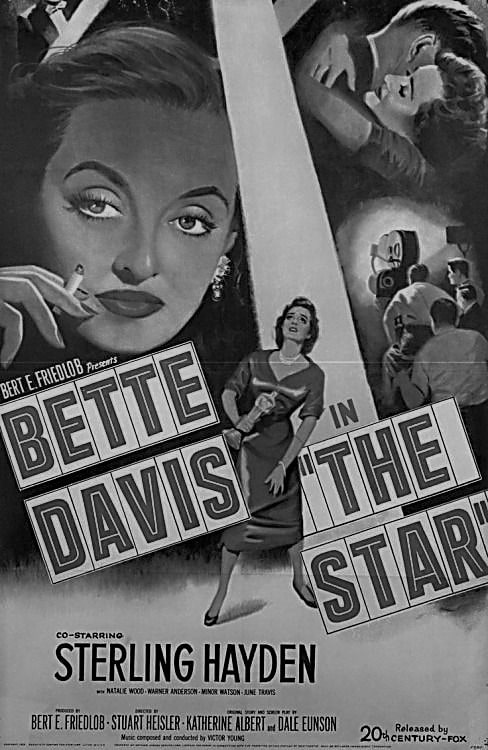 STAR, THE (1952)
STAR, THE (1952) (91 Min.) Genre: 1950 DRAMA, Transfer Quality: A
An actress who once knew the heights of fame is forced to confronts the depths of defeat in this show business drama. Margaret Elliot (Bette Davis) was once one of Hollywood's great stars, but as she edges into her 50's, both her career and her life have reached an unfortunate crossroads. Margaret hasn't worked for several years, her marriage has fallen apart, her former husband has custody of her daughter Gretchen (Natalie Wood), and she's running short of money. Margaret's agent Harry Stone (Warner Anderson) can't get her a part, and isn't willing to lend her the money to pay her bills. When they learn that Margaret is all but penniless, her sister (Fay Baker) and brother-in-law (David Alpert) turn their back on her, and Margaret's landlady (Katherine Warren) is threatening to evict her. Depressed and desperate, Margaret goes on a drinking binge, and ends up in jail on a drunk driving charge. No one comes to her aid but Jim Johannson (Sterling Hayden), an former actor who worked with Margaret years ago and has long been in love with her. Jim urges Margaret to leave Hollywood behind, and offers to care for her if she'll have him, but when Margaret's pleas to Harry finally result in an audition with producer Joe Morrison (Minor Watson), she holds on to the desperate hope she may have one more chance at regaining her stardom. Bette Davis's performance in The Star earned her an Academy Award nomination for Best Actress, but she lost to Shirley Booth for Come Back, Little Sheba — a role that had been first offered to Davis. — Mark Deming
Starring: Bette Davis, Sterling Hayden, Natalie Wood, Warner Anderson | Directed by: Stuart Heisler
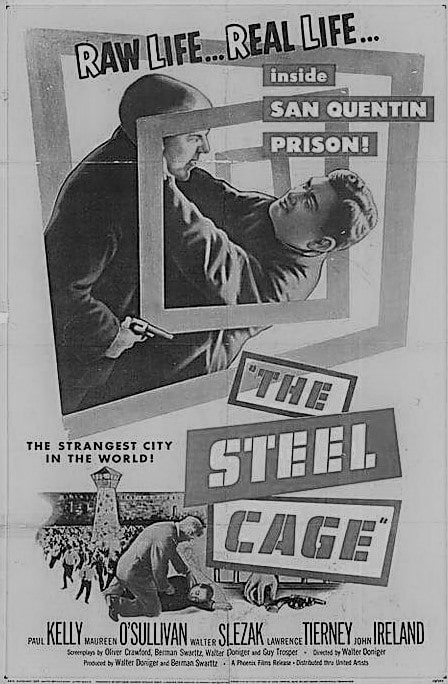 STEEL CAGE, THE (1954)
STEEL CAGE, THE (1954) (80 Min.) Genre: 1950 DRAMA, Transfer Quality: C
Like its predecessor Duffy of San Quentin, The Steel Cage is made up of episodes from a never-telecast TV series based on the career of progressive prison warden Clinton T. Duffy. Paul Kelly plays Duffy, while his wife is portrayed by Maureen O'Sullivan. Divided into three separate playlets, the film begins with the semi-comic story of an ill-tempered chef (Walter Slezak) who is railroaded into San Quentin by a gourmet prisoner. The second story concerns a tense hostage situation fomented by would-be escapees John Ireland and Lawrence Tierney. The closing story deals with an incarcerated painter (Kenneth Tobey), whose belief in God is renewed by an idealistic young priest (Arthur Franz).
Starring: Paul Kelly, Maureen O'Sullivan, John Ireland, Lawrence Tierney, Arthur Franz | Directed by: Walter Doniger
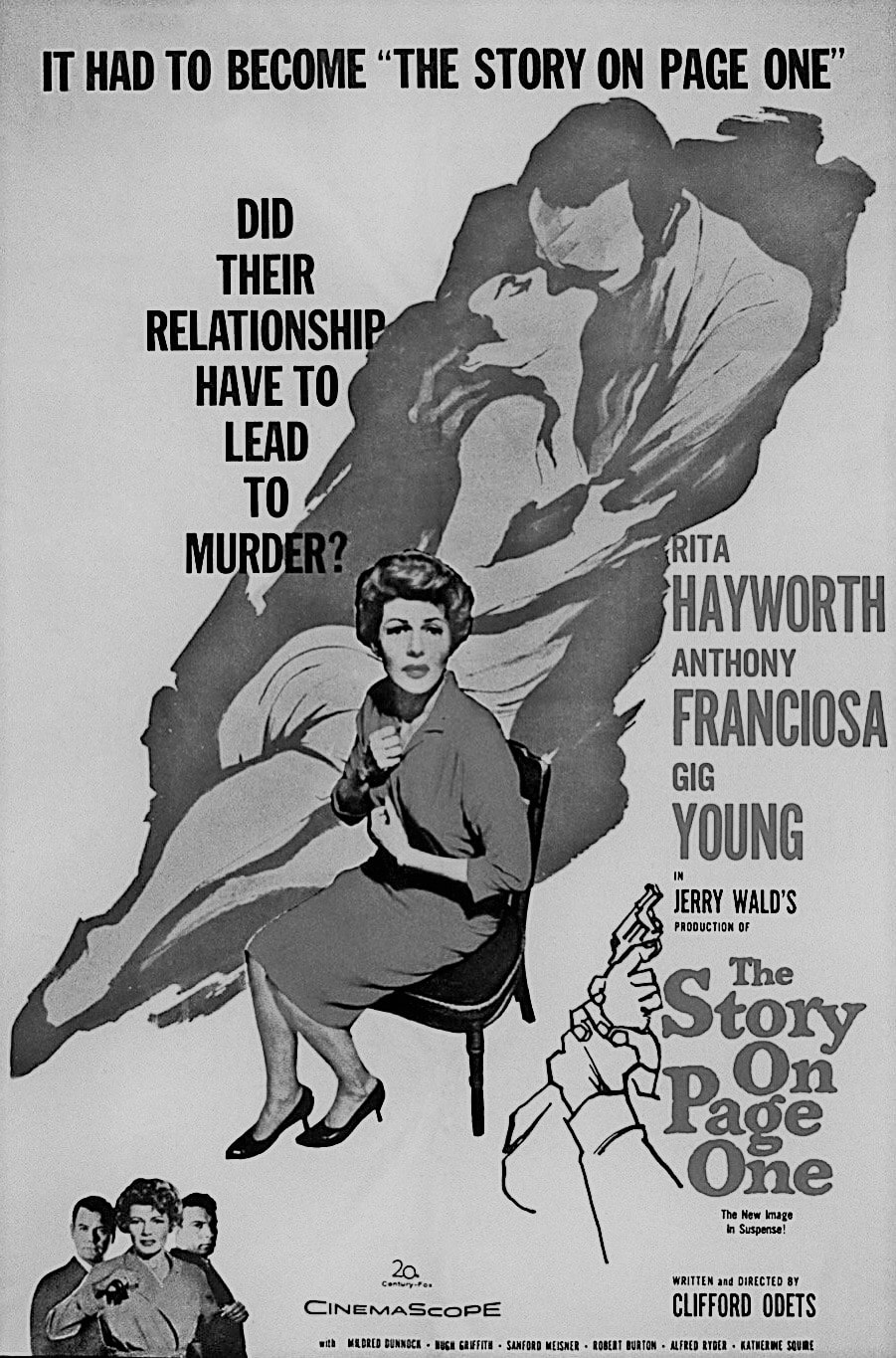 STORY ON PAGE ONE, THE (1959)
STORY ON PAGE ONE, THE (1959) (120 Min.) Genre: 1950 DRAMA, Transfer Quality: B
A suspenseful courtroom drama, The Story on Page One was the second and last film directed by the distinguished American playwright Clifford Odets (who also wrote the screenplay). Jo (Rita Hayworth) and Larry (Gig Young) are lovers accused of murdering Jo's husband. Their trial lawyer, Victor Santini (Anthony Franciosa) has his work cut out for him on two different fronts. For one, he has to overcome his own tendency to hit the bottle, and for another, he has to somehow win this case. As revealed in the beginning, Jo's husband died accidentally. Yet the unpredictability of the courtroom proceedings indicate that a verdict of "not guilty" is going to be anything but automatic.
Starring: Rita Hayworth, Gig Young, Anthony Franciosa, Mildred Dunnock | Directed by: Clifford Odets
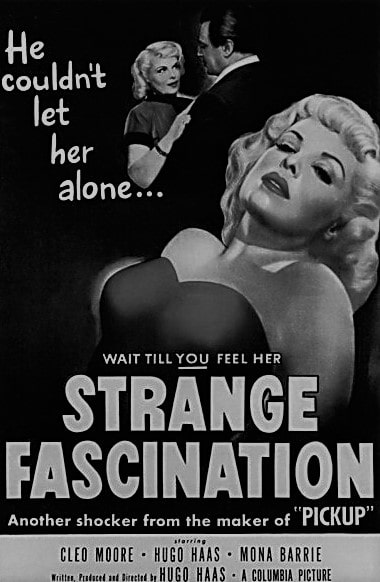 STRANGE FASCINATION (1952)
STRANGE FASCINATION (1952) (80 Min.) Genre: 1950 DRAMA, Transfer Quality: B
The third of actor Hugo Haas' endeavors as producer-director, Strange Fascination is at least superficially better and more original than the first two. While it's true that Haas once more deploys the theme of a middle-aged man falling hopelessly in love with a much-younger woman, he eschew his usual fondness for melodrama in favor of sentiment. Haas plays Paul Marvan, an international renowned concert pianist. Marvan's career goes into eclipse almost immediately after his marriage to the beautiful Margo (Cleo Moore, in the first of her many Hugo Haas films). It isn't anyone's fault, really: it is simply that Cruel Fate is dead set against Mr. and Mrs. Marvan ever enjoying true happiness. The grimly ironic finale of Strange Fascination is proof positive that there is, indeed, a long long time from May to December.
Starring: Cleo Moore, Hugo Haas, Mona Barrie, Rick Vallin, Karen Sharpe | Directed by: Hugo Haas
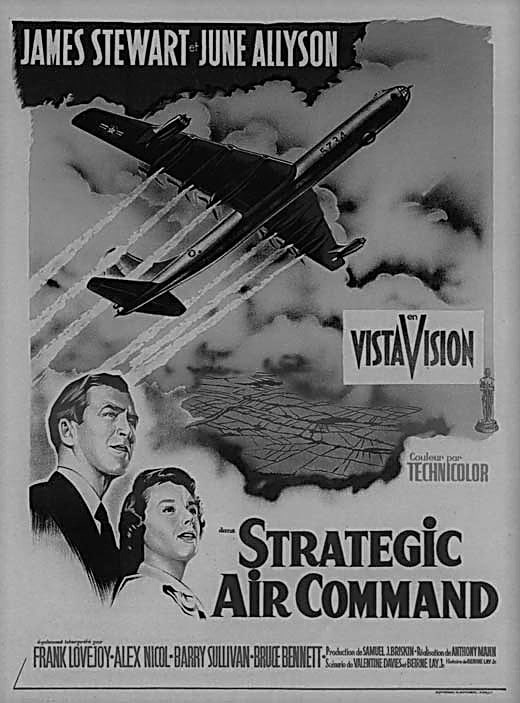 STRATEGIC AIR COMMAND (1955)
STRATEGIC AIR COMMAND (1955) (114 Min.) Genre: 1950 DRAMA, Transfer Quality: A
Inspired in part by the true story of baseball great Ted Williams, who after serving in World War II was drafted to serve in the Korean War just as his baseball career was taking off, Strategic Air Command stars James Stewart as "Dutch" Holland, a star third baseman with the St. Louis Cardinals. "Dutch" served with distinction as a fighter pilot during World War II, and as the Air Force adds new B-36 and B-47 jets to their arsenal, they need experienced men to fly these new weapons in our atomic deterrent force, and Holland is called back to duty. He's not terribly happy about this development: he loves baseball, his team is doing well, and his wife Sally (June Allyson) is expecting a baby. But you can't fight Uncle Sam, and Holland becomes a reluctant but proud member of the S.A.C., where he and his fellow pilots man the jets that will be our first line of defense should the cold war turn hot. While Strategic Air Command's story hasn't dated well (and for a military drama, there's surprisingly little action), James Stewart and June Allyson make the most of their material, and the aerial footage remains impressive.
Starring: James Stewart, June Allyson, Frank Lovejoy, Barry Sullivan, Alex Nicol, Strother Martin | Directed by: Anthony Mann
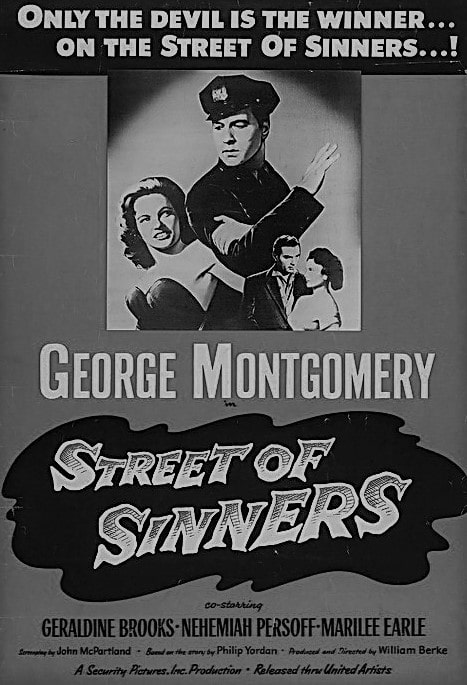 STREET OF SINNERS (1957)
STREET OF SINNERS (1957) (76 Min.) Genre: 1950 DRAMA, Transfer Quality: B
This action-filled police drama chronicles the difficult first year of a rookie cop. The trouble begins on his very first day on the beat when he has a conflict with the criminally connected owner of the local tavern. Against the more moderate advice of his experienced partner, the rookie insists on strictly enforcing every law on the books. His unbending toughness creates hard feelings with the neighborhood toughs and soon he becomes their target. He becomes quite upset when a drunken woman leaps from his window to her death. He is then suspended. Later he redeems himself by solving a murder and bringing the corrupt tavern owner to justice.
Starring: Geraldine Brooks, Nehemiah Persoff, Marilee Earle, William Harrigan | Directed by: William A. Berke
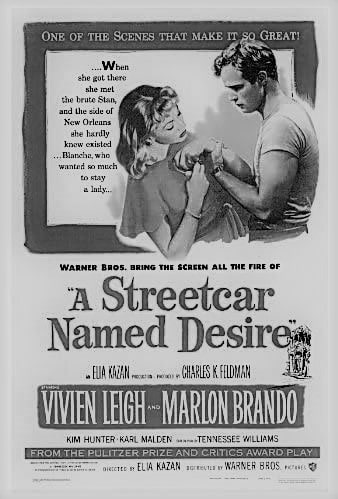 STREETCAR NAMED DESIRE, A (1951)
STREETCAR NAMED DESIRE, A (1951) (122 Min.) Genre: 1950 DRAMA, Transfer Quality: A
In the classic play by Tennessee Williams, brought to the screen by Elia Kazan, faded Southern belle Blanche DuBois (Vivien Leigh) comes to visit her pregnant sister, Stella (Kim Hunter), in a seedy section of New Orleans. Stella's boorish husband, Stanley Kowalski (Marlon Brando), not only regards Blanche's aristocratic affectations as a royal pain but also thinks she's holding out on inheritance money that rightfully belongs to Stella. On the fringes of sanity, Blanche is trying to forget her checkered past and start life anew. Attracted to Stanley's friend Mitch (Karl Malden), she glosses over the less savory incidents in her past, but she soon discovers that she cannot outrun that past, and the stage is set for her final, brutal confrontation with her brother-in-law. Brando, Hunter, and Malden had all starred in the original Broadway version of Streetcar, although the original Blanche had been Jessica Tandy. Brando lost out to Humphrey Bogart for the 1951 Best Actor Oscar, but Leigh, Hunter, and Malden all won Oscars.
Starring: Vivien Leigh, Marlon Brando, Kim Hunter, Karl Malden, Rudy Bond | Directed by: Elia Kazan
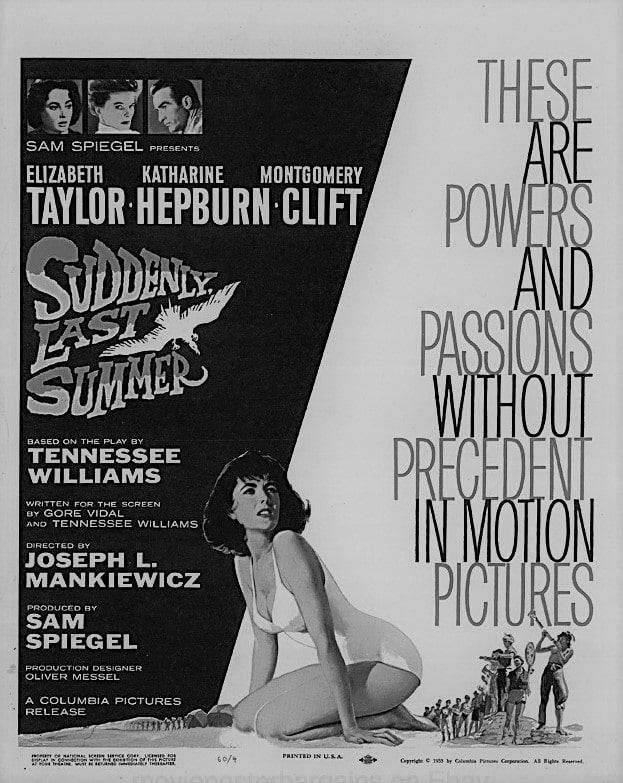 SUDDENLY, LAST SUMMER (1959)
SUDDENLY, LAST SUMMER (1959) (114 Min.) Genre: 1950 DRAMA, Transfer Quality: A
In this lush, lurid adaptation of the 1957 Tennessee Williams one-act, Elizabeth Taylor and Katharine Hepburn play a seemingly insane, young New Orleans debutante and the wealthy aunt who wants to lobotomize her. Dr. John Cukrowicz (Montgomery Clift) is a gifted Chicago brain surgeon stymied by the primitive operating conditions at the New Orleans asylum where he works. Society matron Violet Venable (Hepburn) offers a solution in the form of a million-dollar grant — as long as Cukrowicz will treat her niece, Catherine (Taylor). Catherine, it seems, has been institutionalized since the sudden death of her cousin, Violet's son, Sebastian, overseas the previous summer. As the young doctor tries to get to the bottom of what happened to Catherine, Violet's steely demeanor and devotion to Sebastian present a formidable barrier. Catherine herself doesn't offer much help, her recollections jumbled by medication and the trauma of Sebastian's demise. Under pressure to seal the deal and cut into Catherine's brain, Cukrowicz's principles (and attraction to the young woman) prevent him from proceeding until he uncovers what actually happened to Sebastian. In his memoirs, Gore Vidal claims to have written the screenplay for Suddenly, Last Summer single-handedly, although Williams took half the credit. Vidal toned down the original play's allusions to pedophilia, cannibalism, and incest, but the film nonetheless provoked heated controversy. As for the cast, an unhappy Hepburn reportedly once spat in producer Sam Spiegel's face. The grand dame was also allegedly threatened by the attention lavished on Taylor by director Joseph L. Mankiewicz, whom Hepburn had hired to produce The Philadelphia Story two decades earlier. Mankiewicz, for his part, allegedly hated Clift, whose drinking and partial paralysis from an auto accident prevented him from working more than half a day at a time. — Brian J. Dillard
Starring: Elizabeth Taylor, Katharine Hepburn, Montgomery Clift, Albert Dekker, Mercedes McCambridge | Directed by: Joseph L. Mankiewicz
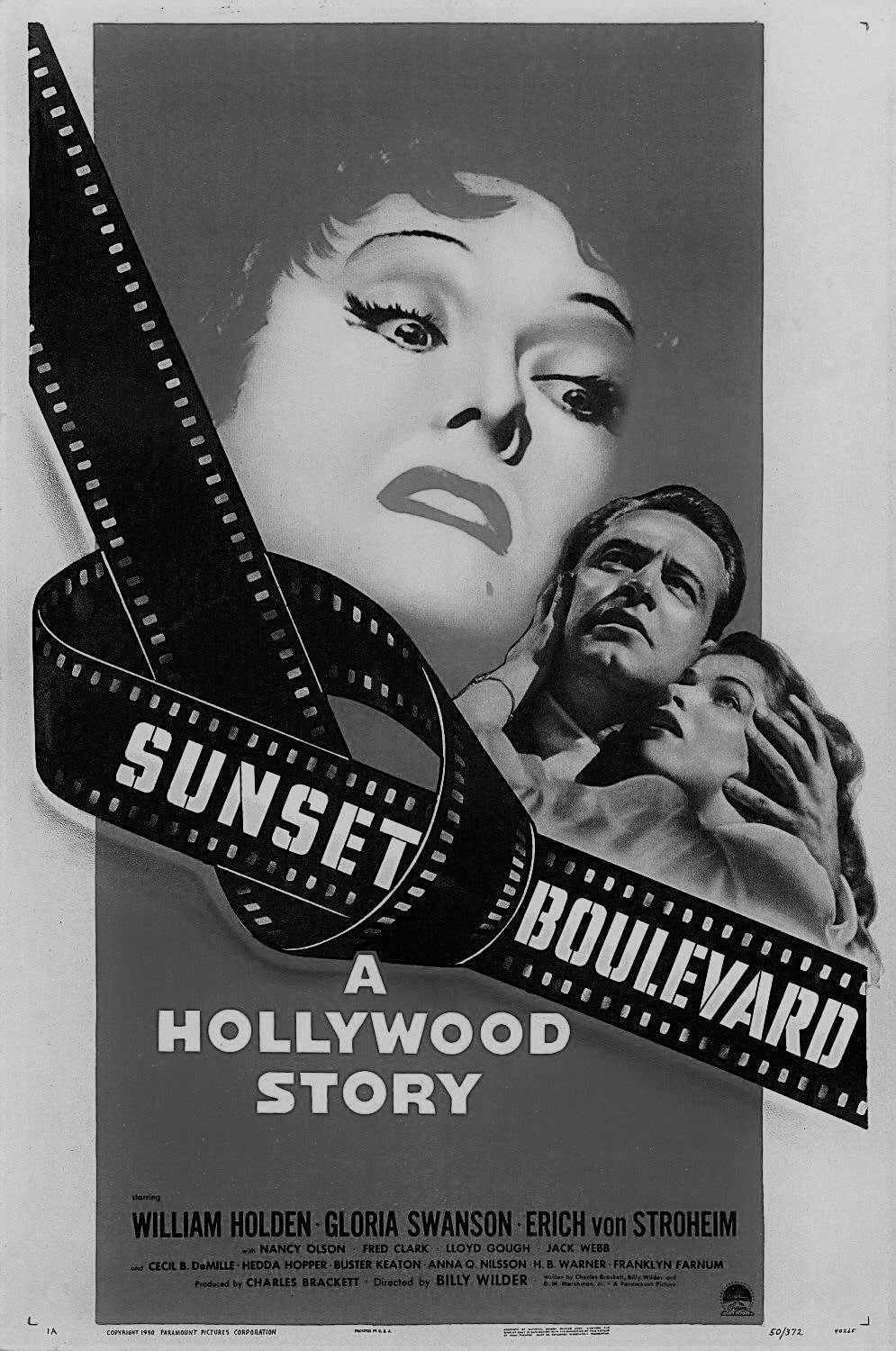 SUNSET BOULEVARD (1950)
SUNSET BOULEVARD (1950) (110 Min.) Genre: 1950 DRAMA, Transfer Quality: A
Billy Wilder's Sunset Boulevard ranks among the most scathing satires of Hollywood and the cruel fickleness of movie fandom. The story begins at the end as the body of Joe Gillis (William Holden) is fished out of a Hollywood swimming pool. From The Great Beyond, Joe details the circumstances of his untimely demise (originally, the film contained a lengthy prologue wherein the late Mr. Gillis told his tale to his fellow corpses in the city morgue, but this elicited such laughter during the preview that Wilder changed it). Hotly pursued by repo men, impoverished, indebted "boy wonder" screenwriter Gillis ducks into the garage of an apparently abandoned Sunset Boulevard mansion. Wandering into the spooky place, Joe encounters its owner, imperious silent star Norma Desmond (Gloria Swanson). Upon learning Joe's profession, Norma inveigles him into helping her with a comeback script that she's been working on for years. Joe realizes that the script is hopeless, but the money is good and he has nowhere else to go. Soon the cynical and opportunistic Joe becomes Norma's kept man. While they continue collaborating, Norma's loyal and protective chauffeur Max Von Mayerling (played by legendary filmmaker Erich von Stroheim) contemptuously watches from a distance. More melodramatic than funny, the screenplay by Wilder and Charles Brackett began life as a comedy about a has-been silent movie actress and the ambitious screenwriter who leeches off her. (Wilder originally offered the film to Mae West, Mary Pickford and Pola Negri. Montgomery Clift was the first choice for the part of opportunistic screenwriter Joe Gillis, but he refused, citing as "disgusting" the notion of a 25-year-old man being kept by a 50-year-old woman.) Andrew Lloyd Webber's long-running musical version has served as a tour-de-force for contemporary actresses ranging from Glenn Close to Betty Buckley to Diahann Carroll. — Hal Erickson
Starring: William Holden, Gloria Swanson, Erich Von Stroheim, Nancy Olson | Directed by: Billy Wilder
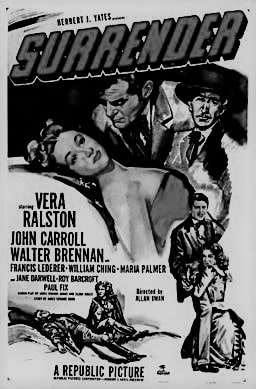 SURRENDER (1950)
SURRENDER (1950) (90 Min.) Genre: 1950 DRAMA, Transfer Quality: B
Of the many attempts by Republic Pictures' CEO Herbert J. Yates to turn his lady friend Vera Ralston into a star, Surrender is one of the better efforts. Ralston plays a conscienceless "femme fatale" who works out a complex scheme to secure her financial comfort. The plan, enacted in a western border town, involves bigamy, betrayal, and ultimately murder. She plays one man against another all too well; in the end Vera's perfidy backfires, and she falls victim to her own machinations. Vera Ralston tries hard indeed but the audience can sense that she is basically too nice to be making such mean faces.
Starring: Vera Ralston, John Carroll, Walter Brennan, Francis Lederer | Directed by: Allan Dwan
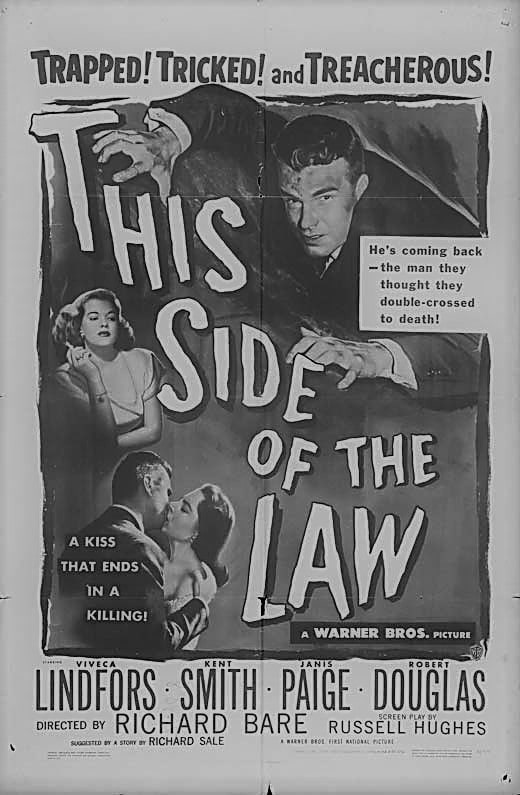 THIS SIDE OF THE LAW (1950)
THIS SIDE OF THE LAW (1950) (74 Min.) Genre: 1950 DRAMA, Transfer Quality: C
This Side of the Law stars Kent Smith as David Cummins, a man caught up in an epic subterfuge. At the behest of attorney Philip Cagle (Robert Douglas), Cummins poses as a man who has been missing for seven years and is presumed dead. Cagle insists that this deception is necessary to protect a huge estate from avaricious relatives. Cummins finds himself heir to a far-from-loving wife, a resentful brother and a seductive sister-in-law. That's right: there's much more to this than meets the eye. Top-billed Viveca Lindfors brings a bit of texture to the otherwise two-dimensional character of Cummins' "wife."
Starring: Viveca Lindfors, Kent Smith, Janis Paige, Robert Douglas | Directed by: Richard L. Bare
 THREE BAD SISTERS (1956)
THREE BAD SISTERS (1956) (76 Min.) Genre: 1950 DRAMA, Transfer Quality: B
In this steamy drama, three sisters learn that their father has died in a plane crash, and they begin fighting over his enormous estate to see who is to be the principal heiress. One of the sisters is particularly wicked. Wanting it all for herself, she maims one of her siblings so badly that the girl kills herself. She then hires the man who flew the plane the day their father died to help her kill the second sister in exchange for a piece of the fortune. The pilot agrees, but then falls in love with the second sister and marries her. The evil sister gets revenge by telling the new bride that she is having an affair with the pilot. The distraught sister is just about to jump off a cliff when the pilot and the bad seed accidentally drive over the cliff themselves.
Starring: Marla English, Sara Shane, Kathleen Hughes, John Bromfield | Directed by: Gilbert Kay
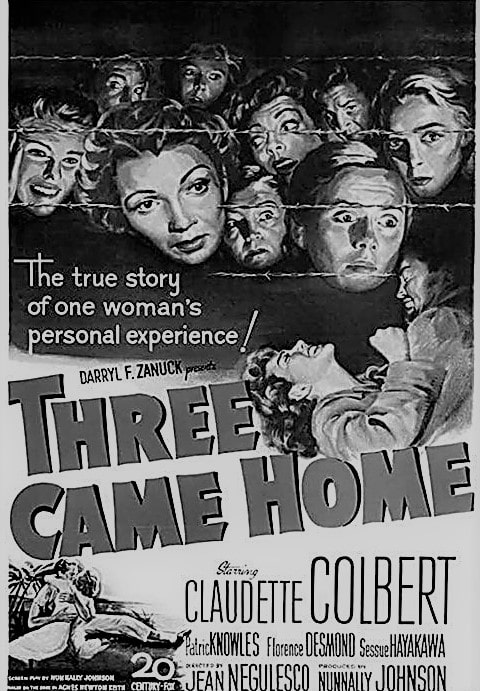 THREE CAME HOME (1950)
THREE CAME HOME (1950) (106 Min.) Genre: 1950 DRAMA, Transfer Quality: B
Based on the autobiographical book by Agnes Newton Keith, Three Came Home stars Claudette Colbert as Mrs. Keith. Trapped in Borneo during the Japanese invasion, Mrs. Keith and her British husband (Patric Knowles) are penned up in a prison camp along with several other subjects. Despite the humanitarian views of camp commander Col. Suga (Sessue Hayakawa), Mrs. Keith is subject to torture, starvation, and humiliation at the hands of the guards, with Suga helpless to intervene lest he incur the wrath of his own superiors. Three Came Home contains several unforgettable moments, including a comic interlude between the male and female prisoners that ends abruptly with a barrage of Japanese bullets, and the heartwrenching scene wherein Suga learns that his family has been killed in a bombing raid. Since lapsing into the public domain in 1977, Three Came Home has popped up innumerable times on cable television.
Starring: Claudette Colbert, Patric Knowles, Sessue Hayakawa, Florence Desmond | Directed by: Jean Negulesco
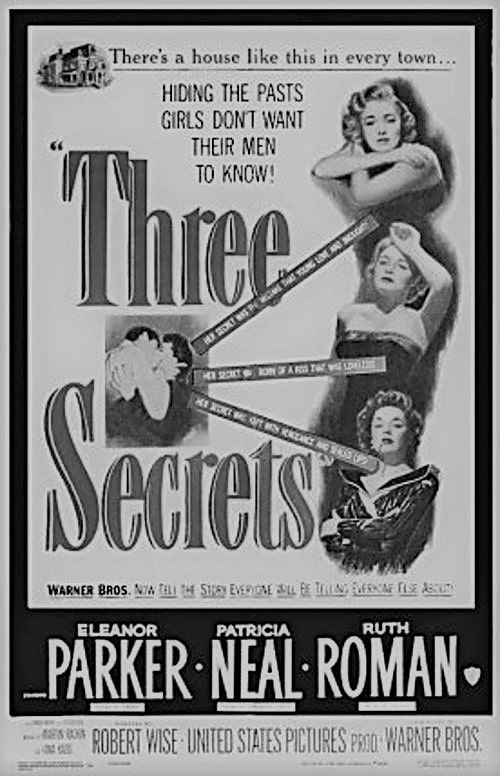 THREE SECRETS (1950)
THREE SECRETS (1950) (98 Min.) Genre: 1950 DRAMA, Transfer Quality: B
Three Secrets is a darker variation on a theme first explored in A Letter to Three Wives (1949). There's only one survivor when a private plane crashes in the mountains of California. That survivor is a five-year-old boy, who hovers between life and death. As efforts continue to save the boy, three women — Susan Chase (Eleanor Parker), Phyllis Horn (Patricia Neal) and Ann Lawrence (Ruth Roman) — wait in agony. Years earlier, each of the three women had given up a baby son for adoption. Could it be that the little boy on the mountain top is actually the son of one of the three women? And if so, how many painful secrets will be revealed in the next few hours?
Starring: Eleanor Parker, Patricia Neal, Ruth Roman, Frank Lovejoy | Directed by: Robert Wise
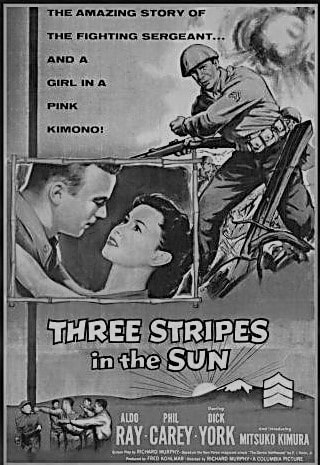 THREE STRIPES IN THE SUN (1955)
THREE STRIPES IN THE SUN (1955) (93 Min.) Genre: 1950 DRAMA, Transfer Quality: B
Three Stripes in the Sun was based on The Gentle Wolfhound, a New Yorker article written by E. J. Kahn Jr. Set in postwar Japan, the film concerns the activities of three U.S.-occupation soldiers: Sergeant Hugh O'Reilly ( Aldo Ray), the Colonel (Phil Carey) and Corporal Neeby Muhlendorf (Dick York). Though he hates the Japanese with a passion, Sergeant O'Reilly softens as he gets to know the local citizenry. Soon, the hard-bitten sergeant is sneaking food provisions to Japanese children and donating his GI pay towards the building of an orphanage; he also falls in love with lovely interpreter Yuko (Mitsuko Kimura). Meanwhile, the Colonel handles his responsibilities with slick, military precision, while Corporal Muhlendorf spends his time looking for "action." Serving as technical advisor on Three Stripes in the Sun is Master Sergeant Hugh O'Reilly, the real-life model for the Aldo Ray character.
Starring: Aldo Ray, Philip Carey, Dick York, Mitsuko Kimura, Chuck Connors | Directed by: Richard Murphy
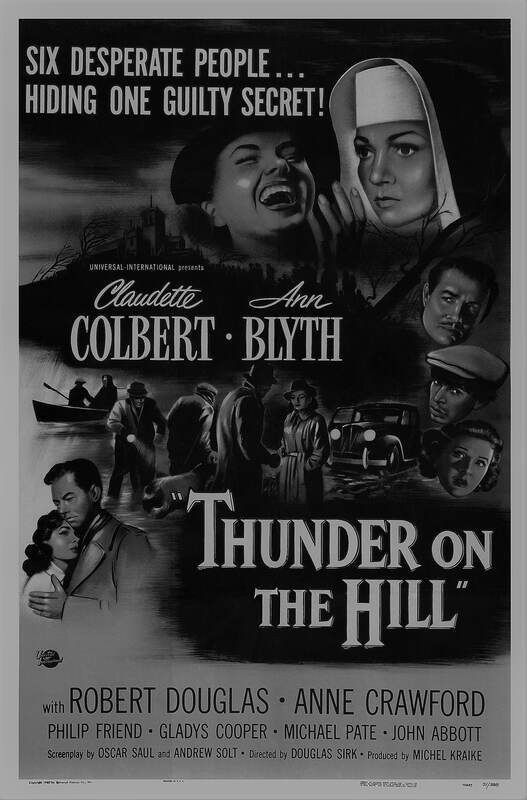 THUNDER ON THE HILL (1951)
THUNDER ON THE HILL (1951) (84 Min.) Genre: 1950 DRAMA, Transfer Quality: B
Charlotte Hastings' West End stage hit Bonaventure was adroitly translated to the American screen as Thunder on the Hill. The bulk of the action takes place at convent, presided over by Sister Mary (Claudette Colbert). Circumstances — namely, a dangerous rainstorm and raging flood — dictate that the convent become a stopover for Valerie Carns (Ann Blyth), a convicted murderess who is being escorted to Death Row by a brace of guards. Slowly becoming convinced that Valerie is innocent, Sister Mary sets about to clear the girl and bring the genuine killer to justice. It goes without saying that said killer is also a reluctant guest of the convent. A superb shadow-laden climax in the convent's belltower caps this heart-pounding mystery meller.
Starring: Claudette Colbert, Ann Blyth, Robert Douglas, Anne Crawford | Directed by: Douglas Sirk
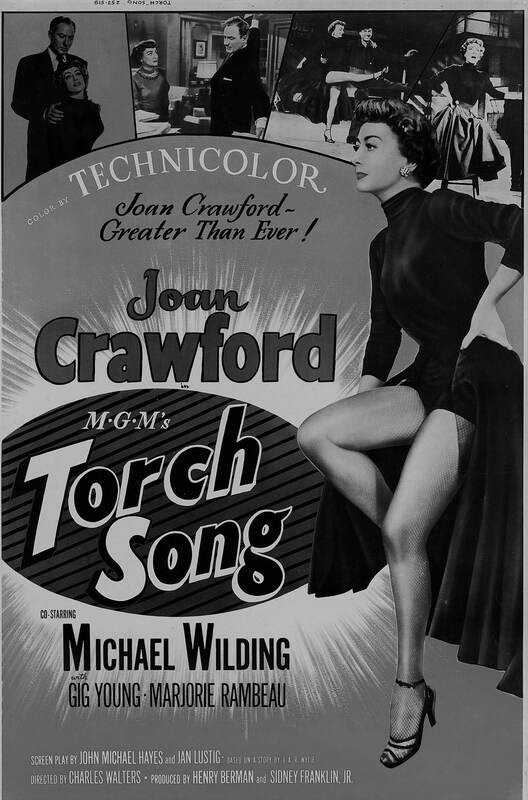 TORCH SONG (1953)
TORCH SONG (1953) (90 Min.) Genre: 1950 DRAMA, Transfer Quality: B
Joan Crawford's first Technicolor feature has come to be known as a textbook example of "high camp." Crawford stars as musical comedy luminary Jenny Stewart, who has been hardened by the worst life has to offer. Romance enters her life in the form of her new piano accompanist, blinded war-veteran Tye Graham (Michael Wilding). The fact that Graham refuses to kowtow to the temperamental Jenny's demands, coupled with the adversarial behavior of Graham's seeing-eye dog, makes the pianist all the more attractive to the lonely songstress. Torch Song is a favorite of bad-movie buffs and female impersonators the world over: Highlights include Crawford's blackface musical number, and the now-classic scene in which she simulates blindness to better understand the taciturn Graham. Director Charles Walters, a former choreographer, appears as Crawford's two-left-feet dancing partner in the opening scenes.
Starring: Joan Crawford, Michael Wilding, Gig Young, Marjorie Rambeau | Directed by: Charles Walters
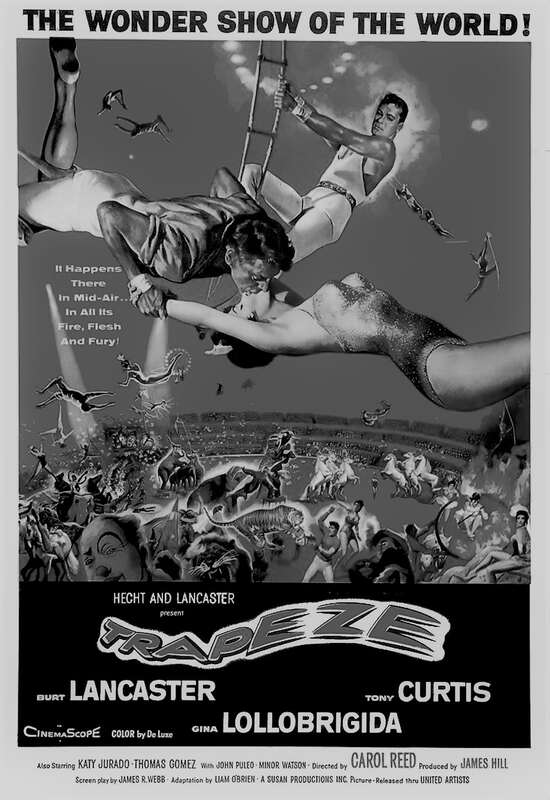 TRAPEZE (1956)
TRAPEZE (1956) (105 Min.) Genre: 1950 DRAMA, Transfer Quality: A
Former circus aerialist Burt Lancaster was the logical choice to star in the Technicolor drama Trapeze. Lancaster plays a crippled acrobat, disabled after attempting to perform a dangerous triple mid-air somersault. Tony Curtis co-stars as an aspiring aerialist who coerces Lancaster into teaching him the tricks of the trade. The friendship between Lancaster and Curtis is threatened by the arrival of beautiful, ambitious circus tumbler Gina Lollobridgida (it's a toss-up as to which of the three stars looks best in spangled tights). Surprisingly, Lancaster's former circus partner Nick Cravat is nowhere to be found in the film; we are, however, treated to the harmonica virtuosity of Johnny Puleo. Trapeze is highlighted by its truly breathtaking stunt sequences, performed by the cream of the European big-top circuit.
Starring: Burt Lancaster, Tony Curtis, Gina Lollobrigida, Katy Jurado, Thomas Gomez | Directed by: Carol Reed
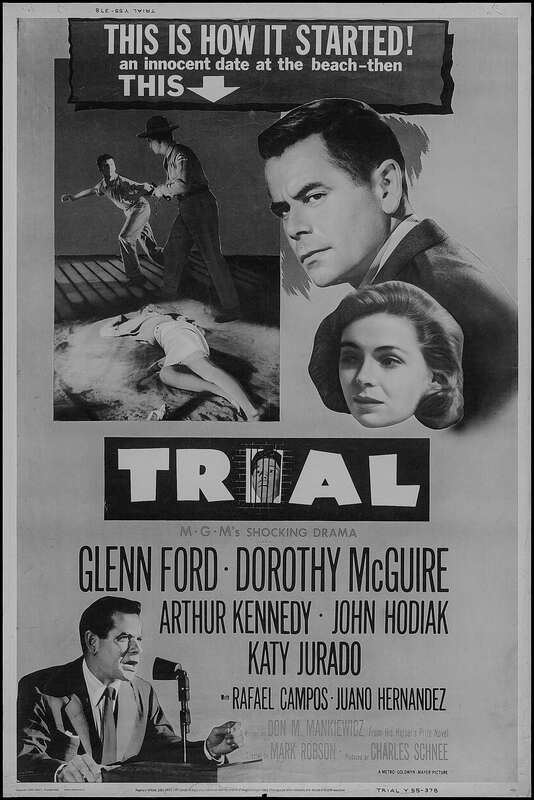 TRIAL (1955)
TRIAL (1955) (105 Min.) Genre: 1950 DRAMA, Transfer Quality: A
Adapted by Don M. Mankiewicz from his own novel, Trial is a surprisingly timely story of how justice can sometimes be compromised by "special interests". It all begins when Mexican youth Angelo Chavez (Rafael Campos) is placed on trial for the murder of a white teenaged girl. Battling the lynch-mob mentality in and out of the courtroom is relatively inexperienced defense attorney David Blake (Glenn Ford). Believing that anything done on behalf of his client is for the common good, Blake approves the organization of an "Angelo Chavez Society" to pay the boy's court costs and ostensibly see that justice is done in the face of small-town prejudice. Soon, however, Blake discovers that both he and his client are being used as dupes by a Communist lawyer, who hopes that Chavez will be found guilty and executed, thereby creating a martyr for the Red cause. Much was made in 1955 of the fact that the presiding judge is a black man, played by Juano Hernandez. A bit creaky at times, Trial nonetheless still packs a wallop when shown today. — Hal Erickson
Starring: Glenn Ford, Dorothy McGuire, Arthur Kennedy, John Hodiak, Elisha Cook Jr. | Directed by: Mark Robson
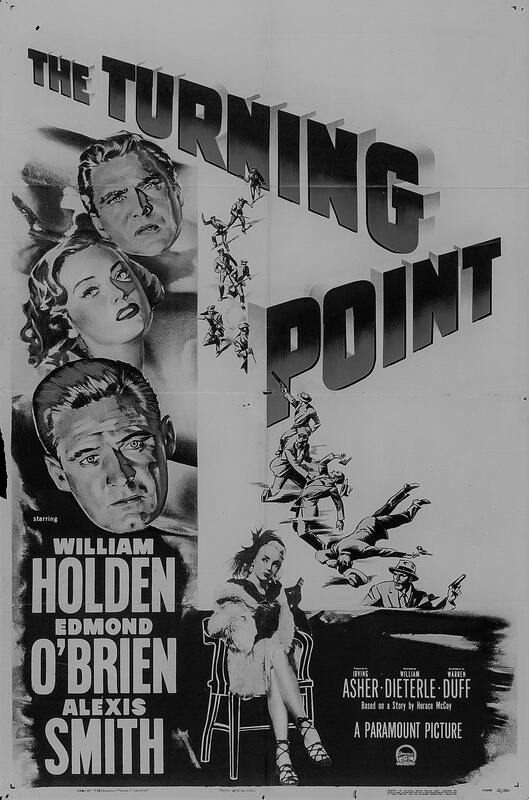 TURNING POINT, THE (1952)
TURNING POINT, THE (1952) (85 Min.) Genre: 1950 DRAMA, Transfer Quality: C
Edmond O'Brien stars as an idealistic state's attorney assigned to crack down on a crime syndicate. This proves more dangerous than first suspected, since the syndicate has a number of city officials in its pocket—including the father of one of the investigating committee's chairpersons. William Holden is the crusading newspaperman who attempts to help O'Brien, but even his efforts are compromised by deeply entrenched political corruption. The climax is staged at a crowded boxing arena, where Holden is struck down by an assassin's bullet intended for O'Brien. Inspired by the real-life Senate investigations of 1951, The Turning Point is neither a remake of a 1917 Paramount silent of the same name, nor was the 1977 ballet-oriented Turning Point a remake of the 1952 film.
Starring: William Holden, Edmond O'Brien, Alexis Smith, Tom Tully | Directed by: William Dieterle
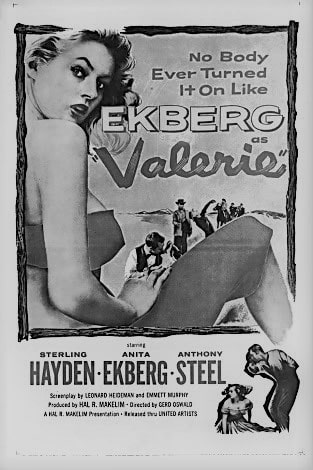 VALERIE (1957)
VALERIE (1957) (84 Min.) Genre: 1950 DRAMA, Transfer Quality: B
Anita Ekberg amply fills the title role in the offbeat western Valerie. Clearly inspired by Rashomon, the film offers contradictory flashbacks during a lengthy trial. The defendant, Civil War hero John Garth, Sterling Hayden, is accused of seriously wounding his wife Valerie and murdering her parents. At first, the jury's sympathy is with Garth, who claims that his faithless wife was running off with preacher Blake (played by Ekberg's then-husband Anthony Steel) and that the death of his in-laws was accidental. But as testimony proceeds, it is revealed that the highly respectable, much-beloved Garth is a beast in human form. The complicated outcome of the trial has so many twists and turns that it would be criminal to reveal any one of them.
Starring: Sterling Hayden, Anita Ekberg, Anthony Steel, Peter Walker, John Wengraf | Directed by: Gerd Oswald
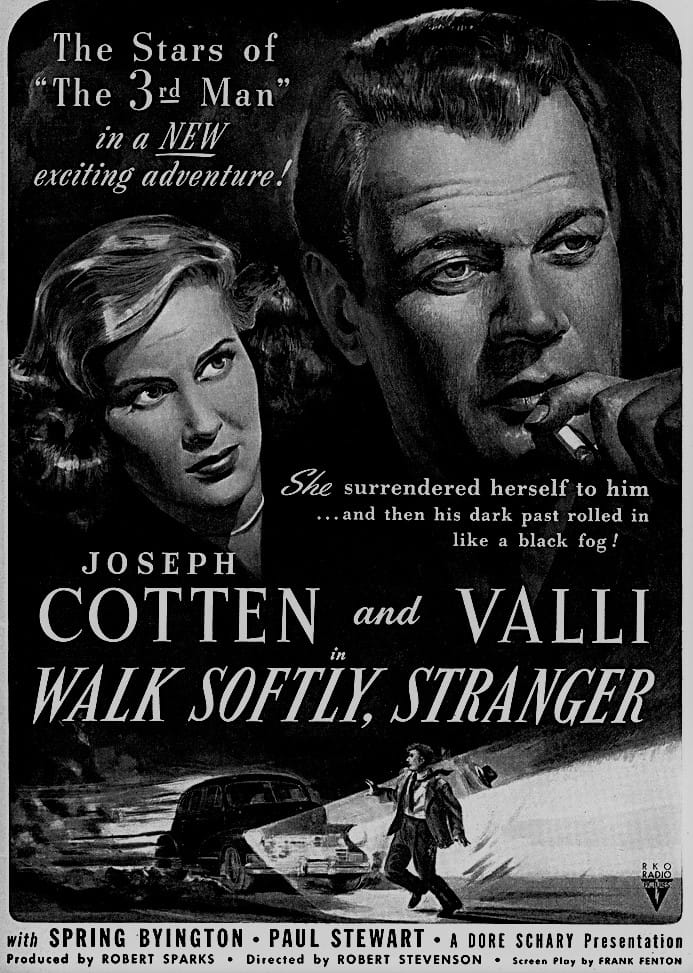 WALK SOFTLY, STRANGER (1950)
WALK SOFTLY, STRANGER (1950) (81 Min.) Genre: 1950 DRAMA, Transfer Quality: A
Joseph Cotten stars in Walk Softly, Stranger as Chris Hale, a fugitive criminal who decides to hide out in a small Midwestern town. Here, Hale makes the acquaintance of Elaine Corelli (Alida Valli), who has had a grudge against the world since being crippled in a skiing accident. While endeavoring to help Elaine come out of her shell, Hale falls in love with her, and vows to mend his own ways. Though not released until 1950, Walk Softly, Stranger was filmed in 1948, a year before Joseph Cotten and Alida Valli were teamed in the more celebrated The Third Man. Future talk-show host Jack Paar appears in a fascinating supporting role as a suburban hubby. Walk Softly, Stranger was the last co-production between RKO and David O. Selznick's Vanguard Films. — Hal Erickson
Starring: Joseph Cotton, Alida Valli, Spring Byington, Paul Stewart | Directed by: Robert Stevenson
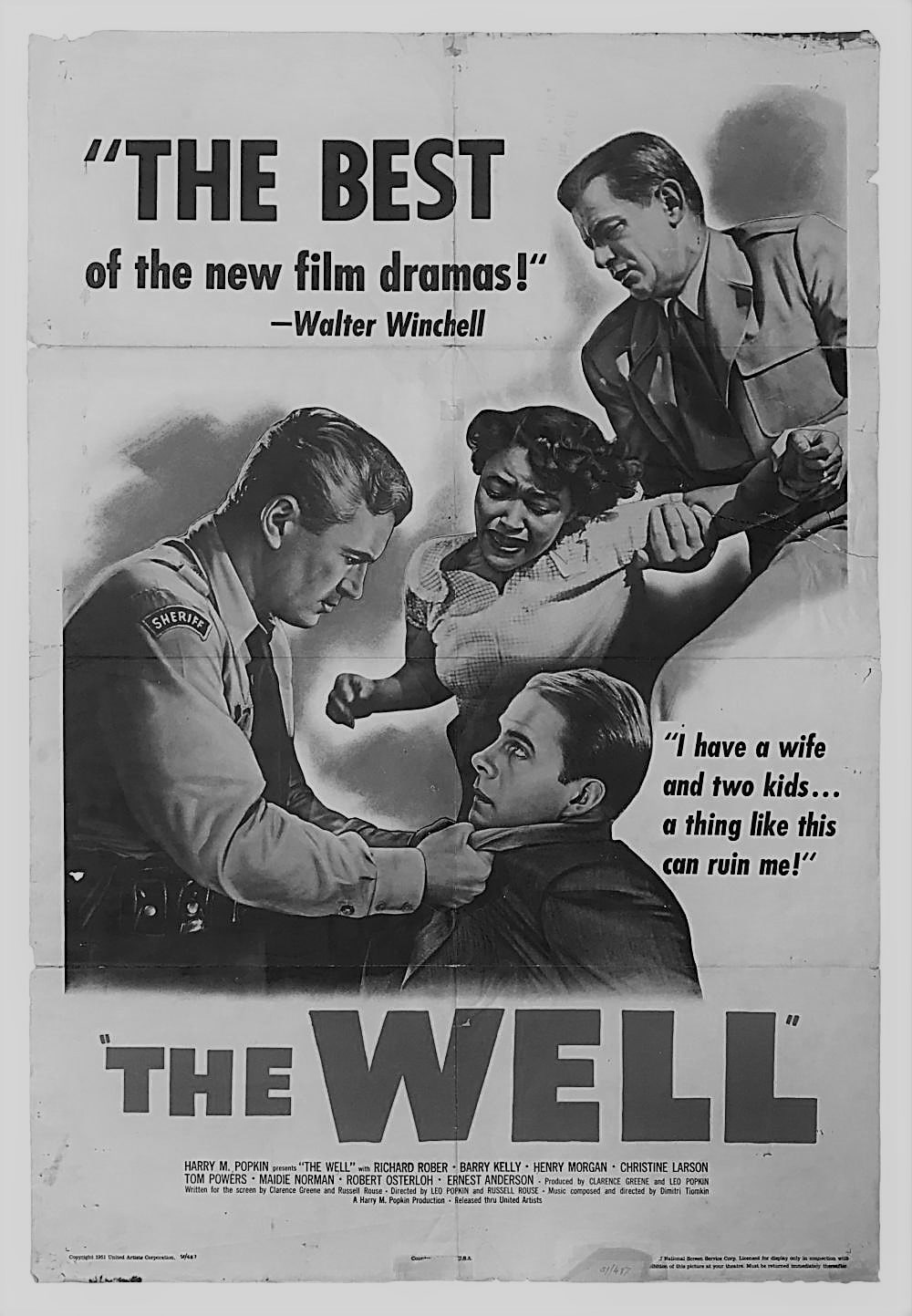 WELL, THE (1951)
WELL, THE (1951) (85 Min.) Genre: 1950 DRAMA, Transfer Quality: B
The Well is a modest but generally effective plea for racial tolerance. Based loosely on a real incident, the film tells of the disappearance of a little African-American girl in a small, segregated community. Caucasian Claude Packard (Harry Morgan, the nephew of the town's richest man (Barry Kelley), is the last person seen with the little girl. Sensing a coverup when Morgan is not immediately charged, the black community is on the verge of a riot. But when it's discovered that the little girl has fallen down a well, all racial differences are forgotten as black and white neighbors work shoulder to shoulder to rescue the child. The Well tries very hard to be equitable by 1951 standards, and is heartfelt enough to overcome its occasional lapses into stereotype and condescension.
Starring: Richard Rober, Gwendolyn Laster, Maide Norman, George Hamilton | Directed by: Leo C. Popkin, Russell Rouse
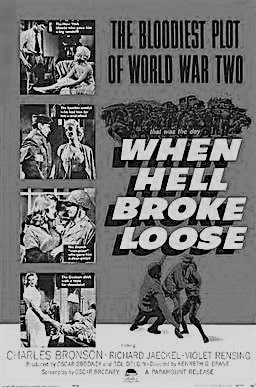 WHEN HELL BROKE LOOSE (1958)
WHEN HELL BROKE LOOSE (1958) (78 Min.) Genre: 1950 DRAMA, Transfer Quality: B
To escape arrest, small-time bookie Steve Boland (Charles Bronson) joins the army. Soon he figures that he'd have been better off in jail: an unrepentant foul-up, Boland just can't seem to get in step with military protocol. All this changes when Steve falls in love with level-headed Ilsa (Violet Rensing). In a thoroughly out-of-left-field plot development, Steve becomes a hero when acting upon Ilsa's warning that there's a communist plot afoot to assassinate President Eisenhower! The trade magazine Variety observed that the banality of When Hell Broke Loose could be gauged by the fact that two of the characters are named "Brooklyn" and "Jonesey."
Starring: Charles Bronson, Violet Rensing, Richard Jaeckel, Arvid Nelson, Robert Easton | Directed by: Kenneth G. Crane
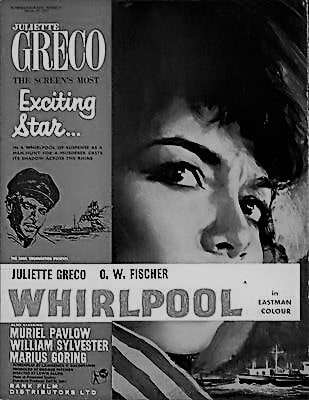 WHIRLPOOL (1959)
WHIRLPOOL (1959) (95 Min.) Genre: 1950 DRAMA, Transfer Quality: B
An uneven, bland tale of escape and capture on the River Rhine, Whirlpool features Juliette Greco as Lora, the girlfriend of a petty criminal. She wants to leave him but does not make the desperate effort leaving requires, until after he shoots a policeman. Then she escapes him by boarding a German tanker. Her obvious charms captivate the captain (O.W. Fischer), his First Mate, and another deck hand, but after her last experience she shuns all of them. Trouble brews as one of the wives on board is overcome with jealousy, and worse yet, as Lora's old boyfriend, now on the run from the police, decides to join her on the tanker.
Starring: Juliette Greco, O.W. Fischer, Marius Goring, William Sylvester | Directed by: Lewis Allen
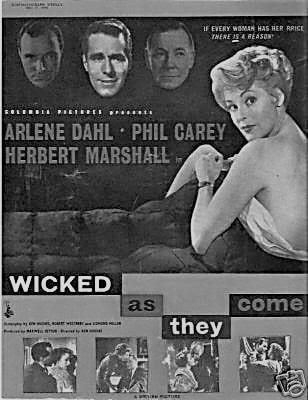 WICKED AS THEY COME (1956)
WICKED AS THEY COME (1956) (94 Min.) Genre: 1950 DRAMA, Transfer Quality: B
Wicked as They Come (aka Portrait in Smoke) stars Arlene Dahl as Kathy Allen, whose sour attitude on life has been formed by a sexual assault in her childhood. Rising out of the shabbiness of the Lower East Side, Kathy ruthlessly climbs the social and financial ladder by using and then abandoning a series of gullible older men. When she finally gets what she wants out of life, it still isn't enough, and it is this insatiability that leads to her downfall. Extensive location filming in London and Paris adds an exotic touch to this predictable melodrama. Wicked as They Come is based on Portrait in Smoke, a novel by Bill Ballington.
Starring: Arlene Dahl, Philip Carey, Herbert Marshall, Michael Goodliffe | Directed by: Ken Hughes
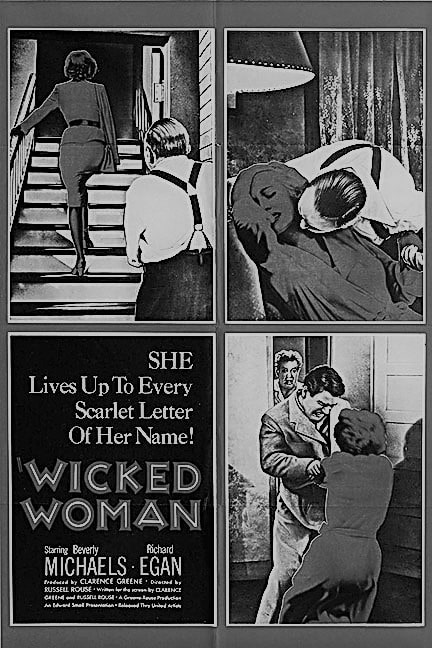 WICKED WOMAN (1953)
WICKED WOMAN (1953) (77 Min.) Genre: 1950 DRAMA, Transfer Quality: B
Though Wicked Woman may look like one of those heavy-breathing Hugo Haas-directed melodramas, the film was in fact directed by screenwriter Russell Rouse. The title character, played by Beverly Michaels, is a trashy blonde who swivels into a small California town. Here she weaves her seductive web around a bar owner (Richard Egan), who leaves his alcoholic wife (Evelyn Scott) behind. The two lovers scheme to sell the bar for a profit and dash off to Mexico, but their scheme is foiled by their own perfidy. Wicked Woman represents perhaps the best-ever screen performance of ubiquitous, squeaky-voiced character actor Percy Helton, who deservedly ends up as the recipient of one of the most spectacular slaps in the face in movie history.
Starring: Beverly Michaels, Richard Egan, Percy Helton, Evelyn Scott, Robert Osterloh | Directed by: Russell Rouse
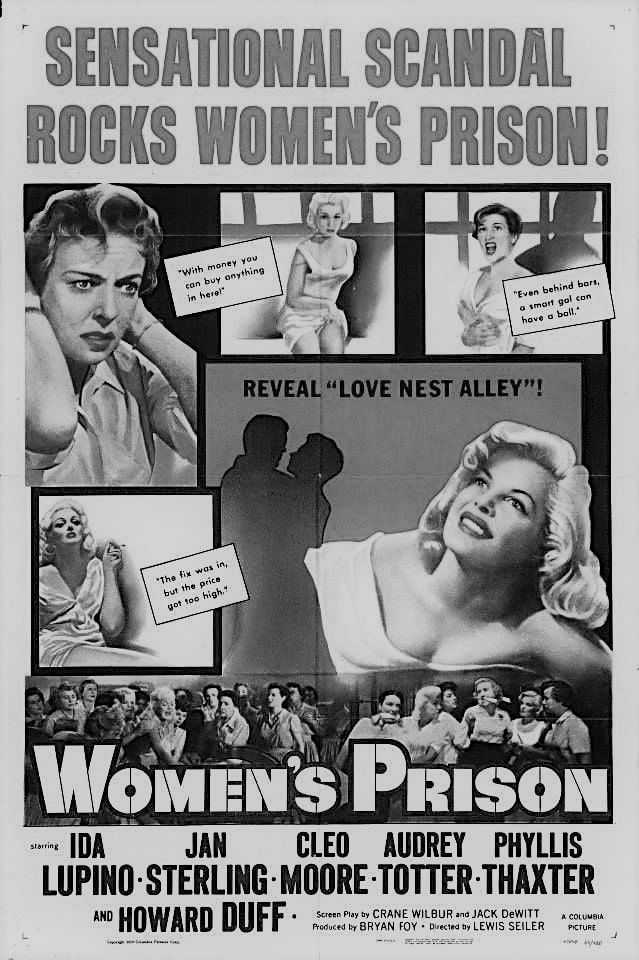 WOMEN'S PRISON (1955)
WOMEN'S PRISON (1955) (80 Min.) Genre: 1950 DRAMA, Transfer Quality: A
With the exception of the vastly superior Caged, Columbia's Women's Prison was the quintessential "babes behind bars" drama of the 1950s. Ida Lupino (who else?) stars as Amelia VanZant, the sadistic supervisor of the titular prison. Unable to establish any sort of relationship with a man, Amelia takes it out on her long-suffering inmates. When prison psychiatrist Clark (Howard Duff) tries to improve conditions for the women, he too is targetted for destruction by the vituperous Ms. VanZant. The cast includes such perennial "hard-boiled dames" as Jan Sterling, Cleo Moore, Audrey Totter, Phyllis Thaxter, Gertrude Michael and Mae Clarke. Not taken very seriously in the first place, Women's Prison was elevated to the level of "high camp" by youthful film buffs of the 1960s and 1970s. — Hal Erickson
Starring: Ida Lupino, Jan Sterling, Cleo Moore, Audrey Totter, Phyllis Thaxter | Directed by: Lewis Seiler
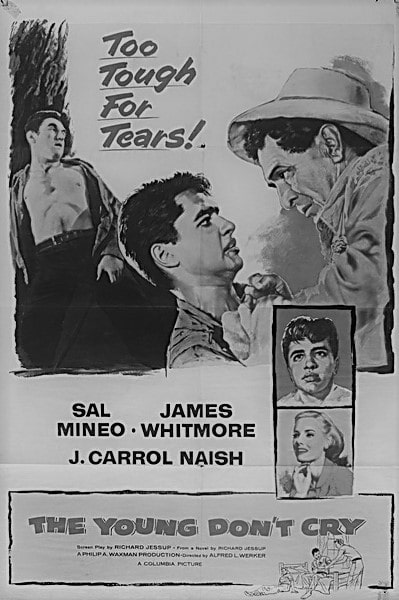 YOUNG DON'T CRY, THE (1957)
YOUNG DON'T CRY, THE (1957) (89 Min.) Genre: 1950 DRAMA, Transfer Quality: B
17-year-old Sal Mineo was one of the hottest young actors in Hollywood when The Young Don't Cry was specially tailored for his talents. Filmed on location at the Bethesda Home for Boys in Savannah, Georgia, the film stars Mineo as Leslie Henderson, a lonely older orphan who befriends escaped convict Rudy Krist (James Whitmore). Like Leslie, Rudy has spent his entire life feeling alone and unloved, but in his case he is totally irredeemable, using Leslie to further his own getaway plans. At long last, Leslie figures out that Rudy is a no-good—and also finds his own true niche in life. Worth noting is the film's sympathetic treatment of its two principal black characters, played by Leigh Whipper and Ruth Attaway; in 1957, it was still chancy to show any sort of equanimity between black and white people on screen.
Starring: Sal Mineo, James Whitmore, J. Carrol Naish, Gene Lyons | Directed by: Alfred L. Werker
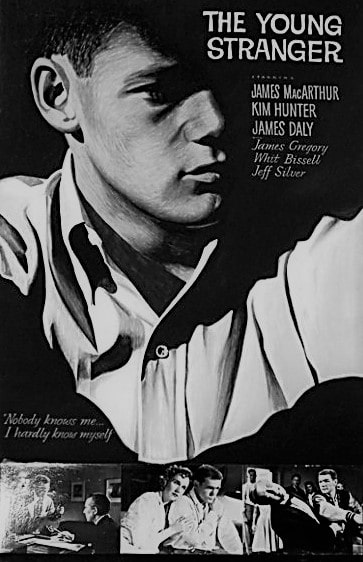 YOUNG STRANGER, THE (1957)
YOUNG STRANGER, THE (1957) (84 Min.) Genre: 1950 DRAMA, Transfer Quality: A
Adapting a made-for-TV play that he had directed for the screen, John Frankenheimer made his feature film debut with this sensitive father-son drama. Tom Ditmar (James Daly) is a movie studio executive who has a strained relationship with his teenaged son Hal (James MacArthur). Hal is arrested after an incident in a movie theater in which he was provoked into slugging the manager, Grubbs (Whit Bissell). Hal is rude to the police officer, Sergeant Shipley (James Gregory). Tom Ditmar gets the charges dropped but doesn't believe his son's story. Hal goes back to talk to Grubbs to try to get him to tell his father what really happened.
Starring: James MacArthur, Kim Hunter, James Gregory, Whit Bissell, Jeff Silver | Directed by: John Frankenheimer
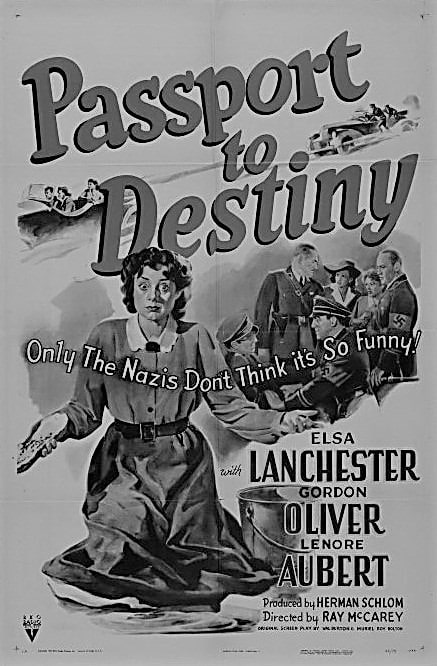 PASSPORT TO DESTINY (1944)
PASSPORT TO DESTINY (1944) (65 Min.) Genre: 1940 DRAMA, Transfer Quality: B
Originally titled Passport to Destiny, RKO's Passport to Adventure manages to be both whimsical and melodramatic all at once. Elsa Lanchester stars as a Cockney charwoman who sneaks into wartime Berlin, fully intending to kill Adolf Hitler. Lanchester is convinced that a snake-eyed charm left to her by her late military-officer husband will protect her from harm-and, given the ease with which she obtains a domestic job in the Berlin chancellory by posing as a deaf-mute, who's to say that the charm doesn't work? Once the Nazis catch on to Lanchester's mission, she is rescued by German officer Gordon Oliver, who happens to be a member of the underground resistance. One of the best bits in Passport to Adventure occurs at the beginning, when Elsa Lanchester gazes reverently upon a photo of her dear departed husband-whom we immediately recognize as Lanchester's real-life hubby Charles Laughton.
Starring: Elsa Lanchester, Gordon Oliver, Lenore Aubert, Lionel Royce | Directed by: Ray McCarey
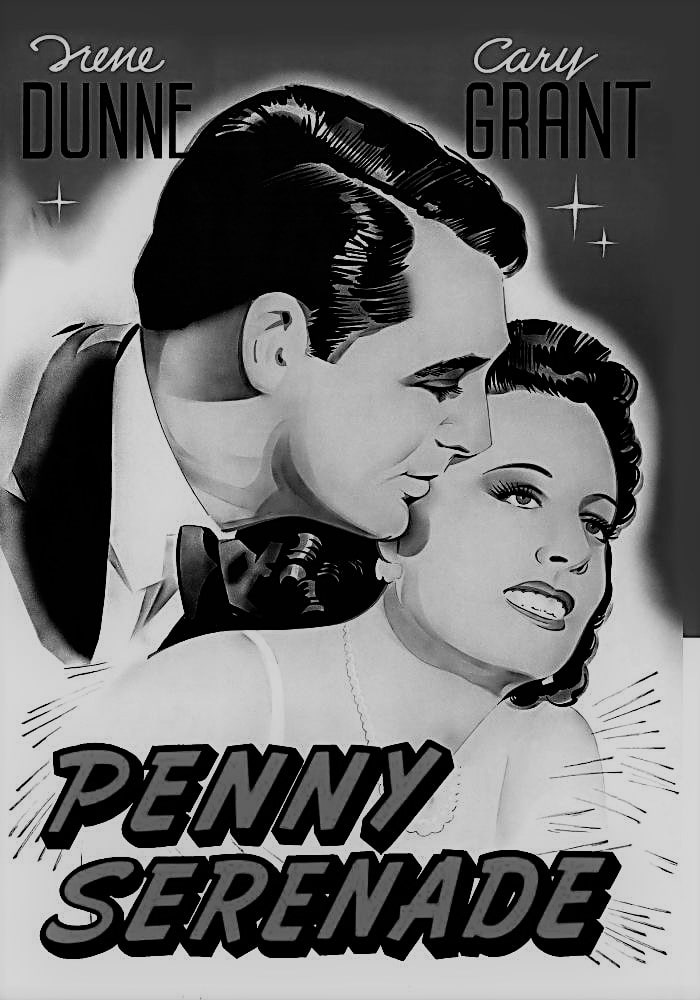 PENNY SERENADE (1941)
PENNY SERENADE (1941) (125 Min.) Genre: 1940 DRAMA, Transfer Quality: A
While listening to a recording of "Penny Serenade", Irene Dunne begins reflecting on her past. She recalls her near-impulsive marriage to newspaper reporter Cary Grant, which begins on a deliriously happy note but which turns out to be fraught with tragedy. While honeymooning in Japan, Dunne and Grant are trapped in the 1923 earthquake, which results in her miscarriage and subsequent incapability to bear children. Upon their return to America, Grant becomes editor of a small-town newspaper, just scraping by financially. Despite their depleted resources, Dunne and Grant want desperately to adopt a child. It seems hopeless until kindly adoptation agency head Beulah Bondi helps smooth their path. Alas, their happiness is once more shortlived: their new daughter, Eva Lee Kuney, succumbs to a sudden illness at the age of 6. Reduced to hopelessness, Dunne and Grant decide to dissolve their marriage, but Bondi once more comes to the rescue. Sentimental in the extreme, Penny Serenade is also enormously effective, balancing moments of heartbreaking pathos with uproarious laughter. Only director George Stevens could have handled a scene with a copiously weeping Cary Grant without inducing discomfort or embarrassment in the audience. Since lapsing into public domain in 1968 (though released by Columbia, the film was owned by Stevens' production firm), Penny Serenade has become almost as ubiquitous a cable-TV presence as It's a Wonderful Life. — Hal Erickson
Starring: Cary Grant, Irene Dunne, Beulah Bondi, Edgar Buchanan | Directed by: George Stevens
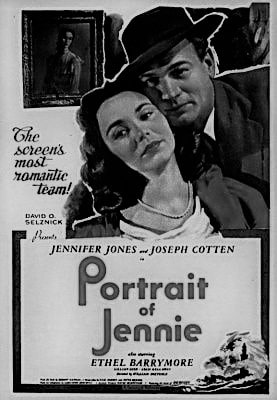 PORTRAIT OF JENNIE (1948)
PORTRAIT OF JENNIE (1948) (86 Min.) Genre: 1940 DRAMA, Transfer Quality: A
Joseph Cotten plays an artist who is unable to bring any true feeling to his work. While painting in Central Park one morning, Cotten makes the acquaintance of a schoolgirl named Jennie (Jennifer Jones), who prattles on about things that happened years ago. Intrigued at her thorough knowledge of the past, Cotten is about to converse with her further, but Jennie has vanished. Over the next few months Cotten meets Jennie again and again-and each time she seems to have aged by several years. He paints her portrait, which turns out to be more full of expression and emotion than anything he's previously done. His curiosity peaked by Jennie's enigmatic nature, Cotten uncovers evidence that he has been conversing—and falling in love—with the ghost of a girl who died years earlier in a hurricane. On the eve of the hurricane's anniversary, Cotten rushes to meet Jennie at the site where she was supposedly killed. As a new storm rages, Jennie vanishes for good, but not before declaring that the love she and Cotten have shared will live forever. Rescued from the storm, Cotten convinces himself that Jennie was a mere figment of his imagination. Then he notices that he stills clutches her scarf in his hand. He looks at his portrait of Jennie (the only Technicolor shot in this otherwise black-and-white film) and understands what she meant when she said that their love would endure throughout eternity: it will do so through Cotten's art, both the portrait at hand and all future portraits. Based on the novel by Robert Nathan, Portrait of Jennie is one of the most beautifully assembled fantasies ever presented on screen. Producer David O. Selznick's unerring eye for "rightness" enabled him to select the perfect stars, supporting cast (Lillian Gish, Ethel Barrymore, David Wayne, Cecil Kellaway et. al.), director, cinematographer (Joseph August) and composer (Dmitri Tiomkin, who based his themes on the works of Debussy), and blend everything into one ideally balanced package. — Hal Erickson
Starring: Joseph Cotton, Jennifer Jones, Ethel Barrymore, David Wayne | Directed by: William Dieterle
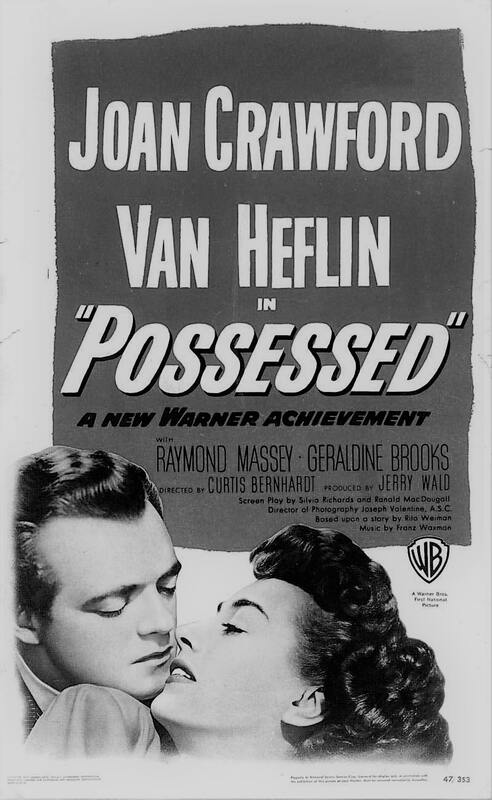 POSSESSED (1947)
POSSESSED (1947) (108 Min.) Genre: 1940 DRAMA, Transfer Quality: A
We first meet Joan Crawford, star of the moody flashbackfest Possessed, wandering aimlessly through the city streets, moaning "David....David." She goes to pieces in public and is rushed to the mental ward, where a team of psychiatrists try to find out who she is and where she's been. Who she is is a practical nurse, hired by Raymond Massey to care for Massey's invalid wife. While going about her duties, Crawford renews her acquaintance with an old flame, architect Van Heflin. Though Heflin is indifferent, Crawford is still crazy for the man. She remains so even after marrying her employer Massey, whose wife has committed suicide. Any further details would give away the ending, but we can note that Van Heflin's character name is David. Best scene: Crawford, descending into schizophrenia, imagining that she's killed Massey's vitriolic daughter Geraldine Brooks. While the psycho-babble delivered in the asylum scenes is laughable, Possessed still holds up well as one of the best of Joan Crawford's Warner Bros. soap operas. This black-and-white film is also available in a colorized version, but don't blame us. — Hal Erickson
Starring: Joan Crawford, Van Heflin, Raymond Massey, Griff Barnett | Directed by: Curtis Bernhardt
 RAGE IN HEAVEN (1941)
RAGE IN HEAVEN (1941) (83 Min.) Genre: 1940 DRAMA, Transfer Quality: A
A Rage in Heaven was based on a novel by James Hilton, who thanks to Lost Horizon and Goodbye Mr. Chips was a "hot property" in 1941. Going through many of the same paces he'd trod in Night Must Fall, Robert Montgomery stars as British steel mill owner Philip Monrell, whose outward charm and insouciance disguises the fact that he suffers from hereditary insanity. Throughout his life, Monrell has successfully sidestepped responsibility by hiding behind the accomplishments of his best friend, Ward Andrews (George Sanders). When he marries Stella Bergen (Ingrid Bergman), his mother's pretty travelling companion, the neurotic Monrell becomes obsessed with the belief that Andrews is trying to steal Stella away from him-and thanks to his paranoia, Andrews and Stella do indeed fall in love. Unsuccessful in his efforts to murder Andrews, Monrell decides to exact a bizarre revenge by committing suicide and planting enough clues so that Andrews will be charged with his murder! Though absent from the final half-hour of A Rage in Heaven, Robert Montgomery continues to dominate the proceedings; indeed, for a while it looks as though he will "win" in the end after all. Making her third Hollywood film appearance, Ingrid Bergman felt that the role of Stella Bergen was inadequately suited to her and did her best to drop out of the picture; reportedly, she was mollified when MGM promised to let her play against type as the "bad" girl in Dr. Jekyll and Mr. Hyde. — Hal Erickson
Starring: Robert Montgomery, Ingrid Bergman, George Sanders, Lucile Watson | Directed by: W.S. Van Dyke
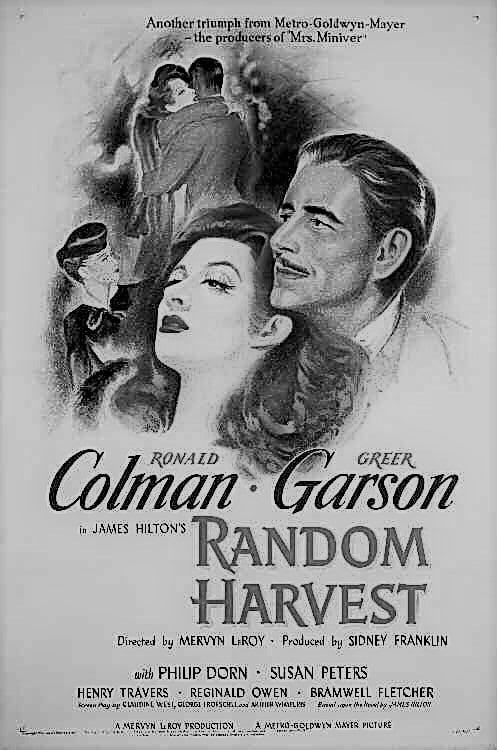 RANDOM HARVEST (1942)
RANDOM HARVEST (1942) (126 Min.) Genre: 1940 DRAMA, Transfer Quality: A
At the close of World War I, shell-shocked amnesia victim Ronald Colman is sequestered in a London sanitarium; with no identity and no next of kin, he has nowhere else to go. Unable to stand the loneliness, Colman wanders into the streets, then stumbles into a music hall, where he is befriended by good-natured entertainer Greer Garson. That Colman and Garson fall in love and marry should surprise no one; what is surprising, at least to Colman, is that he discovers that he has a talent for writing. Three years pass: while in Liverpool to sell one of his stories, Colman is struck down by a speeding car. When he comes to, he has gained full memory of his true identity; alas, he has completely forgotten both Garson and their child. Returning to his well-to-do relatives, Colman takes over the family business. Having lost her child, the distraught Garson seeks out the missing Colman. Psychiatrist Philip Dorn helps Garson, advising her that to reveal her identity may prove a fatal shock for her husband. To stay near him all the same, Garson takes a job as Colman's secretary. "Strangely" attracted to Garson, Colman falls in love with her all over again. Will there be yet another memory lapse? Under normal circumstances, we wouldn't believe a minute of Random Harvest, but the magic spell woven by the stars and by author James Hilton (Lost Horizon, Goodbye Mr. Chips etc.) transforms the wildly incredible into the wholly credible (just one quibble: isn't Colman a bit long in tooth as a "young" World War I veteran?) The film was one of MGM's biggest hits in 1942—indeed, one of the biggest in the studio's history.
Starring: Ronald Colman, Greer Garson, Philip Dorn, Susan Peters, Reginald Owen | Directed by: Mervyn LeRoy
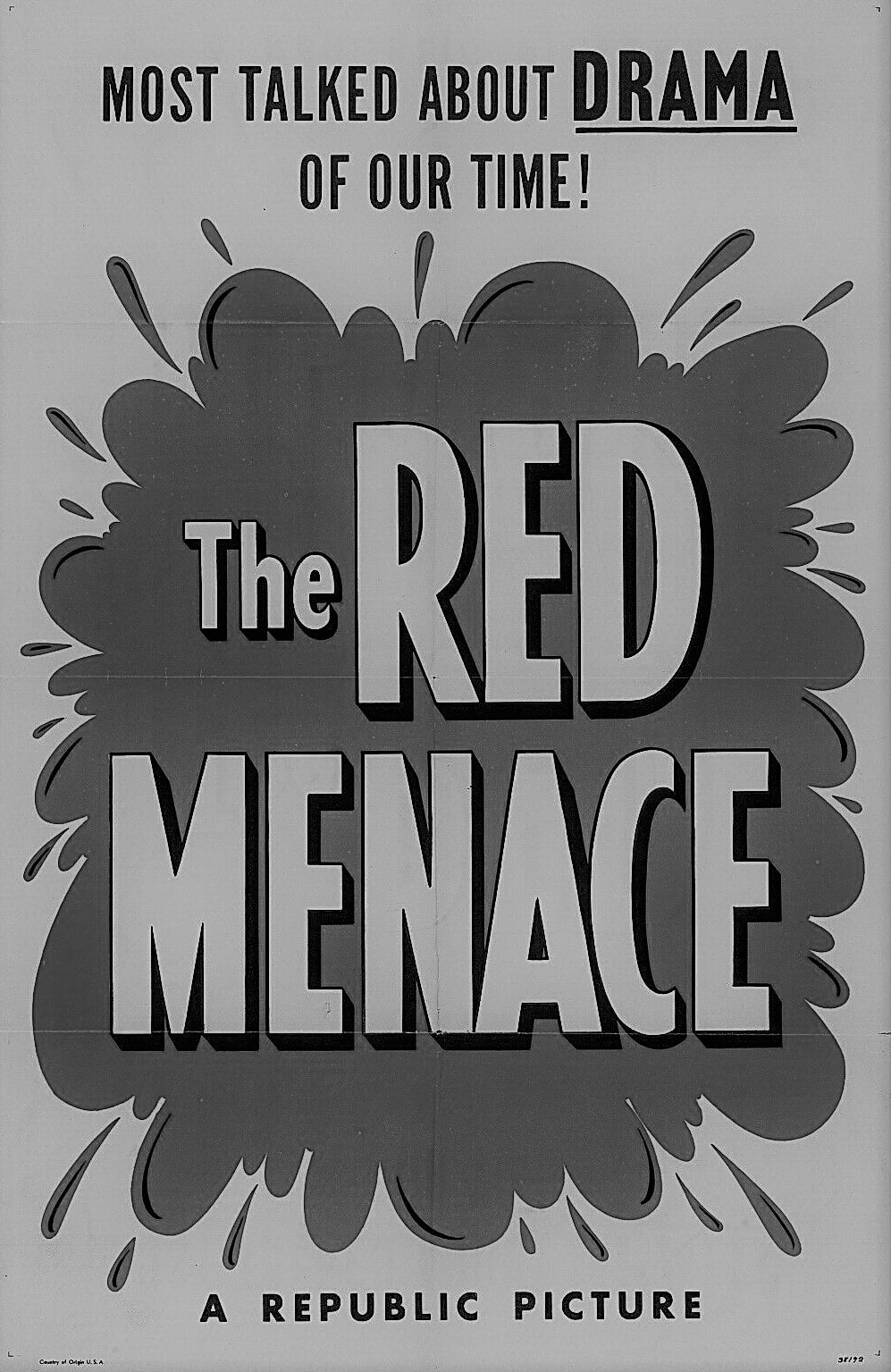 RED MENACE, THE (1949)
RED MENACE, THE (1949) (87 Min.) Genre: 1940 DRAMA, Transfer Quality: B
One of the most famous of the anti-communist tracts of the late 1940s, Republic's The Red Menace plays like a merciless lampoon of the genre when seen today. After a portentous introduction by one Lloyd G. Davies, described as a member of the Los Angeles City Council, the film concentrates on disgruntled ex-GI Bill Jones (Robert Rockwell). Having been victimized by crooked real estate agents, Jones turns to the government for help, only to come away empty-handed and mad as a wet hen. Obviously, the susceptible Jones is ripe for plucking by the American Communist Party. Using slogans, bribes and even sex to recruit disenfranchised souls like Jones, the dirty Reds hope to spread their poison to the entire U.S. of A. Fortunately, Jones and another commie dupe, schoolteacher Nina Petrovka (Hanne Axman), smarten up just in time. The HUAC and Joe McCarthy needn't have searched so diligently for subversives: according to The Red Menace, all they would have had to do was arrest anyone wearing a baggy suit or sporting a bad haircut. Some modern-day viewers begin laughing the moment the opening title of Red Menace, wherein an animated octopus wraps its tentacles around the Free World, fades into view.
Starring: Robert Rockwell, Hannelore Axman, Shepard Menken, Barbara Fuller | Directed by: R. G. Springsteen
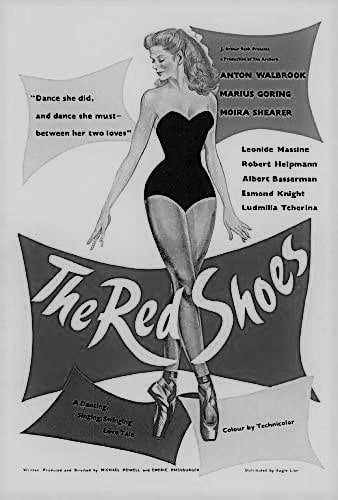 RED SHOES, THE (1948)
RED SHOES, THE (1948) (136 Min.) Genre: 1940 DRAMA, Transfer Quality: A
Michael Powell and Emeric Pressburger's influential musical tragedy set the stage for the climactic dance ballets that became a staple of the Arthur Freed-MGM musicals (An American in Paris, Singin' in the Rain and The Band Wagon) of the early 1950s. Hans Christian Andersen's tragic fairy tale forms the basis of this film about betrayal, love and art. The story begins as struggling composer Julian Craster (Marius Goring) attends a performance of the Lermontov Ballet Company and recognizes his own score in the production of "Hearts of Fire." Julian protests to ballet company director Boris Lermontov (Anton Walbrook) about the unauthorized use of his music. Impressed by Julian's talent, Boris hires him to compose the score for his next ballet — a dance version of "The Red Shoes." Boris also hires an attractive young dancer, Victoria Page (Moira Shearer), to perform in the ballet. When the lead ballerina announces that she plans to get married, Boris, in a pique over being abandoned, casts Victoria in the starring role. As Julian works on the score and Victoria struggles to perfect her dance technique, the two fall in love. When "The Red Shoes" ballet is premiered — seen in a stunning and glorious fifteen-minute sequence — it is a raging success and it makes Victoria a star. But when Boris learns that Julian and Victoria have fallen in love, Boris, who is secretly in love with Victoria, in a fit of rage forces Julian to leave the ballet company; Victoria leaves with him. Since Boris owns the rights to "The Red Shoes" ballet, he forbids Victoria to perform the dance and she becomes unemployable. Time passes and Julian and Victoria are now happily married. Julian's compositions have made him an international success. One day, with Victoria disembarking from a train in Paris, she meets Boris, who implores her to do one performance of "The Red Shoes" in Monaco. Victoria agrees as Julian cancels an engagement in London to travel to Monte Carlo in order to convince his wife not to perform the ballet. But Victoria goes on with the performance, with tragic results. — Paul Brenner
Starring: Anton Walbrook, Marius Goring, Moira Shearer, Albert Basserman | Directed by: Michael Powell, Emeric Pressburger
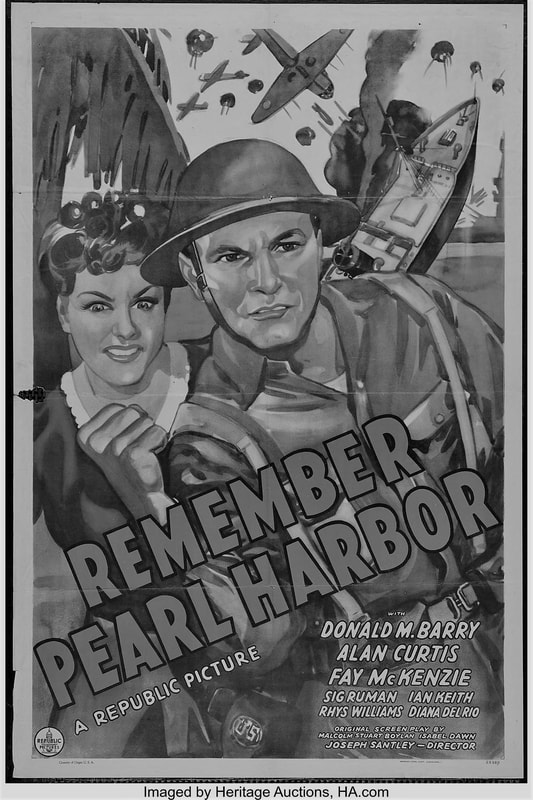 REMEMBER PEARL HARBOR (1942)
REMEMBER PEARL HARBOR (1942) (75 Min.) Genre: 1940 DRAMA, Transfer Quality: B
No sooner had the Japanese bombed Pearl Harbor on December 7, 1941 than Republic Pictures managed to register the title Remember Pearl Harbor for copyright, beating out all the "major" studios in the process. The title was far more dramatic than the film attached to it, which has something to do with pugnacious American GI Lucky Smith (a rare non-western appearance by Don \"Red\" Barry). Our hero spends the first few reels being tossed in the stockade, often accompanied by his buddies Bruce Gordon (Alan Curtis) and Portly Potter (Maynard Holmes). Shortly after the demolition of Pearl Harbor, Lucky and Bruce uncover a gang of Fifth Columnists, operating in the Philippines. Shaping up in a hurry, Lucky volunteers to lead a suicidal air mission against a Japanese troop ship, thereby redeeming himself for inadvertently causing the death of his pal Portly in an earlier scene. Under closer scrutiny, Remember Pearl Harbor turns out to be a remake of 1940's Girl from Havana, itself a remake of the 1939 Roy Rogers western Rough Riders' Roundup, which was a remake of another 1939 effort, Forged Passport, which was first filmed in 1936 as The Leathernecks Have Landed!
Starring: Don "Red" Barry, Alan Curtis, Fay McKenzie, Sig Rumann | Directed by: Joseph Santley
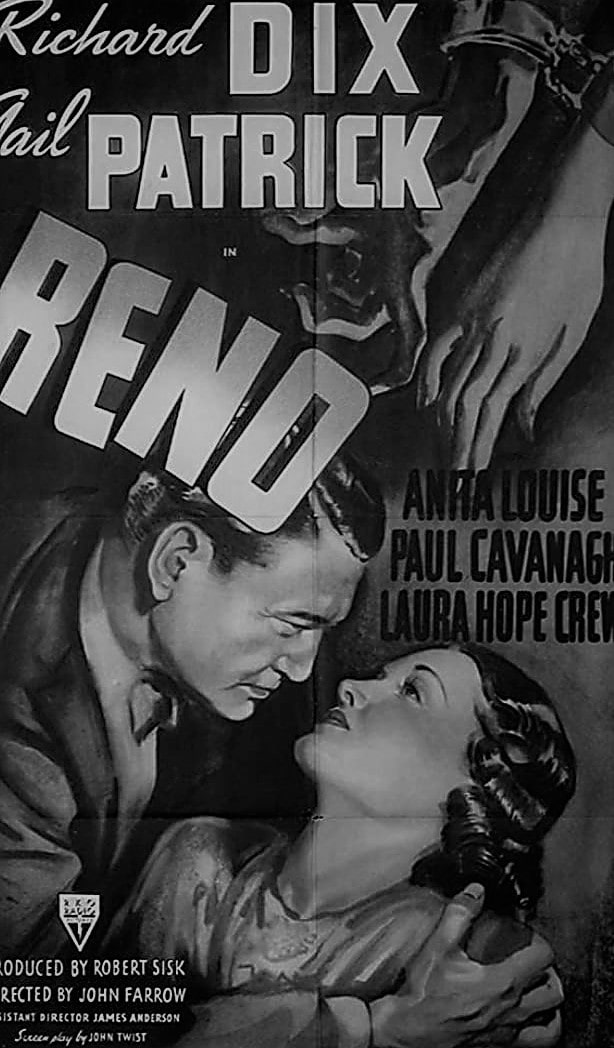 RENO (1940)
RENO (1940) (73 Min.) Genre: 1940 DRAMA, Transfer Quality: A
The rise of the popular Nevada city is chronicled in this epic drama that begins when Reno was a tiny silver-mining town and ends when it becomes a divorce center and garishly lit gambling town. The film also follows the exploits of a young attorney who comes to town to build a thriving divorce practice. He becomes so involved in his work, that he ignores his own loving wife who leaves him. As a result, the city fathers get on his case about his virtue. The lawyer is subsequently disbarred; he then opens a gambling casino. Years pass and his estranged daughter comes to Reno for a quickie divorce. Father and daughter do not recognize each other as he tries to talk her out of the divorce. When she realizes who he is, she leaves Reno. — Sandra Brennan
Starring: Richard Dix, Gail Patrick, Anita Louise, Paul Cavanagh, Carole Landis | Directed by: John Farrow
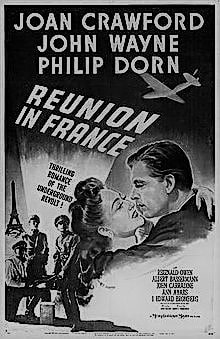 REUNION IN FRANCE (1942)
REUNION IN FRANCE (1942) (104 Min.) Genre: 1940 DRAMA, Transfer Quality: A
Better known as Reunion in France, this women's-magazine-style romantic melodrama was the first major production for director Jules Dassin — who was promptly demoted back to the MGM "B" department when the picture tanked at the box office. Joan Crawford stars as Frenchwoman Michele de la Becque, who comes to believe that her fiancé, wealthy munitions manufacturer Robert Cortot (Philip Dorn) is a Nazi collaborator. When her suspicions are apparently corroborated, Michelle falls in love with Pat Talbot (John Wayne), a downed American aviator stranded in occupied Paris. Only then does Michelle discover that she's been all wrong about Cortot — but what to do about Talbot, who has been marked for death by the Gestapo? Ava Gardner has a tiny role as a Parisian shopgirl.
Starring: Joan Crawford, John Wayne, Philip Dorn, Reginald Owen, John Carradine | Directed by: Jules Dassin
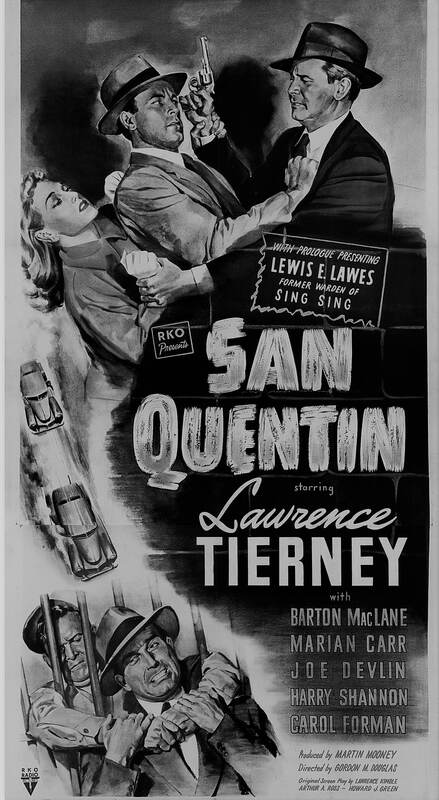 SAN QUENTIN (1946)
SAN QUENTIN (1946) (66 Min.) Genre: 1940 DRAMA, Transfer Quality: A
This prison reform-minded melodrama from B-movie director Gordon Douglas opens with an introduction from Lewis F. Lawes, the real-life prison warden turned author of 20,000 Years in Sing Sing (1932). Lawrence Tierney stars as Jim Roland, one of the founding members of the Inmate's Welfare League, a prisoners' rehabilitation group operating inside the California state prison San Quentin. The League keeps internal peace at the prison and helps career criminals go straight, training them for a law-abiding life on the outside. Upon his parole, Jim became one of the program's first success stories, but the same can't be said for Nick Taylor (Barton McLane). Once a model prisoner, Taylor has broken out of the facility and gone on a violent crime spree. When San Quentin officials, including Warden Kelly (Harry T. Shannon), consider shutting down the program, the membership feels responsible and appeals to Jim for help. The ex-con, now a responsible citizen, sets out to bring Taylor to justice and save the League, putting his own life at risk. Douglas employs a brisk pace in San Quentin (1946), which is also the feature film debut of actor Raymond Burr, who appears in the supporting role of Jeff Torrance.
Starring: Lawrence Tierney, Barton MacLane, Harry Shannon, Raymond Burr | Directed by: Gordon M. Douglas
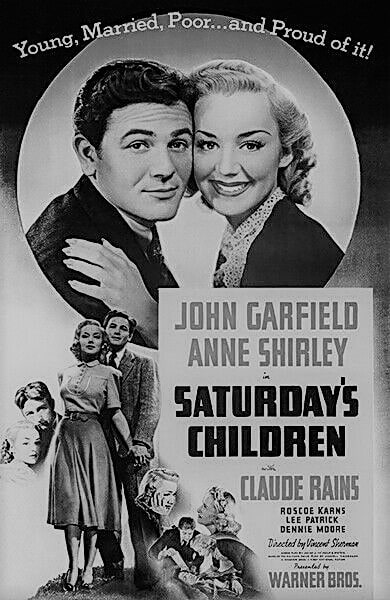 SATURDAY'S CHILDREN (1940)
SATURDAY'S CHILDREN (1940) (110 Min.) Genre: 1940 DRAMA, Transfer Quality: A
This third film version of Maxwell Anderson's play Saturday's Children stars Claude Rains as the impecunious but proud father of a large brood. Rains' daughter Anne Shirley marries idealistic John Garfield, a would-be inventor who works for Shirley's father. Feeling that he's been tricked into marriage, Garfield gives every indication of turning out to be as much "failure" as Rains. Only when Garfield and Shirley are on the verge of breaking up do they realize that material gain is not the only barometer of success in life. Previous filmizations of this story include Saturday's Children (29), starring Corinne Griffith, and Maybe It's Love (35), costarring Ross Alexander and Gloria Stuart. - Hal Erickson *** Originally a play starring Humphrey Bogart, Saturday's Children was filmed twice before this version. The Epstein Brothers have done a commendable job of adapting and improving upon the Maxwell Anderson original. While there's still a certain amount of "sudsiness" to the screenplay and dialogue, and while some of the structure is a bit too pat and schematic, the story is involving and the characters have an undeniable appeal and attraction. Vincent Sherman's direction is smooth, if a trifle slick in places, and keeps the story moving without seeming rushed and hurried. The film's biggest asset, however, is its cast. Claude Rains turns in a sterling performance, creating a sympathetic character out of the plodding and often bumbling father, and Anne Shirley (in a role turned down by Olivia de Havilland) is touching and endearing. John Garfield is especially fine, taking a character that could come across as annoying and whiny and making him likable without betraying his more unattractive qualities; his shyness in particular becomes endearing. Saturday sometimes plays rather shamelessly with the viewer's emotions, but it somehow does so in an inoffensive way. - Craig Butler
Starring: John Garfield, Claude Rains, Anne Shirlee, Roscoe Karns, George Tobias, John Ridgely | Directed by: Vincent Sherman
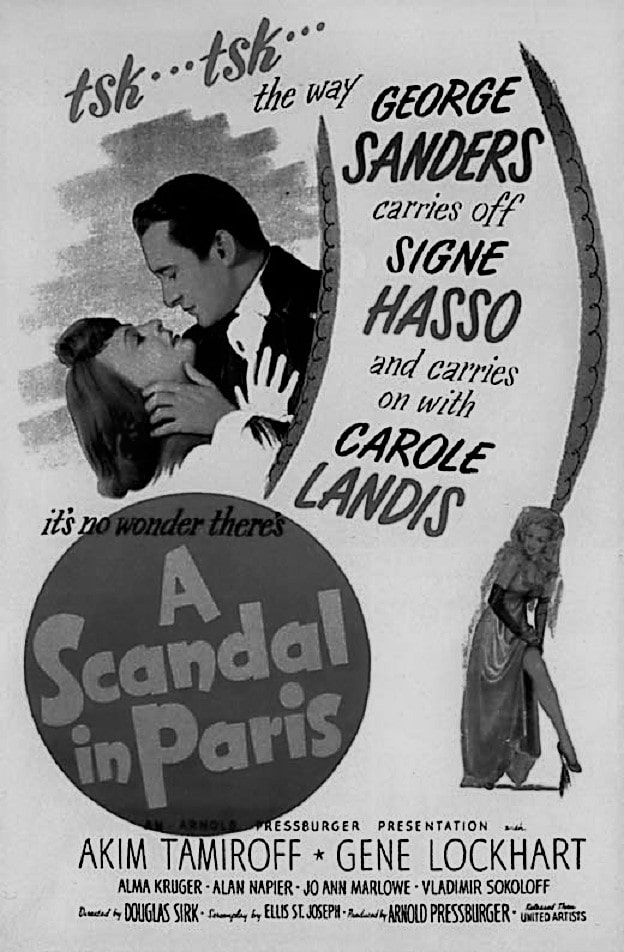 SCANDAL IN PARIS, A (1946)
SCANDAL IN PARIS, A (1946) (100 Min.) Genre: 1940 DRAMA, Transfer Quality: B
A Scandal in Paris is a liberal adaptation of the life story of Eugène François Vidocq, who was French prefect of police during the Napoleonic era. George Sanders stars as Vidocq, who spends most of the film as an aimless rogue willing to lie, cheat, and steal for his own comfort. The women who affect Vidocq's life include a saucy cabaret entertainer (Carole Landis) for whom Vidocq steals, and a good woman (Signe Hasso) for whom he straightens himself out. Fledgling director Douglas Sirk displayed his love of the Baroque (both in decor and characterizations) that would distinguish his later high-budget Universal soap operas. Most prints of A Scandal in Paris bear the film's alternate title, Thieves' Holiday.
Starring: George Sanders, Signe Hasso, Carole Landis, Akim Tamiroff, Gene Lockhart | Directed by: Douglas Sirk
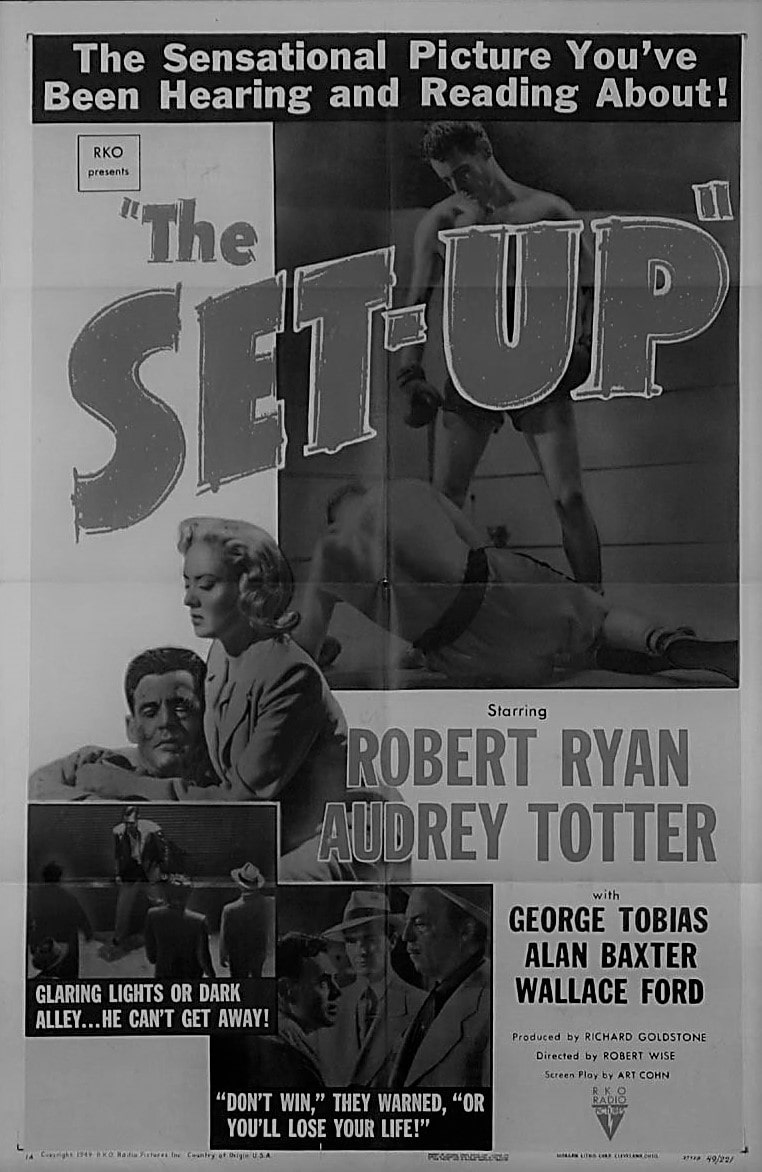 SET-UP, THE (1949)
SET-UP, THE (1949) (72 Min.) Genre: 1940 DRAMA, Transfer Quality: A
As shown by the clock face that opens and closes the film, The Set-Up takes place within a compact 72 minutes, with the action played out in "real time." Robert Ryan plays Bill "Stoker" Thompson, a washed-up boxer who refuses to give up his career despite the pleas of his wife Julie (Audrey Totter). There's little chance that he's going to win this evening's bout; still, Stoker's manager Tiny (George Tobias) has secretly made a deal with a crooked gambler (Alan Baxter). Stoker is to take a dive, a fact withheld from him until the fight is well under way. His last vestige of pride is aroused in the ring, but the story doesn't end there. The fight sequence is one of the most brutal ever filmed, with close ups of Ryan's pummeled face intercut with shots of screaming spectators in the throes of bloodlust. Adapted by Art Cohn from a narrative poem by Joseph Moncure March, The Set-Up is arguably Robert Ryan's finest starring film. — Hal Erickson
Starring: Robert Ryan, Audrey Totter, George Tobias, Alan Baxter, Wallace Ford, Helen Brown | Directed by: Robert Wise
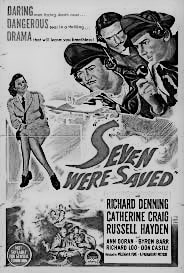 SEVEN WERE SAVED (1947)
SEVEN WERE SAVED (1947) (72 Min.) Genre: 1940 DRAMA, Transfer Quality: B
A plane crash over the Pacific leaves seven survivors stranded in a life raft in this war-time disaster movie. One of the passengers is a captured Japanese official en route to stand trial for war crimes. Two of the survivors spent time in a Japanese prison camp. Both pilots survived as did a pretty nurse. The rescue sequences are comprised of documentary footage of an actual rescue by the Air-Sea Rescue Service.
Starring: Richard Denning, Catherine Craig, Russell Hayden, Ann Doran | Directed by: William Pine
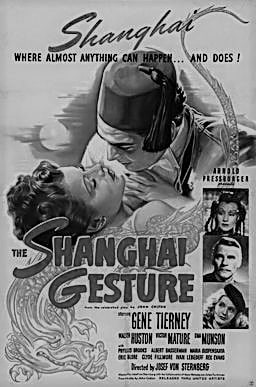 SHANGHAI GESTURE, THE (1941)
SHANGHAI GESTURE, THE (1941) (106 Min.) Genre: 1940 DRAMA, Transfer Quality: A
Josef von Sternberg made his first return to exotic Shanghai since 1932's Shanghai Express in this baroque conflagration, based on a 1925 play by John Colton that required 30 revisions before it was sufficiently sanitized to pass muster with Hays Office censors. The film takes place in the gambling den of Mother Gin Sling (Ona Munson), who finds her casino threatened with closing by stuffed shirt English financier Sir Guy Charteris (Walter Huston). Gin Sling knows that the key to keeping her casino open is to dig up some dirt on Sir Guy, and it's quick in coming. She finds that Sir Guy was compelled to leave China in a hurry some time in the past, stealing his wife's money and plotting to kill her. Sir Guy ended up abandoning his wife in China and leaving her with an infant daughter. She also finds out that Sir Guy's grown-up daughter, Poppy (Gene Tierney, is a frequent and deeply indebted guest of Gin Sling's casino. Gin Sling is now ready to blackmail Sir Guy into keeping her casino open. He tracks down his daughter and tries to convince her to leave town. But Poppy refuses to budge, having fallen in love with Doctor Omar (Victor Mature). — Paul Brenner
Starring: Gene Tierney, Walter Huston, Ona Munson, Eric Blore, Victure Mature | Directed by: Josef Von Sternberg
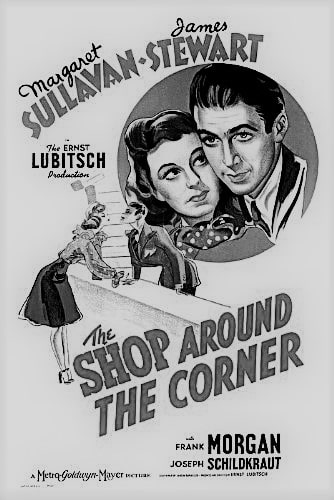 SHOP AROUND THE CORNER, THE (1940)
SHOP AROUND THE CORNER, THE (1940) (99 Min.) Genre: 1940 DRAMA, Transfer Quality: A
Shop Around the Corner is adapted from the Hungarian play by Nikolaus (Miklos) Laszlo. Budapest gift-shop clerk James Stewart and newly hired shopgirl Margaret Sullavan hate each other almost at first sight. Stewart would prefer the company of the woman with whom he is corresponding by mail but has never met. Sullavan likewise carries a torch for her male pen-pal, whom she also has never laid eyes on. It doesn't take a PhD degree to figure out that Stewart and Sullavan have been writing letters to each other. The film's many subplots are carried by Frank Morgan as the kindhearted shopkeeper and by Joseph Schildkraut as a backstabbing employee whose comeuppance is sure to result in spontaneous applause from the audience. Directed with comic delicacy by Ernst Lubitsch, this was later remade in 1949 as In the Good Old Summertime, and in 1998 as You've Got Mail. It was also musicalized as the 1963 Broadway production She Loves Me. — Hal Erickson
Starring: Margaret Sullavan, James Stewart, Frank Morgan, Joseph Schildkraut | Directed by: Ernst Lubitsch
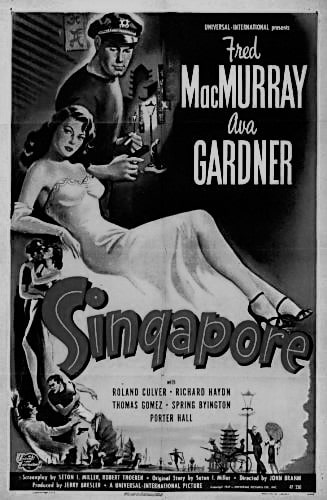 SINGAPORE (1947)
SINGAPORE (1947) (79 Min.) Genre: 1940 DRAMA, Transfer Quality: B
Returning to Singapore after a five-year absence, WWII veteran Matt Gordon (Fred MacMurray) mournfully recalls his romance with, and marriage to, a girl named Linda (Ava Gardner), whom he assumes was killed in a bombing raid on their wedding night. Resuming his prewar profession as a pearl smuggler, Matt gets mixed up with gangsters who are seeking a cache of pearls that he hid somewhere in Singapore during the war. He also meets wealthy Michael Van Leyden (Roland Culver), who is married to a woman who closely resembles the lamented Linda. In point of fact, she is Linda, but has been suffering from amnesia ever since the wartime bombing. Upon being reunited with his lost love, Matt does his best to ditch his unsavory companions and to rescue Linda from her "new" life. Clearly inspired by Casablanca, Singapore was remade as the 1957 Errol Flynn vehicle Istanbul.
Starring: Ava Gardner, Fred MacMurray, Richard Haydn, Thomas Gomez | Directed by: John Brahm
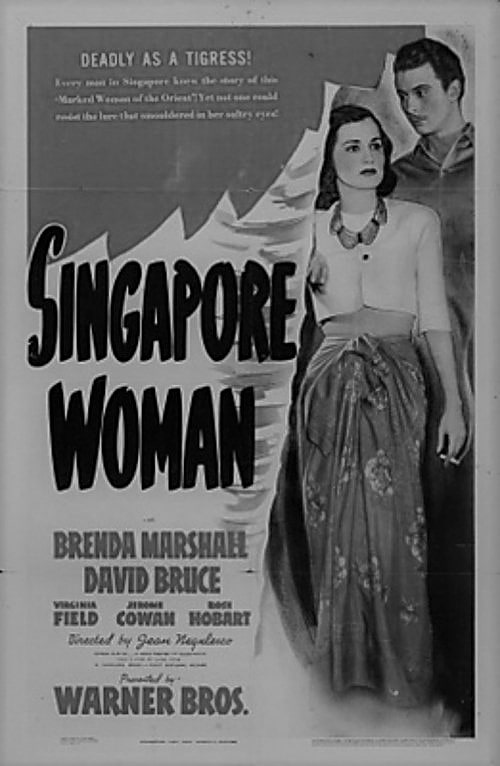 SINGAPORE WOMAN (1941)
SINGAPORE WOMAN (1941) (64 Min.) Genre: 1940 DRAMA, Transfer Quality: A
This remake of Dangerous is set in Singapore and chronicles the exploits of a woman who believes herself cursed. To recover, she is taken to the rubber plantation of a handsome young man. There she finds true happiness and love. Suddenly, her abusive ex-husband shows up. She had thought him dead, and his presence terrifies her. Fortunately an auto accident takes care of him and she can resume her happy life. — Sandra Brennan
Starring: Brenda Marshall, David Bruce, Virginia Field, Jerome Cowan, Alexis Smith | Directed by: Jean Negulesco
 SLIGHTLY DANGEROUS (1943)
SLIGHTLY DANGEROUS (1943) (94 Min.) Genre: 1940 DRAMA, Transfer Quality: A
This airy bit of MGM fluff stars Lana Turner as small-town soda clerk Peggy Evans. After telling off the self-important new drugstore manager Bob Stuart (Robert Young), Peggy, convinced that there's no future for her in her hometown, fakes her suicide and heads for the big city. After a series of dizzying comic complications, she successfully poses as the long-lost daughter of millionaire Cornelius Burden (Walter Brennan). Meanwhile, poor Bob, held responsible for Peggy's "death," comes to town determined to clear his name by exposing Peggy as an impostor. How this all works itself out is as hard to swallow as the rest of the picture, but the stars are attractive and the production values first-rate. — Hal Erickson
Starring: Lana Turner, Robert Young, Walter Brennan, Dame May Whitty | Directed by: Wesley Ruggles
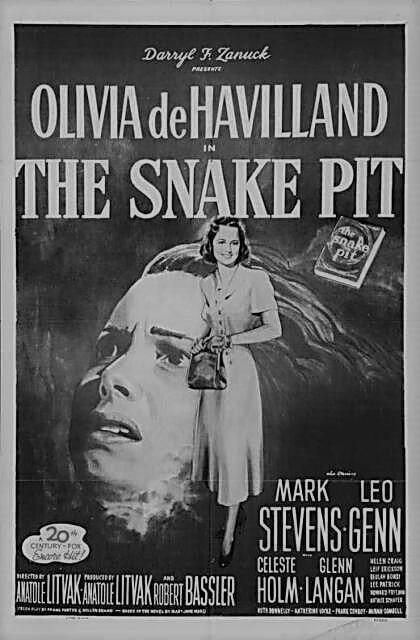 SNAKE PIT, THE (1948)
SNAKE PIT, THE (1948) (108 Min.) Genre: 1940 DRAMA, Transfer Quality: A
A woman loses her mind and is confined to a mental institution. That's the usual TV-listing encapsulation of The Snake Pit — and like most such encapsulations, it only scratches the film's surface. Olivia de Havilland stars as an outwardly normal young woman, married to loyal, kindly Mark Stevens. As de Havilland's behavior becomes more and more erratic, however, Stevens comes to the sad conclusion that she needs professional help. She is sent to an overcrowded state hospital for treatment — a curious set-up, in that, while de Havilland is treated with compassion by soft-spoken psychiatrist Leo Genn, she is sorely abused by resentful matrons and profoundly disturbed patients. Throughout the film, she is threatened with being clapped into "the snake pit" — an open room where the most severe cases are permitted to roam about and jabber incoherently — if she doesn't realign her thinking. In retrospect, it seems that de Havilland's biggest "crime" is that she wants to do her own thinking, and that she isn't satisfied with merely being a loving wife. While this subtext may not have been intentional, it's worth noting that de Havilland escapes permanent confinement only when she agrees to march to everyone else's beat. Amazingly, Olivia de Havilland didn't win an Academy Award for her harrowing performance in The Snake Pit (the only Oscar won by the film was for sound recording). While some of the psychological verbiage in this adaptation of Mary Jane Ward's autobiographical novel seems antiquated and overly simplistic today, The Snake Pit was rightly hosannahed as a breakthrough film in 1948. — Hal Erickson
Starring: Olivia de Havilland, Mark Stevens, Leo Genn, Celeste Holm, Leif Erickson, Beulah Bondi, Ann Doran | Directed by: Anatole Litvak
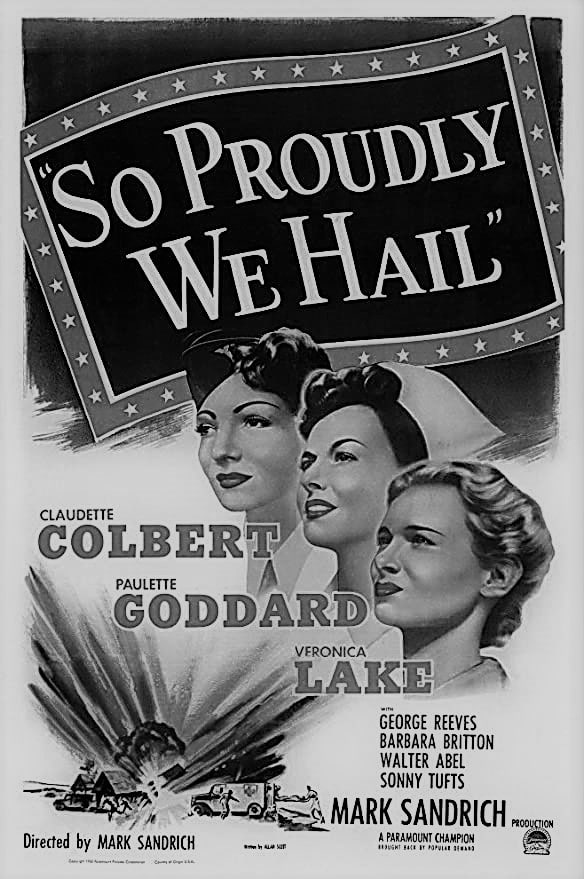 SO PROUDLY WE HAIL (1943)
SO PROUDLY WE HAIL (1943) (126 Min.) Genre: 1940 DRAMA, Transfer Quality: A
Paramount's So Proudly We Hail, like MGM's Cry Havoc, is a tribute to the Red Cross nurses trapped behind enemy lines in the early days of the Pacific war. Claudette Colbert is the self-sacrificing head nurse, struggling to minister to the wounded and to keep her staff (including Paulette Goddard, Veronica Lake and Barbara Britton, all of them giving better than usual performances) from buckling under the pressure. Taking into consideration the regular fans of the film's female cast, the producers thoughtfully include several scenes in which the ladies pursue their romantic lives. The story culminates with the fall of Bataan, ending on a resigned but optimistic note; this finale was designed to lift the spirits of the audience, which in 1943 wasn't so certain as Hollywood of final victory. So Proudly We Hail was not only effective propaganda (though not as effective as Cry Havoc), but it also enabled Paramount to introduce its new crop of male hunks—including the estimable Sonny Tufts. — Hal Erickson
Starring: Claudette Colbert, Paulette Goddard, Veronica Lake, George Reeves | Directed by: Mark Sandrich
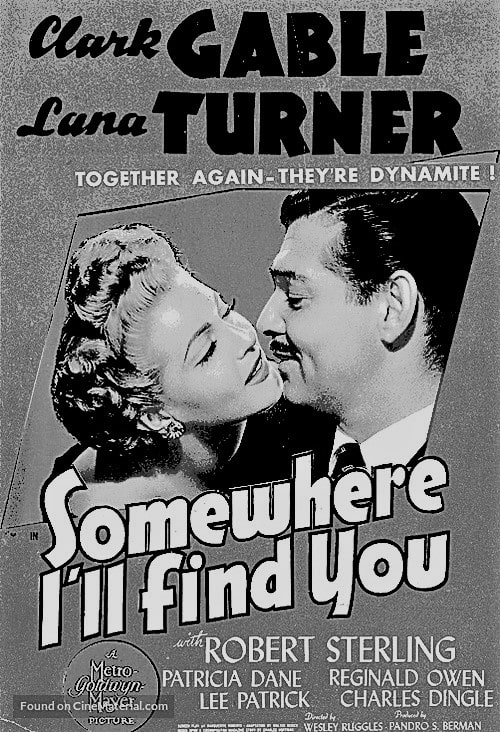 SOMEWHERE I'LL FIND YOU (1942)
SOMEWHERE I'LL FIND YOU (1942) (108 Min.) Genre: 1940 DRAMA, Transfer Quality: A
Unable to convince their isolationist New York editor (Charles Dingle) that America must be alerted to the threat of encroaching Nazism, pugnacious war correspondents Johnny and Kirk Davis (Clark Gable and Robert Sterling) are relieved of their European assignments. Back in the USA, Johnny inagurates a rogueish flirtation with Paula Lane (Lana Turner), an aspiring reporter who has harbored a long-standing crush on Johnny. Even so, Paula enters into a romantic relationship with Kirk, prompting Johnny to break up the affair-for Kirk's own good, of course. Paula's hopes for a lasting romance with Johnny are crushed when he refuses to discourage her from accepting an assignment in IndoChina. Later on, both Johnny and Kirk are sent off to cover the war in the Far East, where they are reunited with Paula, now busily shepherding Chinese war orphans to safety. The action moves to Bataan, where Kirk is killed in service of his country, leaving Johnny to write a passionate tribute to his brother-and, by extention, everyone else who has lain down his or her life for the cause of Democracy. During production of Somewhere I'll Find You, Clark Gable's actress-wife Carole Lombard was killed in a plane crash while participating in a war-loan drive; the impact of the tragedy is painfully obvious in Gable's performance, which becomes abruptly less playful and more somber in the final reels. New MGM recruits Van Johnson and Keenan Wynn make impressive appearances in uncredited roles. — Hal Erickson
Starring: Clark Gable, Lana Turner, Robert Sterling, Patricia Dane | Directed by: Wesley Ruggles
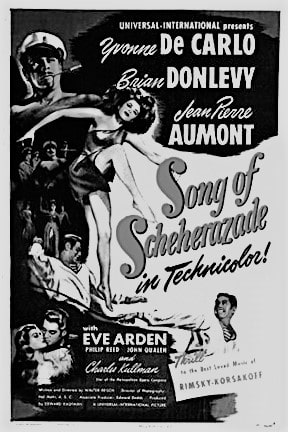 SONG OF SCHEHERAZADE (1947)
SONG OF SCHEHERAZADE (1947) (105 Min.) Genre: 1940 DRAMA, Transfer Quality: B
Bearing little resemblance to reality, this musical biography of 19th century Russian composer Nikolai Rimsky-Korsakov takes liberal poetic license with the truth. Jeanne-Pierre Aumont stars as Nicky, a Naval Academy cadet assigned to a vessel undergoing a world cruise. On shore leave in Morocco, Nicky goes in search of a piano intending to pursue his true passion, music. Accompanied by the ship's singing doctor, Klin (Charles Kullmann), Nicky makes the acquaintance of a cabaret dancer named Cara de Talavera (Yvonne De Carlo). The daughter of a Spanish colonial family that was once prominent but has fallen upon difficult times, Cara now dances in secret as Scheherazade in a revue at the nightclub. Inspired by her, Nicky sets about composing his most famous song for inclusion in a ballet. Although fate conspires to keep Cara and Nicky apart for a time, his piece is a success and is scheduled for a performance at the St. Petersburg Opera House, where none other than Cara turns up as the lead dancer.
Starring: Patricia Alphin, Yvonne De Carlo, Brian Donlevy, Eve Arden | Directed by: Walter Reisch
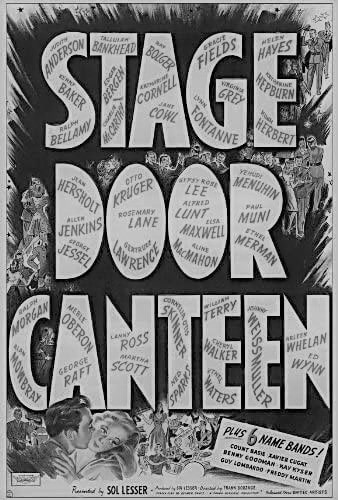 STAGE DOOR CANTEEN (1943)
STAGE DOOR CANTEEN (1943) (132 Min.) Genre: 1940 DRAMA, Transfer Quality: A
This literally star-studded musical drama was largely financed by Theatre Guild, with all proceeds going to various wartime fundraising concerns. Most of the story takes place at the Stage Door Canteen, a Manhattan-based home away from home for soldiers, sailors and marines (the real-life Canteen on 44th street was too busy to lend itself to filming, thus the interiors were recreated in Hollywood). Within the walls of this non-profit establishment, servicemen are entertained by top musical, comedy and dramatic acts, and waited on by such Broadway luminaries as Lunt and Fontanne, Katharine Hepburn, Jane Cowl, Katherine Cornell, Tallulah Bankhead, Helen Hayes, Cornelia Otis Skinner, Sam Jaffe and Paul Muni. Though the plotline-one of the Canteen servers, a girl named Eileen (Cheryl Walker) falls in love with one of the visiting soldiers (William Terry), despite the establishment's strict "no dating" rules-is merely an excuse to link together a series of specialty acts, it is superbly and touchingly directed by Frank Borzage. Not all of the film has weathered the years too well: particularly hard to take is Gracie Fields' cheery ditty about "killing Japs!" For the most part, however, the film works, and the guest performers-including bandleaders Kay Kyser, Guy Lombardo and Xavier Cugat, comedians Ray Bolger, Harpo Marx, George Jessel and Ed Wynn, and singers Ethel Waters and Kenny Baker-are in fine fettle. If nothing else, Stage Door Canteen offers the only appearance on film of the great Katherine Cornell, who offers a vignette of the balcony scene from Romeo and Juliet. Incidentally, the actor playing "Texas", Michael Harrison, later gained fame as cowboy star Sunset Carson. Originally released at 132 minutes, Stage Door Canteen is now generally available in the 93-minute TV version. — Hal Erickson
Starring: Cheryl Walker, William Terry, Marjorie Riordan, Lon McCallister | Directed by: Frank Borzage
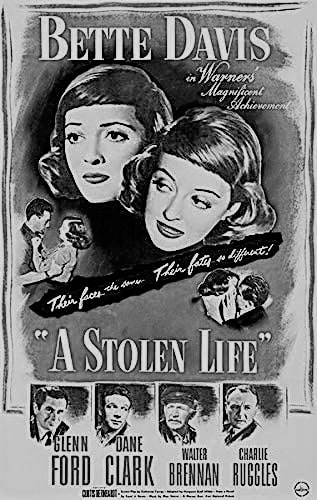 STOLEN LIFE, A (1946)
STOLEN LIFE, A (1946) (107 Min.) Genre: 1940 DRAMA, Transfer Quality: A
In this romantic melodrama, Bette Davis plays twin sisters for the first time (she would do so again in 1964's Dead Ringer). Kate Bosworth (Davis) is a sincere, demure girl and talented artist. Her twin sister Pat (also Davis) is a flamboyant, man-hungry manipulator. Orphans, the girls' guardian is their cousin, Freddie Lindley (Charles Ruggles), with whom Kate elects to spend a summer on Martha's Vineyard. There, she meets Bill Emerson (Glenn Ford), a handsome engineer spending a summer vacation as a lighthouse inspector. Kate falls deeply in love with Bill, but when Pat shows up, he goes for the more exciting sister, eventually marrying her. Devastated, Kate throws herself into her art, but she becomes discouraged under the tutelage of an abusive master, Karnock (Dane Clark). A sailing accident gives Kate the chance to take her sister's place — but can she fool Bill into believing that this sweet, innocent woman is his philandering, scheming wife? A Stolen Life (1946), a remake of an earlier picture by the same name that had been produced by Paramount only seven years earlier starring Elisabeth Bergner in the twins role, was nominated for a Best Special Effects Oscar. — Karl Williams
Starring: Bette Davis, Glenn Ford, Dane Clark, Walter Brennan, Charlie Ruggles | Directed by: Curtis Bernhardt
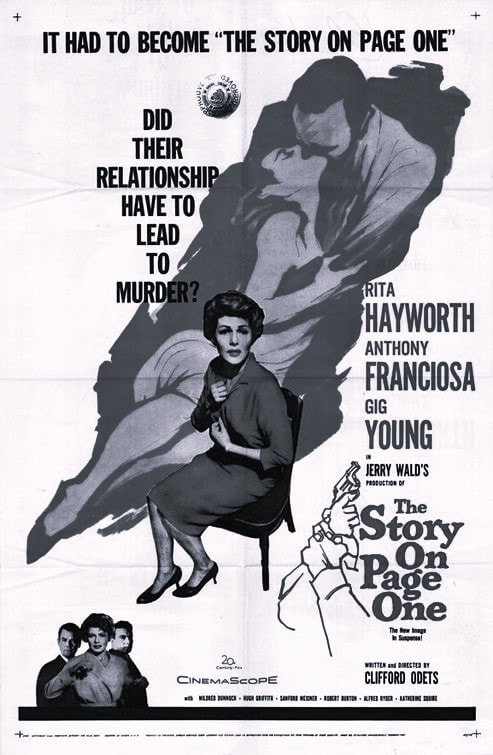 STORY ON PAGE ONE, THE (1959)
STORY ON PAGE ONE, THE (1959) (123 Min.) Genre: 1950 DRAMA, Transfer Quality: B
A suspenseful courtroom drama, The Story on Page One was the second and last film directed by the distinguished American playwright Clifford Odets (who also wrote the screenplay). Jo (Rita Hayworth) and Larry (Gig Young) are lovers accused of murdering Jo's husband. Their trial lawyer, Victor Santini (Anthony Franciosa) has his work cut out for him on two different fronts. For one, he has to overcome his own tendency to hit the bottle, and for another, he has to somehow win this case. As revealed in the beginning, Jo's husband died accidentally. Yet the unpredictability of the courtroom proceedings indicate that a verdict of "not guilty" is going to be anything but automatic.
Starring: Rita Hayworth, Anthony Franciosa, Gig Young, Mildred Dunnock, Biff Elliot, Hugh Griffith | Directed by: Clifford Odets
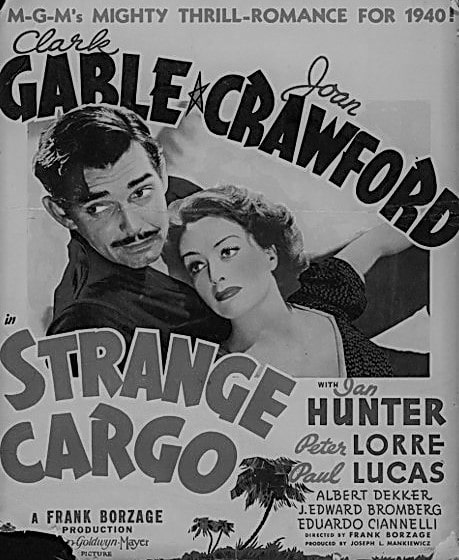 STRANGE CARGO (1940)
STRANGE CARGO (1940) (105 Min.) Genre: 1940 DRAMA, Transfer Quality: A
Strange is right: this mystical MGM melodrama has to be the oddest of the studio's Clark Gable-Joan Crawford vehicles. When eight prisoners escape from a New Guinea penal colony, they are picked up by a sloop commandeered by another escapee named Verne (Gable) and his trollop girl friend Julie (Joan Crawford). Among the fugitives is Cambreau (Ian Keith), a soft-spoken, messianic character who has a profound effect on his comrades. One by one, the escapees abandon their evil purposes and find God-and a peaceful death—through the auspices of the Christlike Cambreau. The last to succumb to Cambreau's ministrations is Verne, who agrees to return to return to the prison colony serve out his sentence if Julie will wait for him (which she does). A superb Franz Waxman scores provides a touch of show-biz grandeur to this haunting fable. — Hal Erickson
Starring: Clark Gable, Joan Crawford, Ian Hunter, Peter Lorre, Paul Lukas, Albert Dekker, Eduardo Ciannelli | Directed by: Frank Borzage
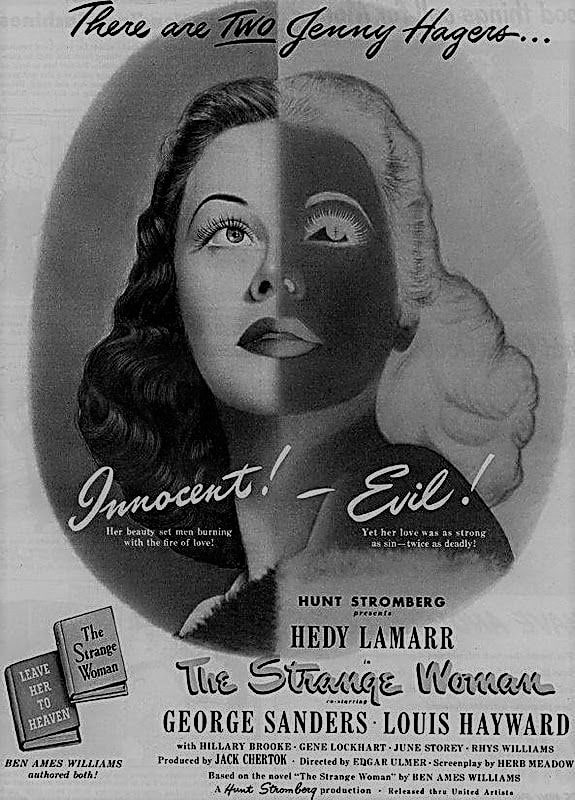 STRANGE WOMAN, THE (1946)
STRANGE WOMAN, THE (1946) (99 Min.) Genre: 1940 DRAMA, Transfer Quality: A
B-movie auteur Edgar G. Ulmer managed to direct a few A-pictures during his long career; he was personally selected by Hedy Lamarr to helm this big-budget thriller, a project she put together to change her image as a starlet whose sex appeal outweighed her acting abilities. Set in the early 19th century, The Strange Woman takes place in Bangor, Maine, where logging and lumber mills have made the town prosperous. Jenny Hager (Lamarr) has grown up in Bangor, not far from the watchful eye of wealthy Isaiah Poster (Gene Lockhart). The fact that Jenny is twenty years Isaiah's junior does not stem his amorous intentions, and when she's finally out of her teens, Jenny accepts his proposal of marriage. But beneath her sweet exterior, Jenny is a shrewd, conniving women, and while she makes a fine life for herself with Isaiah's money, she obviously doesn't care for him. When Isaiah's son Ephraim (Louis Hayward) visits from college, Jenny is immediately attracted to him, and she tells him that she'll marry him if he murders his father. But, unknown to Ephraim, Jenny is already scheming to win the affections of businessman John Evered (George Sanders), even though he's pledged to marry her best friend Meg (Hillary Brooke). Based on a novel by Ben Ames Williams, The Strange Woman was generally considered one of Hedy Lamarr's best performances, although her best-known performance would continue to be in Ecstasy (1933), largely because of her then-daring nude scenes. — Mark Deming
Starring: Hedy Lamarr, George Sanders, Louis Hayward, Gene Lockhart | Directed by: Edgar G. Ulmer
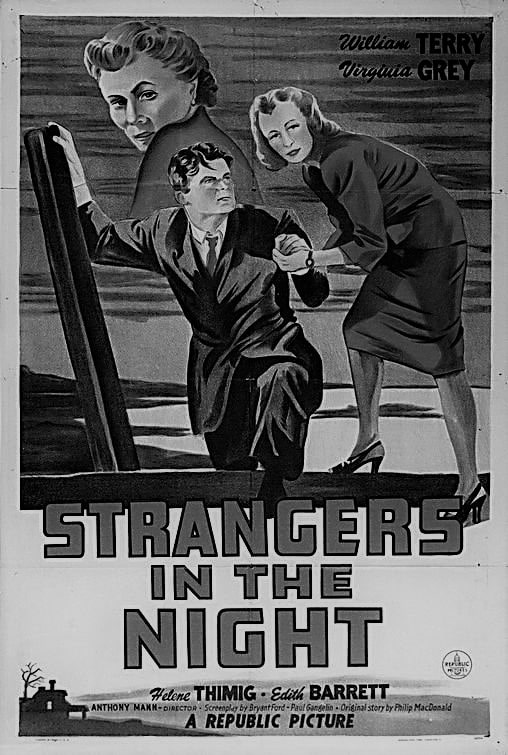 STRANGERS IN THE NIGHT (1944)
STRANGERS IN THE NIGHT (1944) (56 Min.) Genre: 1940 DRAMA, Transfer Quality: B
A bizarre love affair forms the basis of this drama. It all begins with a few love letters between a Marine sergeant stationed overseas and a young woman back in the States. As soon as his tour is finished, the sergeant begins looking for the woman back home. He finds the girl's mother and she informs him that her daughter has gone away. The man is heartbroken until a friend of the mother tells him that the mother never had a daughter; the whole affair was manufactured by the lonely woman. When the mother learns of her friend's betrayal, she kills her. She then tries to kill the Marine, but during the scuffle, a gigantic painting of her "daughter" slips off the wall and crushes her.
Starring: George E. Stone, Edith Barrett, Virginia Grey, Anne O'Neal, William Terry | Directed by: Anthony Mann
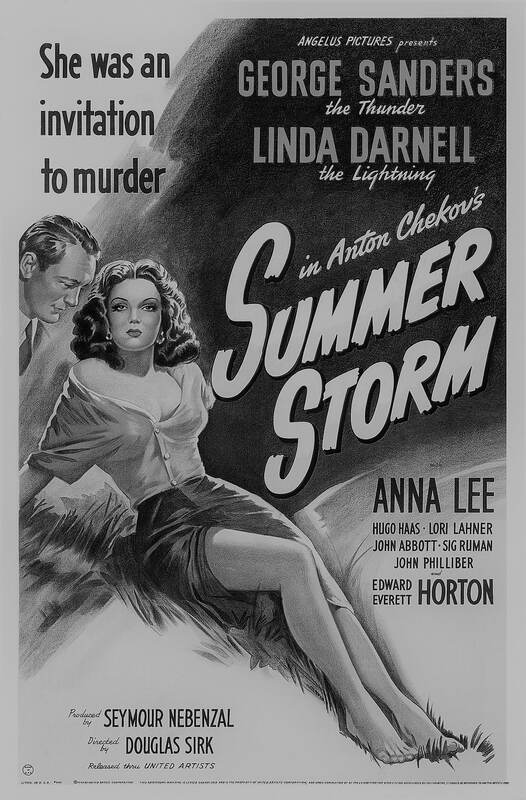 SUMMER STORM (1944)
SUMMER STORM (1944) (105 Min.) Genre: 1940 DRAMA, Transfer Quality: B
Summer Storm is a remarkably effective Hollywood filmization of Anton Chekhov's The Shooting Party. Linda Darnell stars as the young and beautiful wife of a middle-aged Russian civil servant (Hugo Haas). Darnell becomes the object of the affections of her husband's employer, a lecherous count (Edward Everett Horton). The girl in turn is enamored of a provincial judge (George Sanders). At first, all flirtations are playful and harmless, but the judge takes Darnell so seriously that he ends up killing her in a jealous rage. Her husband is blamed for the crime, but the Count gets his comeuppance during the 1917 Bolshevik revolution (which didn't figure into the original Chekhov story, inasmuch as the author died in 1904). The big surprise in this is not that it works as well as it does, but that it features comic actor Edward Everett Horton in a straight, almost unsympathetic role, which he underplays beautifully. — Hal Erickson
Starring: George Sanders, Linda Darnell, Anna Lee, Edward Everett Horton | Directed by: Douglas Sirk
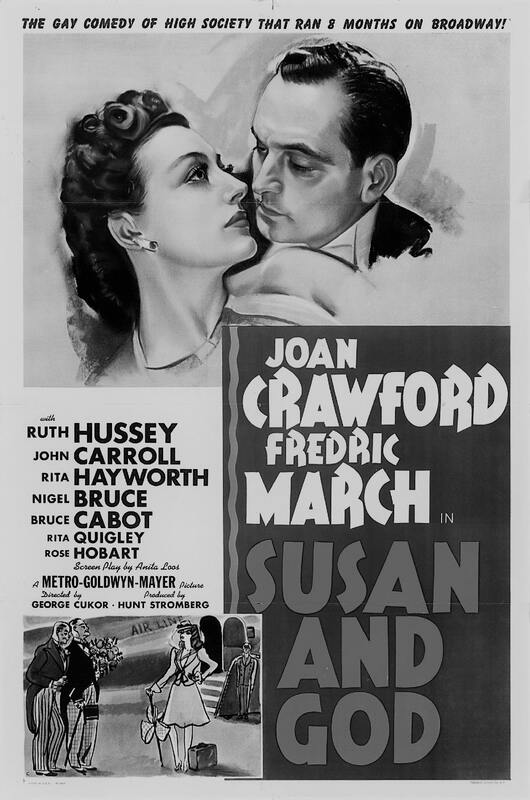 SUSAN AND GOD (1940)
SUSAN AND GOD (1940) (115 Min.) Genre: 1940 DRAMA, Transfer Quality: A
Rachel Crothers' thoughtful stage play Susan and God was tastefully adapted for the screen by Anita Loos. Joan Crawford stars as Susan, whose unquestioning devotion to various religious organizations causes a great deal of strain between herself and her family. When Susan embraces a "New Thought" theological movement, she decides to apply the tenets of this new philosophy to patch up the unhappy marriages within her own social circles. She succeeds only in making things worse, and in further harming her own relationship with husband Barrie (Fredric March) and daughter Blossom (Rita Quigley). But it is the unadorned, unpretentious religious faith of little Blossom that ultimately brings Susan and Barrie together again. When Susan and God was first released in 1940, Joan Crawford's performance was occasionally compared unfavorably to that of Gertrude Lawrence, who created the role of Susan on Broadway; it was suggested by some that Crawford patterned her portrayal exactly on Lawrence's, right down to the line delivery. Modern audiences, denied the opportunity to see Lawrence's interpretation, are less inclined to downgrade Crawford's work, which rates among her best. — Hal Erickson
Starring: Joan Crawford, Fredric March, Ruth Hussey, John Carroll, Rita Hayworth | Directed by: George Cukor
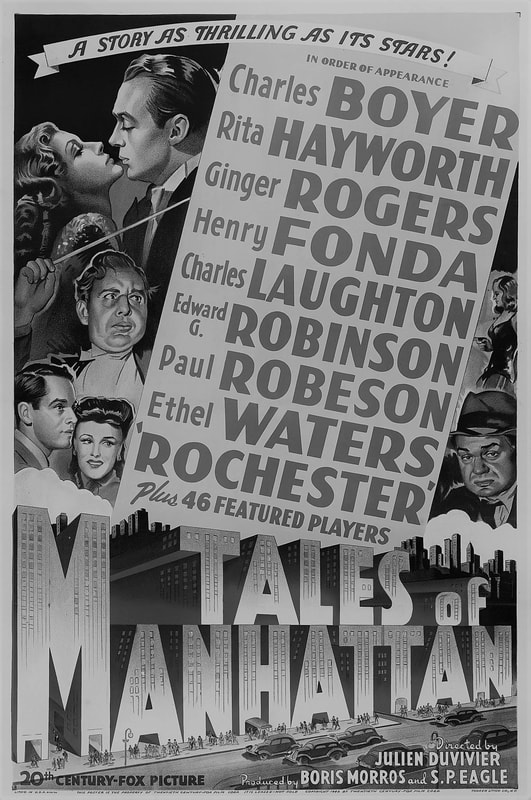 TALES OF MANHATTAN (1942)
TALES OF MANHATTAN (1942) (118 Min.) Genre: 1940 DRAMA, Transfer Quality: A
Tales of Manhattan is a sumptuous multipart film centered around a formal tailcoat. The coat is specially designed for stage actor Charles Boyer, who wears it during a rendezvous with his lady friend (Rita Hayworth). The lady's husband (Thomas Mitchell) shoots Boyer, thus the tailcoat is damaged merchandise and sold at a discount to a bridegroom (Cesar Romero). When the groom's peccadillos catch up to him, the bride (Ginger Rogers) chooses to marry the best man (Henry Fonda) instead, and the coat is shipped off to a second hand store. It is purchased by a would-be composer (Charles Laughton), who wears it the night that he is to conduct his first symphony; alas, the coat is too tight and tears apart, nearly ruining the conductor's debut. Stitched back together, the coat is donated to a skid row mission, wherein the kindly proprietor gives the coat to a down and out drunkard (Edward G. Robinson) so that the shabby gentleman can attend his 25th college reunion. Later on, the coat is stolen by a crook (J. Carroll Naish) in order to gain entrance to a fancy charity ball. The crook holds up the ball and stuffs the loot in the pockets of the coat, but while escaping in an airplane he loses the outer garment. The coat floats down to an impoverished African American shanty community; a farmer (Paul Robeson) decides to distribute the "money from heaven" amongst his needy neighbors. At the end, the tattered coat adorns the shoulders of a scarecrow. Tales of Manhattan is one of the best "portmanteau" dramas turned out by Hollywood; it was directed by French expatriate Julien Duvivier, a past master of the multi-story technique.
Starring: Charles Boyer, Rita Hayworth, Ginger Rogers, Henry Fonda, Charles Laughton, Edward G. Robinson, J. Carrol Naish | Directed by: Julien Duvivier
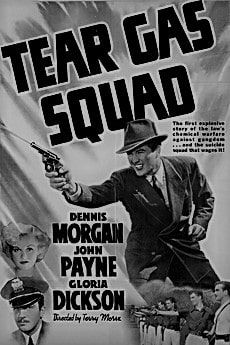 TEAR GAS SQUAD (1940)
TEAR GAS SQUAD (1940) (55 Min.) Genre: 1940 DRAMA, Transfer Quality: B
Warner Bros. Tear Gas Squad manages to pack thrills, comedy, romance and songs into a neat 55-minute package. Dennis Morgan plays cocky nightclub entertainer Tommy McCabe, who gets his jollies out of making fun of the local police force. This does not prove amusing to pretty Jerry Sullivan (Gloria Dickson), the daughter of a police lieutenant (Harry Shannon), nor to Jerry's flatfoot boyfriend Bill Morrissey (John Payne). Falling in love with Jerry himself, Tommy tries to prove his worth by joining the Boys in Blue, where he is subject to the rigorous training program applied by Morrissey. Thrown off the force because of his insouciance, Tommy gets back into everyone's good graces by saving Morrisey's life. Fans of TV's Superman series will get a special kick out of seeing George (Clark Kent) Reeves and John (Perry White) Hamilton in key supporting roles.
Starring: Dennis Morgan, John Payne, Gloria Dickson, George Reeves | Directed by: Terrell O. Morse
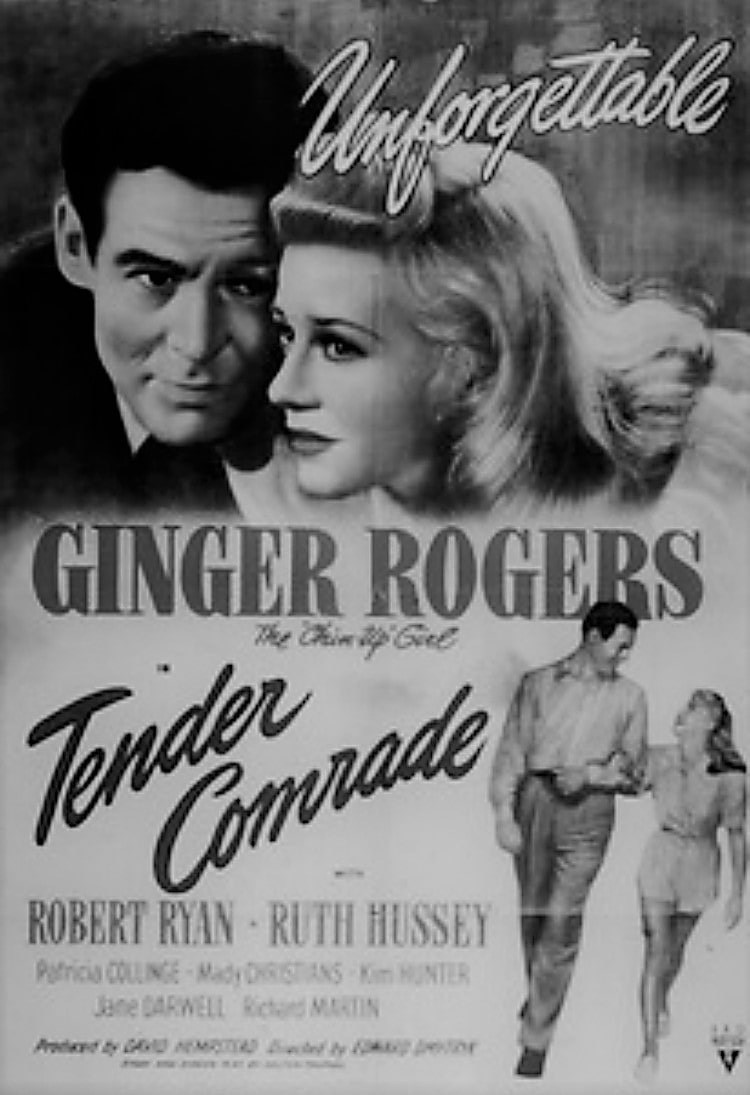 TENDER COMRADE (1943)
TENDER COMRADE (1943) (101 Min.) Genre: 1940 DRAMA, Transfer Quality: A
A bit treacly at times, Tender Comrade is nonetheless a fascinating distillation of the American mindset during WW2. Ginger Rogers is at her noblest and most self-sacrificial as Jo, whose husband Chris (Robert Ryan) is off fighting the war. Though pregnant, Jo finds a job at Douglas Aircraft, saving her money by living in a group home with several of her female co-workers. Delivering lines like "Share and share alike, that's democracy", Jo and her friends pool their salaries and divvy up responsibilities, as wait for news from the Front about their husbands and sweethearts. When news arrives that Chris has been killed, Jo delivers an impassioned cheer-up speech to her infant son, which will either leave the viewer in tears or in giggles, depending upon one's frame of mind. The "collectivism" implicit in Tender Comrade (not to mention its politically chancy title!) would later cause a lot of trouble for screenwriter Dalton Trumbo and director Edward Dmytrk during the HUAC "Communist witchhunt" era. In 1943, however, audiences didn't worry about such things, and the film posted a huge profit for RKO Radio. — Hal Erickson
Starring: Ginger Rogers, Robert Ryan, Ruth Hussey, Patricia Collinge | Directed by: Edward Dmytryk
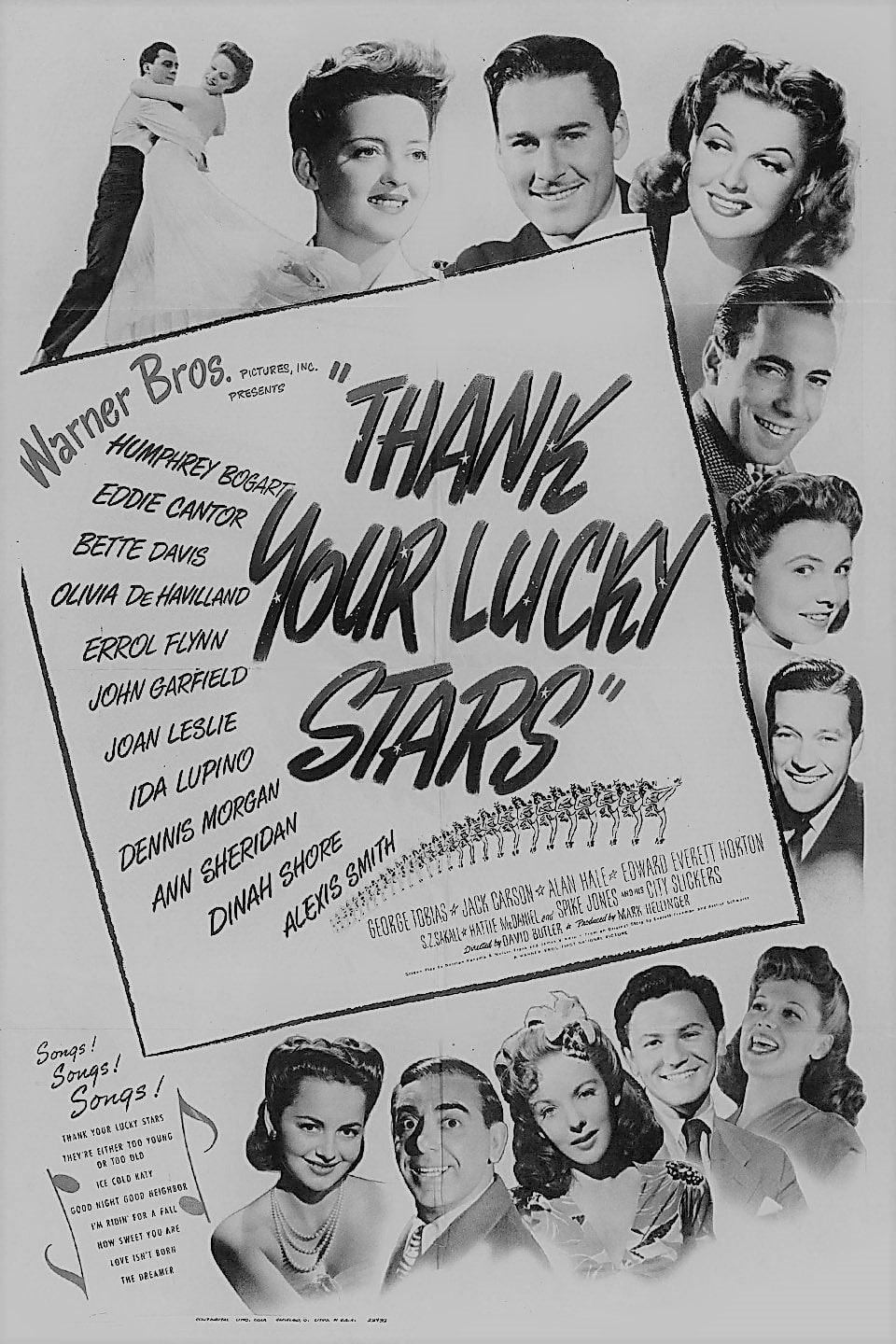 THANK YOUR LUCKY STARS (1943)
THANK YOUR LUCKY STARS (1943) (127 Min.) Genre: 1940 DRAMA, Transfer Quality: A
Practically everybody on the Warner Bros. lot shows up in the wartime morale-boosting musical extravaganza Thank Your Lucky Stars. Believe it or not, this one has a wisp of a plot. A pair of enterprising producers, played by S.Z. Sakall and Edward Everett Horton, want to hire singer Dinah Shore for their upcoming Cavalcade of Stars. Unfortunately, this means they must deal with Shore's boss, radio comedian Eddie Cantor. The egotistical Cantor insists upon joining the show himself, driving everyone crazy with his take-charge attitude. Meanwhile, singer Dennis Morgan, hoodwinked by a crooked agent into thinking he's signed a contract with Cantor, shows up backstage at Sakall and Horton's rehearsal, only to be given the boot. While all this is going on, aspiring actress Joan Leslie has befriended a bus driver named Joe Simpson—who happens to be a dead ringer for Eddie Cantor (and why not? Ol' "Banjo Eyes" plays both parts). Turns out that Joe is another showbiz wannabe, but he has been denied a break because he looks too much like Cantor. You see what's comin' now, right, folks? Morgan and Leslie will get their big breaks when Joe Simpson impersonates Eddie Cantor, who's been kidnapped by Indians (bet you didn't see that one coming!) All of this expository nonsense is merely an excuse to show off Warners' talent roster in a series of engaging specialty numbers: John Garfield talk-sings Blues in the Night, Jack Carson and Alan Hale do a buck-and-wing, a jitterbug number is performed by Ida Lupino, Olivia de Havilland and George Tobias, Hattie McDaniel and Willie Best strut their stuff in Ice Cold Katie, and so on. Highlights include Errol Flynn's That's What You Jolly Well Get, an English music hall-style sendup of Flynn's movie heroics, and Bette Davis' peerless (and endearingly off-key) rendition of They're Either too Young or Too Old. As a bonus, Humphrey Bogart shows up long enough to be browbeaten and intimidated by S.Z. Sakall ("Gee, I hope none of my movie fans see this!" moans Bogart as the soundtrack plays a mocking rendition of Who's Afraid of the Big Bad Wolf?) Subtle and sophisticated it isn't, but Thank Your Lucky Stars is so entertaining that you'll forget all about its multitude of flaws. — Hal Erickson
Starring: Eddie Cantor, Dinah Shore, Bette Davis, John Garfield, Olivia de Havilland, Ida Lupino, Alexis Smith | Directed by: David Butler
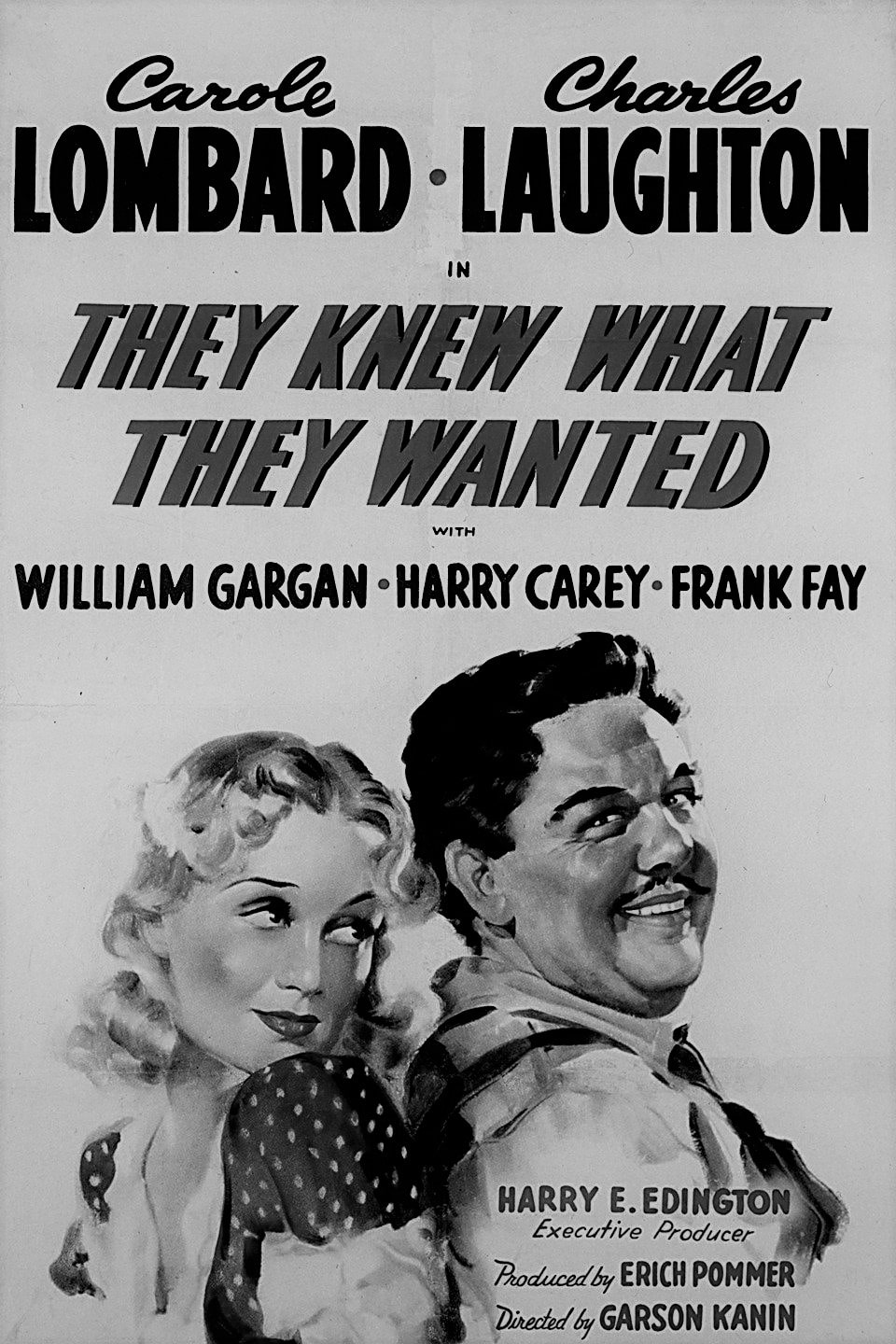 THEY KNEW WHAT THEY WANTED (1940)
THEY KNEW WHAT THEY WANTED (1940) (96 Min.) Genre: 1940 DRAMA, Transfer Quality: A
Like its predecessors, this third cinema version of Sidney Hoiward's Pulitzer Prize-winning play They Knew What They Wanted suffers from Hollywood censorship. Still, this story of the grim consequence of a misbegotten mail-order marriage has much to offer. Carole Lombard is superb as the waitress who lies about herself while carrying on a romance by correspondence with the Italian-born owner of a Napa Valley vineyard. Equally fine (if a shade too effusively hammy) is Charles Laughton as the grape grower, who also misrepresents himself in his letters, going so far as to pass off a photograph of handsome hired hand William Gargan as a picture of himself. Vowing to be loyal to her new husband Laughton, despite her distaste for him, Lombard nonetheless enters into an affair with Gargan. For the most part, the film moves along harmoniously. It falters only in the censor-dictated alterations (why is Lombard crying at the end?) and the horrendous performance by Frank Fay as a sanctimonious priest. Keep an eye peeled during the engagement party for a young, unbilled Karl Malden and Tom Ewell. Previous versions of They Knew What They Wanted included The Secret Hour (1928) and A Lady in Love (1930).
Starring: Carole Lombard, Charles Laughton, William Gargan, Harry Carey, Frank Fay, Karl Malden | Directed by: Garson Kanin
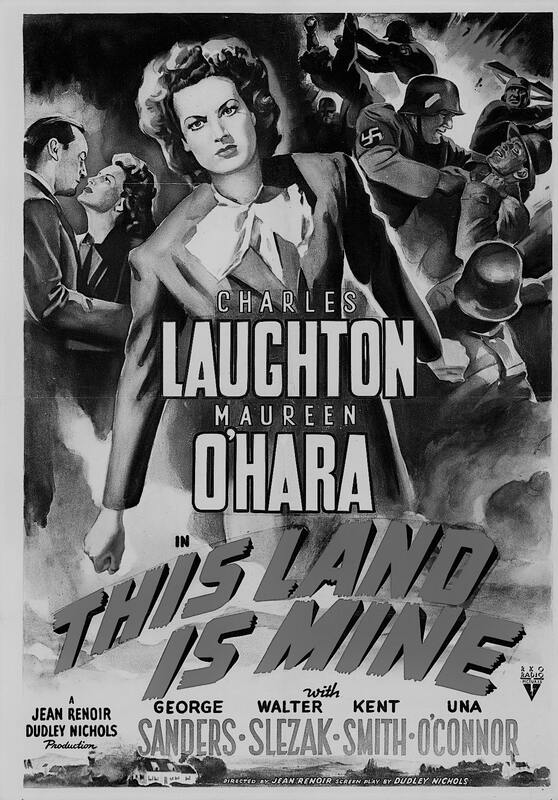 THIS LAND IS MINE (1943)
THIS LAND IS MINE (1943) (103 Min.) Genre: 1940 DRAMA, Transfer Quality: A
Written by Dudley Nichols and directed by French expatriate director Jean Renoir, This Land is Mine is one of those "inspirational" wartime dramas that just don't hold up too well when seen today. The scene is an unnamed European country, recently overrun by the Nazis (this takes place during a "silent" opening sequence that's the best thing in the film). Charles Laughton plays Albert Lory, a mama's-boy schoolmaster who is the object of his students' ridicule. A craven coward, Lory is held responsible when resistance fighter Paul Martin (Kent Smith), the brother of beauteous teacher Louise Martin (Maureen O'Hara), is executed by the Nazis, though in fact it was Lory's panic-stricken mother (Una O'Connor) who betrayed Paul. — Hal Erickson
Starring: Charles Laughton, Maureen O'Hara, Walter Slezak, George Sanders, George Coulouris | Directed by: Jean Renoir
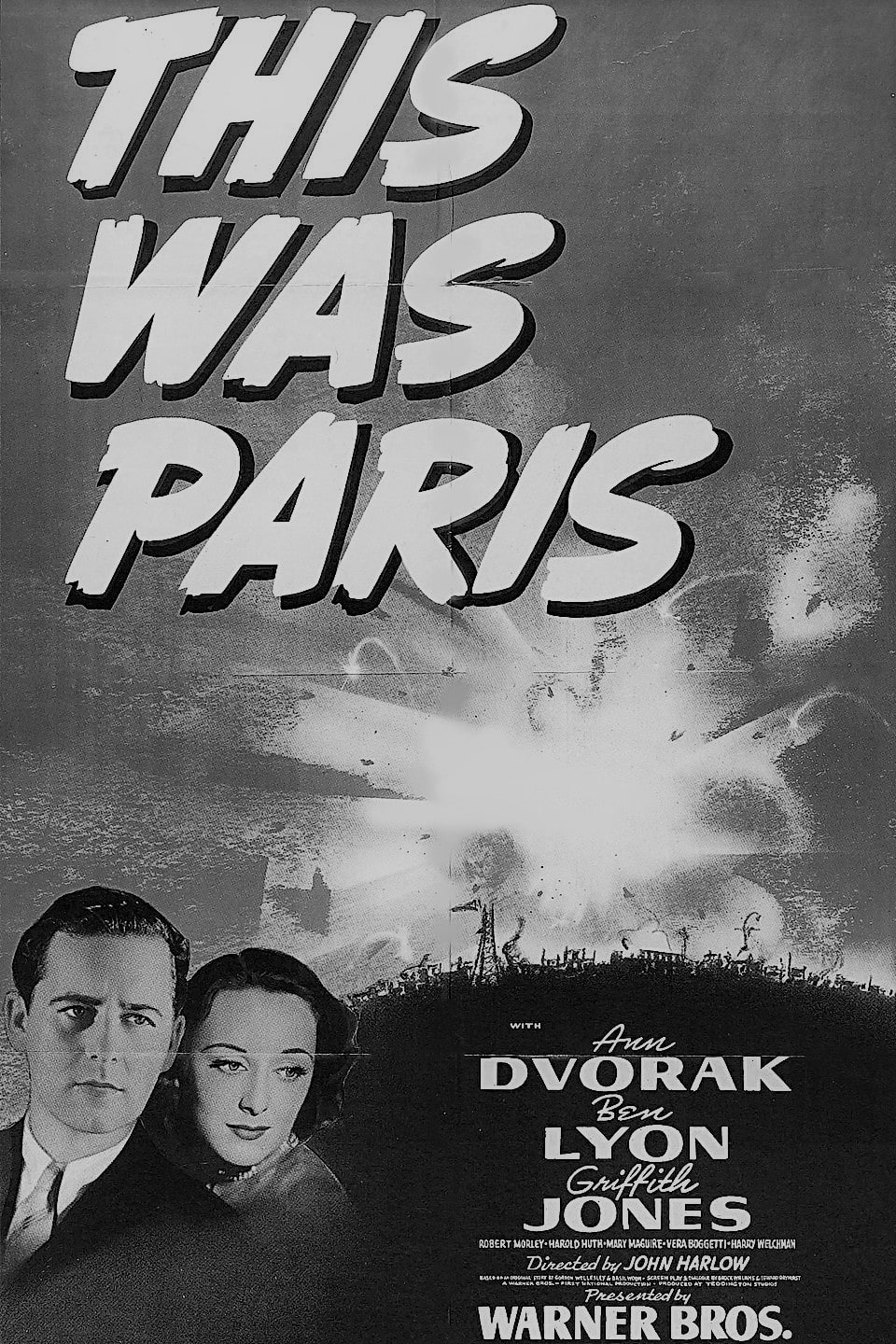 THIS WAS PARIS (1941)
THIS WAS PARIS (1941) (77 Min.) Genre: 1940 DRAMA, Transfer Quality: B
Filmed in England at Warner Bros.' Teddington Studios facilities, This Was Paris stars American actors (and current British residents) Ann Dvorak and Ben Lyon. She is cast as Ann Morgan, a female ambulance driver in the early days of WWII. He is cast as bibulous American newspaperman Butch, who likes to throw his weight around Paris because he knows he can get away with it. As the clouds of war gather all over Europe, Ann finds romance in the form of British Intelligence agent Bill Hamilton, while Butch sobers up and begins taking his responsibilities seriously. Oddly enough, This Was Paris didn't receive an American release until several years after its production.
Starring: Ann Dvorak, Ben Lyon, Griffith Jones, Robert Morley | Directed by: John Harlow
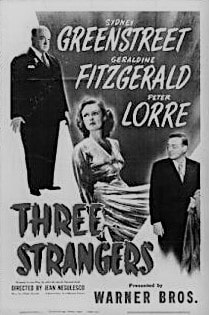 THREE STRANGERS (1946)
THREE STRANGERS (1946) (92 Min.) Genre: 1940 DRAMA, Transfer Quality: A
On the eve of the Chinese New Year, three strangers make a pact before a small statue of the Chinese goddess of Destiny. The strangers are Geraldine Fitzgerald, married to a wealthy philanderer; Sidney Greenstreet, an outwardly respectable judge; and Peter Lorre, a seedy sneak thief. The threesome agree to purchase a sweepstakes ticket and share whatever winnings might accrue. Alas, the pact brings little more than misfortune for all concerned. Greenstreet steals funds from a client, then kills Fitzgerald (with the goddess statue!) when she refuses to hand over her sweepstakes winnings. Lorre's fate is less bleak—he and his girlfriend (Joan Lorring) decide to abandon their life of crime—but even he ends up penniless when he inadvertently sets fire to the winning ticket. If it seems strange that Peter Lorre ends up the romantic lead in Three Strangers, remember that the film's director, Jean Negulesco, thought Lorre was the finest actor who ever lived—and as a result, he fought tooth and nail with Warner Bros. to cast Lorre in this film. — Hal Erickson
Starring: Sydney Greenstreet, Peter Lorre, Geraldine Fitzgerald, Joan Lorring | Directed by: Jean Negulesco
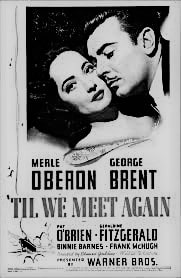 TIL WE MEET AGAIN (1940)
TIL WE MEET AGAIN (1940) (99 Min.) Genre: 1940 DRAMA, Transfer Quality: B
'Til We Meet Again is an inflated remake of 1932's One Way Passage. As in the original, the hero is a convicted murderer en route to the death house by way of a merchant ship; the heroine is suffering from a terminal illness. Once more, hero and heroine fall in love, each keeping the facts of his or her imminent doom from the other. The principal difference this time is that instead of William Powell and Kay Francis, the stars are George Brent and Merle Oberon. This cast change does no damage to the basic storyline, but the decision in 'Til We Meet Again to expand upon the secondary romance between the arresting detective (Pat O'Brien) and an accomplice of the condemned man (Geraldine Fitzgerald) throws the focus of the film completely out of kilter. One decided benefit to both One Way Passage and 'Til We Meet Again is the comic presence of Frank McHugh, who plays the same role—a tipsy pickpocket—in both pictures. — Hal Erickson
Starring: Merle Oberon, George Brent, Pat O'Brien, Geraldine Fitzgerald, Frank McHugh | Directed by: Edmund Goulding
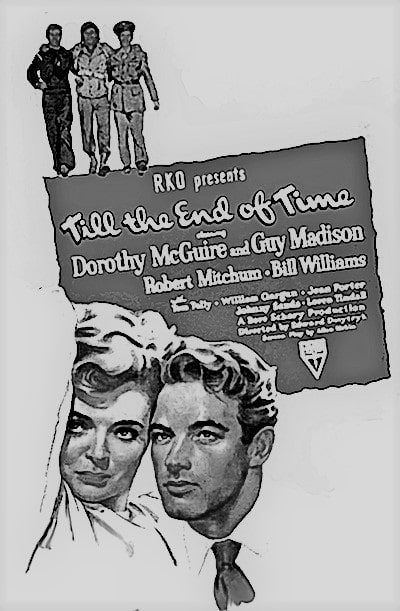 TILL THE END OF TIME (1946)
TILL THE END OF TIME (1946) (105 Min.) Genre: 1940 DRAMA, Transfer Quality: B
Sometimes dismissed as a derivation of Samuel Goldwyn's The Best Years of Our Lives, RKO Radio's superb Till the End of Time was actually based on Niven Busch's novel They Dream of Home, and was completed and released several months before the Goldwyn film. The story concentrates on three ex-marines: Cliff Harper (Guy Madison), Bill Tabeshaw (Robert Mitchum) and Perry Kincheloe (Bill Williams). Harper falls in love with emotionally distraught war widow Pat Ruscomb (Dorothy McGuire); Tabeshaw endures one disappointment after another as he tries to buy his own ranch; and Kincheloe, rendered legless by the war, intends to spend the rest of his life wallowing in self-pity. All three men find a new lease on life when they engage in a cathartic barroom brawl against a bigoted group of self-styled patriots led by hate-spouting Ray Teal (forever typecast as rabid racists during the postwar years). It was this climactic scene, which remains the most memorable aspect of Till the End of Time (outside of its Chopin-inspired theme song) that caused a lot of headaches for producer Dore Schary, screenwriter Allen Rivkin and director Edward Dmytryk during the House Unamerican Activities hearings a few years later: what was accepted as pro-American in 1946 would soon be labelled "Pinko" by the anti-Red zealots. — Hal Erickson
Starring: Dorothy McGuire, Guy Madison, Robert Mitchum, Bill Williams | Directed by: Edward Dmytryk
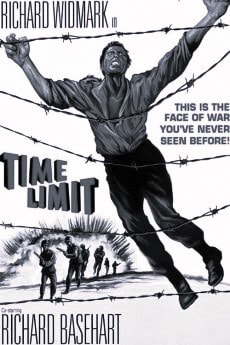 TIME LIMIT (1957)
TIME LIMIT (1957) (96 Min.) Genre: 1950 DRAMA, Transfer Quality: B
A to-the-point adaptation of an overly cerebral stage play by Ralph Berkey, Time Limit was the only film directed by character actor Karl Malden. The story involves a US army major (Richard Basehart), on trial for collaborating with the enemy during his imprisonment in North Korea. The case seems open and shut; not only are 14 former POWS willing to testify for the prosecution, but the major himself admits his guilt. Army investigator attorney Richard Widmark suspects there's more to the story than anyone is letting on. Conducting a private probe, Widmark discovers that Basehart had agreed to cooperate with the enemy to keep his men from being executed--but only after another American soldier, whose name Basehart wishes to protect, had revealed the POW's escape plans while under torture.
Starring: Richard Widmark, Richard Basehart, Dolores Michaels, Martin Balsam, June Lockhart | Directed by: Karl Malden
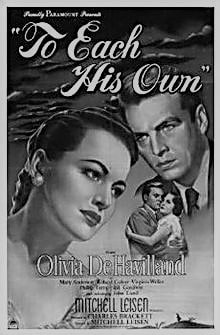 TO EACH HIS OWN (1946)
TO EACH HIS OWN (1946) (122 Min.) Genre: 1940 DRAMA, Transfer Quality: A
Olivia de Havilland won the first of her two Academy Awards for To Each His Own. During World War I, De Havilland falls in love with a young soldier (John Lund). He is killed in battle before they can marry, leaving de Havilland to raise their child alone. She gives the baby up for adoption, then goes to work in the cosmetic business, working her way up to an executive post. While in London on business during World War II, Olivia comes face to face with her grown son (John Lund again), now a military officer himself. Though she resists revealing her true identity, mother and son are brought together by a wise old British peer (Roland Culver). Olivia de Havilland's Oscar win was doubly sweet in that To Each His Own was her first film after an enforced two-year absence, brought about when she sued Warner Bros. to get out of her restrictive contract.
Starring: Olivia de Havilland, John Lund, Mary Anderson, Roland Culver, Phillip Terry | Directed by: Michael Leisen
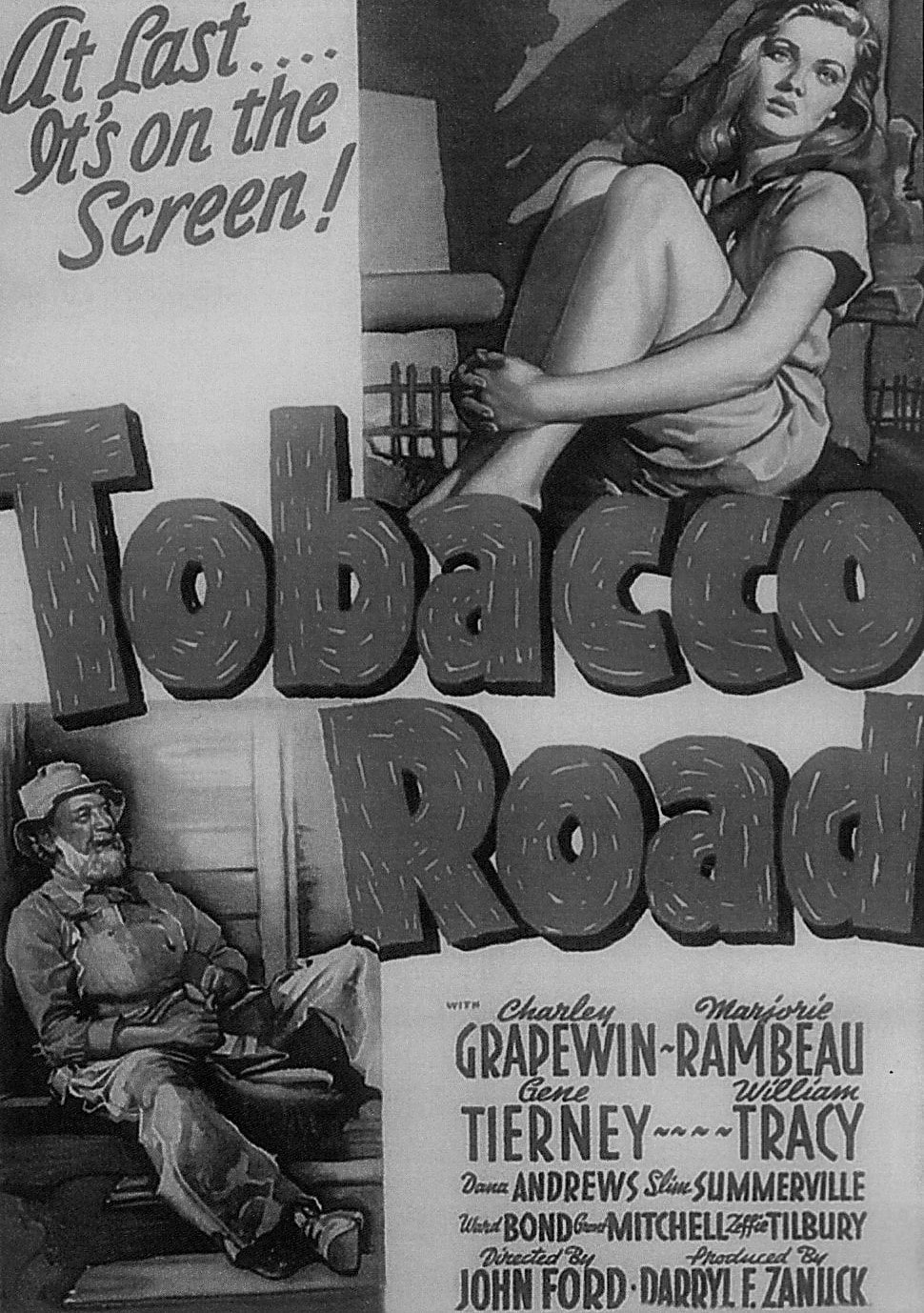 TOBACCO ROAD (1941)
TOBACCO ROAD (1941) (84 Min.) Genre: 1940 DRAMA, Transfer Quality: B
Erskine Caldwell's once-scandalous novel Tobacco Road resulted in an equally steamy stage play by Jack Kirkland, which became one of the longest-running productions in Broadway history. This story of indigence and amorality amongst inbred "poor whites" (based on people Caldwell had known while growing up in Georgia) had to be heavily expurgated for movie consumption, put there was plenty of comedy and colorful characterizations to suit the purposes of director John Ford. Charley Grapewin stars as Jeeter Lester, shiftless patriarch of a large backwoods clan. The Lesters are about to be thrown off their land for nonpayment of rent, but anyone who tries to help them—or to alter their lifestyle—is chased away by the poverty-stricken but intensely proud Jeeter. Tobacco Road succeeded on the basis of its title alone, even though no one expected the film to be anywhere near as earthy as the stage version (it would have been impossible under prevailing censorship to include the play's famous opening scene, in which the family watches intently while a teenage girl masturbates!)
Starring: Charles Grapewin, Marjorie Rambeau, Gene Tierney, William Tracy | Directed by: John Ford
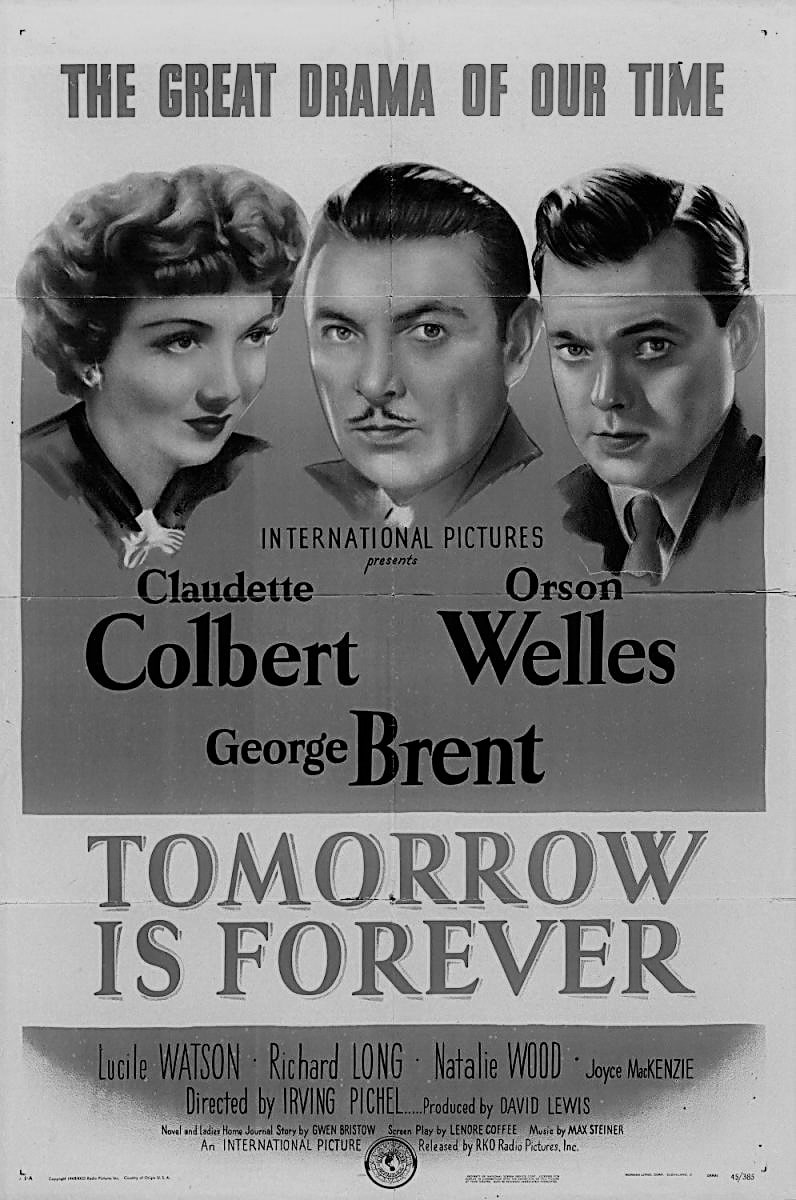 TOMORROW IS FOREVER (1946)
TOMORROW IS FOREVER (1946) (105 Min.) Genre: 1940 DRAMA, Transfer Quality: A
The blissful marriage between John (Orson Welles) and Elizabeth (Claudette Colbert) comes to an abrupt end when John is listed as missing and presumed dead in WWI. After a respectable period of mourning, Elizabeth, now a single mother, marries chemical-plant executive Larry Hamilton (George Brent), by whom she has a daughter, Margaret (Natalie Wood, in her first major film role). Twenty years later, a refugee Austrian chemist named Erich Kessler is hired by Hamilton. Kessler turns out to be the long-missing John, now suffering from amnesia, his face completely reconstructed by plastic surgery. Upon ascertaining Kessler's true identity, Elizabeth is faced with the sort of devastating dilemma indigenous to glossy soap operas of this nature. The film's central conflict arises from John/Erich's opposition to his grown son Drew's (Richard Long) participation in WW2. At the time of the film's release, publicists for Tomorrow is Forever paid more attention to Claudette Colbert's 18 costume changes than to Orson Welles' virtuoso performance in what amounted to a dual role.
Starring: Claudette Colbert, Orson Welles, George Brent, Lucile Watson, Richard Long, Natalie Wood | Directed by: Irving Pichel
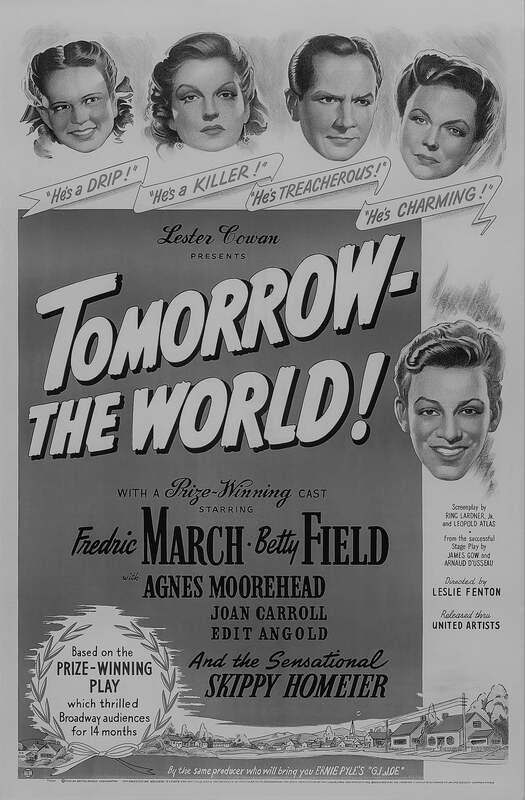 TOMORROW THE WORLD (1944)
TOMORROW THE WORLD (1944) (82 Min.) Genre: 1940 DRAMA, Transfer Quality: A
14-year-old Skip Homeier repeats his stage role as an unreconstructed Hitler Jugend in the film version of the James Gow/Arnaud D'Usseau stage play Tomorrow the World. A German orphan, Homeier is taken into the home of his American uncle (Fredric March), a gently liberal university professor. Though the son of an anti-Nazi, little robot-like Skip has become a parrot for the Third Reich, denouncing his late father as a traitor and being as nasty as possible to the professor's Jewish fiancee (Betty Field). Homeier accepts democracy only when the professor forgets his fuzzy-headedness and applies a little "physical culture." The moral really shouldn't be "Love America or We'll Break Every Bone in Your Body," but given the times in which it was made, Tomorrow the World can be forgiven its excesses. — Hal Erickson
Starring: Fredric March, Betty Field, Agnes Moorehead, Skippy Homeier, Joan Carroll. | Directed by: Leslie Fenton
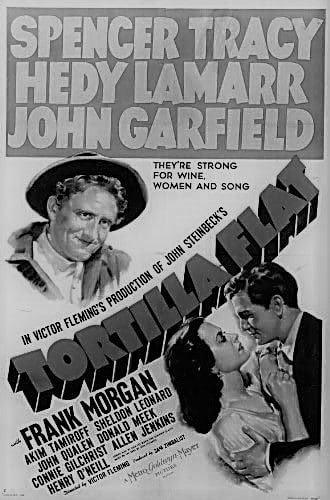 TORTILLA FLAT (1942)
TORTILLA FLAT (1942) (105 Min.) Genre: 1940 DRAMA, Transfer Quality: A
Like the John Steinbeck novel on which it is based, Tortilla Flat is not so much a movie as a series of warm-hearted anecdotes, all linked to a small California fishing village populated by poor-but-happy immigrants. The focus is upon Pilon (Spencer Tracy), a good-natured, charismatic freeloader, and Danny (John Garfield), a hot-headed fisherman who is dragged kicking and screaming into the world of personal responsibility when he inherits two small houses. As Pilon toys with the notion of stealing the nest egg saved up by an old man known as "The Pirate" (Frank Morgan), Danny tries to spark a romance with sexy cannery worker Dolores "Sweets" Ramirez (Hedy Lamarr). Abandoning the robbery plans when he learns that The Pirate intends to use his money to purchase a candlestick for St. Francis, Pilon turns his attentions to stealing Sweets away from Danny. But when Danny is injured in a drunken fight, the mercurial Pilon switches gears again, devoting his energies to bringing Danny and Sweets back together. Of the film's many highlights, standouts include the surprisingly effective "straight" performance by comic actor Frank Morgan (for which he received an Oscar nomination), and the seemingly improvised songfest between Spencer Tracy and John Garfield. — Hal Erickson
Starring: Spencer Tracy, Hedy Lamarr, John Garfield, Frank Morgan | Directed by: Victor Fleming
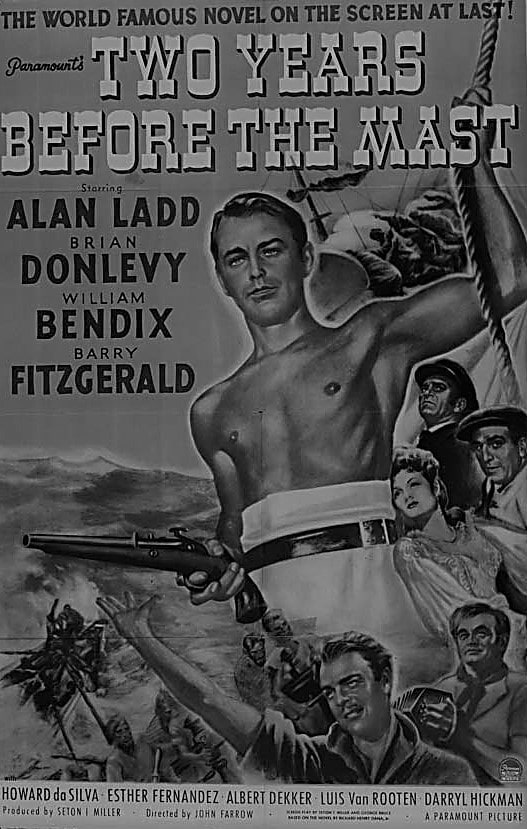 TWO YEARS BEFORE THE MAST (1946)
TWO YEARS BEFORE THE MAST (1946) (98 Min.) Genre: 1940 DRAMA, Transfer Quality: A
Based on a famous book by Richard Henry Dana, Jr., this grueling saga of shipboard oppression is set in the mid-19th century. Charles Stewart (Alan Ladd), the wealthy son of a Boston shipowner, is hijacked by Amazeen (William Bendix), the first mate on a ship bound for California. Francis Thompson (Howard Da Silva) is the tyrannical captain of the Pilgrim who was booted out of the U.S. Navy for mistreating his sailors. Now he wants to set a record sailing time, and he and Amazeen mete out severe punishment for the slightest of infractions. They even deny the men permission to go ashore and pick fruit when they stop in California and pick up the beautiful Maria Dominguez (Esther Fitzgerald). Without fruit, the men develop scurvy and begin to mutiny. Stewart allies himself with the author Dana (Brian Donlevy), whose brother died on one of Captain Thompson's previous voyages. Dana wants to write an expose of Thompson. Stewart steals guns and tries to take over the ship, but Amazeen subdues and imprisons him. The film was shot on a Hollywood set, but with devices on the set that simulate rolling waves so effectively that much of the cast got seasick.
Starring: Alan Ladd, Brian Donlevy, William Bendix, Roman Bohnen | Directed by: John Farrow
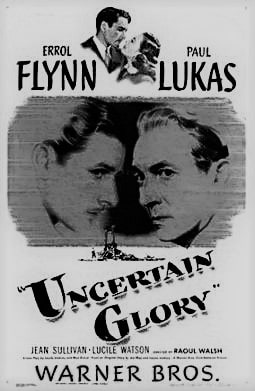 UNCERTAIN GLORY (1944)
UNCERTAIN GLORY (1944) (102 Min.) Genre: 1940 DRAMA, Transfer Quality: A
Uncertain Glory finds Errol Flynn atypically cast as French criminal Jean Picard, a craven coward whose many misdeeds have earned him a date with the guillotine. Detective Marcel Bonet (Paul Lukas) intends to see that Picard keeps his appointment with the executioner, despite the fact that there's a war on. When the Nazis capture 100 French hostages to force a resistance saboteur to surrender himself, Picard offers to pose as the saboteur and thereby save the lives of the innocent villagers. In truth, he plans to escape once he's turned himself over to the Nazis, leaving the villagers in the lurch, but at the last moment his latent patriotism overcomes his sense of self-preservation. Errol Flynn's character is almost as inconsistent as the script, but war films invariably made money in 1944. — Hal Erickson
Starring: Errol Flynn, Paul Lukas, Faye Emerson, Jean Sullivan, Faye Emerson | Directed by: Raoul Walsh
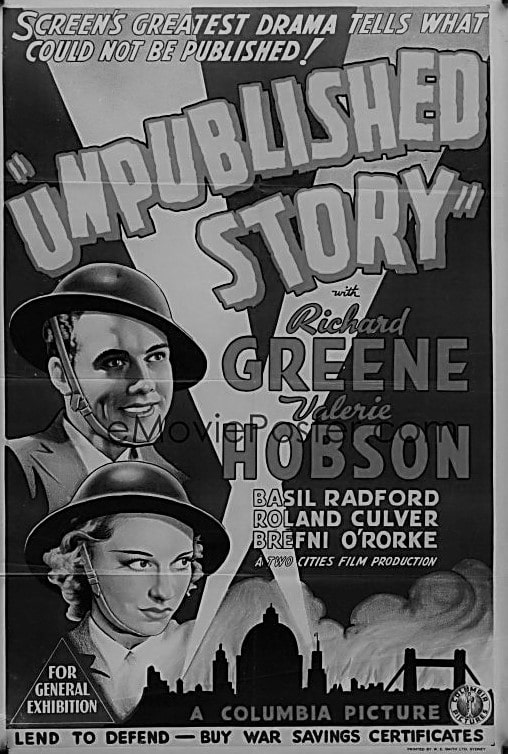 UNPUBLISHED STORY (1942)
UNPUBLISHED STORY (1942) (91 Min.) Genre: 1940 DRAMA, Transfer Quality: A
Produced by Britain's Two Cities Productions and released in the US by Columbia, Unpublished Story is a curious melange of newspaper melodrama and espionage intrigue. Richard Greene and Valerie Hobson star as rival reporters Bob Randall and Carol Bennett, both of whom are interested in a hush-hush story involving the British Secret service. Warned off the story, our hero and heroine persevere, only to find themselves up to their neck in Nazi spies. Eventually wriggling out of their predicament, Bob and Carol find themselves with a "swell scoop" on their hands-one which cannot be published, lest national security be imperiled. According to Columbia's publicity mill, Richard Greene was given a brief leave of absence from the Army to star in Unpublished Story; it is up to the viewer to determine whether this "working furlough" was worth it. — Hal Erickson
Starring: Richard Greene, Valerie Hobson, Basil Radford, Roland Culver | Directed by: Harold French
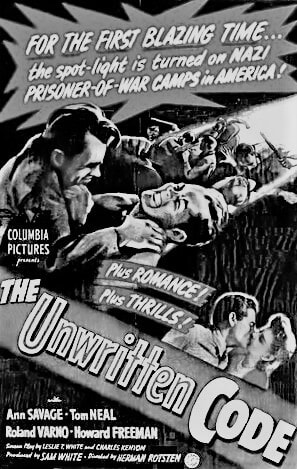 UNWRITTEN CODE, THE (1944)
UNWRITTEN CODE, THE (1944) (56 Min.) Genre: 1940 DRAMA, Transfer Quality: C
The Unwritten Code is an offbeat, better-than-average Columbia wartime "B" picture. Though Ann Savage and Tom Neal are top-billed, the central character is supporting-actor Roland Varno. He plays a Nazi spy who sneaks into the U.S., hoping to release hundreds of German prisoners. He fails, but not until plenty of bullets have been spent. The most interesting aspect of The Unwritten Code is the casting of Savage and Neal as the "good" characters: in 1945, these two cult favorites would play the decidedly unsavory protagonists of the film noir classic Detour.
Starring: Ann Savage, Tom Neal, Roland Varno, Howard Freeman | Directed by: Herman Rotsten
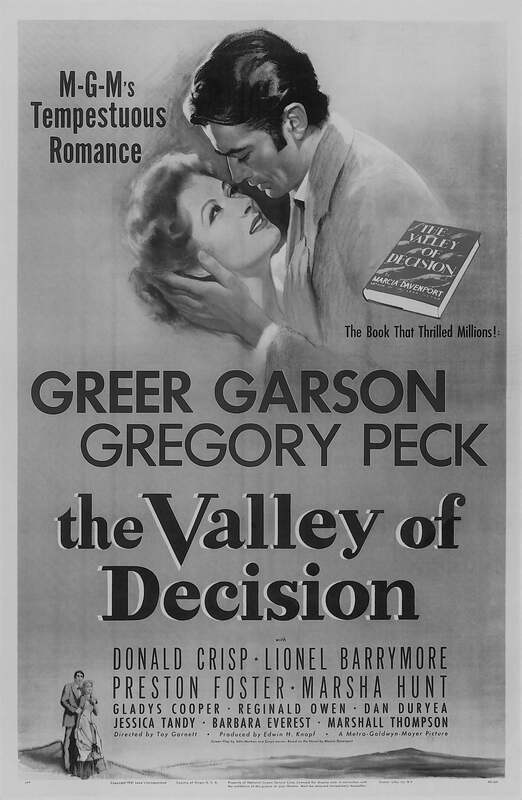 VALLEY OF DECISION,THE (1945)
VALLEY OF DECISION,THE (1945) (111 Min.) Genre: 1940 DRAMA, Transfer Quality: A
Based on Marcia Davenport's novel and set in 1870, Valley of Decision details the romance between a housemaid named Mary Rafferty (Greer Garson) and her employer's son, Paul Scott (Gregory Peck). Paul's father, William (Donald Crisp), owns a Pittsburgh steel mill where Mary's father, Pat (Lionel Barrymore), was crippled; Pat believes he wouldn't have suffered his accident if William had taken more safety precautions. Once Mary and Paul fall in love, both fathers fight against their relationship, and soon their romance is plagued by not only familial tensions, but also a worker's strike at the steel mill. — Stephen Thomas Erlewine
Starring: Greer Garson, Gregory Peck, Donald Crisp, Lionel Barrymore | Directed by: Tay Garnett
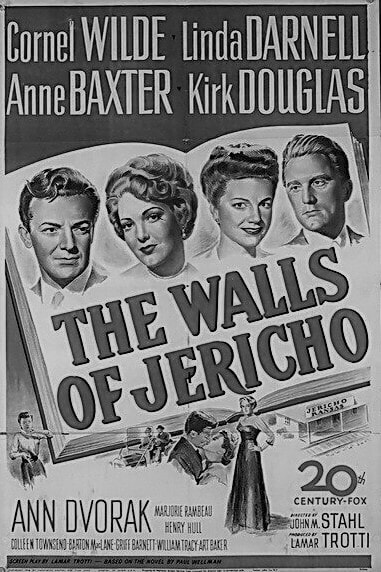 WALLS OF JERICHO, THE (1948)
WALLS OF JERICHO, THE (1948) (106 Min.) Genre: 1940 DRAMA, Transfer Quality: B
The year is 1908 and the setting Jericho, Kansas, a veritable cesspool of sin and vice. Dave Connors is a politically ambitious lawyer married to Belle, the town lush, and is in love with beautiful colleague Julia Norman. Matters are worsened when Algeria Wedge, his best friend's wife, makes a pass at him. When Dave rejects her advances, she retaliates by printing vile things about him in the town paper. This effectively destroys his political career and causes him to leave town. Algeria then successfully helps to launch her husband's career so she can remain in town and cause even more trouble.
Starring: Anne Baxter, Linda Darnell, Kirk Douglas, Ann Dvorak, Barton MacLane, Cornel Wilde | Directed by: John M. Stahl
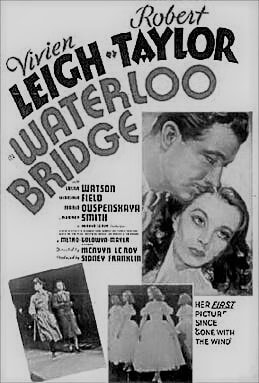 WATERLOO BRIDGE (1940)
WATERLOO BRIDGE (1940) (109 Min.) Genre: 1940 DRAMA, Transfer Quality: A
Given the omnipresence of the Motion Picture Production Code in 1940, the second film version of Robert E. Sherwood's Waterloo Bridge would have to be laundered and softened to pass muster. In the original, made in 1931, the heroine is nothing more or less than a streetwalker, patrolling London's Waterloo Bridge during World War I in hopes of picking up the occasional soldier. She falls in love with one of her clients, a young officer from an aristocratic family. Gently informed by the young man's mother that any marriage would be absolutely impossible, the streetwalker tearfully agrees, letting her beau down gently before ending her own life by walking directly into the path of an enemy bomb. In the remake, told in flashback as a means of "distancing" the audience from what few unsavory story elements were left, the heroine, Vivien Leigh, starts out as a virginal ballerina. Robert Taylor, a British officer from a wealthy family, falls in love with Vivien and brings her home to his folks. This time around, Taylor's uncle (C. Aubrey Smith), impressed by Vivien's sincerity, reluctantly agrees to the upcoming marriage. When Taylor marches off to war, Vivien abandons an important dance recital to bid her fiance goodbye, losing her job as a result. Later, she is led to believe that Taylor has been killed in battle. Thus impoverished and aggrieved, she is given a motivation for turning to prostitution, a plot element deemed unecessary in the original-which indeed it was. Now the stage is set for her final sacrifice, though the suicidal elements are carefully weeded out. Waterloo Bridge was remade for a second time in 1956 as Gaby, with Leslie Caron and John Kerr. — Hal Erickson
Starring: Robert Taylor, Vivian Leigh, Lucile Watson, Virginia Field, Maria Ouspenskaya | Directed by: Mervyn LeRoy
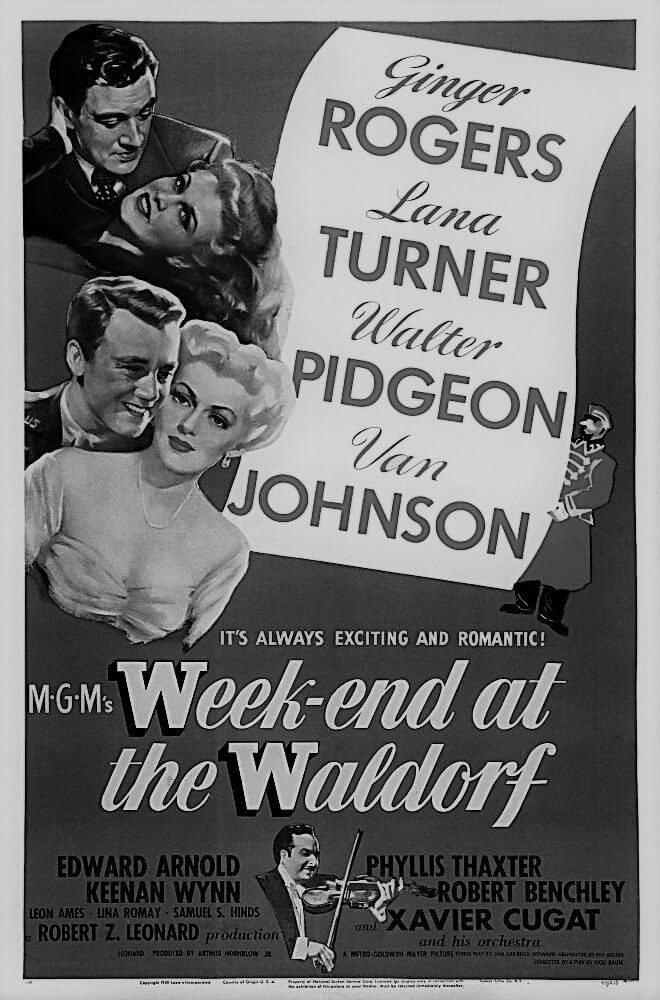 WEEKEND AT THE WALDORF (1945)
WEEKEND AT THE WALDORF (1945) (130 Min.) Genre: 1940 DRAMA, Transfer Quality: A
Weekend at the Waldorf is an unabashed remake of MGM's 1932 Oscar-winner Grand Hotel: in fact, at several points in the story, the cast makes pointed references to the earlier film. The posh Waldorf Hotel in the heart of New York is the setting for several plots and subplots. Ginger Rogers plays the Garbo counterpart, a successful but severely depressed movie star who wants to be alone. Walter Pigeon steps into John Barrymore's role, sort of; whereas Barrymore was a thief posing as nobility, Pigeon is a war correspondent posing as a thief. Hotel stenographer Lana Turner (originally Joan Crawford) latches onto tycoon Edward Arnold (originally Wallace Beery) in hopes of a life of luxury. And, in the film's biggest adaptation stretch, Van Johnson is cast as a war hero who, about to undergo life-threatening surgery, wants to thoroughly enjoy what may be his last days on earth. It takes a while to figure this out, but Johnson is supposed to be the character played in Grand Hotel by Lionel Barrymore: the meek clerk who, upon discovering that he's dying, blows his life savings on one last fling. On the whole, Weekend at the Waldorf is a lot more light-hearted than Grand Hotel, as indicated by the expository character played by humorist Robert Benchley, not to mention the presence of Xavier Cugat as the Waldorf's orchestra leader.
Starring: Ginger Rogers, Lana Turner, Walter Pidgeon, Van Johnson, Edward Arnold, Phyllis Thaxter | Directed by: Robert Z. Leonard
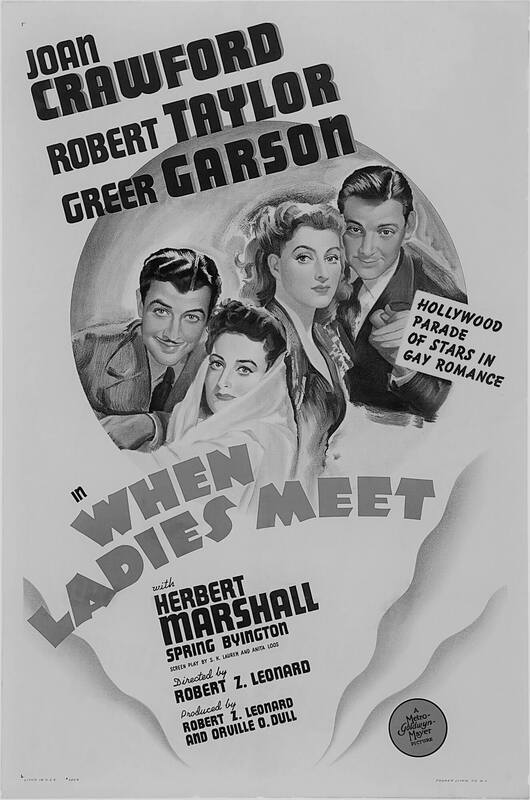 WHEN LADIES MEET (1941)
WHEN LADIES MEET (1941) (105 Min.) Genre: 1940 DRAMA, Transfer Quality: A
Strange Skirts is the TV title of the 1941 MGM film When Ladies Meet. The film was a remake of a 1933 production of the same name, which starred Ann Harding, Myrna Loy and Spring Byington; their roles were taken over in the remake by Greer Garson, Joan Crawford and Spring Byington. Both films are based on a Rachel Crothers play about a lady novelist who falls in love with a married publisher. The novelist (Crawford) meets the publisher's wife (Garson) at the home of a chatterbox society matron (Byington). The fact that the 1941 version was forced to undergo the censor's scissors to a greater extent than the 1933 film was compensated by the later version's lusher production values, which earned an Academy Award nomination for MGM art director Cedric Gibbons and Randall Duell. Under both its original title When Ladies Meet and its TV-dictated cognomen Strange Skirts, this dated but enjoyable film has become a "standard" on the various cable TV services of Ted Turner. — Hal Erickson
Starring: Joan Crawford, Robert Taylor, Greer Garson, Herbert Marshall | Directed by: S.K. Lauren, Robert Z. Leonard, Anita Loos
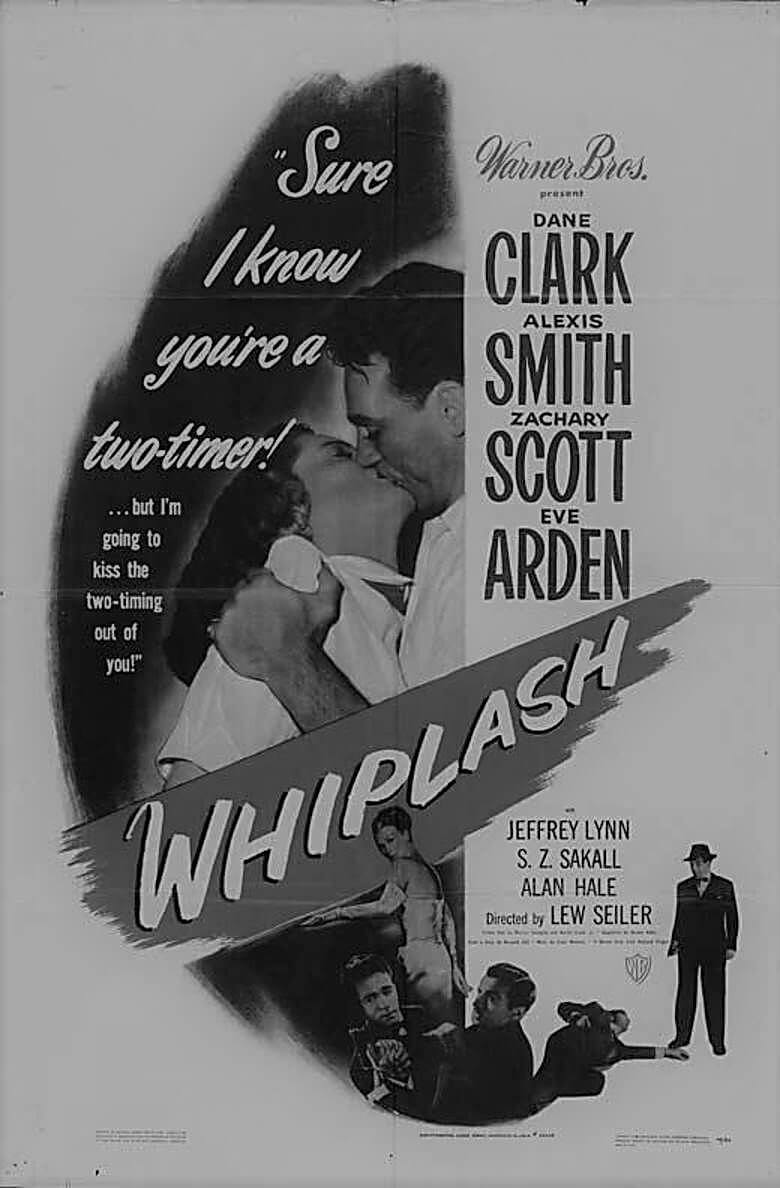 WHIPLASH (1948)
WHIPLASH (1948) (91 Min.) Genre: 1940 DRAMA, Transfer Quality: A
In this drama, a California artist abandons his work to become a New York prizefighter after he falls in love with a married nightclub singer. Her husband was a fighter, but suffered a crippling accident in the ring and was unable to fulfill his lifelong dream of becoming the world champion. The husband decides to live out his dream through the artist and begins tutoring him. Things go well until the hubby discovers that the artist has been sleeping with his wife. He then begins giving the artist bad advice so he will get creamed in the ring. Fortunately for the artist, he wins the Big Fight.
Starring: Dane Clark, Alexis Smith, Zachary Scott, Eve Arden | Directed by: Lewis Seiler
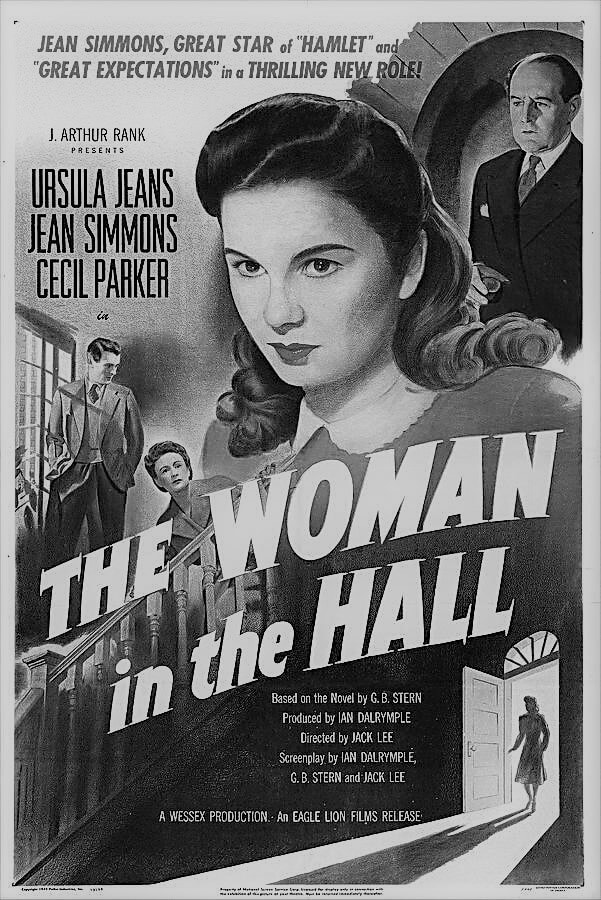 WOMAN IN THE HALL, THE (1947)
WOMAN IN THE HALL, THE (1947) (93 Min.) Genre: 1950 DRAMA, Transfer Quality: B
A mother provides a lousy example for her daughter in this gritty, realistic drama. The mother is a mistress of manipulating the sympathies of others for her own gain. Rather than working, she solicits the sympathy of others. Like her mother, the daughter is equally manipulative and ends up with a rich husband. Her mother decides to go straight and get a real job, but it may be too late for the daughter who forges a check and gets caught.
Starring: Ursula Jeans, Jean Simmons, Cecil Parker, Joan Miller | Directed by: Jack Lee
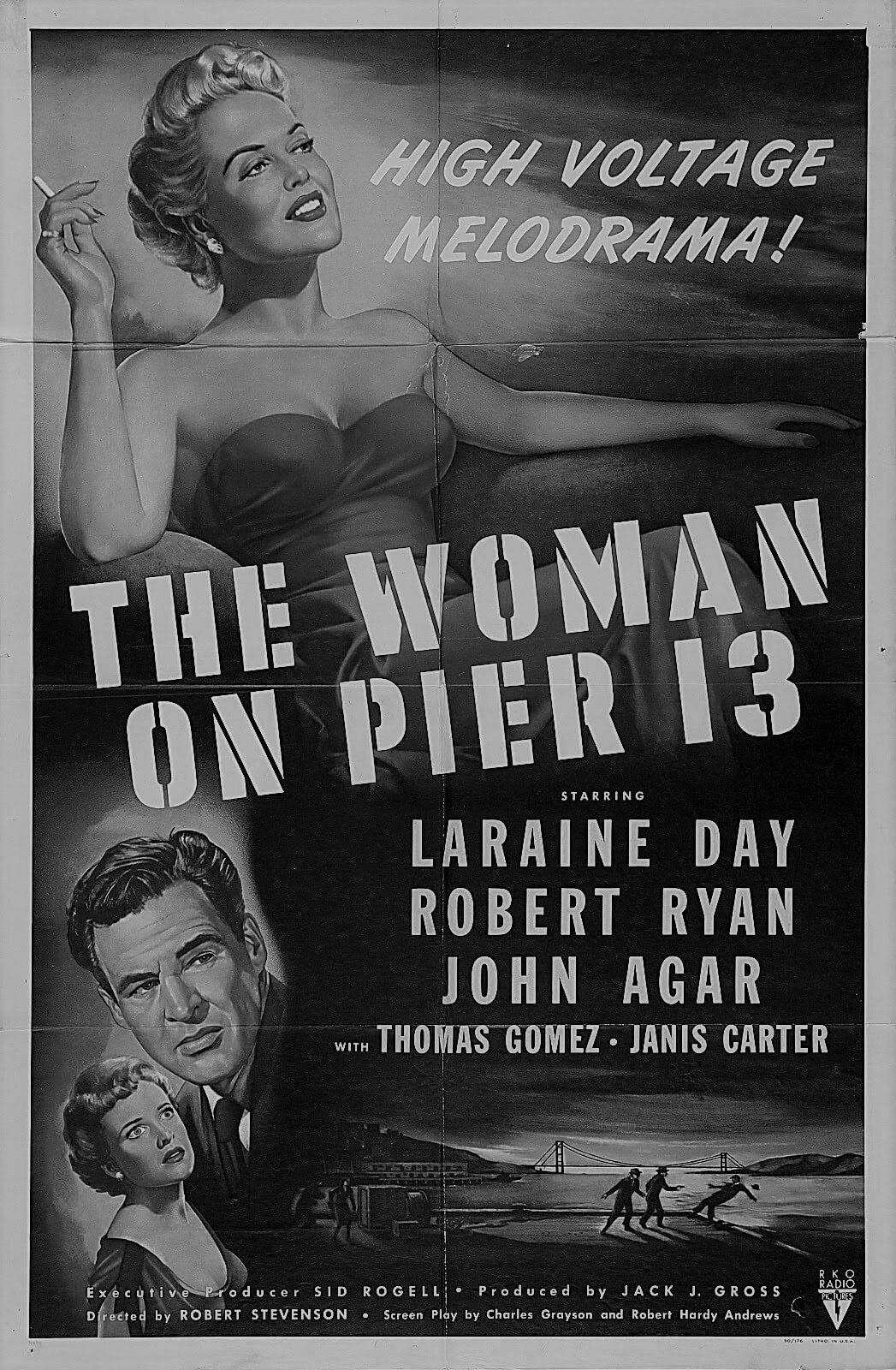 WOMAN ON PIER 13, THE (1949)
WOMAN ON PIER 13, THE (1949) (73 Min.) Genre: 1940 DRAMA, Transfer Quality: A
There's propaganda aplenty in RKO's I Married a Communist, the first of producer Howard R. Hughes' many anti-Red broadsides. Robert Ryan plays shipping executive Brad Collins, whose youthful flirtations with certain left-wing causes have made him ripe for plucking by Commie cell leader Vanning (Thomas Gomez). Threatening to reveal Collins' "pinko" past, Vanning orders the executive to deliberately sabotage the shipping industry in the Frisco Bay area. Other characters essential to the plotline are Collins' wife Nan (Laraine Day), who knows nothing of her husband's politics, and his idealistic brother-in-law Don (John Agar) who spouts Marxist dogma at the drop of a hat. Apparently at a loss as to how to depict communist villainy, the screenwriters hark back on the gangster films of the 1930s, notably in the scene where a hapless stoolie (the inevitable Paul Guilfoyle) is taken for a ride. When the title I Married a Communist proved an audience turn-off during previews, the film was rechristened The Woman on Pier 13. — Hal Erickson
Starring: Laraine Day, Robert Ryan, John Agar, Thomas Gomez, William Talman | Directed by: Robert Stevenson
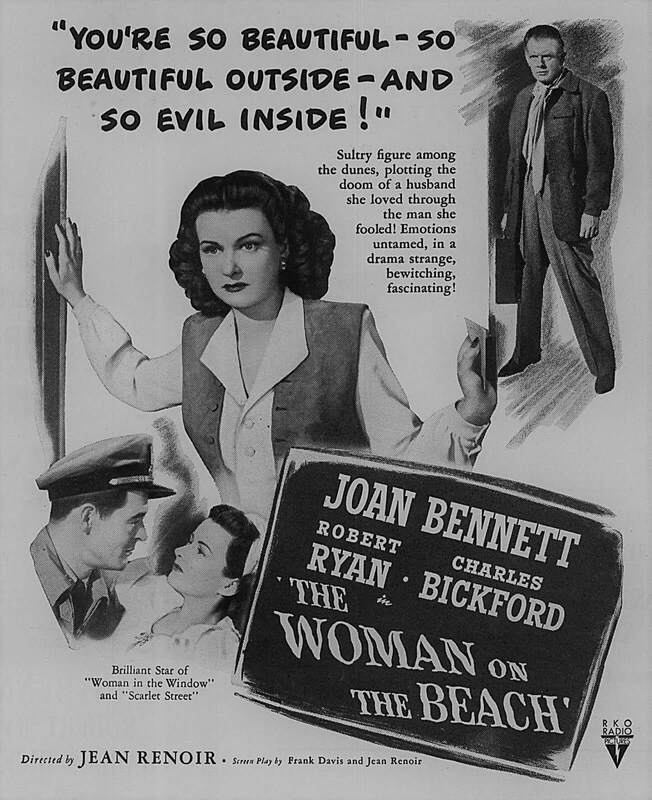 WOMAN ON THE BEACH, THE (1947)
WOMAN ON THE BEACH, THE (1947) (71 Min.) Genre: 1940 DRAMA, Transfer Quality: A
A WWII Coast Guard veteran, Lt. Scott Burnett (Robert Ryan), is plagued by nightmares of his combat days. One day, he meets a woman, Peggy Butler (Joan Bennett), walking on a beach, picking up pieces of wood. Butler is married to a grumpy, blind painter, Ted Butler (Charles Bickford). Despite his affections for his wife Eve (Nan Leslie), whose father is a boat builder, Scott falls in love with Peggy. Peggy reveals that she blinded her husband years earlier by throwing a glass at him during an ugly spat, ruining his career and her own ambitions to be an upper-class socialite. Scott fears that Ted is suspicious that he is having an affair with Peggy and becomes so paranoid that he begins to believe that Ted is faking his blindness — and sets out to prove it. This was the fifth and final American film by the great French writer-director Jean Renoir. — Michael Betzold
Starring: Joan Bennett, Robert Ryan, Charles Bickford, Nan Leslie, Walter Sande | Directed by: Jean Renoir
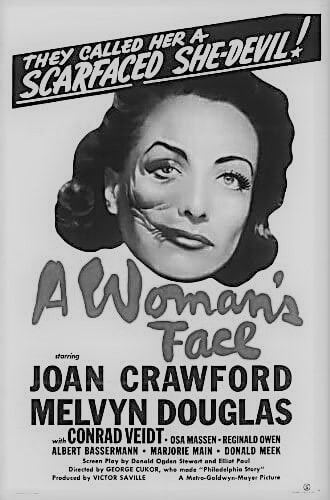 WOMAN'S FACE, A (1941)
WOMAN'S FACE, A (1941) (107 Min.) Genre: 1940 DRAMA, Transfer Quality: A
A remake of the Swedish film of the same name (see entry 55092), MGM's A Woman's Face was reshaped into one of Joan Crawford's best vehicles. Told in flashback from the vantage point of a murder trial, the story concerns a female criminal whose face is disfigured by a hideous scar. The plastic-surgery removal of this disfigurement has profound repercussions, both positive and tragically negative. The film's multitude of subplots converge when Conrad Veidt, Joan's lover and onetime partner in crime, is murdered. Melvyn Douglas costars as the beneficent cosmetic surgeon who becomes Joan's lover, while Osa Massen appears as Douglas' vituperative wife. Making his American screen debut in the role of Veidt's father is Albert Basserman, who spoke no English and had to learn his lines phonetically. Both A Woman's Face and its Swedish predecessor were based on Il Etait Une Fois, a play by Francis de Croiset. — Hal Erickson
Starring: Joan Crawford, Melvyn Douglas, Conrad Veidt, Osa Massen, George Zucco | Directed by: George Cukor
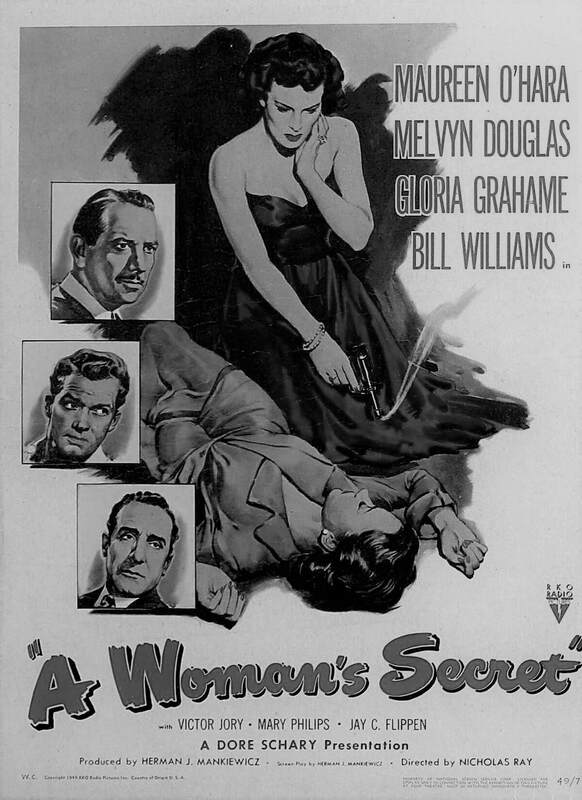 WOMAN'S SECRET, A (1949)
WOMAN'S SECRET, A (1949) (85 Min.) Genre: 1940 DRAMA, Transfer Quality: B
Screenwriter Herman J. Mankiewicz adopts the same prismatic-flashback technique he'd used so well in Citizen Kane for the 1949 filmic soap opera A Woman's Secret. Based on a novel by Vicki (Grand Hotel) Baum, the film begins with the shooting of nightclub singer Susan Caldwell (Gloria Grahame). Marian Washburn (Maureen O'Hara), who'd coached Susan into the Big Time, confesses to the shooting. Neither Marian's piano-player friend Luke Jordan (Melvyn Douglas) nor police inspector Fowler (Jay C. Flippen) completely buy her story, and it is their probing investigation of the facts that sparks the flashback parade. The film details in sometimes clever, sometimes maudlin fashion the perils of living one's life vicariously through the accomplishments of others. Though filmed before director Nicholas Ray's "official" debut feature They Live by Night, A Woman's Secret was released afterward.
Starring: Maureen O'Hara, Melvyn Douglas, Gloria Grahame, Victor Jory | Directed by: Nicholas Ray
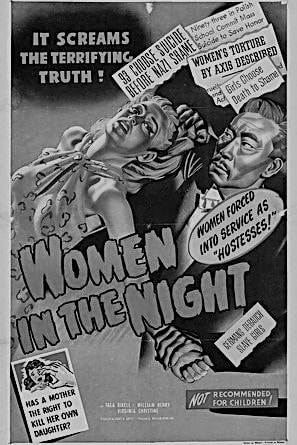 WOMEN IN THE NIGHT (1948)
WOMEN IN THE NIGHT (1948) (90 Min.) Genre: 1940 DRAMA, Transfer Quality: B
The scene is Shanghai: the time, WW II. An international group of women left stranded during the Japanese invasion are rounded up by the local authorities to act as "comfort girls" for high-ranking Nazi and Japanese officials. Bridling at this degrading treatment, the ladies secretly work on behalf of the Chinese Underground, relaying vital information to the Allies and, at one point, committing murder in the name of Democracy. The plot thickens with the introduction of a Nazi "cosmic ray" device, which OSS operative Van Arnheim (William Henry) hopes to destroy before it can be used in battle. Van Arnheim's courageous wife is played by Virginia Christine, light-years removed from her stint as "Mrs. Olsen" in the Folger's Coffee TV commercials.
Starring: Tala Birell, William Henry, Virginia Christine, Richard Loo | Directed by: William Rowland
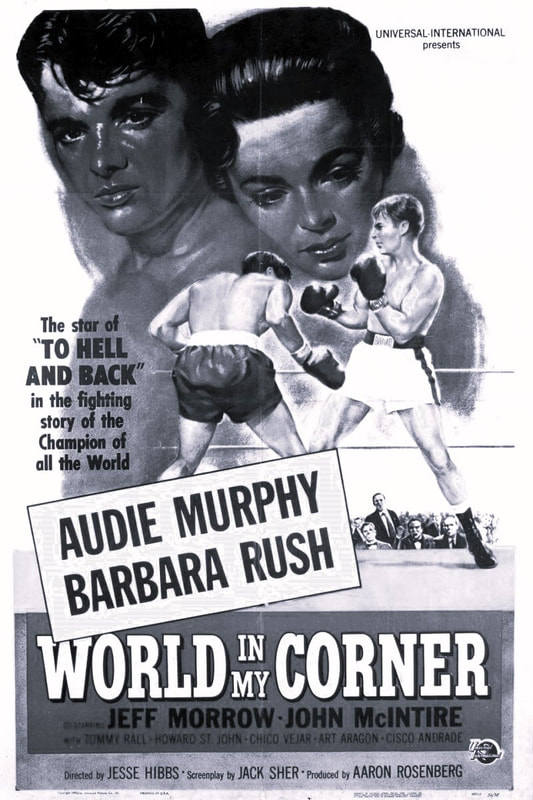 WORLD IN MY CORNER (1956)
WORLD IN MY CORNER (1956) (82 Min.) Genre: 1950 DRAMA, Transfer Quality: B
In this boxing drama, a young pugilist hopes his talent will be his ticket out of the ghetto. Sure enough, the welterweight slowly rises in the ranks until he finally gets a shot at challenging the champ. Unfortunately, the champ has offered to pay the young fighter a lot of money if he throws the fight. The fighter could use that money to marry his girl and get her away from her father. Thinking of her, he decides to take the dive, but his conscience intervenes at the last moment and he goes on to win. Fortunately, everything ends happily.
Starring: Audie Murphy, Barbara Rush, Jeff Morrow, Tommy Rall, John McIntire | Directed by: Jesse Hibbs
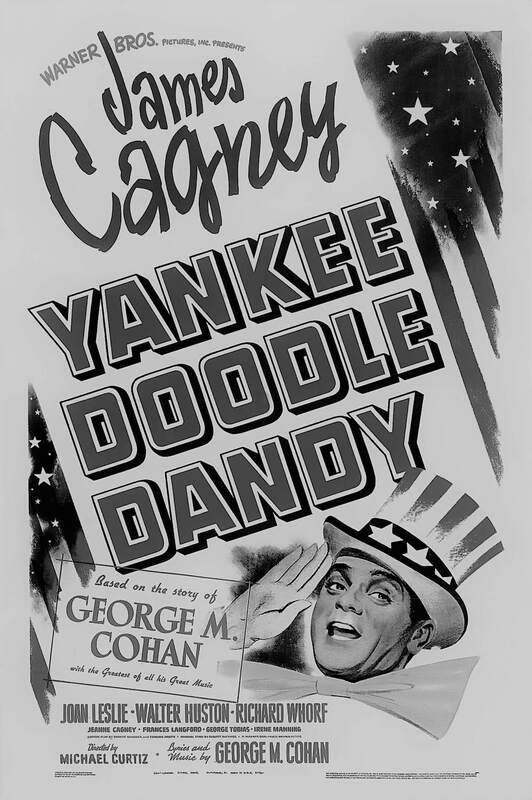 YANKEE DOODLE DANDY (1942)
YANKEE DOODLE DANDY (1942) (126 Min.) Genre: 1940 DRAMA, Transfer Quality: A
Yankee Doodle Dandy was one of the best World War II-era patriotic propaganda films, and it has proven itself enduringly popular in the decades following its release. The film succeeds almost entirely on the performance of James Cagney as legendary song-and-dance performer George M. Cohan, although significant credit should also be given to director Michael Curtiz, who expertly stages each scene to display the talents of his star. The film features an over-the-top framing device in which Cohan tells his life's story in flashback to U.S. President Franklin Roosevelt. The story is effectively fiction, using only the outline of Cohan's life and some of his songs as reference points. The musical sequences are among the best in any film of the era. The film was nominated for 8 Oscars, including Best Picture and Best Director, and won three, including Best Actor for Cagney. The real-life Cohan died shortly after the film's release, living long enough to see it and like it despite, or perhaps because of, its lack of accuracy about his life. — Richard Gilliam
Starring: James Cagney, Joan Leslie, Walter Huston, Richard Whorf | Directed by: Michael Curtiz, Hugh MacMullan

